- English (EN)
- Español (ES)
- Português (BR)

Is North Korea Safe? Crime Rates & Safety Report
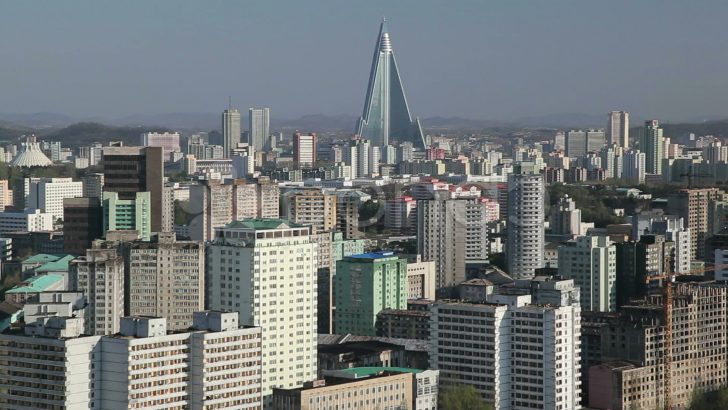
North Korea, officially referred to as the Democratic People’s Republic of Korea is a country located in East Asia covering the northern half of the Korean Peninsula that is situated between Korea Bay and the East Sea.
It shares its borders with China to the north, Russia to the northeast, and South Korea to the south.
This country is under a totalitarian dictatorship and after its complicated history, travelers generally are skeptical when it comes to visiting this country.
Tourists that do travel to North Korea will be immediately met by a tour guide from a local state-owned travel company who will decide what they can and cannot see.
Traveling independently isn’t possible, and you can see North Korea only as part of a guided tour.
When traveling to this county, your movements, freedom, and behavior will be severely limited.
As soon as you step out on the street, you will be accompanied by one or more guides.
Usually, the sightseeing is limited to war memorials, monuments to the Great Leader and the Workers Party of Korea, and war-related museums.
Another popular landmark for tourists is The Demilitarized Zone (DMZ).
- Warnings & Dangers in North Korea
OVERALL RISK: HIGH
Generally speaking, North Korea isn't safe and some governments advise their citizens against traveling to this country. If you're already in North Korea and if you don't abide by its strict rules, you can be faced with imprisonment, torture, and death.
TRANSPORT & TAXIS RISK: LOW
The fact that all your traveling is completely controlled by the state is also helpful when it comes to transport, as all your transport needs will be dealt with by your tour company. Using any other form of local public transport is generally impossible.
PICKPOCKETS RISK: LOW
The good thing in North Korea is that the crime levels are close to zero. There is no petty crime on the streets at least to tourists, and as it's been said, there is no individual traveling in North Korea either way, so your risks of having an experience with a pickpocket are close to none.
NATURAL DISASTERS RISK: HIGH
The biggest natural threats for North Korea are devastating floods. Typhoons have also been known to cause damage. In 2002, a flood occurred that killed 170 people and left 84,000 homeless.
MUGGING RISK: LOW
The same goes for violent crimes, like muggings, robberies, and kidnappings. Even the nightlife in Pyongyang is extremely safe and non-violent.
TERRORISM RISK: LOW
There haven't been recent terrorist attacks in North Korea, but they shouldn't be ruled out, so you should remain vigilant and be aware of your surroundings at all times.
SCAMS RISK: LOW
There aren't many known scams in North Korea. Generally speaking, ways of crossing over tourists are limited given the fact that traveling independently is impossible in this country and everything is strictly controlled by the state.
WOMEN TRAVELERS RISK: MEDIUM
Women are safe when it comes to crime in North Korea, but you should know that if you have any needs as a tourist, or won't help, the assistance from your embassy will be limited and due to strict dictatorship in this country, your actions and behavior here will be limited and in that sense, North Korea can be dangerous.
- So... How Safe Is North Korea Really?
North Korea’s history and political situation are complicated and extremely strict, being that this country is under a totalitarian dictatorship.
Due to this and the uncertainty caused by North Korea’s nuclear weapons development program and related tension in the country, some governments strongly discourage traveling to North Korea.
If you go to North Korea and do not abide by its strict laws, be prepared to face imprisonment, torture, and even death.
North Korea and the US have had a complicated history and relationship for decades.
As of September 2017, all American residents with a US passport will not be allowed to travel to North Korea without having special permission from the US State Department.
You should keep in mind all the time that North Korea in general places blames on America for starting the Korean War, and you should, under no circumstances, disagree with that viewpoint as you might get yourself in trouble.
Also, the country is covered in landmines and dotted with minefields so you mustn’t stray from your group as it may have deadly consequences.
Do not take photographs as this is a huge issue in North Korea and only some places are allowed to be photographed, like the “peace village” Panmunjom.
- How Does North Korea Compare?
- Useful Information
All countries do need a visa in order to enter North Korea, and the visa must be acquired from one of the North Korean diplomatic missions. If you're traveling for tourism, you will also require an authorization from a North Korean travel agency. If you are not sure about your visa status, visit www.doyouneedvisa.com which will let you know whether or not you need a visa based on your nationality and the country you want to visit.
North Korean Won is the official currency in North Korea. There are no ATMs in this country and credit cards are completely useless here, so make sure to bring lots of cash.
North Korea has a combination of a continental climate and an oceanic climate, characterized by four distinct seasons. For the most part, North Korea has a humid climate, with warm summers and cold winters, without much precipitation.
Pyongyang International Airport, also referred to as the Pyongyang Sunan International Airport is the main airport of North Korea. It is located in the Sunan District, in Pyongyang, capital of North Korea.
Travel Insurance
Just like anywhere else, we recommend getting travel insurance when traveling to North Korea, since it covers not only medical problems but also theft and loss of valuables.
North Korea Weather Averages (Temperatures)
- Average High/Low Temperature
- Where to Next?
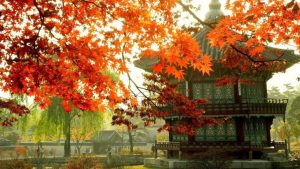
57 Reviews on North Korea
Extremely safe when sensible.
It’s ridiculous that, according to this site, North Korea is as dangerous as Libya.
Yes, North Korea has strict rules with potentially huge consequences for a serious breach of them, but if you stick to them, it’s probably the safest country in the world for tourists. Any incidents are extremely rare and pretty much always result from someone choosing to break the rules in a serious way. The risk from crime and terrorism is practically non-existent.
I went to North Korea in August 2018 and it’s an amazing experience and surprisingly laid back. The guides will politely tell you if you do anything inappropriate so, as I said above, it takes a really serious breach to get you into trouble with the law.
U support that v evil region? Get lost! NK is bad as south sudan bruh!
Have you even been to North Korea?
I never been in North Korea but I never going there because it’s a very dangerous country in fact it’s one of the most dangerous countries in the world
That’s stereotyping
You obviously didn’t have any objections during your visit to anything they said. “I disagree” could cost you your life. That’s super dangerous. They teach the little kids to hate Americans. I’ll pass. Visiting South Korea will do just fine.
self awareness
to be fair, we teach little kids to hate north korea.
It’s different to teach someone to hate the regime and to teach them to hate the people
Got em! lol
You’re funny. If North Korea is so nice why do so many people want to leave.
North Korea isn’t safe
To say North Korea is safe is like saying holding a live rattlesnake is safe. You must have been high to have said this a safe country.
Don't go there dangerous
Don’t go to North Korea it’s the most dangerous country ever because the people in North Korea are actually in danger right now because the leader of North Korea it actually making up crazy rules and if you live in North Korea I’m sorry to say but the leader said you need to live there forever oh I would say the rest of your life
Um ok and try travel to South Korea I guess if you want
Tourists have died and been tortured here. Any misstep can get you detained or even killed. Look at Otto Warmbier, Kenneth Bae, Kim Hak-song, Tony Kim, Kim Dong-chul, Alek Sigley, Jeffrey Fowle, John Short, Lim Hyeon-soo, Euna Lee, Laura Ling, and many more. They have camps torturing their own citizens, and for the ones not in camps, their life is grim. Low quality of life with a leader who is cold and calculated, I think it’s best to spend money in a country that actually cares for its people.
because the people didn’t. follow rules cause they are dumb idiots like one guy did
Vichu2006g loves NK
You’ve gone absolutely mental if you’re comparing NK to South Sudan bruh!
Saying a country is safe doesnt mean that they support an regime. Get lost.
You mean the guy who did absolutely nothing wrong whatsoever? The guy they accused without evidence, releasing some blurred video of someone removing a poster (who clearly wasn’t him)?
The innocent guy they tortured so much he couldn’t even speak and who was sent back to the US as a living corpse until he died very soon after? No fair trial, no evidence, tortured to death. North Korean ‘justice’.
I believe Uganda would be the best option
Dennis Rodman was ok, though.
Great Food and Country!
The McDonald’s there were awesome and the staff there were extremely polite and friendly!
There isn’t McDonald’s in north korea.
There is McDonald's in North Korea
Yes, there is McDonald’s there.
Excellent, follow the rules in North Korea and you will be fine.
Boi is not safe at all
Is horrible for all the news I read they may start WW3 they are treating US with that Washinton is a good tourist place and with NY if the bombs NK plans to detonate in there there will be no NY an DC and much more in US even parks and don♥9t get me your screaming WHY you are dumb idoit who just goes with everone choices so f yourself, I know my grammar is bad so dela with it and f you who will swear at me.
This page is 100% wrong
North Korea is safe so why is it so dangerous in this page? Typhoons are rare in NK because of the cold waters offshore.
Some people 100% don't read.
Possibly read how the rankings are decided would be a good start for you….. 😉 There are many things considered like gross gdp to military spending etc. That knocks countries down in the list… What do you think they just put a number at random? The page outlines the safety of what would concern you the most… The actual ranking is different in terms…
It is safe when you follow the rules. So why are you saying this page is 100% wrong? Have you been to NK? NK is not letting you guys leave, and if you’re in North Korea then you will need to call the SOS to help you escape that country. NK has laws that are illegal for you to escape the border and then, you will face the imprisonment or the worst punishment. It’s mostly safe when you’re in South Korea or Japan
Not safe at all even if crime is extremely low
North Korea may seem safe but the fact it is the most brutal dictatorship in the world and the people have faced communist oppression for over 60 years not knowing what the outside world is like except through the eyes of the Kim dynasty the only rich people in North Korea whilst everyone else is poor and afraid of being put in concentration camps for having an opinion what à sad place to live in I feel sorry for the people hopefully one day they get freedom like there southern neighbours but it seems unlikely even China and Russia seem democratic compared to the likes of North Korea….
meeting Kim Yo Jong
“anonymous” how do you know so much NK??? are you a member of the NK communist party??? because if you are not it seems strange that you have so much access to what we are told is very secret! we are told you will get the death penalty for just asking questions! you must have a “charmed” life, or “special dispensation”! Could you get me an invitation to meet Kim Yo Jong ???
Why are you comparing China with NK are u mad
Great country very good nice place here👍😃
comical ratings boost
looking through these comments are funny, i see a bunch of 5 star reviews from what im assuming are North Korean travel agents. “North Korea very good! very nice very safe visit now!”
Owning a Bible can get Executed
North Korean Executed people with a firing squad
THERE is no freedom
Hermit Kingdom
It’s safe for Kim Jong Un only.
As long as you follow the guidance you’ll find yourself in the safest region on earth, tourist-wise. If you are a retarded amerimutt and go through places tearing down posters and pictures then you’ll end up dead for being an uneducated, arrogant swine.
Also just don’t go there, do not support the regime.
It Is Good, Idk Why Poeple Rate It So Low, North Korea May Be Ruled By An Extremely Evil Dictator But It Doesnt Mean Travelling There Is Bad, If You Want To Be Safe Stick To The Rules, Done.
For the tourists, it is a perfectly safe country, as long as you follow the rules. Only question is – who would ever go to NK?
how are people suppose to go to north korea
Picture Looks Appealing
Seems Safety is close to 5 Stars , No Drugs ,No Guns No Crime , i am not a big Fan of rules so im out . City looks super clean and modern , Not sure what all the nonsense is about , My lawyer told me never to Assume anything , The System might be very strict . I will never have a problem in North Korea , cause ill never go there . But will be Risking my Life everywhere else i go , cause i like to travel , a dangerous past time .
It is unsafe to post on here as the NK secret police are monitoring this site. I think NK is really fab and an excellent place for a holiday. Only criminals will find themselves in trouble.
There is no internet in NK so you cannot email and if you use a cell phone you still cannot see who you are talking to. So scammers might call you I think
Bruh. North Korea Is The Most Dangerous Country. The Risk Level Should Be 7, And 21 Is A Bit Too High.
Amazed stay
North Korea Very Nice. Ik like it. Travels nicely, and safe!👍
United states citizens are at risk of arrest
They will arrest you if you are from the united states or south korea. So don’t expect a good welcome. If you think its safe over there you need help.
i did travel there and it’s wayyy more safer and better than when i traveled to saudi arabia
I’d give this zero stars if i could
Unless i get an invite saying i can go there i won’t possibly go at all the reason for that is i can be insecure sometimes and i’m a united states citizen as well. If you want to go somewhere try going to italy instead i hear they have great pizza. 21 is too high and very misleading. I don’t care if crime is low. I hear they are also discriminative against people with disabilities such as myself. If i wanted to move to a country i would try moving to switzerland or the Netherlands.
Great cricket team.
I hear they have a great cricket team.
Hi this a horrible country in to say if you go there and don’t no the rules and you break one I am afraid to say, but you may not come back and what I mean is you want come back alive 👎🏽👎🏽👎🏽👎🏽🙁🙁☹️☹️🙁😕😕😕😔😔🤯
best place ever
I got there for a honeymoon and it was incredible. the macdonalds wa sperfect and Kim himself came to see us. 6 stars
Unsafe for United States citizens and south korean citizens in many ways shape or form
It is an extremely unsafe country to visit. If you make it out of alive then you probably aren’t a united states citizen. I’ve heard people are tortured there. I’m not going there nor will i ever but i will marry that french black lady i always dreamed of lol. Also the only reason why there is low crime there is just because of the poor treatment of prisoners. Also it is super strict they also treat south korean citizens as they same as if they were american citizens. Don’t go to this lame excuse of a country. Just go somewhere else.
Safe with common sense
From the comments I would assume that many people have not visited the country at all. and so do not have much to contribute. Personally I think the safety index is way too low, as it is for tourists not possible to visit without guides from a state owned travel agency, that decides what to see and do.
That is, as long as you adhere to basic common sense and follow the guides I would say it is a pretty safe experience as you do not have much to fear from the totalitarian regime as long as you are the good well-behaved tourist, not questioning things and follow the directives of the guide with a humble attitude.
One exception can be if you come from a so called “hostile country” like United States or so, but if you do not come from such a country you should not have much problems.
As a tourist it is generally quite safe as long as you have some common sense and humility, the country is terrible in many regards but you will not be exposed to any of these things in your sheltered state-controlled tour.
Don’t do it
North Korea for more than 100 decades now is a police state meaning the cops can arrest whoever they want whenever they want as long as it doesn’t offend kim jong un’s country or regime its ok to arrest someone without reason
Share Your Experience Cancel reply
Your Review
Title of your review
Article Contents
- Overall Risk
- Transport & Taxis Risk
- Pickpockets Risk
- Natural Disasters Risk
- Mugging Risk
- Terrorism Risk
- Women Travelers Risk
- Weather Averages (Temperatures)
- User Reviews
- Share Your Experience
Popular Destinations

Safety Index
Recent reviews & comments.
- Thatcher Maxwell on Duluth
- Simon Schwartz on Duluth
- Kataleya Love on Duluth
- Ashton Randall on Duluth
- Ashley Warren on North Little Rock
Popular US States
- Pennsylvania
- Skip to main content
- Skip to "About this site"
Language selection
Search travel.gc.ca.
Help us to improve our website. Take our survey !
COVID-19: travel health notice for all travellers
North Korea travel advice
Latest updates: Health – editorial update
Last updated: March 13, 2024 15:06 ET
On this page
Safety and security, entry and exit requirements, laws and culture, natural disasters and climate, north korea - avoid all travel.
There is no resident Canadian government office in the country. The ability of Canadian officials to provide consular assistance in North Korea is extremely limited.
Back to top
Safety information
Canadian (and Swedish) authorities may encounter major difficulties and delays in obtaining consular access to you if you are detained, particularly outside of Pyongyang. The provision of consular access is solely at the discretion of the North Korean government. Knowledge of North Korean police and judicial systems is limited, which may further affect our ability to provide assistance to you.
Tourist facilities are minimal and telecommunications are unreliable. Individual tourism can be arranged only through a handful of North Korean government-approved travel agencies. Travel must be authorized in advance by the government. Travellers are closely observed, and their accommodations and telecommunications are monitored.
There are serious shortages of food, electricity and clean water.
You have no right to privacy. Your movements and communications may be under surveillance at any time. Your personal belongings may be searched, and authorities may review the contents stored on your electronic devices.
Register with the Embassy of Canada to South Korea in Seoul and with the Embassy of Sweden in Pyongyang.
Tensions on the Korean Peninsula
Tensions on the Korean Peninsula can escalate with little notice. They may increase before, during and after North Korean nuclear and missile tests, military exercises and incidents such as inter-Korean border skirmishes or other incidents that one or the other side finds offensive. Due to very limited access to international media broadcasts in North Korea, you may be taken by surprise by events that could affect your security.
The crime rate is low. Petty crime occurs, especially at the Pyongyang Sunan International Airport. Ensure that your personal belongings, including your passport and other travel documents, are secure at all times.
Road safety
Travel within North Korea is severely restricted. Transportation is usually provided by local tour representatives or authorities. Major highways are in good condition, while rural roads can be hazardous. Police checkpoints, usually located at the entry to towns, may require that travellers provide documentation before onward travel is permitted.
We do not make assessments on the compliance of foreign domestic airlines with international safety standards.
Information about foreign domestic airlines
Every country or territory decides who can enter or exit through its borders. The Government of Canada cannot intervene on your behalf if you do not meet your destination’s entry or exit requirements.
We have obtained the information on this page from the North Korean authorities. It can, however, change at any time.
Verify this information with the Foreign Representatives in Canada .
Entry requirements vary depending on the type of passport you use for travel.
Before you travel, check with your transportation company about passport requirements. Its rules on passport validity may be more stringent than the country’s entry rules.
Regular Canadian passport
Your passport must be valid at least 6 months beyond the date you expect to leave North Korea.
Passport for official travel
Different entry rules may apply.
Official travel
Passport with “X” gender identifier
While the Government of Canada issues passports with an “X” gender identifier, it cannot guarantee your entry or transit through other countries. You might face entry restrictions in countries that do not recognize the “X” gender identifier. Before you leave, check with the closest foreign representative for your destination.
Other travel documents
Different entry rules may apply when travelling with a temporary passport or an emergency travel document. Before you leave, check with the closest foreign representative for your destination.
Useful links
- Foreign Representatives in Canada
- Canadian passports
Canadians must have a visa to enter North Korea. You can obtain a visa from a North Korean mission in a third country after approval from the government in Pyongyang. The process for obtaining visas can be extremely slow and arduous.
Canadians arriving without a valid Canadian passport and visa may be detained, arrested, fined or denied entry.
Professional journalists must apply for special permission to visit North Korea and may not enter the country on a tourist visa, even if they are travelling for personal reasons.
Tourist visa: required Business visa: required Student visa: required
Other entry information
Foreigners can enter North Korea either by air or by train. It is not possible to enter North Korea from South Korea or to enter South Korea from North Korea.
Even if you meet all entry requirements, you may be arbitrarily arrested and/or detained at your point of entry.
Dual citizenship
If you are a Korean citizen or have family ties with North Korea, you should carefully consider your decision to visit. Authorities periodically subject dual citizens and children of former Koreans to certain laws and obligations.
Canadians who also have South Korean citizenship must obtain approval from South Korean authorities for travel to North Korea. For more information, contact the Embassy of Canada to the Republic of Korea in Seoul, South Korea.
Unauthorized points of entry
Foreigners have been detained, and in one instance shot, for entering the country at unauthorized points. Ensure that you stay within permitted zones and strictly follow North Korea’s procedures and protocols.
Children and travel
Learn more about travelling with children .
Yellow fever
Learn about potential entry requirements related to yellow fever (vaccines section).
Relevant Travel Health Notices
- Global Measles Notice - 13 March, 2024
- COVID-19 and International Travel - 13 March, 2024
This section contains information on possible health risks and restrictions regularly found or ongoing in the destination. Follow this advice to lower your risk of becoming ill while travelling. Not all risks are listed below.
Consult a health care professional or visit a travel health clinic preferably 6 weeks before you travel to get personalized health advice and recommendations.
Routine vaccines
Be sure that your routine vaccinations , as per your province or territory , are up-to-date before travelling, regardless of your destination.
Some of these vaccinations include measles-mumps-rubella (MMR), diphtheria, tetanus, pertussis, polio, varicella (chickenpox), influenza and others.
Pre-travel vaccines and medications
You may be at risk for preventable diseases while travelling in this destination. Talk to a travel health professional about which medications or vaccines may be right for you, based on your destination and itinerary.
Yellow fever is a disease caused by a flavivirus from the bite of an infected mosquito.
Travellers get vaccinated either because it is required to enter a country or because it is recommended for their protection.
- There is no risk of yellow fever in this country.
Country Entry Requirement*
- Proof of vaccination is required if you are coming from a country where yellow fever occurs.
Recommendation
- Vaccination is not recommended.
- Discuss travel plans, activities, and destinations with a health care professional.
- Contact a designated Yellow Fever Vaccination Centre well in advance of your trip to arrange for vaccination.
About Yellow Fever
Yellow Fever Vaccination Centre
* It is important to note that country entry requirements may not reflect your risk of yellow fever at your destination. It is recommended that you contact the nearest diplomatic or consular office of the destination(s) you will be visiting to verify any additional entry requirements.
There is a risk of hepatitis A in this destination. It is a disease of the liver. People can get hepatitis A if they ingest contaminated food or water, eat foods prepared by an infectious person, or if they have close physical contact (such as oral-anal sex) with an infectious person, although casual contact among people does not spread the virus.
Practise safe food and water precautions and wash your hands often. Vaccination is recommended for all travellers to areas where hepatitis A is present.
Measles is a highly contagious viral disease. It can spread quickly from person to person by direct contact and through droplets in the air.
Anyone who is not protected against measles is at risk of being infected with it when travelling internationally.
Regardless of where you are going, talk to a health care professional before travelling to make sure you are fully protected against measles.
Japanese encephalitis is a viral infection that can cause swelling of the brain. It is spread to humans through the bite of an infected mosquito. Risk is very low for most travellers. Travellers at relatively higher risk may want to consider vaccination for JE prior to travelling.
Travellers are at higher risk if they will be:
- travelling long term (e.g. more than 30 days)
- making multiple trips to endemic areas
- staying for extended periods in rural areas
- visiting an area suffering a JE outbreak
- engaging in activities involving high contact with mosquitos (e.g., entomologists)
Hepatitis B is a risk in every destination. It is a viral liver disease that is easily transmitted from one person to another through exposure to blood and body fluids containing the hepatitis B virus. Travellers who may be exposed to blood or other bodily fluids (e.g., through sexual contact, medical treatment, sharing needles, tattooing, acupuncture or occupational exposure) are at higher risk of getting hepatitis B.
Hepatitis B vaccination is recommended for all travellers. Prevent hepatitis B infection by practicing safe sex, only using new and sterile drug equipment, and only getting tattoos and piercings in settings that follow public health regulations and standards.
Coronavirus disease (COVID-19) is an infectious viral disease. It can spread from person to person by direct contact and through droplets in the air.
It is recommended that all eligible travellers complete a COVID-19 vaccine series along with any additional recommended doses in Canada before travelling. Evidence shows that vaccines are very effective at preventing severe illness, hospitalization and death from COVID-19. While vaccination provides better protection against serious illness, you may still be at risk of infection from the virus that causes COVID-19. Anyone who has not completed a vaccine series is at increased risk of being infected with the virus that causes COVID-19 and is at greater risk for severe disease when travelling internationally.
Before travelling, verify your destination’s COVID-19 vaccination entry/exit requirements. Regardless of where you are going, talk to a health care professional before travelling to make sure you are adequately protected against COVID-19.
The best way to protect yourself from seasonal influenza (flu) is to get vaccinated every year. Get the flu shot at least 2 weeks before travelling.
The flu occurs worldwide.
- In the Northern Hemisphere, the flu season usually runs from November to April.
- In the Southern Hemisphere, the flu season usually runs between April and October.
- In the tropics, there is flu activity year round.
The flu vaccine available in one hemisphere may only offer partial protection against the flu in the other hemisphere.
The flu virus spreads from person to person when they cough or sneeze or by touching objects and surfaces that have been contaminated with the virus. Clean your hands often and wear a mask if you have a fever or respiratory symptoms.
Malaria is a serious and sometimes fatal disease that is caused by parasites spread through the bites of mosquitoes. Limited malaria transmission may occur in this destination, but risk to travellers is very low. Antimalarial medication is not recommended for most travellers. Consult a health care professional or visit a travel health clinic before travelling to discuss your options. It is recommended to do this 6 weeks before travel, however, it is still a good idea any time before leaving. Protect yourself from mosquito bites at all times:
- Cover your skin and use an approved insect repellent on uncovered skin.
- Exclude mosquitoes from your living area with screening and/or closed, well-sealed doors and windows.
- Use insecticide-treated bed nets if mosquitoes cannot be excluded from your living area.
- Wear permethrin-treated clothing.
If you develop symptoms similar to malaria when you are travelling or up to a year after you return home, see a health care professional immediately. Tell them where you have been travelling or living.
In this destination, rabies is commonly carried by dogs and some wildlife, including bats. Rabies is a deadly disease that spreads to humans primarily through bites or scratches from an infected animal. While travelling, take precautions , including keeping your distance from animals (including free-roaming dogs), and closely supervising children.
If you are bitten or scratched by a dog or other animal while travelling, immediately wash the wound with soap and clean water and see a health care professional. In this destination, rabies treatment may be limited or may not be available, therefore you may need to return to Canada for treatment.
Before travel, discuss rabies vaccination with a health care professional. It may be recommended for travellers who are at high risk of exposure (e.g., occupational risk such as veterinarians and wildlife workers, children, adventure travellers and spelunkers, and others in close contact with animals).
Safe food and water precautions
Many illnesses can be caused by eating food or drinking beverages contaminated by bacteria, parasites, toxins, or viruses, or by swimming or bathing in contaminated water.
- Learn more about food and water precautions to take to avoid getting sick by visiting our eat and drink safely abroad page. Remember: Boil it, cook it, peel it, or leave it!
- Avoid getting water into your eyes, mouth or nose when swimming or participating in activities in freshwater (streams, canals, lakes), particularly after flooding or heavy rain. Water may look clean but could still be polluted or contaminated.
- Avoid inhaling or swallowing water while bathing, showering, or swimming in pools or hot tubs.
Travellers' diarrhea is the most common illness affecting travellers. It is spread from eating or drinking contaminated food or water.
Risk of developing travellers' diarrhea increases when travelling in regions with poor standards of hygiene and sanitation. Practise safe food and water precautions.
The most important treatment for travellers' diarrhea is rehydration (drinking lots of fluids). Carry oral rehydration salts when travelling.
Typhoid is a bacterial infection spread by contaminated food or water. Risk is higher among children, travellers going to rural areas, travellers visiting friends and relatives or those travelling for a long period of time.
Travellers visiting regions with a risk of typhoid, especially those exposed to places with poor sanitation, should speak to a health care professional about vaccination.
Insect bite prevention
Many diseases are spread by the bites of infected insects such as mosquitoes, ticks, fleas or flies. When travelling to areas where infected insects may be present:
- Use insect repellent (bug spray) on exposed skin
- Cover up with light-coloured, loose clothes made of tightly woven materials such as nylon or polyester
- Minimize exposure to insects
- Use mosquito netting when sleeping outdoors or in buildings that are not fully enclosed
To learn more about how you can reduce your risk of infection and disease caused by bites, both at home and abroad, visit our insect bite prevention page.
Find out what types of insects are present where you’re travelling, when they’re most active, and the symptoms of the diseases they spread.
- In this country, risk of dengue is sporadic. It is a viral disease spread to humans by mosquito bites.
- Dengue can cause flu-like symptoms. In some cases, it can lead to severe dengue, which can be fatal.
- The level of risk of dengue changes seasonally, and varies from year to year. The level of risk also varies between regions in a country and can depend on the elevation in the region.
- Mosquitoes carrying dengue typically bite during the daytime, particularly around sunrise and sunset.
- Protect yourself from mosquito bites . There is no vaccine or medication that protects against dengue fever.
Animal precautions
Some infections, such as rabies and influenza, can be shared between humans and animals. Certain types of activities may increase your chance of contact with animals, such as travelling in rural or forested areas, camping, hiking, and visiting wet markets (places where live animals are slaughtered and sold) or caves.
Travellers are cautioned to avoid contact with animals, including dogs, livestock (pigs, cows), monkeys, snakes, rodents, birds, and bats, and to avoid eating undercooked wild game.
Closely supervise children, as they are more likely to come in contact with animals.
Person-to-person infections
Stay home if you’re sick and practise proper cough and sneeze etiquette , which includes coughing or sneezing into a tissue or the bend of your arm, not your hand. Reduce your risk of colds, the flu and other illnesses by:
- washing your hands often
- avoiding or limiting the amount of time spent in closed spaces, crowded places, or at large-scale events (concerts, sporting events, rallies)
- avoiding close physical contact with people who may be showing symptoms of illness
Sexually transmitted infections (STIs) , HIV , and mpox are spread through blood and bodily fluids; use condoms, practise safe sex, and limit your number of sexual partners. Check with your local public health authority pre-travel to determine your eligibility for mpox vaccine.
Tuberculosis is an infection caused by bacteria and usually affects the lungs.
For most travellers the risk of tuberculosis is low.
Travellers who may be at high risk while travelling in regions with risk of tuberculosis should discuss pre- and post-travel options with a health care professional.
High-risk travellers include those visiting or working in prisons, refugee camps, homeless shelters, or hospitals, or travellers visiting friends and relatives.
Medical services and facilities
The level of medical services and facilities is poor. Hospitals often lack heat and medicine, and suffer from frequent power outages. Immediate payment in cash is expected for treatment. Pyongyang Friendship Hospital, in the Munsu-dong district of Pyongyang, is staffed by English-speaking professionals. If possible, avoid undergoing surgery. Medical evacuations are very difficult to arrange and are not guaranteed. You should take this into account prior to travel if you have an unstable medical condition. If you show symptoms of a serious communicable disease, you may be subject to strict quarantine conditions.
Make sure you get travel insurance that includes coverage for medical evacuation and hospital stays.
Travel health and safety
Keep in Mind...
The decision to travel is the sole responsibility of the traveller. The traveller is also responsible for his or her own personal safety.
Be prepared. Do not expect medical services to be the same as in Canada. Pack a travel health kit , especially if you will be travelling away from major city centres.
You must abide by local laws.
Learn about what you should do and how we can help if you are arrested or detained abroad .
North Korea is under international and Canadian sanctions . These sanctions could be relevant to and affect your travel.
Foreigners must register through their host organization within 24 hours of arrival in the country.
You must be accompanied by an official guide at all times. Follow all instructions from your guide. Unauthorized conversations with locals or currency exchange, as well as making a purchase in a store not designated for foreigners, could lead to fines or arrest.
Foreigners are prohibited from using public buses or the subway.
Penalties for possession, use or trafficking of illegal drugs are strict. Convicted offenders can expect jail sentences and heavy fines.
Drugs, alcohol and travel
Import and exports
Importation of satellite telephones and shortwave radios is prohibited. Such items are confiscated upon entry and usually returned upon departure.
The import and export of local currency is prohibited.
Authorities may seize any material that they deem to be pornographic, political or intended for religious proselytizing. If you plan to bring material written in the Korean language, ensure that it will not be interpreted by local authorities as being against the interests of the North Korean regime.
Involvement in politics and unsanctioned religious activity can result in detention.
Photography of airports, roads, bridges, seaports and rail stations is prohibited. Any pictures or video taken outside of tourist areas could result in confiscation of equipment or detention. Seek permission from your tour guide before taking photographs.
Dual citizenship is not legally recognized in North Korea.
If local authorities consider you a citizen of North Korea, they may refuse to grant you access to Canadian consular services. This will prevent us from providing you with those services.
Travellers with dual citizenship
International Child Abduction
The Hague Convention on the Civil Aspects of International Child Abduction is an international treaty. It can help parents with the return of children who have been removed to or retained in certain countries in violation of custody rights. It does not apply between Canada and North Korea.
If your child was wrongfully taken to, or is being held in North Korea by an abducting parent:
- act as quickly as you can
- consult a lawyer in Canada and in North Korea to explore all the legal options for the return of your child
- report the situation to the nearest Canadian government office abroad or to the Vulnerable Children’s Consular Unit at Global Affairs Canada by calling the Emergency Watch and Response Centre.
If your child was removed from a country other than Canada, consult a lawyer to determine if The Hague Convention applies.
Be aware that Canadian consular officials cannot interfere in private legal matters or in another country’s judicial affairs.
- International Child Abduction: A Guidebook for Left-Behind Parents
- Travelling with children
- Canadian embassies and consulates by destination
- Emergency Watch and Response Centre
Ensure that you are not seen to be critical of the country’s political system or its current and former leaders Kim Jong-un, Kim Jong-il and Kim Il-Sung and their family members.
2SLGBTQI+ travellers
North Korean law does not prohibit sexual acts between individuals of the same sex. However, homosexuality is not widely accepted in North Korean society.
2SLGBTQI+ travellers have experienced harassment and verbal abuse.
Travel and your sexual orientation, gender identity, gender expression and sex characteristics
The currency is North Korean won (KPW). Cash is the most accepted form of payment. Foreigners are expected to use the Euro or, alternatively, the Chinese renminbi or U.S. dollar. Change in foreign currency is often unavailable. Banking facilities are limited. There are no ATMs. Some hotels accept credit cards, if you give them advance notice.
The rainy (monsoon) season extends from the end of June until August. Typhoons occur in August and September.
Severe rainstorms can cause flooding and landslides, which in turn can result in significant loss of life and extensive damage to infrastructure, as well as hamper the provision of essential services. North Korea is also prone to drought. Keep informed of regional weather forecasts, avoid disaster areas and follow the advice of local authorities.
Tornadoes, cyclones, hurricanes, typhoons and monsoons
Local services
There is no centralized number to reach emergency services. Research and carry contact information for local police and medical facilities.
Consular assistance
There is no resident Canadian government office in North Korea. You can obtain consular assistance from the Swedish embassy in Pyongyang.
For emergency consular assistance, call the Embassy of Canada in South Korea and follow the instructions. At any time, you may also contact the Emergency Watch and Response Centre in Ottawa.
The decision to travel is your choice and you are responsible for your personal safety abroad. We take the safety and security of Canadians abroad very seriously and provide credible and timely information in our Travel Advice to enable you to make well-informed decisions regarding your travel abroad.
The content on this page is provided for information only. While we make every effort to give you correct information, it is provided on an "as is" basis without warranty of any kind, expressed or implied. The Government of Canada does not assume responsibility and will not be liable for any damages in connection to the information provided.
If you need consular assistance while abroad, we will make every effort to help you. However, there may be constraints that will limit the ability of the Government of Canada to provide services.
Learn more about consular services .
Risk Levels
take normal security precautions.
Take similar precautions to those you would take in Canada.
Exercise a high degree of caution
There are certain safety and security concerns or the situation could change quickly. Be very cautious at all times, monitor local media and follow the instructions of local authorities.
IMPORTANT: The two levels below are official Government of Canada Travel Advisories and are issued when the safety and security of Canadians travelling or living in the country or region may be at risk.
Avoid non-essential travel
Your safety and security could be at risk. You should think about your need to travel to this country, territory or region based on family or business requirements, knowledge of or familiarity with the region, and other factors. If you are already there, think about whether you really need to be there. If you do not need to be there, you should think about leaving.
Avoid all travel
You should not travel to this country, territory or region. Your personal safety and security are at great risk. If you are already there, you should think about leaving if it is safe to do so.
Update April 12, 2024
Information for u.s. citizens in the middle east.
- Travel Advisories |
- Contact Us |
- MyTravelGov |
Find U.S. Embassies & Consulates
Travel.state.gov, congressional liaison, special issuance agency, u.s. passports, international travel, intercountry adoption, international parental child abduction, records and authentications, popular links, travel advisories, mytravelgov, stay connected, legal resources, legal information, info for u.s. law enforcement, replace or certify documents.
Before You Go
Learn About Your Destination
While Abroad
Emergencies
Share this page:
North Korea (Democratic People's Republic of Korea)
Travel Advisory July 24, 2023
North korea - level 4: do not travel.
Reissued with obsolete COVID-19 page links removed.
Do not travel to North Korea due to the continuing serious risk of arrest and long-term detention of U.S. nationals. Exercise increased caution to North Korea due to the critical threat of wrongful detention.
- All U.S. passports are invalid for travel to, in, or through the DPRK unless specially validated for such travel under the authority of the Secretary of State.
- Special validations are granted only in very limited circumstances. More information on how to apply for the special validation is available here .
The U.S. government is unable to provide emergency services to U.S. citizens in North Korea as it does not have diplomatic or consular relations with North Korea. Sweden serves as the protecting power for the United States in North Korea, providing limited emergency services. The North Korean government routinely delays or denies Swedish officials access to detained U.S. citizens.
Due to risks to civil aviation operating within or in the vicinity of North Korea, the Federal Aviation Administration (FAA) has issued a Notice to Air Missions (NOTAM) and/or a Special Federal Aviation Regulation (SFAR). For more information U.S. citizens should consult the Federal Aviation Administration’s Prohibitions, Restrictions and Notices .
Read the country information page for additional information on travel to North Korea.
If you receive a special validation to travel to North Korea:
- Draft a will and designate appropriate insurance beneficiaries and/or power of attorney.
- Discuss a plan with loved ones regarding care/custody of children, pets, property, belongings, non-liquid assets (collections, artwork, etc.), funeral wishes, etc.
- Visit our website for Travel to High-Risk Areas .
- Enroll in the Smart Traveler Enrollment Program ( STEP ) to receive Alerts and make it easier to locate you in an emergency.
- Follow the Department of State on Facebook and Twitter .
- Visit the CDC page for the latest Travel Health Information related to your travel.
- Prepare a contingency plan for emergency situations. Review the Traveler’s Checklist .
Special Passports
*U.S. passports are not valid for travel to, in, or through North Korea, unless they are specially validated by the Department of State. See here for how to apply special passport to travel to North Korea.
Quick Facts
Embassies and consulates.
- The Department strongly urges U.S. citizens not to go to North Korea/the Democratic People’s Republic of Korea (DPRK) due to the serious risk of arrest and long-term detention.
- North Korean authorities, under North Korea’s system of law enforcement, impose unduly harsh sentences--including for actions that in the United States would not be considered crimes.
- They also threatened U.S. citizens with being treated in accordance with the “wartime law” of the DPRK.
See Travel Advisory for North Korea .
Sweden as Protecting Power : Since the United States does not maintain diplomatic or consular relations with North Korea, the U.S. government has no means to provide normal consular services to its citizens:
- Sweden serves as the protecting power for Canada, Australia, and the United States, providing limited emergency consular services.
- North Korea still routinely delays or denies consular access to U.S. citizens, even when requested by the Swedish Embassy in Pyongyang and despite North Korea and the United States both being signatories to the Vienna Convention on Consular Relations .
Embassy of Sweden Pyongyang
Munsu-Dong District Pyongyang Democratic People's Republic of Korea Telephone: +46 8 405 10 00 (main switchboard) Emergency Contact at the Embassy of Sweden in Pyongyang: +46 8 405 50 05
Department of State Emergency Contact: 24/7 from within the United States 1-888-407-4747 / from outside the United States 1-202-501-4444.
U.S. Embassy Beijing
No. 55 An Jia Lou Road Chaoyang District, Beijing 100600 China Telephone: +(86)(10) 8531-4000 Emergency After-Hours Telephone: +(86)(10) 8531-4000 Fax: +(86)(10) 8531-3300 [email protected]
Destination Description
Learn about the U.S. relationship to countries around the world.
Entry, Exit and Visa Requirements
U.S. passports are not valid for travel into, in, or through the Democratic People’s Republic of Korea (DPRK, North Korea) due to the serious and mounting risk of arrest and long-term detention of U.S. citizens in North Korea. Those traveling on U.S. passports in North Korea should have already departed North Korea. Those who wish to travel to North Korea on a U.S. passport after this time must obtain a special validation in a limited validity passport under 22 C.F.R. 51.64 , which will be granted only under very limited circumstances. U.S. citizens and non-U.S. citizen nationals abroad can apply for this special validation at the nearest U.S. Embassy or Consulate.
With a special validation to enter North Korea in a limited passport: one to three months validity to enter North Korea. If you enter and depart North Korea through China, six months validity on your passport with multiple entry/exit visas for China. Note: you cannot enter North Korea through the Demilitarized Zone from South Korea.
If you enter North Korea without a special validation: the Department of State can revoke your passport for misuse under 22 C.F.R. 51.62(a)(2). Further, you may be subject to felony prosecution under 18 U.S.C. 1544 for misuse of a U.S. passport.
Where to apply for a DPRK visa : DPRK Embassy in Beijing, China or in any country that has diplomatic relations with North Korea.
The Embassy of the Democratic People's Republic of Korea in Beijing:
No. 11, Ritan Bei Lu, Jianguomen Wai, Chaoyang District Beijing, China 100600 Telephone: (86-10) 6532-6639 (Visa Office) Telephone: (86-10) 65312-1186 Facsimile: (86-10) 6532-6056
If you reside in the United States, inquire through the DPRK Mission to the UN whether your request for a DPRK visa will be approved before you leave the United States for China:
The Permanent Representative of the Democratic People’s Republic of Korea to the United Nations 820 Second Avenue New York, NY 10017 Telephone: (212) 972-3105 Facsimile: (212) 972-3154
If you reside in a country with diplomatic relations with the DPRK, ask the DPRK embassy in that country for visa advice.
If you try to enter North Korea without required travel documents : you may be denied entry, fined, detained, arrested, or imprisoned.
If you plan to enter and depart North Korea through China without multiple Chinese visas in your passport or with Chinese visas that expire before you depart North Korea, you may not be able to exit North Korea .
HIV/AIDS: The U.S. Department of State is unaware of any HIV/AIDS entry restrtictions for visitors to or foreign residents of North Korea.
Find information on dual nationality , prevention of international child abduction and customs regulations on our websites.
Safety and Security
Please see the sections on “Local Laws and Special Circumstances” and “Criminal Penalties.”
Crime: North Korea does not release crime statistics. Petty thefts have been reported at the airport in Pyongyang.
Do not buy counterfeit and/or pirated goods, even if they are widely available. The purchase of counterfeit and pirated goods is illegal in the United States and may be illegal in North Korea.
See the Department of State and the FBI pages for information on scams.
Victims of Crime: Report the crime to your local host/liaison and contact the Embassy of Sweden for assistance. Your local host/liaison should contact the local authorities on your behalf.
Lost or Stolen Passports :
If your passport is lost or stolen in North Korea, you will need to contact the Embassy of Sweden in Pyongyang, U.S. Protecting Power, for assistance in reaching out to a U.S. Embassy or Consulate and obtaining a replacement passport. You will also need a replacement visa for China.
Please see our information for victims of crime , including possible victim compensation programs in the United States .
Tourism: Individuals cannot use a U.S. passport to travel to, in, or through North Korea without a special validation from the Department of State. Special Validations are granted only if it is in the US national interest to do so. Tourists are considered to be participating in activities at their own risk. Emergency response and subsequent appropriate medical treatment is not available in-country. U.S. citizens are encouraged to purchase medical evacuation insurance. See our webpage for more information on insurance providers for overseas coverage .
Local Laws & Special Circumstances
Arrest Notification: If you are arrested or detained, ask police or prison officials to notify the Embassy of Sweden immediately . See our webpage for further information
Educate yourself about North Korean law . The North Korea legal system is an instrument of state power and not an independent branch of the government. Protections guaranteed under the U.S. legal system do not apply, and your U.S. passport does not confer special status. Your local host/liaison may be able to provide useful guidance. However, do not assume your host will provide assistance to you if you are arrested, or that any information you shared with your host will not be turned over to North Korean authorities.
Criminal acts unique to North Korea:
- Showing disrespect (both physically and verbally) to the country’s former leaders, Kil Il Sung or Kim Jong Il, or the country’s current leader, Kim Jong Un including but not limited to tampering with or mishandling materials bearing their names or images such as money, newspapers, or political slogans in Korean
- Entering North Korea without proper travel documentation
- Possessing material, printed or digital including e-book readers, DVDs, USB drives, documents, literature, audio and video files that is critical of or hostile to North Korea
- Proselytizing or carrying out religious activities, including activities that may be construed as such, like leaving behind religious materials, either intentionally or unintentionally
- Engaging in unsanctioned political activities
- Unauthorized interacting with North Koreans
- Taking unauthorized photographs
- Having unauthorized conversations with North Koreans
- Traveling without authorization even for short distances
- Exchanging currency with an unauthorized vendor
- Shopping at stores not designated for foreigners
- Bringing pornography into the country
No Expectation of Privacy:
- All electronic and multimedia devices including USB drives, CDs, DVDs, mobile phones, tablets, laptops, Internet browsing histories, and cookies are subject to search for banned content.
- Personal possessions in hotel rooms may be searched.
- If DPRK authorities permit you to keep your mobile phone when you enter the country, it will not function unless you use the DPRK mobile service, which will enable DPRK authorities to monitor your calls. GPS-trackers and satellite phones are not allowed.
- A host or minder will keep track of you.
- Removing or tampering with political slogans and signs or pictures of political leaders.
Criminal Penalties: At least 16 U.S. citizens have been detained in North Korea in the past ten years. While in North Korea, you are subject to North Korean laws. If you violate North Korean laws, even unwittingly, you may be:
- Held in isolation without charges for lengthy periods of time,
- Interrogated without counsel,
- Compelled to draft public confessions,
- Sentenced, and
- Sent to a labor camp for years .
Some laws are also prosecutable in the United States, regardless of local law. For examples, see our website on crimes against minors abroad and the Department of Justice website.
SPECIAL CIRCUMSTANCES
Press: North Korea officials watch journalists closely to prevent them from unauthorized conversations with North Koreans or questioning the policies, actions, or public statements of North Korea’s leadership.
- North Korea has confiscated objectionable material from foreign journalists.
- Journalists who engaged in activities that challenged the regime have been deported, arrested, or detained to face criminal charges.
- For additional information on the lack of freedom of information in North Korea, see the Department of State’s Human Rights Report for North Korea .
U.S. Government Economic Sanctions Against North Korea: North Korea remains one of the most heavily sanctioned countries in the world.
- The government of North Korea and the Workers’ Party of Korea are blocked persons, and U.S. citizens may generally not engage in transactions with them or with their property.
- Most exports to North Korea are subject to licensing by the Commerce Department’s Bureau of Industry and Security.
- The importation and exportation of goods, services, and technology from or to North Korea are generally prohibited unless authorized by the Office of Foreign Assets Control and, for exports or goods, the Department of Commerce Bureau of Industry and Security.
UN Security Council statements November 17, 2017: For information on the United States and the United Nations Security Council concern regarding escalating tensions from the recent missile launch, and other activities prohibited by United Nations Security Council Resolutions, see UN website .
Customs Regulations: North Korean authorities may seize documents, literature, audio and video files, computer equipment, DVDs, USB drives and other digital media, and letters deemed by North Korean officials to be pornographic or intended for religious proselytizing or subversive activities . Please see our information on customs regulations .
Dual Nationality: North Korea does not recognize dual nationality. If you are of Korean heritage – even if you are a U.S. citizen – you could be subject to ten years of military service in North Korea and taxes on foreign source income. Please see our information on Information on Dual Nationality .
Faith-Based Travelers: See the Department of State’s International Religious Freedom Report .
LGBTI Travelers: There are no legal restrictions on same-sex sexual relations because same-sex sexual relations are considered a foreign phenomenon. DPRK claims that there are no LGBTI in the country. It would therefore not be possible to organize an LGBTI event here.
Additionally, any open demonstration of affection is frowned upon, as well as between opposite sex couples.
See our LGBTI Travel Information page and section 6 of the Department of State's Human Rights report for further details.
Persons with Mobility Issues . Hotels and medical facilities are generally accessible. However, pavements/curbs are high.
Students: See our Students Abroad page and FBI travel tips .
Women Travelers: See our travel tips for Women Travelers .
If you have medical problems, do not travel to North Korea:
- Medical facilities in the DPRK lack resources and electricity.
- Medical personnel have inadequate or outdated skills.
- Hospitals in Pyongyang can perform basic examinations and lifesaving measures, but functioning x-ray facilities are not generally available.
- Avoid surgery.
- If you have an accident outside Pyongyang, transport back to the capital can be lengthy and without medical assistance.
- Hospitals will expect immediate U.S. dollar cash payment for medical treatment .
- You cannot use credit cards or checks in the DPRK.
Carry your regular medication with you along with the doctor’s prescription: DPRK Customs says that most prescription medication may be brought into the country with no restrictions.
Medical Evacuations: Local DPRK hosts are often not aware of options available for medical evacuations and might claim that no such options exist.
- Insist on contacting the Embassy of Sweden, which will attempt to arrange flight clearances for air ambulances performing emergency medical evacuations.
- Costs for medical air evacuation vary, but according to SOS International, an evacuation from Pyongyang to Beijing averages approximately USD 40,000 including medical personnel (1 doctor and 1 nurse), the aircraft, and clearance costs.
- The General Bureau of the Koryo Civil Aviation of the DPRK says that it provides around-the-clock service and that requests for air clearance will be granted within 24 hours.
- If a U.S. citizen with a medical emergency is in Pyongyang, the Embassy of Sweden can usually arrange a medical evacuation to Beijing in one day. If the patient is located outside Pyongyang, it will take longer.
- Medical evacuation by regularly scheduled airlines can be arranged, but very few flights operate from Pyongyang to Beijing (Air Koryo and Air China), Shenyang (Air Koryo), or Vladivostok (Air Koryo).
- Air Koryo flights go to Shanghai only on a charter basis in the tourist season (April-October).
- In order to transit China, Chinese visas for injured foreigners and any escorts must be obtained prior to the evacuation from North Korea. Even in the case of a medical emergency, transit visas may take several days to arrange.
Evacuation across the DMZ to South Korea is not allowed.
Vaccinations: Information on vaccinations and other health precautions, such as safe food and water precautions and insect bite protection are located at the Centers for Disease Control and Prevention’s hotline for international travelers at 1-877-FYI-TRIP (1-877-394-8747) or via the CDC Internet site. For information about outbreaks of infectious diseases abroad, consult the World Health Organization's (WHO) website . If you have special dietary requirements, you are advised to bring food with you to North Korea, as the restaurants available to foreigners have limited menus that may not meet your dietary needs.
Companies that may be able to arrange evacuation services include, but are not limited to, those listed below. You may wish to contact these or other emergency medical assistance providers for information about their ability to provide medical evacuation insurance and/or assistance for travelers to North Korea.
International SOS Telephone (inside China): 400-818-0767 Telephone (outside China): (86-10) 6462-9100 United Healthcare Global Assistance Telephone: (U.S.) (410) 453-6330 Telephone: (Toll free within China) 10-8888-800-527-0218 Telephone: (outside China) (86-10) 6595-8510)
You can find useful information on medical emergencies abroad, including overseas insurance programs, on the Department of State's Bureau of Consular Affairs website.
Also, see our extensive tips and advice on Traveling Safely Abroad .
Bills - We do not pay medical bills . Be aware that U.S. Medicare does not apply overseas: The DPRK says U.S. citizens are accountable for costs associated with detention or incarceration in North Korea such as lodging, food, telephone calls, and medical assistance (hospital bills).
Make sure your health insurance plan provides coverage overseas. Most care providers overseas only accept cash payments. See our webpage for more information on insurance providers for overseas coverage .
We strongly recommend supplemental insurance (our webpage) to cover medical evacuation. Carry prescription medication in original packaging, along with your doctor’s prescription.
Major country-specific health concerns: Tuberculosis is an increasingly serious health concern in North Korea. For further information, please consult the CDC's information on TB.
Be up-to-date on all vaccinations recommended by the U.S. Centers for Disease Control and Prevention.
For further health information, go to:
- World Health Organization
- U.S. Centers for Disease Control and Prevention (CDC)
Travel and Transportation
TRAFFIC SAFETY AND ROAD CONDITIONS: Road conditions and driving habits in a foreign country can differ significantly from those in the United States. The information below concerning North Korea is provided for general reference only. You are not allowed to drive in North Korea unless you hold a valid DPRK driver’s license. Bicycles are unavailable for rental or purchase. Please refer to our Road Safety information.
AVIATION SAFETY OVERSIGHT: As there is no direct commercial air service between the United States and North Korea, the U.S. Federal Aviation Administration (FAA) has not assessed North Korea’s Civil Aviation Authority for compliance with International Civil Aviation Organization (ICAO) aviation safety standards. Further information may be found on the FAA's safety assessment page.
As a result of concerns arising from unannounced missile launch activities and GPS navigation systems interference and/or disruption, the Federal Aviation Administration (FAA) has issued a Prohibition and Advisory notice to U.S. airmen and operators. The FAA has issued Special Federal Aviation Regulation (SFAR) 79 which prohibits U.S. civil aviation from flying in the Pyongyang Flight Information Region (FIR) west of 132 degrees east longitude, and the FAA has advised those flying in and around the Pyongyang (FIR) east of 132 degrees east longitude to be aware of possible GPS interruptions. For more information, U.S. citizens should consult the Federal Aviation Administration’s Prohibitions, Restrictions, and Notices .
MARITIME SAFETY OVERSIGHT: Mariners planning travel in the vicinity of North Korea should check for U.S. maritime advisories and alerts at the U.S. Department of Transportation’s Maritime Security Communications with Industry WebPortal . Information may also be posted to the U.S. Coast Guard homeport website and as a broadcast warning on the National Geospatial-Intelligence Agency’s website .
For additional travel information
- Enroll in the Smart Traveler Enrollment Program (STEP) to receive security messages and make it easier to locate you in an emergency.
- Call us in Washington, D.C. at 1-888-407-4747 (toll-free in the United States and Canada) or 1-202-501-4444 (from all other countries) from 8:00 a.m. to 8:00 p.m., Eastern Standard Time, Monday through Friday (except U.S. federal holidays).
- See the State Department’s travel website for the Worldwide Caution and Travel Advisories .
- Follow us on Twitter and Facebook .
- See traveling safely abroad for useful travel tips.
For additional IPCA-related information, please see the International Child Abduction Prevention and Return Act (ICAPRA) report.
Travel Advisory Levels
Assistance for u.s. citizens, north korea map, learn about your destination, enroll in step.

Subscribe to get up-to-date safety and security information and help us reach you in an emergency abroad.
Recommended Web Browsers: Microsoft Edge or Google Chrome.
Check passport expiration dates carefully for all travelers! Children’s passports are issued for 5 years, adult passports for 10 years.
Afghanistan
Antigua and Barbuda
Bonaire, Sint Eustatius, and Saba
Bosnia and Herzegovina
British Virgin Islands
Burkina Faso
Burma (Myanmar)
Cayman Islands
Central African Republic
Cote d Ivoire
Curaçao
Czech Republic
Democratic Republic of the Congo
Dominican Republic
El Salvador
Equatorial Guinea
Eswatini (Swaziland)
Falkland Islands
France (includes Monaco)
French Guiana
French Polynesia
French West Indies
Guadeloupe, Martinique, Saint Martin, and Saint Barthélemy (French West Indies)
Guinea-Bissau
Isle of Man
Israel, The West Bank and Gaza
Liechtenstein
Marshall Islands
Netherlands
New Caledonia
New Zealand
Papua New Guinea
Philippines
Republic of North Macedonia
Republic of the Congo
Saint Kitts and Nevis
Saint Lucia
Saint Vincent and the Grenadines
Sao Tome and Principe
Saudi Arabia
Sierra Leone
Sint Maarten
Solomon Islands
South Africa
South Korea
South Sudan
Switzerland
The Bahamas
Timor-Leste
Trinidad and Tobago
Turkmenistan
Turks and Caicos Islands
United Arab Emirates
United Kingdom
Vatican City (Holy See)
External Link
You are about to leave travel.state.gov for an external website that is not maintained by the U.S. Department of State.
Links to external websites are provided as a convenience and should not be construed as an endorsement by the U.S. Department of State of the views or products contained therein. If you wish to remain on travel.state.gov, click the "cancel" message.
You are about to visit:
You are using an outdated browser. Upgrade your browser today or install Google Chrome Frame to better experience this site.
North Korea Traveler View
Travel health notices, vaccines and medicines, non-vaccine-preventable diseases, stay healthy and safe.
- Packing List
After Your Trip
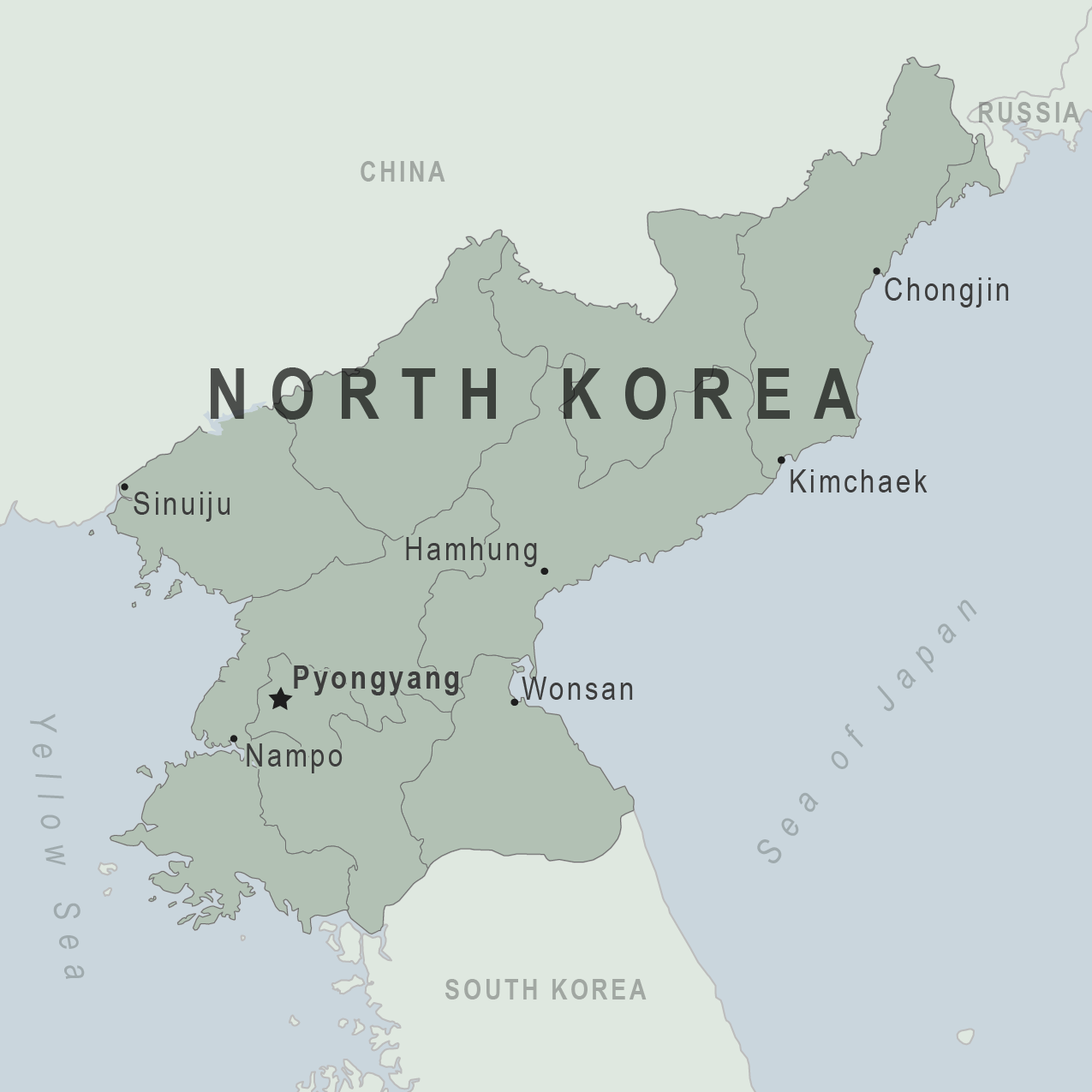
There are no notices currently in effect for North Korea.
⇧ Top
Check the vaccines and medicines list and visit your doctor at least a month before your trip to get vaccines or medicines you may need. If you or your doctor need help finding a location that provides certain vaccines or medicines, visit the Find a Clinic page.
Routine vaccines
Recommendations.
Make sure you are up-to-date on all routine vaccines before every trip. Some of these vaccines include
- Chickenpox (Varicella)
- Diphtheria-Tetanus-Pertussis
- Flu (influenza)
- Measles-Mumps-Rubella (MMR)
Immunization schedules
All eligible travelers should be up to date with their COVID-19 vaccines. Please see Your COVID-19 Vaccination for more information.
COVID-19 vaccine
Hepatitis A
Recommended for unvaccinated travelers one year old or older going to North Korea.
Infants 6 to 11 months old should also be vaccinated against Hepatitis A. The dose does not count toward the routine 2-dose series.
Travelers allergic to a vaccine component or who are younger than 6 months should receive a single dose of immune globulin, which provides effective protection for up to 2 months depending on dosage given.
Unvaccinated travelers who are over 40 years old, immunocompromised, or have chronic medical conditions planning to depart to a risk area in less than 2 weeks should get the initial dose of vaccine and at the same appointment receive immune globulin.
Hepatitis A - CDC Yellow Book
Dosing info - Hep A
Hepatitis B
Recommended for unvaccinated travelers of all ages traveling to North Korea.
Hepatitis B - CDC Yellow Book
Dosing info - Hep B
Japanese Encephalitis
Recommended for travelers who
- Are moving to an area with Japanese encephalitis to live
- Spend long periods of time, such as a month or more, in areas with Japanese encephalitis
- Frequently travel to areas with Japanese encephalitis
Consider vaccination for travelers
- Spending less than a month in areas with Japanese encephalitis but will be doing activities that increase risk of infection, such as visiting rural areas, hiking or camping, or staying in places without air conditioning, screens, or bed nets
- Going to areas with Japanese encephalitis who are uncertain of their activities or how long they will be there
Not recommended for travelers planning short-term travel to urban areas or travel to areas with no clear Japanese encephalitis season.
Japanese encephalitis - CDC Yellow Book
Japanese Encephalitis Vaccine for US Children
CDC recommends that travelers going to certain areas of North Korea take prescription medicine to prevent malaria. Depending on the medicine you take, you will need to start taking this medicine multiple days before your trip, as well as during and after your trip. Talk to your doctor about which malaria medication you should take.
Find country-specific information about malaria.
Malaria - CDC Yellow Book
Considerations when choosing a drug for malaria prophylaxis (CDC Yellow Book)
Malaria information for North Korea.
Cases of measles are on the rise worldwide. Travelers are at risk of measles if they have not been fully vaccinated at least two weeks prior to departure, or have not had measles in the past, and travel internationally to areas where measles is spreading.
All international travelers should be fully vaccinated against measles with the measles-mumps-rubella (MMR) vaccine, including an early dose for infants 6–11 months, according to CDC’s measles vaccination recommendations for international travel .
Measles (Rubeola) - CDC Yellow Book
Rabid dogs are commonly found in North Korea. If you are bitten or scratched by a dog or other mammal while in North Korea, there may be limited or no rabies treatment available.
Consider rabies vaccination before your trip if your activities mean you will be around dogs or wildlife.
Travelers more likely to encounter rabid animals include
- Campers, adventure travelers, or cave explorers (spelunkers)
- Veterinarians, animal handlers, field biologists, or laboratory workers handling animal specimens
- Visitors to rural areas
Since children are more likely to be bitten or scratched by a dog or other animals, consider rabies vaccination for children traveling to North Korea.
Rabies - CDC Yellow Book
Recommended for most travelers, especially those staying with friends or relatives or visiting smaller cities or rural areas.
Typhoid - CDC Yellow Book
Dosing info - Typhoid
Yellow Fever
Required for travelers ≥1 year old arriving from countries with risk for YF virus transmission. 1
Yellow Fever - CDC Yellow Book
Avoid contaminated water
Leptospirosis
How most people get sick (most common modes of transmission)
- Touching urine or other body fluids from an animal infected with leptospirosis
- Swimming or wading in urine-contaminated fresh water, or contact with urine-contaminated mud
- Drinking water or eating food contaminated with animal urine
- Avoid contaminated water and soil
Clinical Guidance
Airborne & droplet.
- Breathing in air or accidentally eating food contaminated with the urine, droppings, or saliva of infected rodents
- Bite from an infected rodent
- Less commonly, being around someone sick with hantavirus (only occurs with Andes virus)
- Avoid rodents and areas where they live
- Avoid sick people
Tuberculosis (TB)
- Breathe in TB bacteria that is in the air from an infected and contagious person coughing, speaking, or singing.
Learn actions you can take to stay healthy and safe on your trip. Vaccines cannot protect you from many diseases in North Korea, so your behaviors are important.
Eat and drink safely
Food and water standards around the world vary based on the destination. Standards may also differ within a country and risk may change depending on activity type (e.g., hiking versus business trip). You can learn more about safe food and drink choices when traveling by accessing the resources below.
- Choose Safe Food and Drinks When Traveling
- Water Treatment Options When Hiking, Camping or Traveling
- Global Water, Sanitation and Hygiene | Healthy Water
- Avoid Contaminated Water During Travel
You can also visit the Department of State Country Information Pages for additional information about food and water safety.
Prevent bug bites
Bugs (like mosquitoes, ticks, and fleas) can spread a number of diseases in North Korea. Many of these diseases cannot be prevented with a vaccine or medicine. You can reduce your risk by taking steps to prevent bug bites.
What can I do to prevent bug bites?
- Cover exposed skin by wearing long-sleeved shirts, long pants, and hats.
- Use an appropriate insect repellent (see below).
- Use permethrin-treated clothing and gear (such as boots, pants, socks, and tents). Do not use permethrin directly on skin.
- Stay and sleep in air-conditioned or screened rooms.
- Use a bed net if the area where you are sleeping is exposed to the outdoors.
What type of insect repellent should I use?
- FOR PROTECTION AGAINST TICKS AND MOSQUITOES: Use a repellent that contains 20% or more DEET for protection that lasts up to several hours.
- Picaridin (also known as KBR 3023, Bayrepel, and icaridin)
- Oil of lemon eucalyptus (OLE) or para-menthane-diol (PMD)
- 2-undecanone
- Always use insect repellent as directed.
What should I do if I am bitten by bugs?
- Avoid scratching bug bites, and apply hydrocortisone cream or calamine lotion to reduce the itching.
- Check your entire body for ticks after outdoor activity. Be sure to remove ticks properly.
What can I do to avoid bed bugs?
Although bed bugs do not carry disease, they are an annoyance. See our information page about avoiding bug bites for some easy tips to avoid them. For more information on bed bugs, see Bed Bugs .
For more detailed information on avoiding bug bites, see Avoid Bug Bites .
Stay safe outdoors
If your travel plans in North Korea include outdoor activities, take these steps to stay safe and healthy during your trip.
- Stay alert to changing weather conditions and adjust your plans if conditions become unsafe.
- Prepare for activities by wearing the right clothes and packing protective items, such as bug spray, sunscreen, and a basic first aid kit.
- Consider learning basic first aid and CPR before travel. Bring a travel health kit with items appropriate for your activities.
- If you are outside for many hours in heat, eat salty snacks and drink water to stay hydrated and replace salt lost through sweating.
- Protect yourself from UV radiation : use sunscreen with an SPF of at least 15, wear protective clothing, and seek shade during the hottest time of day (10 a.m.–4 p.m.).
- Be especially careful during summer months and at high elevation. Because sunlight reflects off snow, sand, and water, sun exposure may be increased during activities like skiing, swimming, and sailing.
- Very cold temperatures can be dangerous. Dress in layers and cover heads, hands, and feet properly if you are visiting a cold location.
Stay safe around water
- Swim only in designated swimming areas. Obey lifeguards and warning flags on beaches.
- Practice safe boating—follow all boating safety laws, do not drink alcohol if driving a boat, and always wear a life jacket.
- Do not dive into shallow water.
- Do not swim in freshwater in developing areas or where sanitation is poor.
- Avoid swallowing water when swimming. Untreated water can carry germs that make you sick.
- To prevent infections, wear shoes on beaches where there may be animal waste.
Keep away from animals
Most animals avoid people, but they may attack if they feel threatened, are protecting their young or territory, or if they are injured or ill. Animal bites and scratches can lead to serious diseases such as rabies.
Follow these tips to protect yourself:
- Do not touch or feed any animals you do not know.
- Do not allow animals to lick open wounds, and do not get animal saliva in your eyes or mouth.
- Avoid rodents and their urine and feces.
- Traveling pets should be supervised closely and not allowed to come in contact with local animals.
- If you wake in a room with a bat, seek medical care immediately. Bat bites may be hard to see.
All animals can pose a threat, but be extra careful around dogs, bats, monkeys, sea animals such as jellyfish, and snakes. If you are bitten or scratched by an animal, immediately:
- Wash the wound with soap and clean water.
- Go to a doctor right away.
- Tell your doctor about your injury when you get back to the United States.
Consider buying medical evacuation insurance. Rabies is a deadly disease that must be treated quickly, and treatment may not be available in some countries.
Reduce your exposure to germs
Follow these tips to avoid getting sick or spreading illness to others while traveling:
- Wash your hands often, especially before eating.
- If soap and water aren’t available, clean hands with hand sanitizer (containing at least 60% alcohol).
- Don’t touch your eyes, nose, or mouth. If you need to touch your face, make sure your hands are clean.
- Cover your mouth and nose with a tissue or your sleeve (not your hands) when coughing or sneezing.
- Try to avoid contact with people who are sick.
- If you are sick, stay home or in your hotel room, unless you need medical care.
Avoid sharing body fluids
Diseases can be spread through body fluids, such as saliva, blood, vomit, and semen.
Protect yourself:
- Use latex condoms correctly.
- Do not inject drugs.
- Limit alcohol consumption. People take more risks when intoxicated.
- Do not share needles or any devices that can break the skin. That includes needles for tattoos, piercings, and acupuncture.
- If you receive medical or dental care, make sure the equipment is disinfected or sanitized.
Know how to get medical care while traveling
Plan for how you will get health care during your trip, should the need arise:
- Carry a list of local doctors and hospitals at your destination.
- Review your health insurance plan to determine what medical services it would cover during your trip. Consider purchasing travel health and medical evacuation insurance.
- Carry a card that identifies, in the local language, your blood type, chronic conditions or serious allergies, and the generic names of any medications you take.
- Some prescription drugs may be illegal in other countries. Call North Korea’s embassy to verify that all of your prescription(s) are legal to bring with you.
- Bring all the medicines (including over-the-counter medicines) you think you might need during your trip, including extra in case of travel delays. Ask your doctor to help you get prescriptions filled early if you need to.
Many foreign hospitals and clinics are accredited by the Joint Commission International. A list of accredited facilities is available at their website ( www.jointcommissioninternational.org ).
In some countries, medicine (prescription and over-the-counter) may be substandard or counterfeit. Bring the medicines you will need from the United States to avoid having to buy them at your destination.
Malaria is a risk in some parts of North Korea. If you are going to a risk area, fill your malaria prescription before you leave, and take enough with you for the entire length of your trip. Follow your doctor’s instructions for taking the pills; some need to be started before you leave.
Select safe transportation
Motor vehicle crashes are the #1 killer of healthy US citizens in foreign countries.
In many places cars, buses, large trucks, rickshaws, bikes, people on foot, and even animals share the same lanes of traffic, increasing the risk for crashes.
Be smart when you are traveling on foot.
- Use sidewalks and marked crosswalks.
- Pay attention to the traffic around you, especially in crowded areas.
- Remember, people on foot do not always have the right of way in other countries.
Riding/Driving
Choose a safe vehicle.
- Choose official taxis or public transportation, such as trains and buses.
- Ride only in cars that have seatbelts.
- Avoid overcrowded, overloaded, top-heavy buses and minivans.
- Avoid riding on motorcycles or motorbikes, especially motorbike taxis. (Many crashes are caused by inexperienced motorbike drivers.)
- Choose newer vehicles—they may have more safety features, such as airbags, and be more reliable.
- Choose larger vehicles, which may provide more protection in crashes.
Think about the driver.
- Do not drive after drinking alcohol or ride with someone who has been drinking.
- Consider hiring a licensed, trained driver familiar with the area.
- Arrange payment before departing.
Follow basic safety tips.
- Wear a seatbelt at all times.
- Sit in the back seat of cars and taxis.
- When on motorbikes or bicycles, always wear a helmet. (Bring a helmet from home, if needed.)
- Avoid driving at night; street lighting in certain parts of North Korea may be poor.
- Do not use a cell phone or text while driving (illegal in many countries).
- Travel during daylight hours only, especially in rural areas.
- If you choose to drive a vehicle in North Korea, learn the local traffic laws and have the proper paperwork.
- Get any driving permits and insurance you may need. Get an International Driving Permit (IDP). Carry the IDP and a US-issued driver's license at all times.
- Check with your auto insurance policy's international coverage, and get more coverage if needed. Make sure you have liability insurance.
- Avoid using local, unscheduled aircraft.
- If possible, fly on larger planes (more than 30 seats); larger airplanes are more likely to have regular safety inspections.
- Try to schedule flights during daylight hours and in good weather.
Medical Evacuation Insurance
If you are seriously injured, emergency care may not be available or may not meet US standards. Trauma care centers are uncommon outside urban areas. Having medical evacuation insurance can be helpful for these reasons.
Helpful Resources
Road Safety Overseas (Information from the US Department of State): Includes tips on driving in other countries, International Driving Permits, auto insurance, and other resources.
The Association for International Road Travel has country-specific Road Travel Reports available for most countries for a minimal fee.
Maintain personal security
Use the same common sense traveling overseas that you would at home, and always stay alert and aware of your surroundings.
Before you leave
- Research your destination(s), including local laws, customs, and culture.
- Monitor travel advisories and alerts and read travel tips from the US Department of State.
- Enroll in the Smart Traveler Enrollment Program (STEP) .
- Leave a copy of your itinerary, contact information, credit cards, and passport with someone at home.
- Pack as light as possible, and leave at home any item you could not replace.
While at your destination(s)
- Carry contact information for the nearest US embassy or consulate .
- Carry a photocopy of your passport and entry stamp; leave the actual passport securely in your hotel.
- Follow all local laws and social customs.
- Do not wear expensive clothing or jewelry.
- Always keep hotel doors locked, and store valuables in secure areas.
- If possible, choose hotel rooms between the 2nd and 6th floors.
Healthy Travel Packing List
Use the Healthy Travel Packing List for North Korea for a list of health-related items to consider packing for your trip. Talk to your doctor about which items are most important for you.
Why does CDC recommend packing these health-related items?
It’s best to be prepared to prevent and treat common illnesses and injuries. Some supplies and medicines may be difficult to find at your destination, may have different names, or may have different ingredients than what you normally use.
If you are not feeling well after your trip, you may need to see a doctor. If you need help finding a travel medicine specialist, see Find a Clinic . Be sure to tell your doctor about your travel, including where you went and what you did on your trip. Also tell your doctor if you were bitten or scratched by an animal while traveling.
If your doctor prescribed antimalarial medicine for your trip, keep taking the rest of your pills after you return home. If you stop taking your medicine too soon, you could still get sick.
Malaria is always a serious disease and may be a deadly illness. If you become ill with a fever either while traveling in a malaria-risk area or after you return home (for up to 1 year), you should seek immediate medical attention and should tell the doctor about your travel history.
For more information on what to do if you are sick after your trip, see Getting Sick after Travel .
Map Disclaimer - The boundaries and names shown and the designations used on maps do not imply the expression of any opinion whatsoever on the part of the Centers for Disease Control and Prevention concerning the legal status of any country, territory, city or area or of its authorities, or concerning the delimitation of its frontiers or boundaries. Approximate border lines for which there may not yet be full agreement are generally marked.
Other Destinations
If you need help finding travel information:
Message & data rates may apply. CDC Privacy Policy
File Formats Help:
- Adobe PDF file
- Microsoft PowerPoint file
- Microsoft Word file
- Microsoft Excel file
- Audio/Video file
- Apple Quicktime file
- RealPlayer file
- Zip Archive file
Exit Notification / Disclaimer Policy
- The Centers for Disease Control and Prevention (CDC) cannot attest to the accuracy of a non-federal website.
- Linking to a non-federal website does not constitute an endorsement by CDC or any of its employees of the sponsors or the information and products presented on the website.
- You will be subject to the destination website's privacy policy when you follow the link.
- CDC is not responsible for Section 508 compliance (accessibility) on other federal or private website.
Cookies on GOV.UK
We use some essential cookies to make this website work.
We’d like to set additional cookies to understand how you use GOV.UK, remember your settings and improve government services.
We also use cookies set by other sites to help us deliver content from their services.
You have accepted additional cookies. You can change your cookie settings at any time.
You have rejected additional cookies. You can change your cookie settings at any time.
- Passports, travel and living abroad
- Travel abroad
- Foreign travel advice
North Korea
Entry requirements.
This advice reflects the UK government’s understanding of current rules for people travelling on a full ‘British citizen’ passport from the UK, for the most common types of travel.
The authorities in North Korea set and enforce entry rules. If you’re not sure how these requirements apply to you, contact the Embassy of the Democratic People’s Republic of Korea ( DPRK ) in London by email at [email protected] , or by telephone on 020 8992 4965 .
Tourists can normally only travel to North Korea as part of an organised tour. Independent travellers will need a sponsor and permission from the Ministry for Foreign Affairs. This is usually only possible for business travellers.
COVID-19 rules
No entry into North Korea is permitted whilst COVID-19 border restrictions remain in place.
Passport validity requirements
Your passport should be valid for the proposed duration of your stay. No additional period of validity beyond this is required.
Check with your travel provider that your passport and other travel documents meet requirements. Renew your passport if you need to.
You will be denied entry if you do not have a valid travel document or try to use a passport that has been reported lost or stolen.
Visa requirements
You will need a visa to enter North Korea. For further information contact the Embassy of the Democratic People’s Republic of Korea ( DPRK ) in London by email at [email protected] , or by telephone on 020 8992 4965.
Applying for a visa
Visa application enquires should be made directly to the embassy.
Vaccination requirements
At least 8 weeks before your trip, check the vaccinations and certificates you need in TravelHealthPro’s North Korea guide .
Registration with the authorities
You must register with the Ministry of Foreign Affairs if your visit is for more than 24 hours. Most hotels will automatically complete this process on your behalf.
Some hotels may insist on full cash payment in advance when you check in.
Customs rules
You must leave any Global Positioning System technology with North Korean customs. You can collect your devices when you leave North Korea.
You can bring a foreign mobile phone into the country, but you must register it at the border. You can only use it with a North Korean SIM card.
Avoid bringing books or other written material in the Korean language, including anything with religious content. Consider carefully any films or television programmes that you bring into the country, either on DVD or on data storage devices. Any literature or media deemed to have an anti-government message or deemed subversive or pornographic by the authorities in North Korea risk confiscation, with severe penalties including imprisonment as a result.
There have also been cases of travel guides being confiscated at the airport on arrival; they are usually returned on departure.
Taking money into North Korea
Shops and restaurants list prices in the local currency (North Korean won) but usually charge foreigners in foreign currency. They convert the won price using official exchange rates.
The euro and US dollar are the most widely accepted currencies, although some places accept Chinese yuan.
It is illegal to import and export the local currency. There are no restrictions on importing and exporting foreign currency, but you must declare it at customs. Credit cards and travellers cheques are not accepted.
Related content
Is this page useful.
- Yes this page is useful
- No this page is not useful
Help us improve GOV.UK
Don’t include personal or financial information like your National Insurance number or credit card details.
To help us improve GOV.UK, we’d like to know more about your visit today. We’ll send you a link to a feedback form. It will take only 2 minutes to fill in. Don’t worry we won’t send you spam or share your email address with anyone.
- aid.govt.nz
- mfat.govt.nz
- NZ Embassies

Official advice for New Zealanders living and travelling overseas
- Before you go
- Quick checklist and tips
- Disability information
- Dual Citizenship
- Going to Australia?
- LGBTQIA+ travellers
- Staying healthy while travelling
- Passports and visas
- Solo travellers
- Travel insurance
- Travelling with a criminal conviction
- Work and income benefits
- Travel advisories
- By destination
- Central Asia
- Central/South America
- Travel tips - travel to Europe
- Middle East
- North America
- Travel tips - travel to the United States
- South East Asia
- About our advisories
- Travel advisory risk levels
- News features
- When things go wrong
- Arrest and detention
- Contingency planning for New Zealanders overseas
- Financial difficulties
- Hostage taking and kidnapping
- Illness and injury
- Internet dating scams
- Internet fraud and international scams
- Large-scale emergency
- Lost, stolen or damaged passport
- Missing persons
- Nuclear incident
- Victims of crime
- Family issues
- Child abductions
- Combating sex crimes against children
- Inter-country adoptions
- Travelling with children
- Our services
- New Zealand embassy locator
North Korea
- Travel Advice /
- Section pages:
- Reviewed: 3 October 2023, 15:55 NZDT
- Still current at: 19 April 2024
- Get updates by RSS
- Get updates by email
Related news features
- Brexit: New Zealanders in the United Kingdom Reviewed: 5 February 2020, 15:15 NZDT
- Travelling as a Dual Citizen Reviewed: 21 January 2020, 11:58 NZDT
- Middle East Respiratory Syndrome Coronavirus (MERS-CoV) Updated: 4 September 2015, 16:23 NZST
- View all news
If you are planning international travel at this time, please read our COVID-19 related travel advice here , alongside our destination specific travel advice below.
Do not travel
Do not travel to North Korea due to extensive restrictions placed on foreigners, serious risk of arrest and detention, and an uncertain security situation that could change with very little warning. The security situation on the Korean Peninsula remains volatile – technically North Korea and South Korea are still at war (level 4 of 4).
Local laws and regulations New Zealanders in North Korea are advised to follow all local laws and regulations and exercise discretion and caution at all times. Foreigners may be arrested, detained or expelled for activities that would not be considered crimes in New Zealand. North Korean authorities have detained a number of foreign visitors in recent years and consequences can be severe.
Independent tourism is not permitted in North Korea and travel within the country is severely restricted – travel must be authorised in advance by the North Korean government. Travel with a guide or as part of a tour does not provide special protection from North Korean laws.
There are strict laws and regulations in North Korea covering the speech, behaviour and movement of foreigners. Foreigners in North Korea are closely monitored by authorities and are expected to be accompanied by a guide at all times. Showing disrespect, including in jest, to the country’s leadership, family, or regime is a crime in North Korea. Unauthorised religious or political activity, photography or filming of anything other than tourist sites, unauthorised travel and unwarranted interaction with local nationals may result in your arrest, long-term detention or expulsion.
We recommend you do not attempt to bring anything into North Korea that could be deemed religious or political in nature. Travellers should assume that authorities will inspect published material and electronic devices and possibly confiscate these items. Possession of prohibited items may itself be considered a crime. Tourist facilities are minimal and telecommunications are unreliable.
Your movement and communications may be under surveillance at all times, even in private spaces, including searching of your belongings in your hotel room and monitoring of your email, internet and phone usage.
New Zealanders considering travel to North Korea should familiarise themselves with the operation of United Nations sanctions and, in particular, with prohibitions on transferring goods to North Korea. The carriage to North Korea of any items on the luxury goods list by any person is prohibited under New Zealand law.
You cannot enter North Korea through the border with South Korea without special permission from the North Korean and South Korean governments.
Political tensions Tensions between North Korea and the international community were high during 2017, as a result of North Korea’s missile and nuclear testing conducted that year. Following a pause in testing in April 2018, North Korea resumed its ballistic missile testing programme in May 2019. There was an unprecedented amount of missile tests in 2022; the high pace has continued in 2023. There are signs that North Korea may resume nuclear testing for the first time since 2017.
The increase in missile testing has contributed to relations with North Korea remaining tense and the situation could deteriorate again with little warning. Due to very limited access to international media, there may be no advance warning about events that could affect your security. We advise New Zealanders to stay informed of local developments as much as possible.
General travel advice New Zealanders travelling or living in North Korea should have comprehensive medical and travel insurance policies in place. Travellers are advised to carry enough cash to enable travel out of the country should a medical or other emergency arise, as money transfers or other arrangements may not be possible. Modern medical facilities in North Korea are basic and hygiene is poor.
Always carry some form of identification. We recommend photocopying valuable documents, and having two copies of your passport, tickets and visa.
Any photography or videos taken outside of tourist areas could result in confiscation of equipment or detention. Avoid taking pictures of transport infrastructure, officials, government buildings, or anything that may give a negative impression of North Korea. If in doubt, don’t take a picture. Follow the advice of your tour group or local authorities.
As there is no New Zealand diplomatic presence in North Korea, the ability of the government to assist New Zealand citizens is severely limited. Even then, some foreign nationals have reportedly not been granted access to consular support when detained in North Korea as is at the discretion of their government.
New Zealanders in or considering travel to North Korea are strongly encouraged to register their details with the Ministry of Foreign Affairs and Trade. If you do choose to travel, stay as short a time as possible, eliminate unnecessary activities and review security arrangements. We offer also advice to New Zealanders about contingency planning .
Foreigners are not permitted to use the local currency (the North Korean Won). Cash is the most acceptable form of payment, with the Euro, USD and Chinese Yuan being the most widely accepted currency. ATM’s are not available, banking facilities are limited and you cannot use your debit or credit card to withdraw currency from the bank.
Travel tips
- For current health alerts
The New Zealand Embassy Seoul, South Korea covers North Korea
Street Address Jeong-Dong Building, Level 8 (West Tower), 15-5 Jeong-Dong, Jung-Gu, Seoul 110-784, Republic of Korea Postal Address KPO Box 2258, Seoul, 110-110, Republic of Korea Telephone +82 2 3701 7700 Fax +82 2 3701 7701 Email [email protected] Web Site http://www.mfat.govt.nz/korea Hours Mon - Fri 0900 - 1230, 1330 - 1730 hrs
See our regional advice for North Asia
Top of page
Share this page:
Related News features
Covered by new zealand embassy south korea.
Telephone: +82 2 3701 7700
Fax: +82 2 3701 7701
Email: [email protected]
Website: http://www.mfat.govt.nz/korea
Hours: Mon - Fri 0900 - 1230, 1330 - 1730 hrs
Related advice from other countries
- United Kingdom
- United States of America
Other pages in this section:
Ministry of Foreign Affairs and Trade 195 Lambton Quay Private Bag 18 901 Wellington 5045 New Zealand
- About this site
- Accessibility

The most important piece of North Korea travel advice is to abide by a few important rules.
Firstly, never speak ill of Kim Il-sung, Kim Jong-il or Kim Jon-un. Criticising the Kims is a huge insult – and also a crime – and could put your entire trip at risk.
Secondly, don’t wander off from your group or guides. Trying to sneak off alone or to see things unaccompanied will land you in a huge heap of trouble.
Finally, be careful what you photograph. The rules on what you can photograph are not as restrictive as you might think – we took over 1000 photos during trip to North Korea.
However, certain things are off limits. Photos of construction sites and military officers are not allowed. Neither are shots of the countryside during the journeys between cities.
Photography is also prohibited inside specific sites, but if in doubt check with your guides. Don’t be surprised if you’re told to delete any photos that your guides might not be happy with.
You'll Hear a Lot About the Kims

It’s impossible to overstate how much the Kim dynasty dominates North Korea . The ubiquitous and glowing statues and portraits of Kim Il-sung and Kim Jong-il are just the tip of a very large iceberg.
The Kim’s cult of personality is inescapable and permeates every aspect of life, including tourist’s trips to the DPRK.
Obvious examples are the visits to the embalmed bodies of the Kims at the Palace of the Sun and their enormous statues at Mansudae Hill Grand Monument , but they’re infused into almost everywhere you visit.
Almost every book in souvenir shops is either written by or about Kim Il-sung or Kim Jong-il. At every place you visit in North Korea your guides will tell you how many times Kim Il-sung or Kim Jong-il visited it. There’s usually a framed red sign above the door to mark the date they came, or a huge framed photo of their visit at the entrance.
The schools, universities, factories and farms that you’re taken to will all have a connection to the Kims, too. They’ll have either visited it, provided guidance there or, supposedly, will have given the order to build it.
Even historic sites that were damaged during the war will have been restored under the orders of one of the Kims. Their words and slogans are even etched into the mountains in Myohyangsan.
Don't Question North Korea's Historical Narrative
Visiting North Korea means having to accept the country’s version of its own history and the history of the region. The North Korean version differs greatly from the reality.
As a totalitarian state with a vice-like grip on all forms of education, media and communication, the ruling regime has created an alternative history for the DPRK that cannot be questioned.
That history suits the narrative that portrays the DPRK as a victim, defending itself from several decades of American imperialism and aggression. Added to this is the complete whitewash of any of North Korea’s sins, of which there are many.

Take anything presented as historical fact with a huge dollop of salt. Many historical claims will be heavily biased, and others will be a complete fiction. The prime example of this is the DPRK’s take on the Korean War .
North Koreans are taught that it was they who were attacked by the South, when in reality it was North Korea’s invasion of South Korea that led to war. If you’re told something that you know not to be true it’s best to hold your tongue and play along.
You Can Talk Politics, Up to a Point
Discussing politics isn’t completely out of the question in North Korea, but if the subject comes up you’ll need to know what to say and how to say it.
One of our guides broached the subject on a couple of occasions, asking about Kim Jong-un’s summits with President Trump and if there was any discussions of the economic sanctions on North Korea being lifted.
It led to a fairly frank conversation about the geopolitical situation that North Korea finds itself in, though caution was obviously required. Our guide wanted to know how the land lay between the US and the DPRK following the summits, and was keen to know the outside world’s view on top of what was reported within the DPRK.
For your own safety its best to play conversations regarding politics involving North Korea safely, but don’t be surprised if you get asked the occasional question about the view from outside the DPRK.

You Can Take Your Phone to North Korea
Despite some reports, you can take your smartphone into North Korea, as well as cameras, laptops and tablets. They will all be inspected by customs officials when you arrive in North Korea. Drones are not allowed into the DPRK.
Be aware that you’ll be offline the entire time that you’re in North Korea. On the whole there is no access to internet or mobile phone network for foreigners in the DPRK, though things may be about to change.
Reports suggest that WiFi is available in the casino in the basement of the Yanggakdo Hotel in Pyongyang. According to NK News the network runs through China and their restrictive firewall, so websites like Google and BBC are still blocked.
Be Good to Your Tour Guides
Tour guides are appointed to every tour group that visits North Korea. They play a dual role of guide and minder, ensuring that visitors behave appropriately whilst providing information and the government line on all of the places you visit.
The guides are far from stern faced state-appointed apparatchik; instead they are the young, friendly and mostly female face of North Korean tourism.

Forming a good bond with your guides will help you to get the most out of your trip to North Korea. Though they’ll never show it, ferrying groups of tourists around the DPRK is a stressful job, especially if tourists are hard to handle.
If there’s any fallout from a badly behaved tour group, it puts them at risk of recriminations from their superiors.
Also, our guides told us that groups that are difficult to handle often miss out on visiting certain sites, such as the Palace of the Sun, as they can’t be trusted to behave themselves. Forming a good relationship and understanding with your guides will make the whole trip much more beneficial for everyone.
You See More of North Korea on a Private Tour
Though more expensive than group tours, if you can afford a private tour to North Korea then it’s worth the extra cost.
Private group tours can be tailored and adjusted to suit you, meaning that you get to see more of the things that you want to see. Trips on group tours tend to be set itineraries that only allow for the odd tweak here and there.
Also, on a private tour your North Korean guides will be dedicated just to you, rather than looking after a group of up to 20 people. This means you’ll have a much more personal service and it allows you the chance to find out much more about the places that you visit and about life in North Korea.

You’ll also be easier to manage, meaning that you can fit a lot more into your daily schedule than if you were in a group. Fewer numbers means that it’s naturally a lot easier to move around and you’re able to do so much more in a day.
Another advantage of a private tour is that you’ll be in a smaller vehicle, giving you the chance to go to places that group tours on coaches just can’t reach. This adds so many more possibilities to your trip, especially if you’re travelling outside of Pyongyang.
As part of our ten day trip to the DPRK, we managed to visit Pakyon waterfall near Kaesong and Paeksang Pavillion in the city of Anju, two places that even our guides hadn’t previously visited.
You Will Get a Few Glimpses of the 'Real' North Korea
It’s often asked of how much of the ‘real’ North Korea you get to see as a tourist in the DPRK. The answer is hard to quantify.
Contact with real North Koreans is extremely limited; you’re obviously not going to have the chance to discuss the Supreme People’s Assembly’s latest legislative proposals with the man on the street.
You’re also in the odd situation whereby the state is trying to show you one version of North Korea whilst you might be trying to look for another.

You probably won’t find the real North Korea – whatever that is – whilst on a tourist trip. But you’ll be surprised by just how much you are allowed to witness.
Whilst being driven around you will see plenty of examples of real life and of things that the North Korean regime itself might not actively promote, from grim Soviet-style housing blocks to old men sat by the road charging cyclists for the use of a bicycle pump.
You’ll see even more if you venture outside of Pyongyang. The countryside is incredibly eye-opening and a world away from the epic monuments and lavish government buildings that line Pyongyang’s streets.
Driving through North Korea’s countryside feels like going back in time, and there’s no hiding the harsh reality of life outside of the cities.
You'll be Taken to Many Places the State Wants You to See
The highlight of a visit to North Korea is the chance to see some of the country’s most well known sites, such as the Kim statues at Mansudae Hill Grand Monument, the Arch of Triumph or the spectacular view from the top of the Juche Tower.
Yet in every trip to North Korea are tours of more everyday sites that the regime is keen for outsiders to see.

You’ll almost certainly be taken to see a school to see performances by phenomenally talented if alarmingly young children. Other common stops are universities, farms and factories, and each is likely to be a little dry and uninspiring.
The visits are obviously propaganda, designed to show North Korea as a highly educated, talented and productive nation blossoming under the leadership of the Workers Party of Korea.
You don’t have to be a hardened cynic to see through it all. For the less entertaining trips it’s best to put on a polite smile and nod occasionally until the tour is over.
North Korean Accommodation is Incredibly Varied
The standard of accommodation in North Korea is always adequate but the quality can fluctuate wildly. It’s recommended that you take a torch when you travel in North Korea in case you’re caught in a power cut whilst at your hotel.
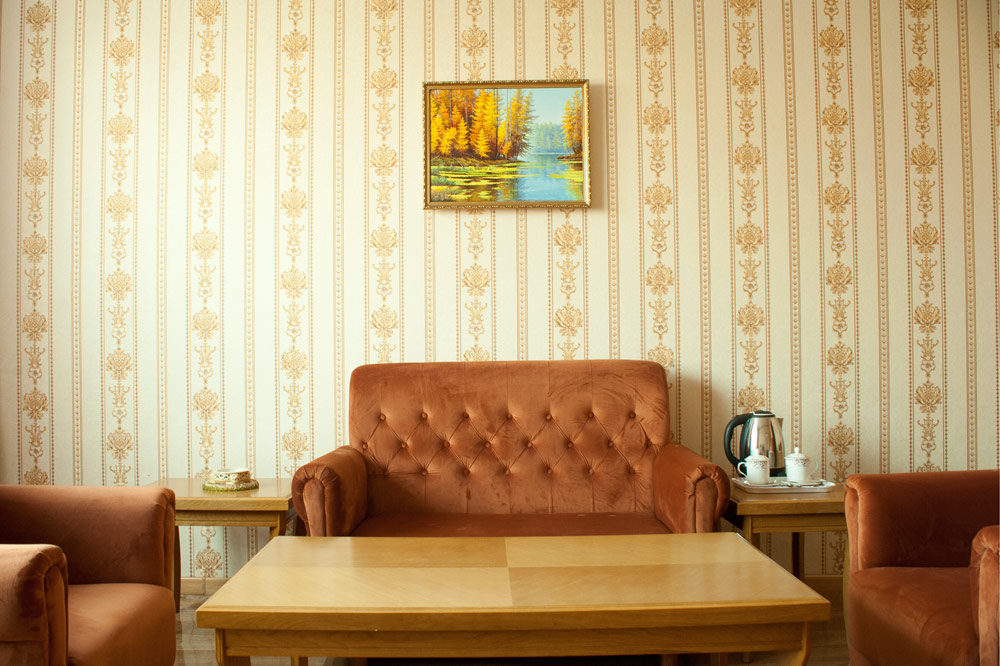
In Pyongyang most tourists usually stay at the Yanggakdo International Hotel , a monolithic tower with over 1000 rooms and a revolving restaurant on top. Filled with amenities to keep tourists entertained, the hotel’s rooms are okay if a bit dated and low on mod cons.
They come with comfortable beds, a television with a few outside news channels and, most importantly of all, hot water and electricity when you need it.
Outside Pyongyang accommodation varies from the more basic to the scarcely believable. In Kaesong our dated hotel suffered from power cuts and hot water was rationed to an hour in the morning and an hour at night. The room was at least warm, with underfloor heating and radiators that didn’t turn off.
The Hyangsan Hotel in Myohyangsan on the other hand was a completely different story altogether. Known as the best hotel in North Korea, the Hyangsan is easily a 5 star hotel by Western standards . How and why it is where it is is a bit of a mystery, yet the bumpy ride from Pyongyang is worth the trip to see the Hyangsan alone.
Bring Enough Money in a Multitude of Currencies
This is where North Korea can get confusing. Foreigners aren’t allowed to spend North Korean Won whilst in the DPRK (the only exception being at the Kwangbok Supermarket ).
Instead, tourists have to use a confusing combination of three foreign currencies when buying anything in North Korea. These are the Chinese yuan, US dollars and Euros. Bring enough of each currency, and ideally in low denominations. Even $10 goes a long way in North Korea, so bring plenty of 5 and even 1 dollar bills.
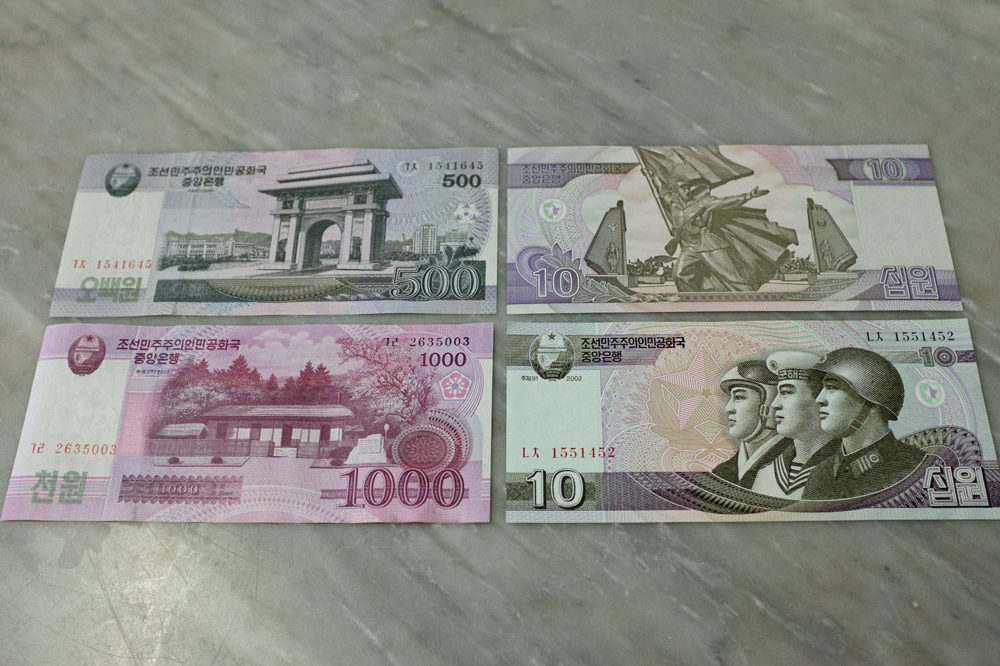
In souvenir shops and in hotels the staff will convert all local prices into whichever currency you wish to pay in. Be aware that your change may come in a different currency than the one you paid in. We received a handful of change in the cafe at the Yanggakdo hotel in US dollars, Euros and Chinese Yuan.
Make sure that you bring enough money for the duration of your trip. If you run out there are no ATM’s. Also, make sure that all notes that you bring into the country are in mint condition. Shop assistants in North Korea will turn away notes that are tattered or badly creased.
Share this:
Explore Even More of Asia:
- What to expect on a ten day tour of North Korea
- The best books on North Korea
- What it’s like to visit the DMZ from both sides of the Korean border
- Five must-see Korean films
- Discover Jeju Island, South Korea’s tropical paradise
- When is the best time to visit Tokyo?

DESTINATIONS TRAVEL ITINERARIES ROAD TRIPS BLOG
ABOUT US CONTACT DISCLAIMER & PRIVACY POLICY SUBSCRIBE
POPULAR DESTINATIONS
JAPAN AUSTRALIA SINGAPORE NEW ZEALAND
SUBSCRIBE TO OUR NEWSLETTER
© WhereYoureBetween.com – 2023
Cookie Consent
Cookies help us deliver our services. By continuing to browse this site, you agree to our use of cookies.
There's a World Out There. Let's Go!
Sign up to our email newsletter for a monthly(ish) dose of wanderlust

Search Smartraveller

North Korea (Democratic People's Republic of Korea)
Latest update.
Do not travel to North Korea due to the very different laws affecting visitors and the uncertain security situation.
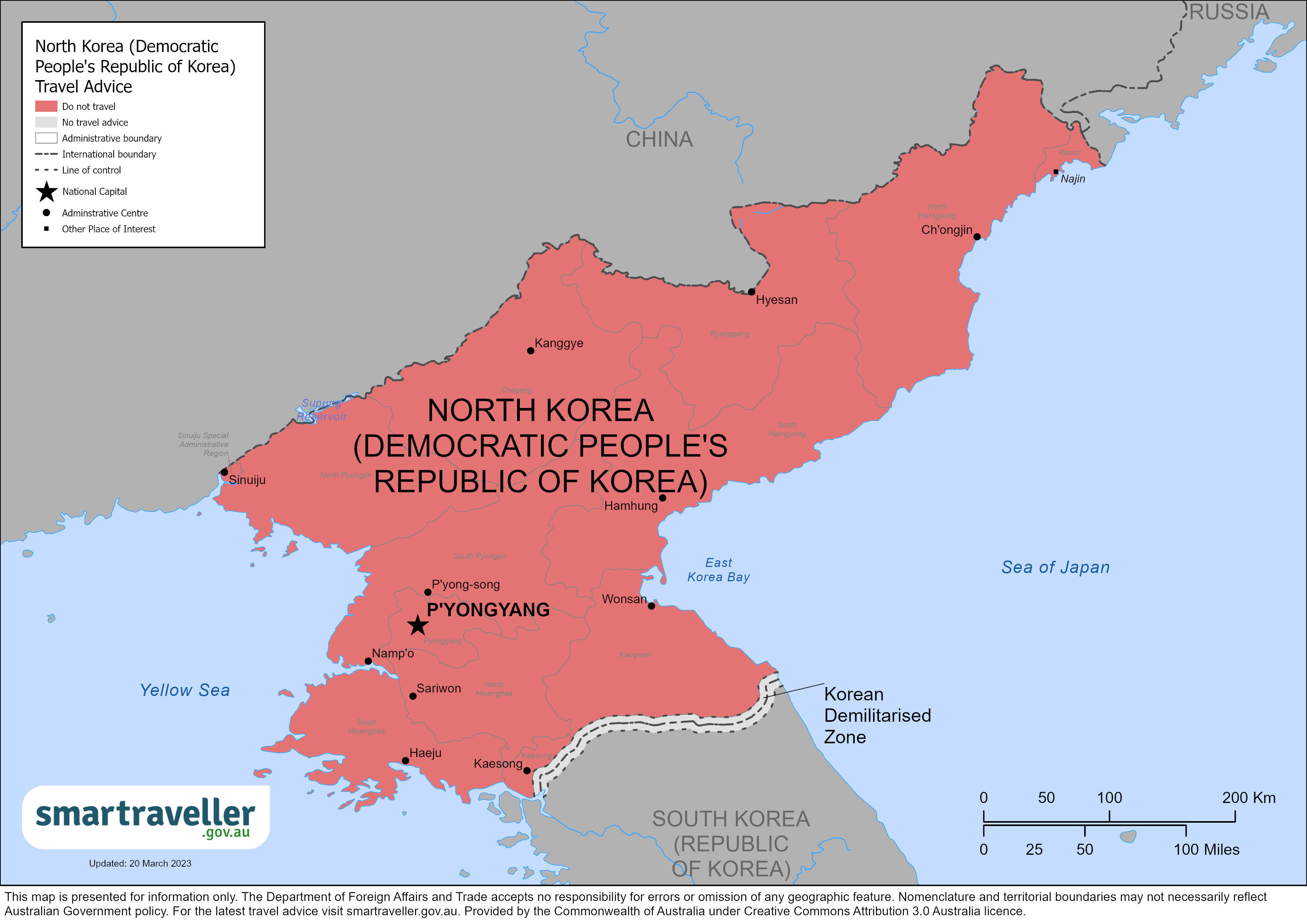
North Korea (PDF 247.16 KB)
Asia (PDF 2.21 MB)
Advice levels
Do not travel to North Korea.
- North Korea and South Korea are technically still at war, and tensions have increased in recent times. North Korea frequently conducts missile tests or other provocations, raising regional tensions. Monitor developments.
- The North Korean Government restricts information, especially about domestic politics and international relations. You can usually access international satellite TV channels at some tourist hotels. However, if the government shuts these down in a crisis, you may not know what's happening. Monitor state broadcasts and, if possible, international media for signs of increasing tensions.
- Crime against travellers is rare. However, some travellers have reported petty crimes. Keep your passport and belongings close, especially at Pyongyang Airport and in public markets.
- The rainy season is from late June to late August. Typhoons can happen in August and September. Excessive rain can cause flooding and landslides, damage housing and infrastructure, and may disrupt essential services. Know your hotel's evacuation plan.
- North Korea and neighbouring countries experience earthquakes. Large earthquakes can make destructive tsunamis more likely. Don't wait for official warnings, alarms or sirens. Know the tsunami warning signs and move to high ground straight away if you're on the coast.
Full travel advice: Safety
- Medical facilities are basic, including in Pyongyang, and hygiene is poor. Avoid surgery unless you need it to leave North Korea. If you're seriously ill or injured, you'll need medical evacuation to China for treatment. Contact the Swedish Embassy in Pyongyang or if possible, the Australian Embassy in Seoul for assistance. Medical evacuations are very expensive and difficult to organise. Ensure your travel insurance covers this.
- Insect-borne, waterborne, foodborne, and other infectious diseases are risks in North Korea. Ensure you have the appropriate vaccinations and bring preventative medication. Practice good personal hygiene, avoid raw or undercooked foods and drink only boiled or bottled water.
- Medications can be very hard to get in North Korea. If you plan to bring medication, check if it's legal. Take enough legal medicine for your trip.
- From March to May, strong winds carry yellow dust to the Korean Peninsula from Mongolia and China. This can cause eye, nose, mouth and throat irritations. Get medical advice if you have heart or breathing problems.
Full travel advice: Health
- Travelling as part of a tour or with a guide doesn't give you special protection from North Korean laws. Authorities may arrest, detain or expel you for activities that aren't crimes in Australia. They may also search your belongings and monitor your communications.
- Don't use or carry illegal drugs. Penalties for drug offences are severe and parole is unlikely. Drug traffickers can get indefinite jail sentences.
- Authorities may judge many activities as spying. Be very careful when taking photos. It's illegal to photograph anything other than designated public tourist sites. Always ask your North Korean guide for permission before taking photos.
- North Korea has strict laws about what you can bring into the country. It's illegal to bring in religious, pornographic or political items. Declare all published material and electronic devices when you arrive. It's also illegal to knowingly or unknowingly possess items that breach North Korean law.
- Be careful who you talk to and what you say. It's illegal to show disrespect or make jokes about North Korea, current or former leaders or their families. It's also illegal to talk to North Koreans without authorisation. Authorities may consider it spying if you do. Only shop at stores designated for foreigners.
- North Korea doesn't recognise dual nationality. The North Korean authorities may permit limited or no consular assistance to detained dual nationals. This includes Australians of Korean heritage, including those originally from South Korea. Australian-South Korean dual nationals may need permission from South Korean authorities to travel to North Korea.
Full travel advice: Local laws
- If despite our advice, you travel to North Korea, you'll need a visa for all types of travel. North Korea doesn't have an embassy or consulate in Australia. This means you need to travel to another country, such as China, to get your visa. If you're travelling for business, you'll need a North Korean sponsor and permission from the Ministry of Foreign Affairs. Journalists must get a special visa. Entry and exit conditions can change at short notice. You should contact the nearest embassy or consulate of North Korea for the latest details.
- Tours to North Korea have been suspended until further notice for most nationalities including Australians. If North Korea re-opens its borders to other countries, you may have to travel via Beijing, requiring a double-or multiple-entry visa for China. Without such a visa, you won't be able to re-enter China when you leave North Korea. Contact the Embassy or Consulate of the People's Republic of China for details.
- Travellers must register with North Korean government authorities within 24 hours of arriving. Do this through your host organisation or hotel.
- The local currency is the North Korean Won, although foreigners are not permitted to use it. Foreigners are required to use foreign currency. The Euro is the most widely accepted foreign currency. US dollars and Chinese yuan are also widely accepted. Exchanging currencies is difficult. You can't use ATMs, traveller's cheques, or debit and credit cards. Take enough foreign currency for your trip in small denominations.
- You can only travel on an official tour. An official guide must always accompany you. Charges for travel can be high, including for taxis, guides, tolls and permits.
Full travel advice: Travel
Local contacts
- The Consular Services Charter details what we can and can't do to help you overseas.
- Australia doesn't have an embassy in North Korea. We aren't able to provide regular consular services to Australian citizens in North Korea. Our ability to provide consular services in North Korea is extremely limited. The Australian Embassy in Seoul may be able to provide limited consular assistance to Australians in North Korea, although it is not possible to contact the Embassy in Seoul directly from North Korea. If you're arrested or detained, North Korean authorities may deny you consular access to Australian officials.
- The Swedish Embassy in Pyongyang serves as the 'protecting power' for Australia and provides limited emergency consular services. There may be reduced capacity from the Swedish Embassy to offer consular assistance. The North Korean authorities may delay or deny your access if you are arrested or detained.
- If despite our advice, you travel to North Korea, consider registering your travel to North Korea with the Australian Embassy in Seoul.
- To stay up-to-date with local information, follow the Australian Embassy in Seoul's social media accounts to the extent possible.
- If you require consular assistance, please contact the Swedish Embassy in Pyongyang or, if possible, the Australian Embassy in Seoul.
Full travel advice: Local contacts
Full advice
Civil unrest and political tension.
Since the practical end of the Korean War in 1953, the Korean Peninsula has been divided by a demilitarised zone (DMZ), which separates:
- North Korea or the Democratic People's Republic of Korea (DPRK)
- South Korea or the Republic of Korea (ROK)
An armistice agreement helps to maintain peace. However, North and South Korea are still technically at war and relations are tense. Tensions have increased in recent times.
South Korean and North Korean militaries sometimes exchange artillery fire across lines of control.
Security and tension
The security situation on the Korean Peninsula can worsen with little warning.
North Korea regularly conducts ballistic missile launches and has conducted underground nuclear tests. These activities increase tension in the region.
North Korea regularly makes hostile statements about other countries, including Australia.
North Korea says it can't guarantee the safety of embassies and international organisations in the country if there's conflict.
Access to information
North Korea is a closed society.
Authorities restrict access to information. What's available is unreliable. There's very little, if any, information about internal politics.
You can usually access international satellite TV channels at hotels that international travellers use, although these are often censored and can be quickly disrupted.
Civil unrest, internal instability or tension on the Korean Peninsula could rise quickly. Your access to information, including via international news channels, can be quickly cut off.
If, despite the risks, you travel to North Korea:
- take the necessary precautions to ensure your safety
- pay close attention to your personal security
- monitor state broadcasts and other local sources for signs of rising tension, civil unrest or internal instability
- if possible, monitor South Korean and other media for security risks
- you should notify the Australian Embassy in Seoul of your travel plans
Crime against travellers is rare. However, some travellers have reported petty crimes.
Keep your passport and belongings close particularly:
- at Pyongyang airport
- in public markets
Cyber Security
You may be at risk of cyber-based threats during overseas travel to any country. Digital identity theft is a growing concern. Your devices and personal data can be compromised, especially if you’re connecting to Wi-Fi, using or connecting to shared or public computers, or to Bluetooth.
Social media can also be risky in destinations where there are social or political tensions, or laws that may seem unreasonable by Australian standards. Travellers have been arrested for things they have said on social media. Don't comment on local or political events on your social media.
More information:
- Cyber security when travelling overseas
Kidnapping can happen anywhere, anytime, including destinations that are typically at lower risk. The Australian Government's longstanding policy is that it doesn't make payments or concessions to kidnappers.
Terrorism is a threat throughout the world.
Terrorist threats
Climate and natural disasters
North Korea experiences natural disasters and severe weather , including:
- flooding and landslides
- earthquakes
In an emergency, our ability to provide consular assistance, if any, will likely be severely limited.
If a natural disaster occurs:
- exercise caution
- stay away from affected areas
- secure your passport in a safe, waterproof location
- follow the advice of local authorities
- monitor local media and other sources
- keep in contact with friends and family
Check with tour operators before travelling to affected areas.
Register with the Global Disaster Alert and Coordination System to receive alerts on major disasters.
Typhoons and severe weather
The rainy season is from late June to late August.
Excessive rainfall can cause flooding and landslides, damage housing and infrastructure, and may disrupt essential services. Flash flooding can occur after short periods of rain.
August to September is typhoon season, but typhoons may occur at other times.
Flooding is common during the rainy season and may disrupt transport and other essential services. Check if severe weather has affected the areas where you plan to travel.
The direction and strength of typhoons can change with little warning.
If a typhoon approaches:
- know your hotel evacuation plans
- identify your local shelter
If you stay:
- adequate shelter might not be available
- flights could be delayed, suspended or fill quickly
- ports may close
Contact your airline for flight updates.
World Meteorological Organisation Severe Weather Information Centre
Earthquakes and tsunamis
Earthquake activity on the Korean Peninsula is low for the region. However, North Korea and neighbouring countries do experience earthquakes. Large earthquakes, predominantly in neighbouring countries, can cause destructive tsunamis that may affect the Korean Peninsula.
Get updates on earthquakes and tsunamis from the US Tsunami Warning Center .
If there's an earthquake or tsunami:
- follow our advice for natural disasters
- move to higher ground right away if you're on the coast
Don't wait for official warnings, such as alarms or sirens. Once on high ground, check local media.

Travel insurance
Get comprehensive travel insurance before you leave.
Your policy needs to cover all overseas medical costs, including medical evacuation. The Australian Government won't pay for these costs.
You'll probably need a specialised insurance policy that covers travel to high-risk destinations. Most Australian policies won't cover you for travel to North Korea.
If you can't afford travel insurance, you can't afford to travel. This applies to everyone, no matter how healthy and fit you are.
If you're not insured, you may have to pay many thousands of dollars up-front for medical care.
- what activities and care your policy covers
- that your insurance covers you for the whole time you'll be away
Physical and mental health
Consider your physical and mental health before you travel, especially if you have an existing medical condition.
See your doctor or travel clinic to:
- have a basic health check-up
- ask if your travel plans may affect your health
- plan any vaccinations you need
Do this at least 8 weeks before you leave.
If you have immediate concerns for your welfare or the welfare of another Australian, call the 24-hour Consular Emergency Centre on +61 2 6261 3305 or contact your nearest Australian Embassy, High Commission or Consulate to discuss counselling hotlines and services available in your location.
- General health advice
- Healthy holiday tips (Healthdirect Australia)
Medications
Not all medication available over the counter or by prescription in Australia is available in other countries. Some may even be considered illegal or a controlled substance, even if prescribed by an Australian doctor.
Medications can be very hard to get in North Korea.
If you plan to bring medication, check if it's legal in North Korea. Take enough legal medicine for your trip.
Carry a copy of your prescription and a letter from your doctor stating:
- what the medication is
- the required dosage
- that it's for personal use
Health risks
Insect-borne illnesses
Malaria is a risk, especially in the south of the country from May to September.
Japanese encephalitis is also a risk.
To protect yourself from disease:
- make sure your accommodation is insect-proof
- use insect repellent
- wear long, loose, light-coloured clothing
- consider taking medicine to prevent malaria
- get vaccinated against Japanese encephalitis before you travel
Infectious diseases
Other health risks
- Waterborne, foodborne and other infectious diseases occur, including:
- tuberculosis
Intestinal worm infections, such as roundworm, are common. These can affect travellers.
Get advice on preventative medicine for intestinal worms.
Hand, foot and mouth disease
Hand, foot and mouth disease (HFMD) is common.
Serious outbreaks sometimes occur. Outbreaks usually start in March and peak in May but can continue until October each year.
The disease mostly affects children aged under 10 years. Adult cases, especially in young adults, are not unusual.
Signs of HFMD include fever and blisters and rashes on the hands, feet and buttocks.
The disease is spread by direct contact with nose and throat discharges and faeces of infected people.
To protect yourself from illness:
- boil drinking water or drink bottled water from bottles with sealed lids
- avoid ice cubes
- avoid raw and undercooked food, such as salads
- wash your hands frequently and thoroughly
Yellow dust
Yellow dust is carried to the Korean Peninsula by strong winds from Mongolia and China from March to May.
The dust can:
- cause eye, nose, mouth and throat irritations
- make breathing and heart problems worse
To protect yourself:
- stay indoors as much as possible
- avoid exercising outdoors on days of high yellow dust concentration
- speak to a doctor if you're concerned about symptoms
Medical facilities
The standard of medical facilities is basic and hygiene is poor. This includes in Pyongyang.
Avoid surgery unless you need it to leave North Korea.
The Friendship Hospital has English-speaking doctors for travellers. The hospital is in the Munsudong District of Pyongyang. Like other hospitals in North Korea, it may:
- lack heating and medical supplies
- have power outages and other difficulties
The Friendship Hospital may not have strong infection control capabilities. Healthcare standards in North Korea mean that adequate care could not be provided to both residents and travellers in the event of a mass casualty incident or epidemic.
The cost of medical treatment is high.
You may need to pay cash up-front, usually in euros, before a hospital will treat you.
Travel from rural areas to Pyongyang for medical emergencies can be long and difficult.
Medical evacuation
Since January 2020, North Korean authorities have severely restricted flights in and out of North Korea. This makes medical evacuation difficult.
If you become seriously ill or injured, you'll need to be evacuated to China for treatment. Contact the Swedish Embassy in Pyongyang or if possible, the Australian Embassy in Seoul for assistance.
Medical evacuation can be very expensive. It can also be difficult to arrange quickly. You may face delays getting the required approvals or booking flights. There are few regular flights from North Korea.
You and your medical escorts will also need visas for China for evacuation.
Authorities don't allow evacuation across the demilitarised zone to South Korea.
You're subject to all local laws and penalties, including those that may appear harsh by Australian standards. Research local laws before travelling.
If you're arrested or jailed, the Australian Government will do what it can to help you under our Consular Services Charter . But we can't get you out of trouble or out of jail. If you are arrested or detained, ask North Korean officials to notify the Embassy of Sweden immediately.
Travelling as part of a tour or with a guide offers no special protection from North Korean laws.
Arbitrary arrest and detention
Authorities have arrested and detained foreigners, including Australians.
Culture and politics influence authorities when they're making arrests, not just the law.
You may be arrested, detained or expelled for activities that aren't crimes in Australia.
Authorities closely watch travellers. They may search belongings in your hotel room or monitor your email, internet, phone and fax usage.
Penalties for drug offences are severe. Trafficking can result in an indefinite jail sentence.
Parole is rare in drug-related cases.
Carrying or using drugs
Authorities make arrests and detain people for many activities. Penalties can be very harsh.
Many seemingly innocent activities may be perceived as spying.
It's illegal to take photos of anything other than designated public tourist sites. This includes:
- roads and bridges
- rail stations
- government buildings
- scenes of poverty
- anything that may give a negative impression of North Korea
Always ask your North Korean guide for permission before taking photos.
It's illegal to:
- bring items that may be seen as religious, pornographic or political
- not declare published material or electronic devices when you enter
- knowingly or unknowingly possess items that breach North Korean law
- show disrespect or make jokes about North Korea, current or former leaders or their families
- engage in an unauthorised currency transaction
- shop at stores not designated for foreigners
It's also illegal to talk to North Koreans without authorisation. This may be perceived as spying.
If you're involved in a civil or commercial dispute, authorities can stop you leaving the country.
Australian laws
Australia has sanctions against North Korea . It is prohibited to supply, sell, or transfer to North Korea (directly or indirectly) goods other than food and medicine unless authorised. It is also prohibited to procure or receive goods other than food and medicine from North Korea unless authorised. Be aware that Australia's sanctions prohibit the transfer of luxury goods to North Korea.
Australians travelling to North Korea can carry items on the luxury goods lists for personal use only. You must not sell or give these items to others.
Some Australian criminal laws still apply when you're overseas. If you break these laws, you may face prosecution in Australia.
Staying within the law and respecting customs
Dual citizenship
North Korea doesn't recognise dual nationality.
If you're a dual citizen, this limits the consular services we can provide if you're arrested or detained. This includes if you're an Australian of Korean heritage, including if you're originally from South Korea.
If you're a South Korean-Australian dual citizen, you may need to get approval from South Korean authorities to travel to North Korea.
Get advice from a South Korean embassy or consulate before you travel.
Dual nationals
Local customs
Same-sex relationships are not explicitly illegal in North Korea. However, authorities don't find them acceptable. Be discrete.
- LGBTI travellers
Visas and border measures
Every country or territory decides who can enter or leave through its borders. For specific information about the evidence you'll need to enter a foreign destination, check with the nearest embassy, consulate or immigration department of the destination you're entering.
If despite our advice, you travel to North Korea, you need a visa for all types of travel.
If you arrive without a valid visa, you may be:
- denied entry
There is no longer a North Korean embassy or consulate in Australia. This means you need to travel to another country, such as China or Indonesia, to get your visa for North Korea.
You may need to provide recent international travel itineraries to apply for a visa. You may also have to show these when you arrive in North Korea.
Other visas
Business travellers generally need:
- sponsorship by a North Korean organisation
- permission from the North Korean Ministry of Foreign Affairs
Professional journalists must apply for special permission to visit. Authorities do not permit journalists to enter the country on a tourist visa.
Entry and exit conditions change regularly. Contact the Embassy of the Democratic People's Republic of Korea in Indonesia for details about visas, currency, customs and quarantine rules.
Border measures
You'll likely need a double or multiple-entry visa for China if you're travelling through China to or from North Korea. Otherwise, you won't be able to re-enter China when you leave North Korea. Contact the Embassy or Consulate of the People's Republic of China for details.
Travel advice for China
Other formalities
Australia has sanctions against North Korea that limit what you can take with you. See Local laws.
When entering North Korea, you need to declare all:
- published material, such as books, academic papers and pamphlets
- communications devices, such as mobile phones, satellite phones, GPS receivers and radios
Assume that authorities will inspect published material and electronic devices and possibly confiscate them. Speak to your tour operator if you have concerns.
If authorities don't confiscate your controlled items, you may need to leave them at the customs checkpoints. You may be able to collect them when you leave.
You may be quarantined if you show medical symptoms of a serious communicable disease.
Embassy or consulate of North Korea
Register on arrival
Travellers must register with government authorities within 24 hours of arrival in North Korea. You can do this through your host organisation.
If you stay in a hotel, confirm at check-in that your hotel will take care of your registration.
Some countries won't let you enter unless your passport is valid for 6 months after you plan to leave that country. This can apply even if you're just transiting or stopping over.
Some foreign governments and airlines apply the rule inconsistently. Travellers can receive conflicting advice from different sources.
You can end up stranded if your passport is not valid for more than 6 months.
The Australian Government doesn't set these rules. Check your passport's expiry date before you travel. If you're not sure it'll be valid for long enough, consider getting a new passport .
Lost or stolen passport
Your passport is a valuable document. It's attractive to people who may try to use your identity to commit crimes.
Some people may try to trick you into giving them your passport. Always keep it in a safe place.
If your passport is lost or stolen, tell the Australian Government as soon as possible:
- In Australia, contact the Australian Passport Information Service .
- If you're overseas, contact the nearest Australian embassy or consulate .
Passport with 'X' gender identifier
Although Australian passports comply with international standards for sex and gender, we can’t guarantee that a passport showing 'X' in the sex field will be accepted for entry or transit by another country. Contact the nearest embassy, high commission or consulate of your destination before you arrive at the border to confirm if authorities will accept passports with 'X' gender markers.
The local currency is the North Korean Won (KPW). Foreigners are not allowed to use the Won. Foreigners are required to use foreign currency.
The euro is the most widely accepted foreign currency. US dollars and Chinese yuan are also widely accepted.
Changing currencies in North Korea is difficult.
Banking facilities are limited and traveller's cheques aren't accepted.
ATMs are not available.
You can't use a debit or credit card to withdraw cash from a bank.
Some shops and restaurants catering to travellers might convert foreign currency so you can pay.
Use cash. Take small denominations of foreign currency, as you may not be able to get change from large denominations.
Local travel
North Korea doesn't allow independent tourism. Authorities restrict travel within the country.
Authorities only allow tourism in groups organised by North Korean officials or by approved travel agencies.
An official guide must always accompany travellers.
You may have to show your identity documents at police checkpoints when entering and leaving towns.
Travellers often report that charges for travel can be high and arbitrary, including charges for:
- hire vehicles
Communications
Assume that authorities are monitoring all your phone conversations. This includes your mobile if it wasn't confiscated when you arrived.
International phone lines may be disconnected without notice.
Some hotels in Pyongyang allow direct dial international phone calls. Charges are high.
Internet access is severely restricted.
Communications are unreliable.
Direct telephone calls to or from South Korea are not possible.
Necessities
You can buy food and clean water with hard currency at some hotels and restaurants.
Energy and pharmaceutical shortages are common.
Road travel
Tour operators or sponsors usually provide road transportation.
Expect regular delays with vehicles and passengers needing to clear through checkpoints.
Highways are relatively good. Rural and some suburban roads can be in a poor state.
Tourists are generally not allowed to drive.
Vehicles may be old and break down.
Public transport
Authorities restrict foreigners’ use of public transport , including the rail network.
Ask your tour operator or guide about public transport or rail travel.
If you're travelling by train, expect long delays due to power outages.
Many coastal areas are sensitive.
If you travel to North Korea by sea, your vessel could be detained or fired on.
Flights to and from North Korea are regularly cancelled or delayed.
Sanctions are in place that affect North Korean service providers, including airlines. Check with your tour operator or airline before you travel.
DFAT doesn't provide information on the safety of individual commercial airlines or flight paths.
Check North Korea's air safety profile with the Aviation Safety Network.
Emergencies
Research and carry contact information for local police, medical facilities and your host organisation.
Depending on what you need, contact your:
- family and friends
- travel agent
- insurance provider
Consular contacts
Read the Consular Services Charter for what the Australian Government can and can't do to help you overseas.
Australia doesn't have an embassy in North Korea. The Australian Embassy in Seoul provides consular assistance to Australians in North Korea, although our capacity to do so is very limited.
If you're arrested or detained, North Korean authorities may deny you consular access to Australian officials.
The Swedish Embassy in Pyongyang serves as the 'protecting power' for Australia and provides limited emergency consular services. The Swedish Embassy may have reduced capacity to offer consular assistance, and North Korean authorities may deny access to consular officials.
If despite our advice, you travel to North Korea, consider registering your travel to North Korea by advising the Australian Embassy in Seoul.
If you require consular assistance, please contact the Australian Embassy in Seoul if you're able, or the Swedish Embassy in Pyongyang .
Australian Embassy, Seoul
19th floor, Kyobo Building
Seoul 03154, Republic of Korea
Phone: +82 2 2003 0100
Fax: +82 2 2003 0196
Website: southkorea.embassy.gov.au
Check the Embassy website for details about opening hours and any temporary closures.
South Korean phone numbers can't be called directly from within North Korea.
Embassy of Sweden, Pyongyang
Munsudong 3
Taedonggang District
Democratic People's Republic of Korea
Phone: (+46) 8 405 10 00
Email: [email protected]
Website: swedenabroad.se/en/embassies/north-korea-pyongyang
24-hour Consular Emergency Centre
In a consular emergency, if you can't contact an embassy, call the 24-hour Consular Emergency Centre on:
- +61 2 6261 3305 from overseas
- 1300 555 135 in Australia

Travelling to North Korea?
Sign up to get the latest travel advice updates..
Be the first to know official government advice when travelling.

Everything You Need to Know About Traveling to North Korea
Are you thinking of traveling to North Korea but unsure of how to make it happen? Start by reading this North Korea travel guide.
I’ve visited North Korea, or officially, the Democratic People’s Republic of Korea (DPRK) twice: once in 2015 ( Pyongyang / DMZ + Kaesong / Mount Kumgang / Wonsan ) and once in 2018 (Rason). However, I rarely brag about visiting North Korea because it isn’t a place I would encourage just anyone to visit. It’s not relaxing or enjoyable. It’s…mentally challenging, to say the least.
You should not travel to North Korea unless you’re willing to consider a perspective different from what mainstream western media tells you. Your experience of North Korea hinges on how you frame it, and it’s vital that you go with an open mind. In fact, I believe I had an easier time digesting and understanding my North Korea travel experiences because of my East Asian heritage, but still I’m struggling to put them all in words.
People who learn that I’ve traveled to North Korea always ask the same questions about how they can do it too, so I finally decided to write this guide to answer all the questions (and bust all the myths). If there’s something you want to know that’s not mentioned here, please leave a comment and I’ll reply!

Can anyone travel to North Korea?
There’s a misconception that it’s almost impossible to visit North Korea when in fact, almost anyone can go to North Korea (except South Korean citizens). Even US citizens were previously able to go but following the high-profile case of Otto Warmbier, the US Department of State has for now banned citizens from traveling to North Korea .
While almost anyone can visit North Korea for tourism, you do not get to go around North Korea freely. You must join a tour, and only travel agencies approved by the North Korean government can organize tours to North Korea. Many of these tours have itineraries covering the same state-designated destinations and attractions.
Throughout your visit, you will be accompanied by at least two North Korean guides from the state-owned tourism bureaus such as KITC (Korea International Travel Company). They are the only North Koreans you’ll interact with extensively for the entire length of your stay.
But you’re not allowed to take photos, right?
Photography is definitely allowed in North Korea, as you can see from this post and others on this site. There are indeed some restrictions: you’re not allowed to take photos of military buildings and vehicles, soldiers in uniform, buildings under construction, or monuments undergoing maintenance. You will be cautioned not to crop any photos of the Great Leader (Kim Il Sung) or Dear Leader (Kim Jong Il). If you try to take a photo when it’s prohibited, your guides will stop you.
The North Korean government is extremely conscious of its image, and it’s understandable if you think about it. After all, photos of North Korea are often used by western media to paint the country in a negative light. The guides I’ve met know all too well how their country is perceived, and that likely reinforces what they’ve learned: to have great pride in what they’ve been able to achieve despite a lack of resources.
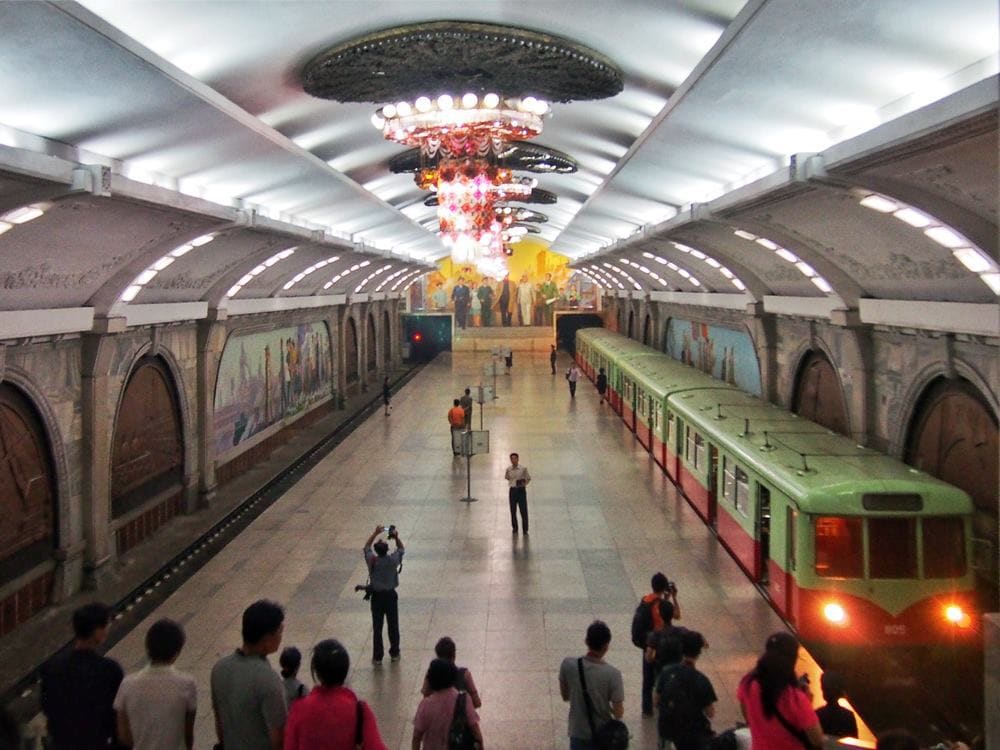
Is it very expensive to visit North Korea?
I find that North Korea tour costs are similar to any group adventure tour with accommodation, transport, and meals included. Expect a 5-night tour to cost around 1,200-1,700 euro with return Beijing-Pyongyang flights (entry/exit by rail should be cheaper). This does not include drinking water or tips and gratuities.
When choosing from North Korea travel operators, it’s more important to check their reputation and see what unique itineraries they offer.
Which tour operators would you recommend?
As with other East Asian countries, mutual trust and relationships are deeply rooted in the culture and a trusted North Korea tour company/agent will have latitude to offer more special tours. Koryo Tours and Juche Travel both have a good track record and in-depth knowledge to help you plan your trip (I’m not affiliated with either company).
Your North Korea tour company should guide you through the logistics of your trip, handle visa processing for you, and inform you on all the latest rules and regulations. That brings us to the most important question:
Is it safe to travel to North Korea?
You’re always looked after by guides, food is clean and tasty, and you’re unlikely to become a victim of crime. So yes, it’s safe to travel to North Korea, as long as you follow the rules.
I know what you’re thinking: that the North Korean tourism rules are meant to restrict tourists’ freedom and paint a false picture of the country. Whether you agree with this or not, you need to respect the rules and local laws of any place you visit. Some North Korea tourism rules include:
- Camera lenses beyond a certain zoom level are not allowed.
- Your passport will be kept by your guides upon arrival and returned at departure.
- All devices (mobile phones, cameras, laptops) will be inspected upon entry and exit to/from North Korea. Make sure your phone does not contain any religious or politically sensitive content (e.g. remove Bible apps, existing photos, etc.)
- You must pay respects when visiting statues of North Korea’s leaders Kim Il Sung and Kim Jong Il, or other national monuments.
- Be respectful to guides. Do not ask provocative questions or argue against their narrative.
- You are allowed to talk to locals, but they are very wary of foreigners and most do not speak English or other foreign languages.
- Do not bring any magazines or religious material into North Korea.
- Most North Korea tour companies will allow you to blog about your experience, but journalists are not allowed to visit as tourists or sell stories/images to news publications unless you receive special permission.
Not following the rules means you risk getting yourself, the tour company, and possibly even your North Korean guides in trouble. However, as long as you play by the rules, you’ll be able to glean quite a bit of knowledge beyond what you’re shown or told.

Isn’t it unethical to support the North Korean regime through our tourism?
Discussion about safety when traveling to North Korea inevitably lead to moral concerns about supporting the DPRK regime through tourism. Even if you disagree with how the country is governed, visiting in person is the best way to understand North Korea’s nuances and complexities. Think of it this way: your moral obligation, if any, is to learn as much as possible to make it worth the trip.
Reading up on a place before visiting is always a plus, but for travel to North Korea it’s absolutely essential. I’d recommend you go beyond US news articles and add the following 8 books to your reading list. Want more? Check out this extensive selection of books about North Korea .

What to Explore in Busan: History, Nature, & More
Certain “bestsellers” have been excluded from this list as they’re known to be overly dramatized or disrespect/risk the safety of ordinary people in North Korea. For news and analysis, NK News and 38 North are good places to start (but are by no means the only sources).
What will I get to see and experience in North Korea?
Lots of people sneer at North Korea tours, claiming that everything you’ll see is staged or even that all the people in the city are actors. While you’ll come across scenes that are more of performances, I can reassure you the people and buildings are real.
A typical first-time visit to North Korea will includes standard sights in Pyongyang, the DMZ, Kaesong, and some UNESCO World Heritage Sites such as the tombs of ancient Korean kings.

How much do things cost in North Korea?
While most North Korea tours include accommodation and three meals a day, you’re expected to buy your own bottled water, snacks, and any out-of-pocket expenses such as riding the Pyongyang tram. Make sure you bring enough extra cash for souvenirs and tips.
The official exchange rate when I visited was US$1 : 100 North Korean won, but if you get to shop at a Pyongyang department store you’ll find a far more favorable exchange rate.
Staying connected in North Korea
[hygge_blog title=”More on North Korea” posts=”4″ style=”widget-list” tag=”dprk” sort_by=”rand” sort_order=”DESC” ads=”0″]

If you haven’t lived in the pre-Internet age, be prepared to feel extremely isolated in North Korea as most tourists will not have any connectivity to the rest of the world. Although data SIM cards are available, they’re prohibitively expensive . If you have to call home, you can make international calls from the lobby at hotels like Yanggakdo Hotel. When I visited in 2015, calls cost US$5/minute.
Another cool activity is to send home postcards that you’ve purchased at souvenir shops. North Korean postal services will mail out your postcards to any international address, with the exception of some countries (definitely not the US or South Korea). It can take weeks or months to get delivered, but it’ll be a great gift when your friends receive it.
What else would you like to know about visiting North Korea?
[hygge_ad_widget type=”wide”]
Join us on the wild side.
You know the reality: travel is messy, spontaneous, and filled with wacky episodes (ever force-stuffed a 12" pizza into a daypack so you could get on the subway?)
Get our free checklists, planners, travel deals, stories — and be part of our wildly curious community.
You have successfully joined our subscriber list.

Traveling to North Korea: A Complete Guide
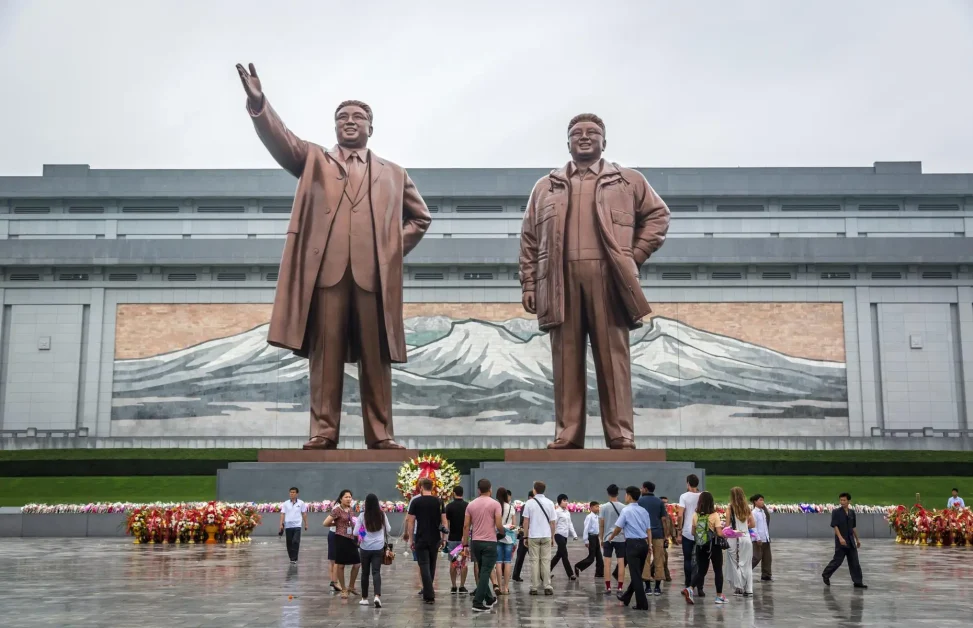
Are you an adventurous traveler looking for a unique experience? Have you ever considered traveling to North Korea? Known as one of the most secretive and isolated countries in the world, North Korea is an enigma that attracts only a handful of tourists every year.
But before you pack your bags and head out, there are several things you need to know to ensure a safe and memorable trip. In this blog post, we will guide you through everything you need to know about traveling to North Korea.
From understanding the risk level and preparing for your trip to decoding local laws and culture, navigating through the country, dealing with money, and staying safe – we’ve got it all covered. Whether you’re a solo traveler or part of a group, our comprehensive guide will help you make the most of your North Korean adventure.
Table of Contents
Understanding the Risk Level for Traveling to North Korea

Before embarking on a trip to North Korea, it is crucial to understand the risk level associated with traveling to this country. Stay informed about the current travel advisory status, as it may change due to political or security reasons. Be aware of potential security risks and threats that may exist in the country.
Proper preparation is essential to ensure a smooth trip, so familiarize yourself with the local laws and culture. Additionally, take necessary health and safety precautions while traveling in North Korea.
Current Travel Advisory Status
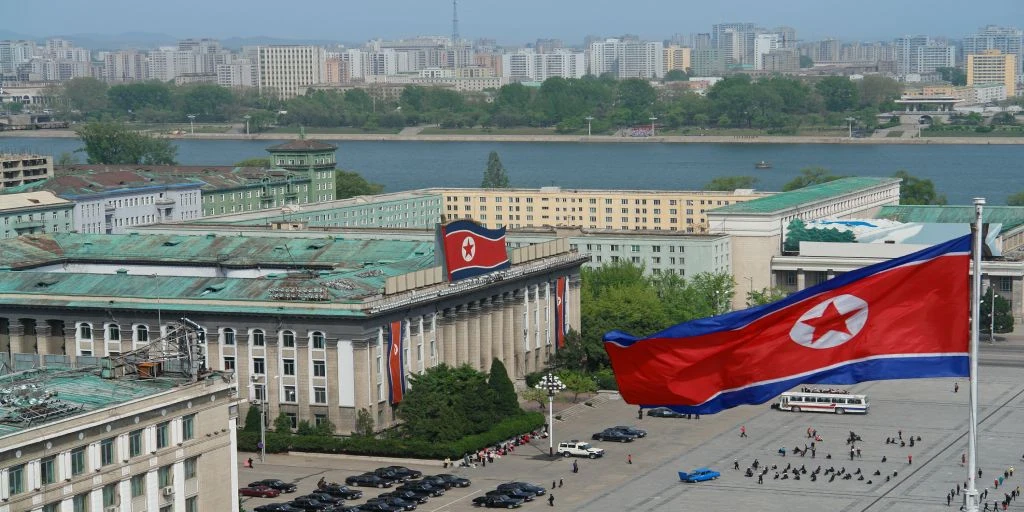
Stay updated on the latest travel advisory updates for North Korea and check the security situation before planning your visit. Keep track of any changes or warnings issued by your government and follow official sources and reliable news outlets for the most updated information.
It is important to stay cautious and make informed decisions based on the travel advisory status to ensure a safe and enjoyable trip. Remember to prioritize your safety and well-being throughout your North Korea experience.
Security Risks and Threats
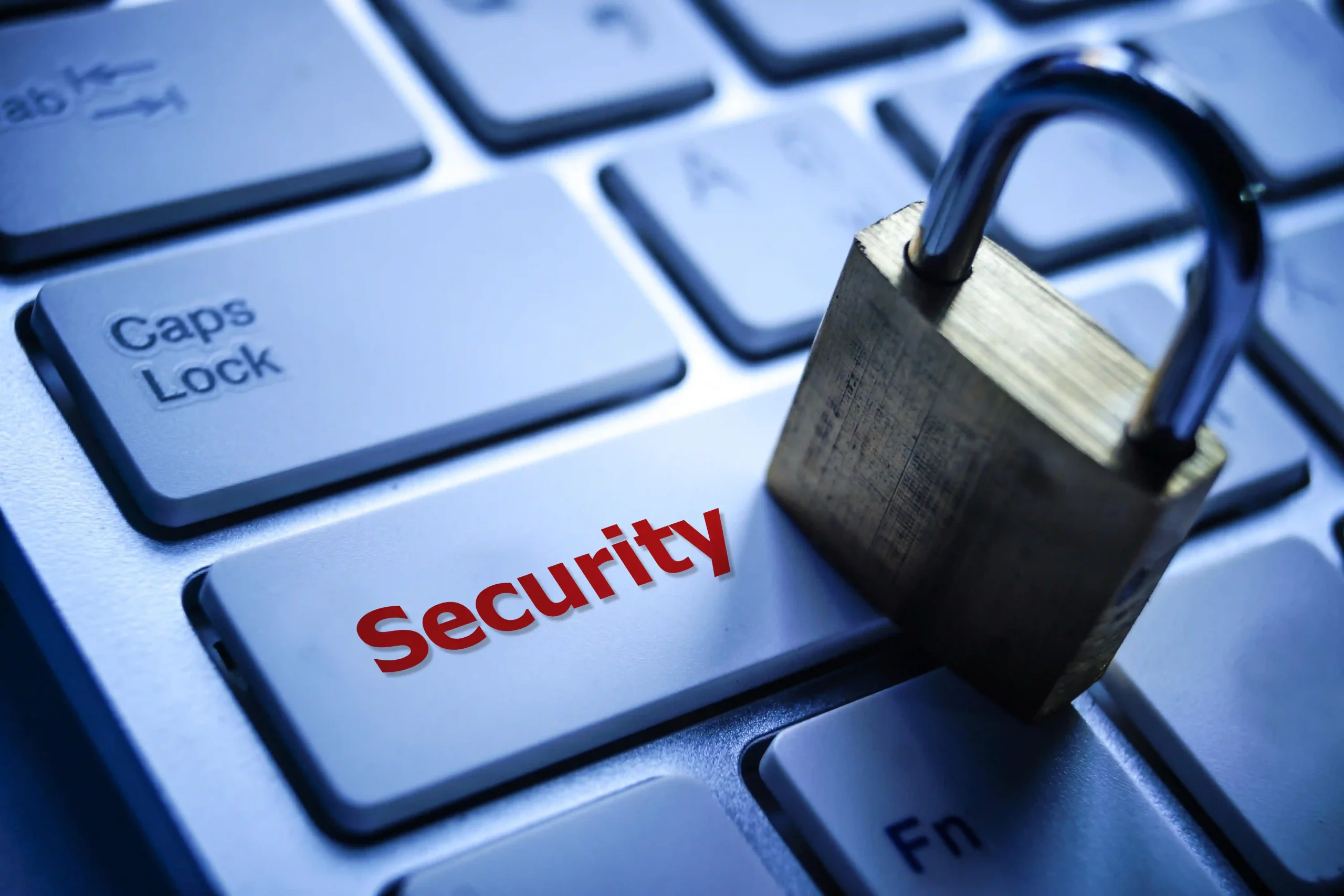
It is important to be aware of the potential security risks and threats in North Korea. Understanding the political situation and tensions on the Korean Peninsula is crucial. It is advisable to stay informed about any recent incidents or conflicts in the country.
Following the guidance of local authorities and your embassy if needed is recommended. Maintaining situational awareness and taking necessary precautions for personal safety are essential during your visit. Remember to exercise caution and stay updated through official sources and reliable news outlets.
Preparing for Your Trip
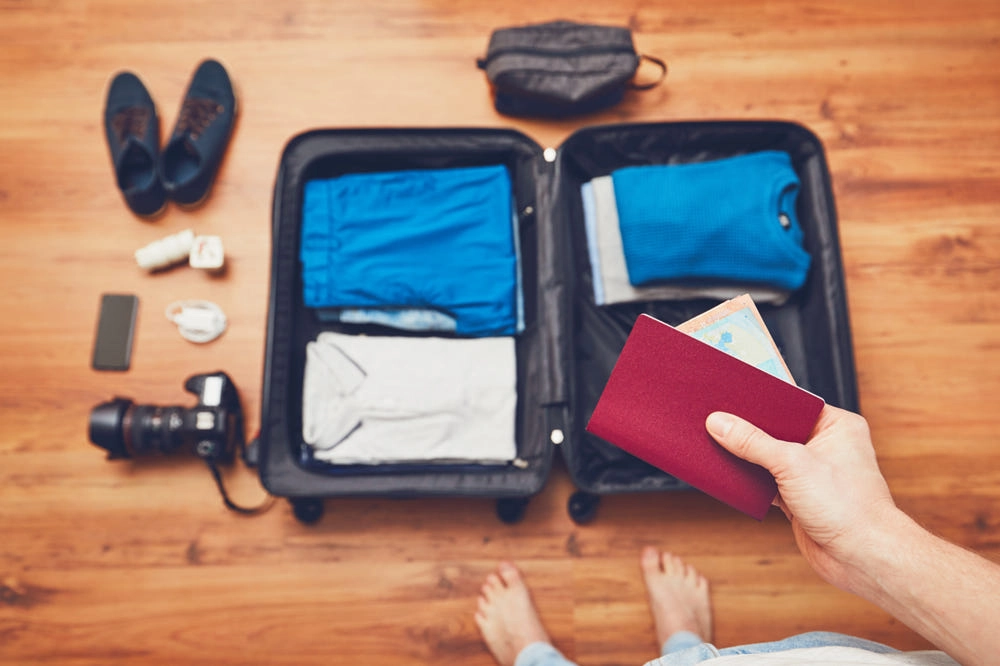
Before visiting North Korea, ensure you have all the necessary travel documents, including a valid visa that covers your entire stay. Take health and safety precautions by getting the required vaccinations. Pack appropriate clothing and essentials based on the weather and season.
To make the most of your trip, research and plan your itinerary in advance. Remember to check the latest travel advisories and stay cautious throughout your North Korea experience.
Essential Travel Documents
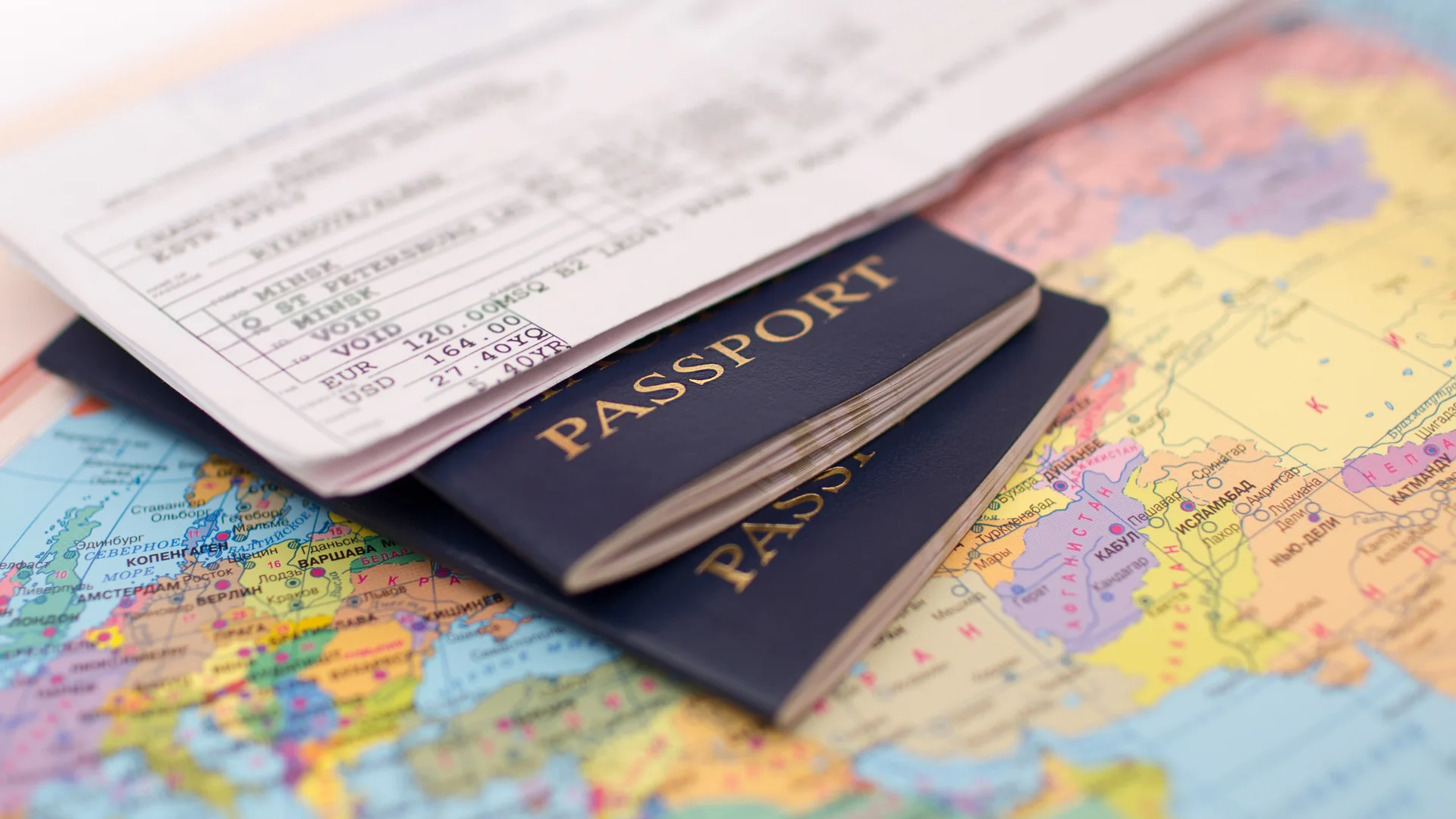
To ensure a smooth journey, there are several essential travel documents you need to have when visiting North Korea. First and foremost, it is crucial to possess a valid passport with at least six months of validity remaining.
Additionally, you must obtain the necessary permits and permissions required to enter the country. To be prepared for any unforeseen circumstances, it is advisable to keep a copy of important documents such as your passport and visa.
Furthermore, make sure to register with your embassy or consulate before traveling to North Korea. Lastly, carry any additional identification or travel documents as required.
Applying for a Visa
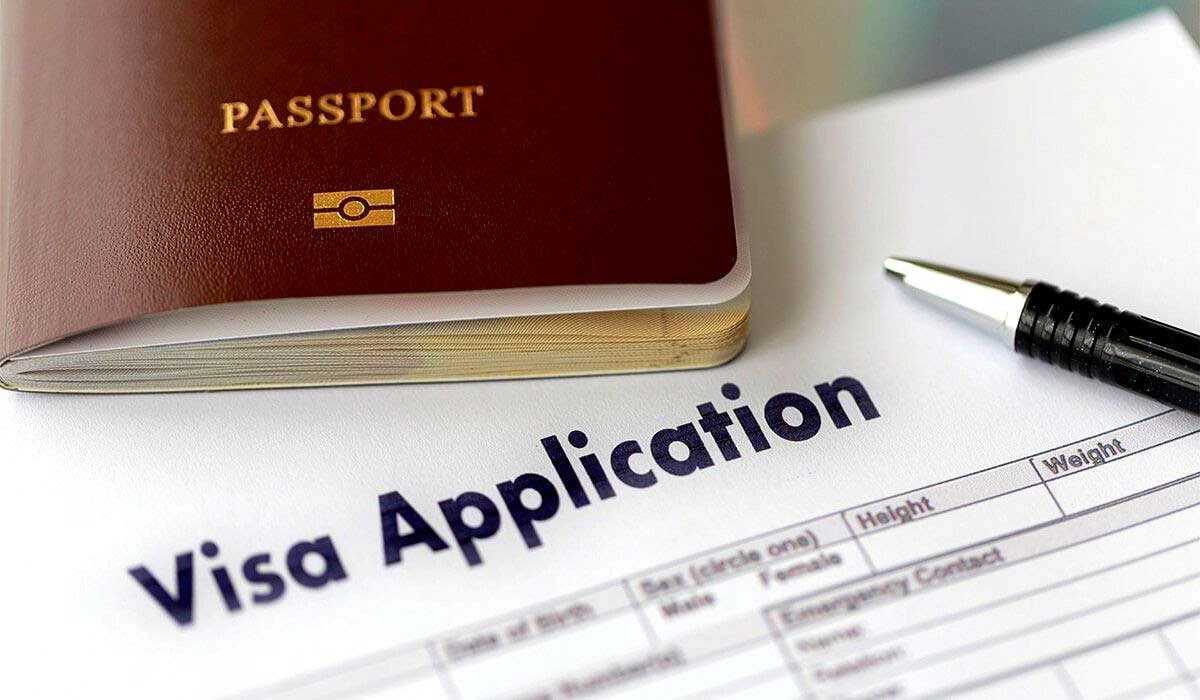
When traveling to North Korea, it is important to apply for a visa. Research the visa requirements and application process, and contact the North Korean embassy or consulate for necessary information. Make sure to submit all required documents and abide by the guidelines provided.
Allow sufficient time for visa processing and plan your trip accordingly. It is crucial to follow any specific instructions given by the North Korean authorities to ensure a smooth visa application process. Remember to be cautious and thorough in your preparations.
Health and Safety Precautions

When traveling to North Korea, it is important to take necessary health precautions. This includes getting vaccinations and being aware of potential health risks. Basic hygiene practices should be followed at all times. It is also crucial to familiarize yourself with the local healthcare facilities and services available in case of any medical emergencies.
Purchasing travel insurance that covers medical expenses is recommended. Additionally, taking safety precautions such as being cautious with your belongings is important to ensure a safe trip.
Best Time to Visit

Consider visiting North Korea during the months of June, July, and August for pleasant weather. October is also a good time to visit due to the autumn foliage. Avoid visiting in January and February as the weather can be extremely cold. Plan your trip according to your interests, such as attending specific festivals or events. Additionally, check the local calendar for any significant holidays or celebrations.
Decoding the Local Laws and Culture
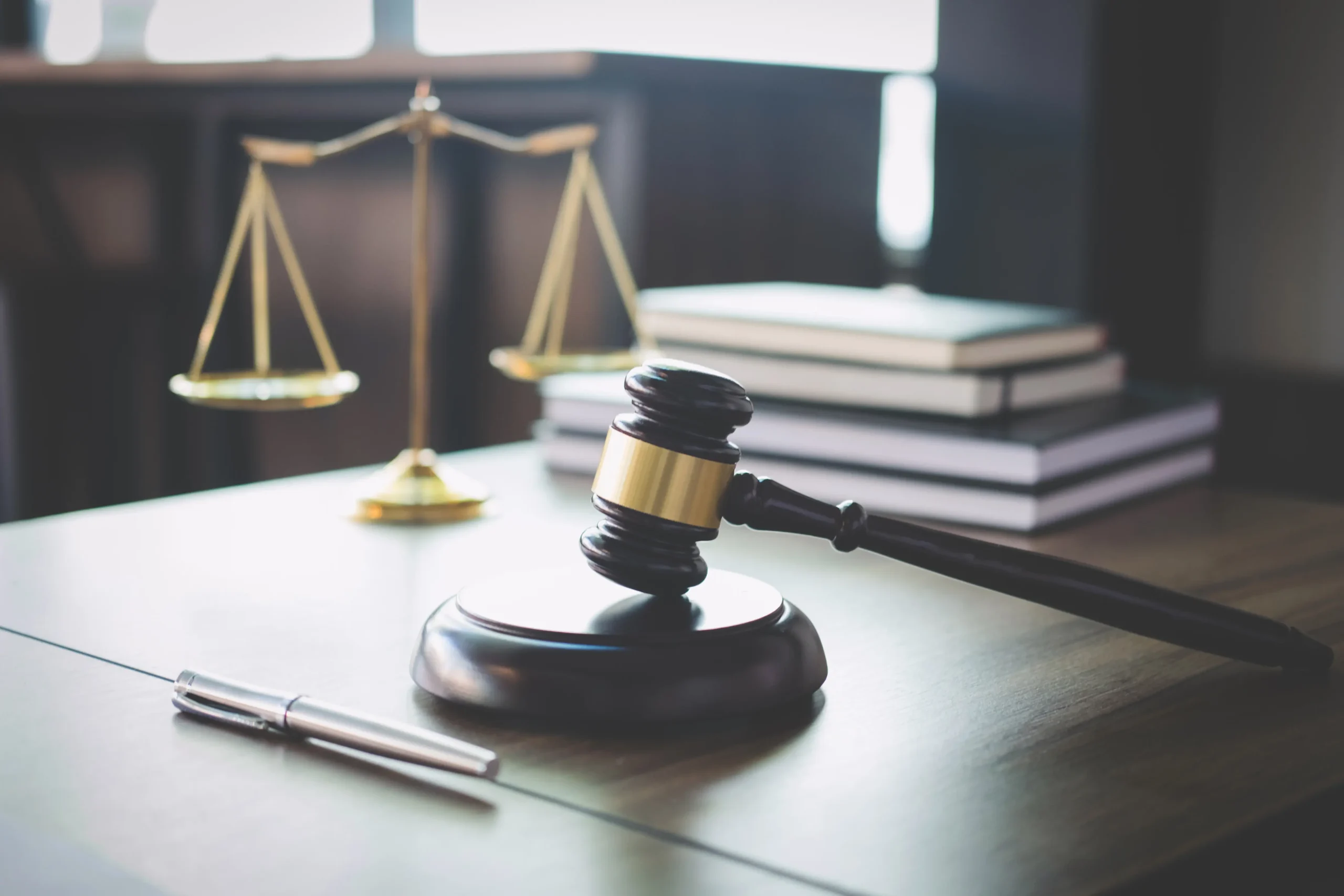
While traveling in North Korea, it is crucial to familiarize yourself with the local laws to ensure a smooth and respectful visit. Show respect for the country’s culture and customs, and adhere to any restrictions or regulations set by the authorities.
Understand the historical and political sensitivities associated with the Korean Peninsula and engage in appropriate behavior at all times. Avoid actions that may be considered disrespectful to maintain a positive and memorable North Korean experience.
Important Laws to Keep in Mind
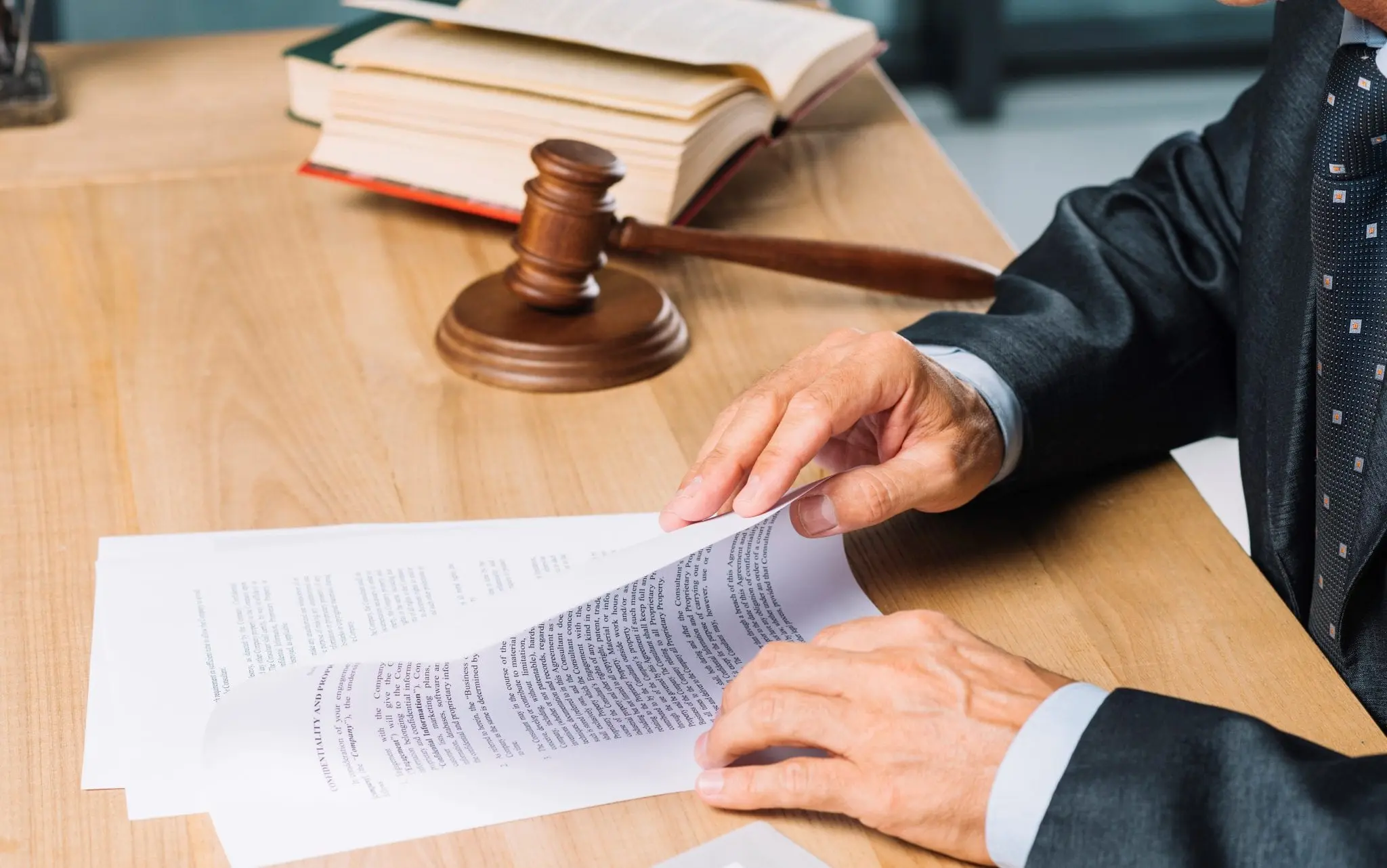
When traveling to North Korea, it is crucial to be familiar with the important laws that govern the country. One of the key aspects to keep in mind is the strict regulations regarding photography and taking pictures in North Korea. Additionally, there are limitations on internet access and communications, so it’s important to understand and respect these restrictions.
Foreign currency and financial transactions are also subject to restrictions, so it’s essential to be aware of these regulations.
When visiting specific areas such as the Demilitarized Zone (DMZ), it’s important to comply with any regulations or guidelines provided by North Korean officials. By being cautious and adhering to the instructions given by the authorities, you can ensure a smooth and safe visit to North Korea.
Cultural Etiquettes and Practices

– Show respect for local customs and traditions during your visit to North Korea.
– It is important to dress modestly and avoid showing too much skin.
– Remember to remove your shoes before entering someone’s home as a sign of respect.
– Avoid discussing sensitive topics like politics or the North Korean government to maintain a friendly atmosphere.
– Learning a few basic Korean phrases will not only show respect but also help you connect with the local people.
Understanding Local Customs
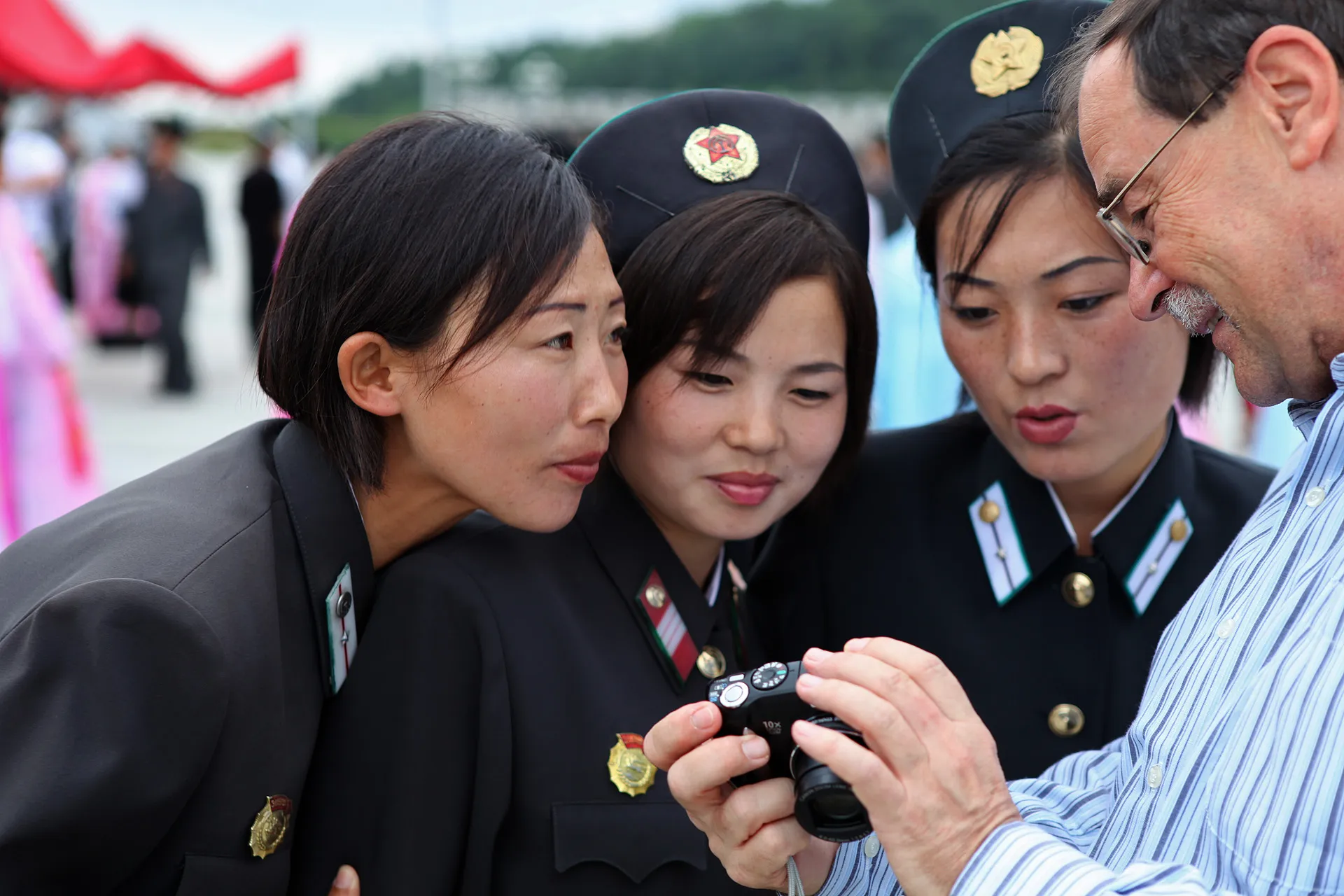
When traveling to North Korea, it is important to understand and respect the local customs. One key aspect is to take note of the strict hierarchy and show deference to elders and authority figures. In public, it is advisable to avoid displaying affection or physical contact.
Additionally, it is crucial not to photograph military personnel, government buildings, or other sensitive areas. When visiting someone’s home, it is customary to bring small gifts. Lastly, remember to refrain from using your left hand when giving or receiving items.
Navigating Through North Korea
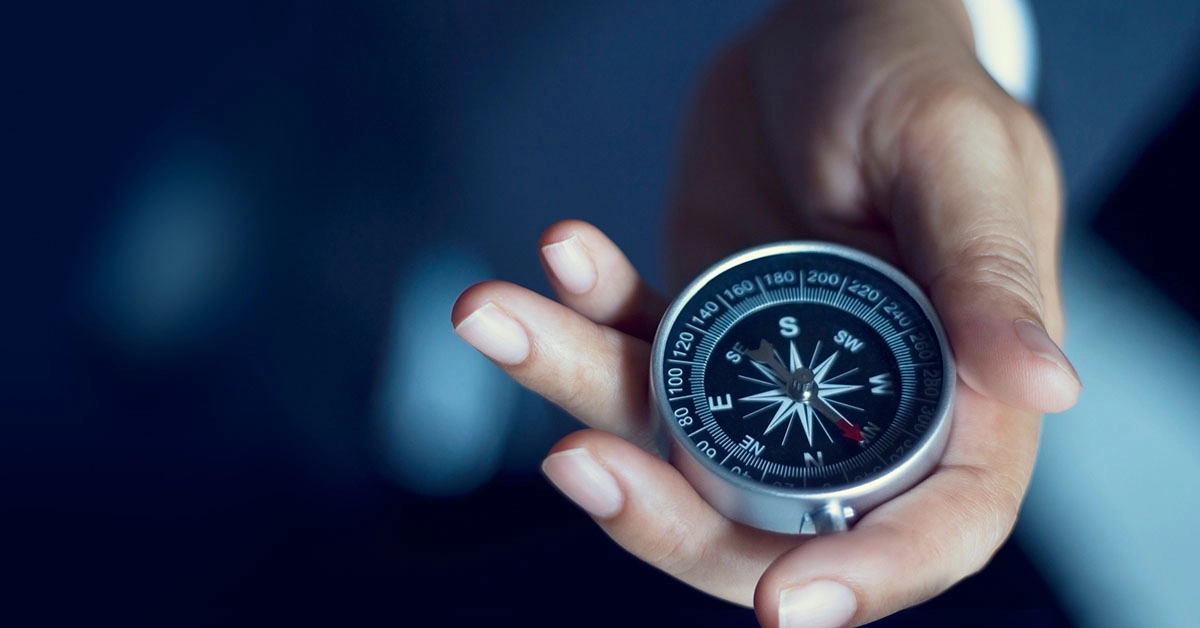
When traveling to North Korea, it is crucial to follow your tour guide’s instructions for your safety and compliance with local regulations. Always carry your passport and visa documentation with you and stay with your tour group to avoid venturing into restricted areas.
Being aware of your surroundings and belongings can help prevent any loss or theft. Additionally, familiarize yourself with emergency contact information and consular services to ensure you have the necessary support. Remember, caution is key when exploring the DPRK.
Popular Tourist Attractions
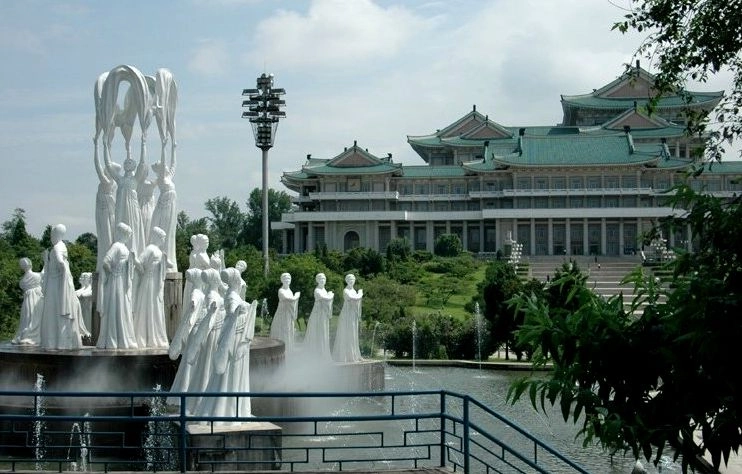
– Explore the Kumsusan Palace of the Sun, the mausoleum that houses the remains of former leaders Kim Il Sung and Kim Jong Il.
– Discover the Demilitarized Zone (DMZ) and learn about the historical and political tensions between North and South Korea.
– Journey to Kaesong for a glimpse into North Korea’s rich history, with its notable sites including the Koryo Museum and the Tomb of King Kongmin.
– Immerse yourself in the Mass Games, a grand spectacle showcasing the culture and ideology of North Korea.
– Marvel at the natural beauty of Mount Paektu, renowned for its breathtaking landscapes and revered as a sacred site.
Navigating North Korean Public Transport

While traveling in North Korea, you can make use of the country’s reliable and efficient railway system for long-distance journeys. For shorter distances within cities, taxis or buses are the preferred modes of transport.
However, it’s important to be prepared for occasional delays or changes in schedules. Always follow the instructions of transportation staff and adhere to safety regulations. Additionally, it’s advisable to keep small changes on hand for purchasing tickets and paying fares.
Local Food and Cuisine
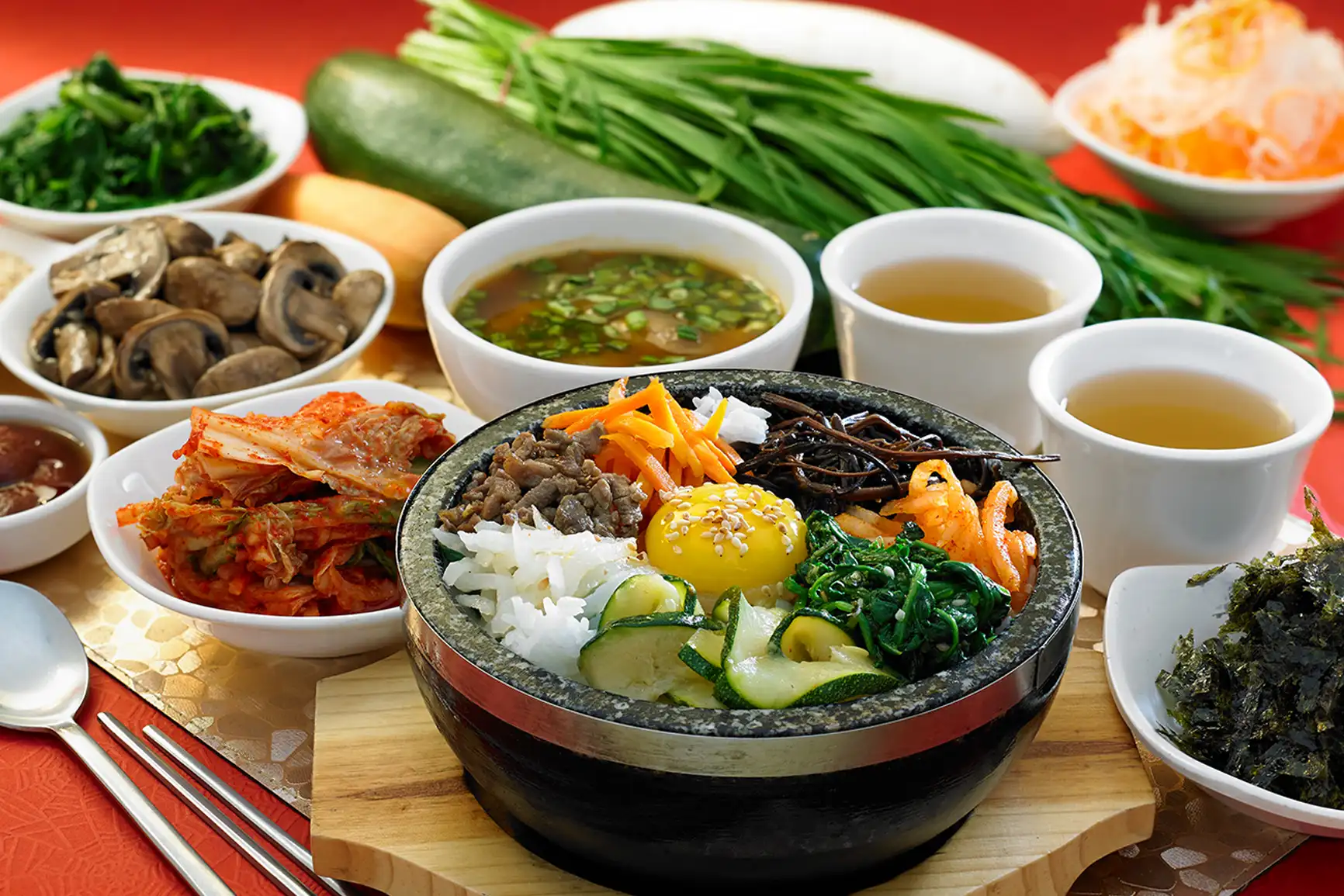
Indulge in the flavors of North Korea by sampling traditional dishes like kimchi, bibimbap, and naengmyeon. Don’t be afraid to step out of your comfort zone and try local delicacies such as dog meat stew or Pyongyang cold noodles.
Remember to respect the local dining customs, like using chopsticks and avoiding sticking them upright in rice. While dining out, it’s recommended to avoid tap water and opt for bottled water or other sealed beverages.
Additionally, inform restaurants of any food allergies or dietary restrictions for a safe and enjoyable meal experience.
Health and Safety Measures
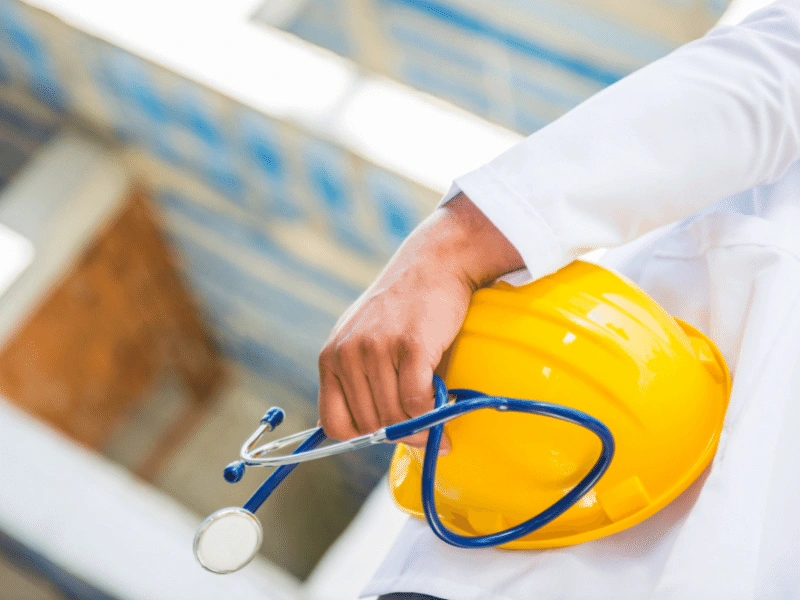
It is essential to prioritize health and safety when traveling to North Korea. Stay updated on the latest travel advisories and alerts from the Department of State to ensure a safe trip. Follow the guidelines provided by your tour company and the North Korean authorities for a smooth and secure experience.
Take necessary precautions such as washing hands frequently and practicing good hygiene to prevent common travel illnesses.
Be aware that medical facilities may be limited, so it is important to bring any necessary medications with you. Familiarize yourself with emergency services and know how to seek medical evacuation if needed.
Vaccinations Required
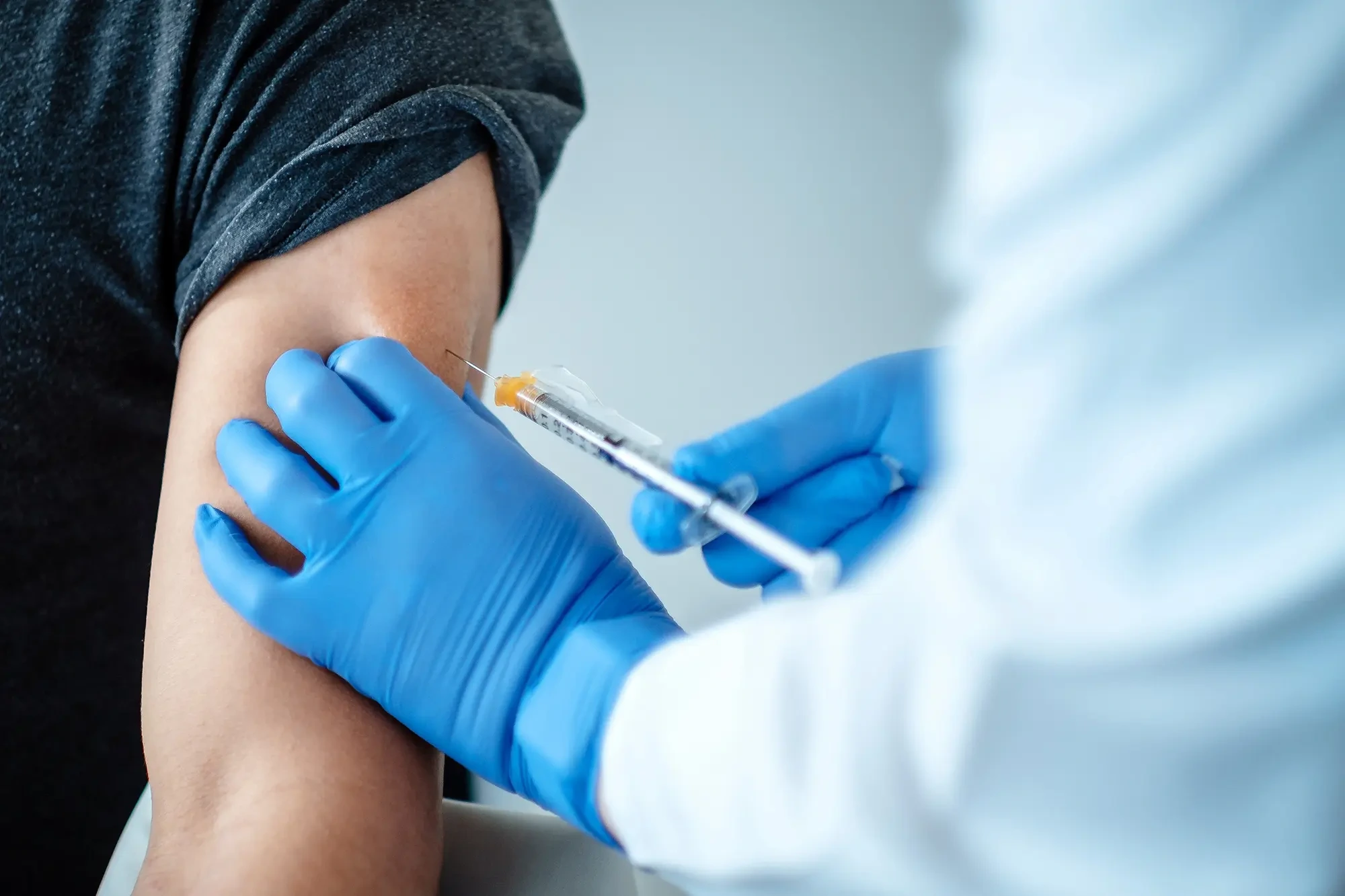
Before traveling to North Korea, it is important to check with your healthcare provider for recommended vaccinations. Make sure you are up to date on routine vaccines such as measles, mumps, rubella, and influenza.
Additionally, consider getting vaccinated for diseases like hepatitis A and B, typhoid, and Japanese encephalitis based on your travel plans. It is advisable to carry a copy of your vaccination records and any necessary documentation for entry. Lastly, adhere to any additional vaccination requirements imposed by the North Korean government.
Access to Medical Services
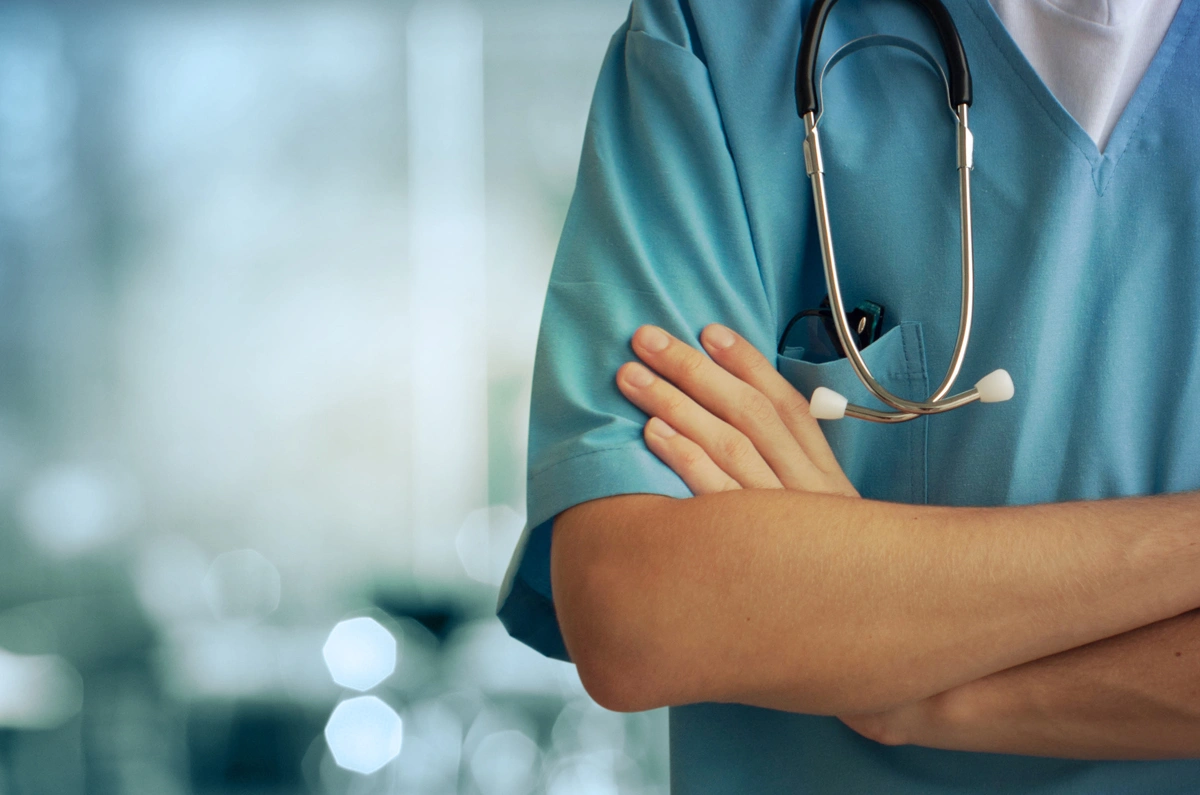
While traveling to North Korea, it is important to note that medical facilities in the country may be limited and might not meet international standards. As a precautionary measure, it is highly recommended to carry travel insurance that covers medical expenses and emergency medical evacuation.
In case of any medical emergencies, it is advisable to contact your embassy or consular services for assistance.
If you require medical attention, inform your tour guide or hotel staff who can provide guidance and support. Always follow the instructions and guidance of medical professionals during your stay in North Korea.
Dealing with Emergencies while in North Korea
In the event of an emergency while in North Korea, it is important to stay calm and follow the instructions provided by your tour guide or local authorities. If needed, contact your embassy or consulate for consular access and assistance.
Familiarize yourself with the local laws and regulations to avoid any legal issues. Additionally, maintain open communication with your tour group and fellow travelers. Carry a copy of important documents, such as your passport and travel insurance information, to ensure you are prepared for any unforeseen circumstances.
Communicating in North Korea
Overcoming language barriers with locals can be a challenge when traveling to North Korea. However, using basic phrases in Korean for common interactions can go a long way in facilitating communication.
Another option is to hire a local guide who can serve as a translator and help you navigate through conversations. It’s also important to learn about local customs and etiquette to ensure respectful interactions.
Additionally, utilizing non-verbal communication techniques, such as gestures and expressions, can further enhance communication in this unique cultural context.
Language Barriers and Overcoming Them
Navigating language barriers can be a challenge for tourists when traveling to North Korea. However, having a basic knowledge of Korean phrases can be immensely helpful in overcoming these barriers. Additionally, utilizing translation apps or pocket dictionaries can assist in effective communication.
Non-verbal gestures and body language can also be valuable tools for conveying messages. In more complex situations, seeking assistance from bilingual individuals can provide further support.
By employing these strategies, tourists can effectively overcome language barriers and enhance their North Korean experience.
Connectivity and Internet Access
Connectivity and internet access in North Korea are limited for most tourists. While local SIM cards are not available for foreigners, some hotels do offer Wi-Fi. However, there are restrictions imposed on internet usage. It is recommended that travelers inform their friends and family about the limited connectivity in North Korea. This way, they can plan alternative methods of communication during their visit.
What to Pack for North Korea?
When traveling to North Korea, it’s important to pack wisely. Bring essential travel documents like your passport and visa. Pack appropriate clothing for the weather and cultural norms. Remember to carry the necessary medications and toiletries. And don’t forget a reliable camera or smartphone for capturing memories. Lastly, bring a small daypack for daily excursions.
Essentials to Carry
When preparing for your trip to North Korea, there are several essentials you should pack to ensure a smooth and comfortable journey. First and foremost, make sure you have a valid passport and North Korean visa, as these are required for entry into the country.
Additionally, don’t forget to bring comfortable walking shoes, as there will be plenty of sightseeing opportunities.
It’s also important to have an adequate supply of any required medications, personal toiletries, and hygiene products. Lastly, make sure to have sufficient cash in USD for your expenses during your stay.
Weather-specific Clothing
When traveling to North Korea, it is important to pack weather-specific clothing to be prepared for unpredictable weather conditions. Layered clothing is essential to adjust to the changing temperatures throughout the day. For colder months, it is advisable to carry warm jackets and sweaters.
In the summer season, light and breathable clothing is recommended to stay comfortable. Additionally, comfortable footwear is necessary for walking and hiking in the diverse terrain.
Don’t forget to pack rainproof gear to stay dry in case of potential showers. By packing the right clothing, you can ensure a comfortable and enjoyable experience while exploring North Korea.
Dealing with Money in North Korea
Upon arriving in North Korea, it is important to exchange your currency for the local denomination. Understanding the local economy and currency denominations will help you navigate transactions more effectively.
Cash is the preferred method of payment, as international credit cards have limited availability. It is advisable to keep track of your expenses and budget accordingly throughout your trip. By being mindful of your spending and utilizing cash for most transactions, you can ensure a smooth financial experience during your time in North Korea.
Currency Exchange
To ensure a smooth financial experience while traveling to North Korea, it is important to be familiar with the currency exchange process. Authorized banks and hotels offer currency exchange services where you can convert your foreign money into Korean Won (KPW).
The US Dollar (USD) is widely accepted for transactions, but other major currencies like the Euro and Chinese Yuan can also be exchanged. It is advisable to have smaller denominations for convenience. To ensure fair conversions, it’s recommended to check the exchange rates before making any transactions.
Understanding the Local Economy
In North Korea, the local economy operates on a closed system, with limited exposure to international trade and commerce. Various industries are dominated by state-owned enterprises, highlighting the government’s significant role in economic activities.
It is crucial to understand and respect local customs and rules regarding economic matters. By doing so, visitors can gain a better understanding of the unique economic landscape of North Korea.
Tips for Budget Travelers
When visiting North Korea, there are several tips that budget travelers can follow to make their trip more affordable. One option is to join group tours, as this can help save costs by sharing expenses with other travelers. Another way to save money is by sticking to local and street food instead of dining at expensive restaurants.
Utilizing public transportation is also a cost-effective way to get around, and exploring free or low-cost attractions and landmarks can provide a budget-friendly experience. Lastly, bargaining and negotiating prices when shopping can lead to better deals.
Staying Safe in North Korea
To ensure a safe experience while traveling to North Korea, it’s essential to understand the local laws and customs to avoid any misunderstandings. Additionally, be cautious and keep your belongings secure at all times. Stay updated on travel advisories and warnings from the Department of State to stay informed about potential risks. It’s important to respect the local authorities and follow their instructions.
Finally, make sure you have all proper documentation, including a valid passport and visa. By taking these precautions, you can have a safe and enjoyable trip to North Korea.
Avoiding Potential Scams
When traveling to North Korea, it is important to be cautious and aware of potential scams. Unsolicited offers or requests for money should be approached with caution, as well as exchanging currency with unauthorized individuals. To ensure a safe trip, it is recommended to use reputable tour companies for bookings and accommodations.
If an offer seems too good to be true, it’s best to ignore it. Trust your instincts and be cautious of anyone asking for personal information. By following these precautions, you can have a worry-free experience in North Korea.
Emergency Contacts
In case of any emergency during your trip, it is essential to have a list of emergency contacts readily available. This includes the contact details for your embassy or consulate in case you require assistance. Additionally, it is important to familiarize yourself with the location of medical facilities and how to access them if necessary.
Knowing the procedures for seeking consular services will also be beneficial. Stay updated on official channels and social media accounts for any updates or alerts. Lastly, it is advisable to be prepared for potential emergencies and have a plan in place.
Getting Around in North Korea
When traveling to North Korea, it is important to familiarize yourself with the different modes of transport available. Plan your itinerary and consider the feasibility of each transportation option. Opt for safe and reliable transportation providers that adhere to regulations and guidelines provided by the local authorities.
Stay informed about road conditions and any potential disruptions that may impact your travel plans. By taking these precautions, you can navigate through North Korea efficiently and safely.
Modes of Transport
When traveling to North Korea, there are various modes of transport available for you to explore. For long-distance travel, options like trains, buses, and domestic flights are worth considering. If you prefer more convenience and flexibility, hiring a private driver can be a great choice.
Within cities, you can utilize public transportation such as taxis or the subway system. Renting a bicycle can also be a convenient way to explore certain areas. Additionally, taking advantage of organized tours that provide transportation allows for a hassle-free experience.
Safe and Reliable Transportation Options
When traveling to North Korea, it is important to prioritize safety and reliability when it comes to transportation options. Opt for reputable airlines or train services for long-distance travel, ensuring a comfortable and secure journey. To get around within the country, use registered taxi services or those recommended by your accommodation.
Additionally, choose well-maintained rental vehicles from trusted providers for added peace of mind. And if you’re looking to save costs and enhance safety, consider carpooling with fellow travelers. Do thorough research and select transportation options that have positive reviews and recommendations.
Is it safe to travel alone in North Korea?
Traveling alone in North Korea can be challenging due to restrictions and regulations. It is recommended to join a local travel group or use a reputable tour company. Follow guidelines from local authorities, inform family or friends about your plans, and stay aware of your surroundings at all times.
Tips for Solo Travelers
When traveling to North Korea alone, it is important to prioritize safety and respect local customs. Research and choose a reliable local guide who can enhance your experience and ensure your safety. Keep a low profile and avoid unnecessary attention.
Stay connected with your embassy or consulate for support and assistance. It is crucial to follow any travel advisories or warnings issued by your government. By taking these precautions, you can have a smooth and enjoyable solo trip to North Korea.
Finding Local Guides and Travel Groups
When traveling to North Korea, finding local guides and travel groups can enhance your experience and provide valuable insights. Look for accredited or licensed guides who have a positive reputation and track record. Join organized travel groups or tours for a structured and guided experience. Seek recommendations from fellow travelers or online communities to find reputable guides or groups.
Research and compare different travel agencies to ensure they meet your needs. By choosing the right guides and groups, you can have a safe and enriching North Korea experience.
Frequently Asked Questions
Is it safe to travel to north korea.
While traveling to North Korea, it’s important to consider the potential risks. Due to the country’s political situation and human rights concerns, it is generally not considered safe. The US Department of State strongly advises against travel to North Korea, as strict government restrictions and surveillance may be imposed. Thorough research and caution are crucial before making any decisions.
What are the visa requirements for traveling to North Korea?
To travel to North Korea, tourists must have a visa. This can be obtained through an authorized travel agency, which also arranges for a tour guide. The visa application process requires personal information and proof of travel insurance and can take several weeks to complete.
What are some cultural customs and etiquette to be aware of when traveling in North Korea?
When traveling in North Korea, it’s essential to be aware of cultural customs and etiquette. Show respect and politeness, and refrain from criticizing the government or disrespecting their leaders. Dress modestly and bring small gifts as a sign of goodwill when meeting locals or officials.
Can I bring my own electronic devices into North Korea?
Yes, you can bring your personal electronic devices when traveling to North Korea. However, it is advisable to avoid carrying sensitive or valuable electronics. Customs officials may inspect your devices upon entry. Keep in mind that bringing media that portrays North Korea negatively is illegal.
In conclusion, traveling to North Korea requires thorough preparation and awareness of the risks involved. It is crucial to stay updated on the current travel advisory status and understand the security risks and threats associated with the country.
Make sure you have all the essential travel documents in order, including a valid visa. Take necessary health and safety precautions and be aware of the local laws and cultural etiquette.
Navigating through North Korea can be made easier by familiarizing yourself with popular tourist attractions and understanding the local transportation system. Pack accordingly for the trip and be prepared for language barriers.
Lastly, prioritize your safety by avoiding potential scams and staying connected with emergency contacts. Whether traveling alone or in a group, it is important to stay vigilant and make informed decisions throughout your journey.

Ferona Jose is a passionate travel writer and blogger at Travelistia. She has traveled throughout Europe, Asia and the Americas. Her writing focuses on cheap travel destinations, travel experiences, cultural insights, and travel hacks.
Leave a Reply Cancel reply
Your email address will not be published. Required fields are marked *
Save my name, email, and website in this browser for the next time I comment.

No videos yet!
Click on "Watch later" to put videos here
North Korea Travel Guide – Everything You Need to Know

Tourism in North Korea, officially known as the Democratic People’s Republic of Korea (DPRK), offers a glimpse into one of the world’s most isolated and enigmatic nations. With its tightly controlled and government-guided tourism industry, North Korea provides a unique opportunity for travelers to explore its propaganda-filled capital, Pyongyang, visit historic sites, and witness carefully curated cultural displays. While tourism in North Korea is tightly regulated and often limited to guided tours, it allows curious visitors to see a side of the country that is rarely seen in the international media. However, it’s crucial to note that traveling to North Korea involves strict rules and limitations, and visitors are accompanied by government-assigned guides throughout their stay.
What’s the Best Time to Visit? 📅
The best time to visit North Korea as a tourist is during the spring (April to June) and autumn (September to October) seasons. These periods offer the most favorable weather and comfortable conditions for travel:
- Spring (April to June): Spring is considered one of the best times to visit North Korea. During this season, the weather is mild, and the landscape comes alive with blossoming flowers and greenery. The temperatures are generally pleasant, with daytime highs ranging from 15°C to 25°C (59°F to 77°F). This season is ideal for outdoor activities and sightseeing.
- Autumn (September to October): Another excellent time to visit North Korea is in the autumn months. The weather remains comfortable with mild temperatures, and the changing foliage adds a beautiful backdrop to your travels. Daytime temperatures range from 15°C to 20°C (59°F to 68°F). This is also a great time for cultural events and festivals.
It’s important to note that North Korea experiences harsh winters with extremely cold temperatures, especially in December and January. Summer, from July to August, can be hot and humid, making outdoor activities less comfortable.
Travel to North Korea is highly regulated and can only be done through authorized tour operators. Additionally, political and diplomatic situations can change, affecting travel access and safety. Always check the latest travel advisories and consult with the relevant authorities or tour operators before planning a trip to North Korea.
What’s the Best Way to Get Around? 🚌
In North Korea, tourists are generally accompanied by government-assigned guides throughout their stay, and their movements are closely controlled. As a result, the best way to get around North Korea as a tourist is through organized tours offered by authorized tour operators. Here’s how transportation typically works for tourists in North Korea:
- Guided Tours: All tourists in North Korea must join guided tours organized by authorized tour operators. These tours are meticulously planned and supervised, with itineraries determined in advance. Travelers are accompanied by North Korean guides who ensure that they follow the prescribed program.
- Chartered Transportation: Tour operators in North Korea typically arrange for chartered transportation for their tour groups. This includes buses and sometimes domestic flights within North Korea. These vehicles are usually exclusive to the tour group, ensuring privacy and control over the travel schedule.
- Public Transportation: In some cases, tourists may use public transportation for short trips within Pyongyang, such as the Pyongyang Metro or local buses. However, these instances are limited, and tourists are closely supervised by guides during such activities.
- Domestic Flights: For tours that include visits to cities outside of Pyongyang, domestic flights may be arranged. These flights are typically on North Korean airlines and are part of the tour package.
- Walking and Sightseeing: Within cities and at various sites, tourists often walk or engage in sightseeing activities. These activities are usually part of the guided tour and allow tourists to explore specific attractions while accompanied by guides.
- River Cruises: In some cases, river cruises on the Taedong River in Pyongyang may be included in the tour itinerary, providing a unique perspective of the city.
- Private Vehicles: For special arrangements or custom tours, private vehicles may be used for transport between destinations. However, this is less common and may come at an additional cost.
It’s important to note that tourists in North Korea are subject to strict regulations and are not permitted to travel independently or deviate from the tour program. All activities and movements are supervised, and photography is often restricted in certain areas. Visitors are expected to follow the guidance of their North Korean guides and adhere to local customs and rules. Travelers interested in visiting North Korea should do so through authorized tour operators and should be aware of the unique and controlled nature of tourism in the country.
What’s the Official Language?
The official language of North Korea is Korean, specifically the dialect known as “Pyongyang-speak” or “Pyongyang accent.” While English is not widely spoken in North Korea, and the use of foreign languages is limited, here are some basic Korean phrases that tourists may find helpful during their visit:
Common Greetings:
- Hello – 안녕하세요 (annyeonghaseyo)
- Goodbye – 안녕히 가세요 (annyeonghi gaseyo) [when someone is leaving]
- Thank you – 감사합니다 (gamsahamnida)
- Yes – 네 (ne)
- No – 아니요 (aniyo)
- Excuse me / Sorry – 죄송합니다 (joesonghamnida)
- Please – 부탁합니다 (butakhamnida)
- How much is this? – 이거 얼마에요? (igeo eolmaeyo?)
Basic Phrases:
- My name is [Your Name] – 제 이름은 [Your Name] 입니다 (je ireumeun [Your Name] imnida)
- I don’t understand – 이해하지 못해요 (ihaehaji mothaeyo)
- Help – 도와주세요 (dowajuseyo)
- Where is…? – … 어디에요? (… eodieyo?)
- I need… – … 가 필요해요 (… ga pillyohaeyo)
- Water – 물 (mul)
- Food – 음식 (eumsik)
- Bathroom / Toilet – 화장실 (hwajangsil)
- Hospital – 병원 (byeongwon)
- Police – 경찰 (gyeongchal)
Learning numbers can be especially useful for basic transactions and understanding prices:
- One – 하나 (hana)
- Two – 둘 (dul)
- Three – 셋 (set)
- Four – 넷 (net)
- Five – 다섯 (daseot)
- Six – 여섯 (yeoseot)
- Seven – 일곱 (ilgop)
- Eight – 여덟 (yeodeol)
- Nine – 아홉 (ahop)
- Ten – 열 (yeol)
Keep in mind that English proficiency among the general population is limited in North Korea, and communication can be challenging. Tourists are typically accompanied by government-assigned guides who speak some English, which can help bridge the language gap. Additionally, showing respect and courtesy through gestures and body language can go a long way in communicating effectively while visiting North Korea.
Where to Stay? 🏨
In North Korea, tourists are typically accommodated in state-approved hotels and lodgings that are prearranged by authorized tour operators. The options for where to stay as a tourist are limited, and visitors are not permitted to make independent lodging arrangements. Here are some of the hotels and accommodations commonly used for tourists in North Korea:
- Yanggakdo International Hotel (양각도국제호텔): Located on Yanggak Island in Pyongyang, this is one of the most well-known and largest hotels in North Korea. It offers a range of facilities, including restaurants, bars, a casino, and even a revolving restaurant on the top floor.
- Koryo Hotel (고려호텔): Situated in central Pyongyang, the Koryo Hotel is another option for tourists. It has restaurants, a coffee shop, a bar, and a gift shop. The hotel has hosted various international events and foreign delegations.
- Ryugyong Hotel (류경호텔): Known for its distinctive pyramid shape, the Ryugyong Hotel is one of Pyongyang’s iconic landmarks. While it was under construction for many years, it has reportedly opened for some foreign tourists, although details can vary.
- Chongnyon Hotel (청년호텔): This hotel is located near the Arch of Triumph in Pyongyang. It offers basic accommodations and is often used by budget travelers.
- Sosan Hotel (소산호텔): Situated in the port city of Wonsan on the east coast of North Korea, the Sosan Hotel is used for tourists visiting this region. It has facilities such as restaurants, a casino, and a karaoke bar.
- Hotels in Other Cities: When visiting cities outside of Pyongyang, tourists may stay in local hotels or accommodations designated by the tour operator. These options can vary in terms of comfort and amenities.
- Homestays: In some rural areas, tourists may have the opportunity to stay in local homes or guesthouses as arranged by their tour operator. This provides a unique cultural experience.
It’s important to note that accommodations in North Korea may not meet international standards, and the availability of amenities can vary. Tourists should be prepared for a different level of service compared to what they might experience in more tourist-friendly destinations.
Travelers to North Korea must be part of an organized tour with an authorized tour operator, and accommodations are typically included as part of the tour package. All aspects of the visit, including lodging, are closely monitored by North Korean authorities, and tourists are accompanied by government-assigned guides throughout their stay.
What to Eat? 🍽️
North Korean cuisine is characterized by its unique flavors and traditional dishes. While tourists in North Korea are typically served meals as part of their organized tours, here are some must-try North Korean foods and dishes you might encounter:
- Kimchi (김치): Kimchi is a staple Korean side dish made from fermented vegetables, often featuring Napa cabbage and radishes. It’s known for its spicy and tangy flavor and is served at nearly every meal.
- Rice (밥): Rice is a fundamental component of Korean cuisine. It’s usually steamed and served as a side dish with various accompaniments.
- Bibimbap (비빔밥): Bibimbap is a popular Korean dish that consists of rice mixed with vegetables, often including carrots, mushrooms, spinach, and bean sprouts. It’s topped with a fried egg and spicy gochujang sauce.
- Japchae (잡채): Japchae is a dish made from stir-fried glass noodles (usually sweet potato noodles) mixed with vegetables and seasoned with soy sauce and sesame oil. It’s a flavorful and colorful dish.
- Naengmyeon (냉면): Naengmyeon is a cold noodle dish typically served in a cold broth. There are variations, but Pyongyang-style naengmyeon features buckwheat noodles in a refreshing, tangy broth with toppings like cucumber and slices of beef or pork.
- Pyongyang Cold Noodles (평양냉면): Pyongyang is famous for its cold noodle dishes. These noodles are made from wheat flour and are typically served in a cold beef or chicken broth with various toppings.
- Mandu (만두): Mandu are Korean dumplings, often filled with ingredients like minced meat, vegetables, and tofu. They can be served steamed, pan-fried, or in soups.
- Korean Barbecue (고기구이): While not exclusive to North Korea, Korean barbecue is a popular dining experience. You grill thinly sliced meat, often beef or pork, at the table and wrap it in lettuce leaves with condiments.
- Pajeon (파전): Pajeon are savory pancakes made with scallions and various ingredients, such as seafood or kimchi. They are crispy on the outside and tender on the inside.
- Samgyetang (삼계탕): Samgyetang is a hearty chicken soup made with a whole young chicken stuffed with glutinous rice, ginseng, and jujubes. It’s believed to have health benefits and is often consumed on hot summer days.
- Dotorimuk (도토리묵): Dotorimuk is a dish made from acorn jelly, which is sliced into cubes and served with a savory sauce. It’s a unique and texturally interesting dish.
- Kimchi Pancakes (김치전): Kimchi pancakes are made by mixing kimchi with batter and pan-frying it until crispy. They are a popular snack or appetizer.
- Korean Sweets: Try Korean sweets like tteok (rice cakes), yakgwa (honey cookies), and hangwa (traditional sweets made from rice and honey).
Keep in mind that the availability of specific dishes may vary depending on the region and the tour operator. North Korean cuisine offers a mix of flavors, from spicy and pungent to mild and savory, and trying local dishes is an essential part of experiencing the culture during your visit.
What to See? 🔍
North Korea offers tourists a range of unique attractions and sites to explore, providing insights into the country’s history, culture, and political system. Here are some must-see places and attractions in North Korea for tourists:
- Kumsusan Palace of the Sun (권수산태양궁전): Formerly the residence of Kim Il-sung and now a mausoleum, this grand building houses the embalmed bodies of Kim Il-sung and Kim Jong-il. Visitors are required to wear formal attire and follow strict rules when entering.
- Juche Tower (주체사상탑): This iconic tower in Pyongyang stands at 170 meters (560 feet) and is dedicated to the Juche ideology, which emphasizes self-reliance. Visitors can take an elevator to the top for panoramic views of the city.
- Kim Il-sung Square (김일성광장): Located in central Pyongyang, this massive square is named after the country’s founding leader. It is often the site of grand military parades and mass rallies.
- Arch of Triumph (개선문): This arch, larger than its Parisian counterpart, was built to commemorate the Korean resistance to Japanese rule. Visitors can climb to the top for views of the city.
- Mangyongdae Native House (만경대출생지): Visit the birthplace of Kim Il-sung, which has been preserved as a museum showcasing his early life.
- Pyongyang Metro (평양지하철): Experience a ride on the Pyongyang Metro, known for its deep tunnels and elaborately decorated stations. The metro is often referred to as the “world’s deepest.”
- Korean War Museum (조선인민군역사박물관): Explore the museum dedicated to the Korean War (1950-1953), featuring extensive exhibits and artifacts from the conflict.
- International Friendship Exhibition (국제우정전시관): Located in Mount Myohyang, this vast underground complex houses gifts and tributes received by North Korean leaders from around the world.
- Demilitarized Zone (DMZ): Take a tour to the DMZ, the heavily fortified border between North and South Korea. Visitors can see the Joint Security Area (JSA) and the Korean War armistice village of Panmunjom.
- Pohyon Temple (보현사): Located in Mount Myohyang, this Buddhist temple dates back to the 11th century and features beautifully preserved architecture and statues.
- Mount Paektu (백두산): The highest peak on the Korean Peninsula, Mount Paektu is a significant symbol in Korean folklore. It offers hiking opportunities and stunning landscapes, but access may be limited.
- Wonsan Beach: If visiting the eastern port city of Wonsan, relax on one of its sandy beaches along the Sea of Japan (East Sea).
- Chongjin: Explore the city of Chongjin on the northeastern coast, known for its industrial history and access to scenic areas like Mount Chilbo.
- Hamhung: Visit the coastal city of Hamhung, known for its historical sites, beaches, and the Hungnam Fertilizer Complex.
- Kimjongilia and Kimilsungia Flower Exhibitions: These annual flower exhibitions, featuring specially cultivated blooms named after the country’s leaders, are held in Pyongyang.
It’s important to note that travel to North Korea is tightly controlled and can only be done through authorized tour operators. Visitors must adhere to strict rules and regulations, and their activities are closely monitored by government-assigned guides. The availability of certain attractions may also depend on the current political and diplomatic situation.
What to Do? 📸
As a tourist in North Korea, your activities and experiences are typically tightly controlled and guided by government-assigned tour guides. While your itinerary may be predetermined, there are some must-do things and cultural experiences you can expect during your visit to North Korea:
- Visit Kim Il-sung Square: Stand in the heart of Pyongyang at Kim Il-sung Square, often the site of grand military parades and mass rallies. It’s a symbol of the regime’s power and ideology.
- Explore Pyongyang: Take a guided tour of the capital city, Pyongyang, where you’ll see monuments, landmarks, and government buildings. These may include the Arch of Triumph, Juche Tower, and the Party Foundation Monument.
- Ride the Pyongyang Metro: Experience a ride on the Pyongyang Metro, known for its deep tunnels and ornate station designs. You may visit several metro stations during your tour.
- Attend Mass Games (Arirang Festival): If your visit coincides with the Arirang Festival (also known as the Mass Games), attend this grand spectacle featuring thousands of performers, coordinated movements, and colorful displays.
- Visit Museums and Historical Sites: Explore museums such as the Korean War Museum and other historical sites, which provide insight into North Korea’s official narrative of its history.
- Interact with Locals: While interactions with locals are limited, you may have opportunities to interact with people in controlled settings, such as at a school or cooperative farm.
- Try North Korean Cuisine: Sample North Korean dishes, including kimchi, bibimbap, and Pyongyang cold noodles. Meals are often provided as part of your tour.
- Learn About the Juche Ideology: Gain an understanding of the Juche ideology, which emphasizes self-reliance and independence. You’ll likely hear about this concept throughout your visit.
- Visit Kim Il-sung and Kim Jong-il Statues: Pay respects to the statues of North Korea’s leaders, Kim Il-sung and Kim Jong-il, often located in central squares.
- Attend Cultural Performances: Watch cultural performances, such as traditional music and dance shows, to get a glimpse of North Korean arts and culture.
- Take a Trip to the DMZ: Join a tour to the Demilitarized Zone (DMZ) and the Joint Security Area (JSA) to see the border between North and South Korea. You may have a chance to step into the JSA buildings and interact with South Korean soldiers.
- Participate in Local Celebrations: If your visit coincides with North Korean holidays or celebrations, you may have the opportunity to observe or even participate in festivities.
- Photography: Capture the unique landscapes, architecture, and cultural scenes, but be aware that photography may be restricted in certain areas.
- Visit Mount Myohyang: Explore the scenic Mount Myohyang region, known for its natural beauty, historical sites, and cultural attractions.
- Learn About Propaganda: Observe the prominent role of propaganda in North Korean society, from posters to monuments.
- Attend a Local Market: Visit a local market, such as the Kwangbok Supermarket in Pyongyang, to see everyday life and commerce in action.
It’s essential to remember that travel to North Korea is highly controlled, and visitors must adhere to strict rules and regulations imposed by the government. Tourists are accompanied by government-assigned guides throughout their stay, and independent exploration is generally not allowed. Additionally, the availability of certain activities may be subject to change based on the political and diplomatic situation.
Culture and Safety 🦺
Traveling to North Korea as a tourist presents unique cultural and safety considerations due to the country’s highly controlled and authoritarian nature. It’s essential to be well-prepared and informed before visiting. Here are some cultural and safety tips for tourists in North Korea:
- Respect for the Leadership: Show respect for the country’s leaders, especially Kim Il-sung and Kim Jong-il, as well as symbols and monuments associated with them. Avoid any disrespectful behavior or comments.
- Dress Code: Dress modestly and conservatively. Avoid wearing clothing that is revealing, provocative, or excessively casual. Formal attire may be required for certain locations, such as the Kumsusan Palace of the Sun.
- Photography: Ask for permission before taking photos, especially of military personnel, infrastructure, or anything the guides deem sensitive. Photography rules can be strict, so always follow your guides’ instructions.
- Political Discussions: Avoid engaging in political discussions, criticizing the government, or expressing opinions that could be considered disrespectful or offensive.
- Behavior in Public: Be aware of your behavior in public spaces. Public displays of affection, such as hugging or holding hands, may be frowned upon.
- Interactions with Locals: Interactions with local people are limited and often occur in controlled settings, such as at schools or cooperative farms. Follow your guides’ instructions during these interactions.
- Gifts and Souvenirs: Consider bringing small gifts from your home country to offer to your guides or hosts as a gesture of goodwill. Common souvenirs include North Korean propaganda posters and stamps.
- Travel with an Authorized Tour Operator: North Korea allows tourists only through authorized tour operators. Choose a reputable operator with experience in North Korean tourism.
- Travel Advisories: Check travel advisories and safety information from your government’s embassy or consulate. Be aware of the political and security situation in the region.
- Register with Your Embassy: Inform your embassy or consulate of your travel plans and contact information in North Korea. Registering can be crucial in case of emergencies.
- Follow Government Guidelines: Abide by the rules and regulations set by the North Korean government and your guides. Non-compliance can have serious consequences.
- Restricted Access: Recognize that certain areas may be off-limits or closely monitored. Access to information and communication with the outside world may also be limited.
- Travel Insurance: Ensure you have comprehensive travel insurance that covers potential medical emergencies, evacuations, and unforeseen situations. Verify if North Korea is covered in your policy.
- Currency and Transactions: Familiarize yourself with the local currency (North Korean won) and the restricted nature of currency exchange. Use official channels for financial transactions.
- Health Precautions: Consult a healthcare provider for vaccinations and health precautions before your trip. North Korea may have limited medical facilities and access to certain medications.
- Respect the Guides: Develop a respectful and cooperative relationship with your guides. They are responsible for your safety and adherence to local rules.
- Avoid Sensitive Topics: Steer clear of discussing topics that could be considered sensitive or offensive, including politics, religion, and human rights.
- Know Your Limits: Recognize that you are a guest in a highly controlled environment. Avoid pushing boundaries or attempting independent travel or activism.
- Emergency Contacts: Familiarize yourself with emergency contact information for your embassy or consulate in Pyongyang.
Traveling to North Korea is a unique and challenging experience. It’s essential to approach your visit with cultural sensitivity, respect for local customs, and a clear understanding of the safety and political considerations involved. Always stay informed about the latest developments and follow the guidance of your tour guides to ensure a safe and respectful visit.
In conclusion, visiting North Korea is an unparalleled journey into a secretive and tightly controlled nation, offering a unique perspective on its culture, history, and propaganda-filled society. Travelers to North Korea should be prepared for a highly structured experience, with government-assigned guides overseeing every aspect of their visit. While it provides a rare opportunity to see a side of North Korea not often revealed in international media, tourists must adhere to strict rules and limitations imposed by the government. It’s a destination that intrigues the adventurous traveler but requires a deep understanding of its political and cultural complexities.
You may also like

State of Palestine Travel Guide – Everything You Need to Know

South Sudan Travel Guide – Everything You Need to Know

Democratic Republic of the Congo Travel Guide – Everything You Need to Know
Travel destinations.
- Experiencing Australia 20
- Experiencing Cambodia 5
- Experiencing China 24
- Experiencing Cruise 6
- Experiencing France 5
- Experiencing Germany 3
- Experiencing Indonesia 10
- Experiencing Italy 11
- Experiencing Japan 10
- Experiencing Korea 7
- Experiencing Malaysia 6
- Experiencing Maldives 7
- Experiencing Myanmar 10
- Experiencing New Zealand 17
- Experiencing Singapore 15
- Experiencing Switzerland 4
- Experiencing Taiwan 14
- Experiencing Thailand 18
- Experiencing Vietnam 5
- PRO Courses Guides New Tech Help Pro Expert Videos About wikiHow Pro Upgrade Sign In
- EDIT Edit this Article
- EXPLORE Tech Help Pro About Us Random Article Quizzes Request a New Article Community Dashboard This Or That Game Popular Categories Arts and Entertainment Artwork Books Movies Computers and Electronics Computers Phone Skills Technology Hacks Health Men's Health Mental Health Women's Health Relationships Dating Love Relationship Issues Hobbies and Crafts Crafts Drawing Games Education & Communication Communication Skills Personal Development Studying Personal Care and Style Fashion Hair Care Personal Hygiene Youth Personal Care School Stuff Dating All Categories Arts and Entertainment Finance and Business Home and Garden Relationship Quizzes Cars & Other Vehicles Food and Entertaining Personal Care and Style Sports and Fitness Computers and Electronics Health Pets and Animals Travel Education & Communication Hobbies and Crafts Philosophy and Religion Work World Family Life Holidays and Traditions Relationships Youth
- Browse Articles
- Learn Something New
- Quizzes Hot
- This Or That Game New
- Train Your Brain
- Explore More
- Support wikiHow
- About wikiHow
- Log in / Sign up
- Destinations
- Asia Travel
How to Travel to North Korea
Last Updated: October 25, 2022 References
This article was co-authored by Stef Katz . Stef Katz is a Travel Agent and the Founder of The Travel Superhero. She has helped clients enjoy convenience, access, personal attention, and ease in their travel planning for 6 years. Stef specializes in elevated social travel and finds ways to bring peace of mind to her travelers with open communication, genuine care, and professional support. She holds an Associate's Degree in Liberal Arts from Miami Dade College and a Bachelor's Degree in Marketing from the University of Florida, as well as numerous certifications with destinations, tour companies, and cruise lines in the travel industry. There are 12 references cited in this article, which can be found at the bottom of the page. This article has been viewed 30,554 times.
Known as the “hermit kingdom,” trips to North Korea are extremely limited, but can spark curiosity in foreign travellers. Many countries have active travel bans advising their citizens not to travel to North Korea. Tightened travel restrictions followed the death of Otto Warmbier in 2017, an American student who was arrested during his trip in North Korea. After his release, he returned to the U.S. in a coma and then passed away. [1] X Research source Travelers can usually visit North Korea only in very special cases. If you are allowed to travel to North Korea, research its laws and culture, and prepare in case of emergencies.
Completing Necessary Paperwork

- For example, citizens in the UK need to contact the Korean embassy in London to apply for a visa. [2] X Trustworthy Source Official UK government website Official website for the public sector of the UK government Go to source
- U.S. citizens can apply to receive a special validation passport at https://travel.state.gov/content/travel/en/passports/requirements/passport-for-travel-to-north-korea.html . But get ready for denial as obtaining a Special Validated Passport is rare.
- If you are traveling from South Korea, you will need permission from both the Republic of Korea and the DPRK to tour North Korea.

- Some tour operators like Koryo Tours and Mir Corporation have stopped leading trips for citizens in certain countries (like the U.S.) until travel bans are lifted, so check their websites to make sure you can join. [4] X Research source

Taking Precautions Before Your Trip

- The Embassy of Sweden Pyongyang acts as the protecting power for U.S., Australian and Canadian citizens. [8] X Research source

- For example, citizens in Ireland can register with the Department of Foreign Affairs and Trade if they’re traveling outside Ireland or Great Britain. [10] X Research source
- U.S. citizens can enroll in Smart Traveler Enrollment Program (STEP) at https://step.state.gov/ .
Staying Safe While in North Korea

- You cannot take Korean money out of the country when you exit. [13] X Research source

- Don't fold or dispose of newspapers that have the image of the Kim dynasty's members on them. It can be taken the wrong way by North Korean officials.
- Speech is extremely restricted in North Korea so it's best to avoid saying anything.
Community Q&A
- Remember that even for minor crimes, you could be imprisoned for several years or for a life sentence, or even be executed. Thanks Helpful 2 Not Helpful 1
- Do not disrespect any of the past or current leaders; it is a crime. Thanks Helpful 1 Not Helpful 1
- Traveling to high-risk areas like North Korea raises the risk of kidnapping, theft, rape, injury or hostage-taking. [15] X Research source Thanks Helpful 1 Not Helpful 0
- The risk of arrest and detainment is high, even if you are adequately prepared. [16] X Research source Thanks Helpful 3 Not Helpful 0
- Getting used to the culture can be difficult: what might not be considered a crime in your home country can be considered a crime under North Korean law enforcement. [17] X Research source Thanks Helpful 1 Not Helpful 0
- If you travel without a special validation passport, then you can be arrested by either North Korean officials or your home country's officials. [18] X Research source Thanks Helpful 1 Not Helpful 0
- It is illegal to call the country North Korea while you're there. Thanks Helpful 3 Not Helpful 1
- It is best to stay silent, not to touch anything, and to view everything with your eyes. You can share your experiences afterwards. Thanks Helpful 1 Not Helpful 0
- If you visit the Demilitarized Zone from either North or South Korea, you also should remain silent. Both North and South Korean guards can arrest or hurt you if you do not obey their orders. Thanks Helpful 2 Not Helpful 0
- Don't try to overthrow the government; you will be punished in the same manner as if you were to overthrow your own government. As obvious as it may sound, someone actually tried it and did not get away easily. [19] X Research source Thanks Helpful 1 Not Helpful 2
- Breaking any law in North Korea can result in being taken to a labor camp where you will face horrible conditions and torture. Always be extremely careful not to break any laws. Thanks Helpful 2 Not Helpful 1
You Might Also Like

- ↑ https://www.nytimes.com/2017/06/19/us/otto-warmbier-north-korea-dies.html?module=inline
- ↑ https://www.gov.uk/foreign-travel-advice/north-korea/entry-requirements
- ↑ https://www.cnbc.com/2018/06/07/what-its-like-to-travel-to-north-korea.html
- ↑ https://www.nytimes.com/2018/05/10/travel/north-korea-travel.html
- ↑ https://www.cbsnews.com/news/heres-what-it-will-cost-you-to-travel-to-north-korea/
- ↑ https://travel.state.gov/content/travel/en/international-travel/before-you-go/travelers-with-special-considerations/high-risk-travelers.html
- ↑ https://www.dfa.ie/home/index.aspx?id=410
- ↑ https://travel.state.gov/content/travel/en/international-travel/International-Travel-Country-Information-Pages/KoreaDemocraticPeoplesRepublicof.html
- ↑ https://www.dfa.ie/travel/citizens-registration/
- ↑ https://travel.state.gov/content/travel/en/traveladvisories/traveladvisories/north-korea-travel-advisory.html
- ↑ https://travel.state.gov/content/travel/en/passports/requirements/passport-for-travel-to-north-korea.html
- ↑ https://www.washingtonpost.com/news/worldviews/wp/2016/02/29/north-koreas-recipe-for-bargaining-detained-westerner-script-tv-cameras/?utm_term=.465443edfa99
About This Article

Before you can travel to North Korea, you'll need to check your country's official government site to see if they restrict or ban travel to North Korea. Once you're certain you can travel there, book a tour by looking up a tour operator that's been approved by the North Korean government. Although you should be able to find a package with airfare and accommodations, you may still need to book plane tickets to the city where your tour starts. Since the threat of arrest or detention in North Korea is high, make sure you know how to contact your government in case of an emergency. You should also adhere to North Korea's strict laws and cultural regulations on behavior, which make it illegal to perform religious activities or possess items that criticize North Korea. For more tips, like how to stay safe while in North Korea, keep reading. Did this summary help you? Yes No
- Send fan mail to authors
Did this article help you?

Featured Articles

Trending Articles

Watch Articles

- Terms of Use
- Privacy Policy
- Do Not Sell or Share My Info
- Not Selling Info
wikiHow Tech Help Pro:
Level up your tech skills and stay ahead of the curve

Borders Of Adventure
Leading Culture and Adventure Travel Blog by Becki Enright. Looking at the world with a different angle to change perceptions of misunderstood places, for the best in travel.
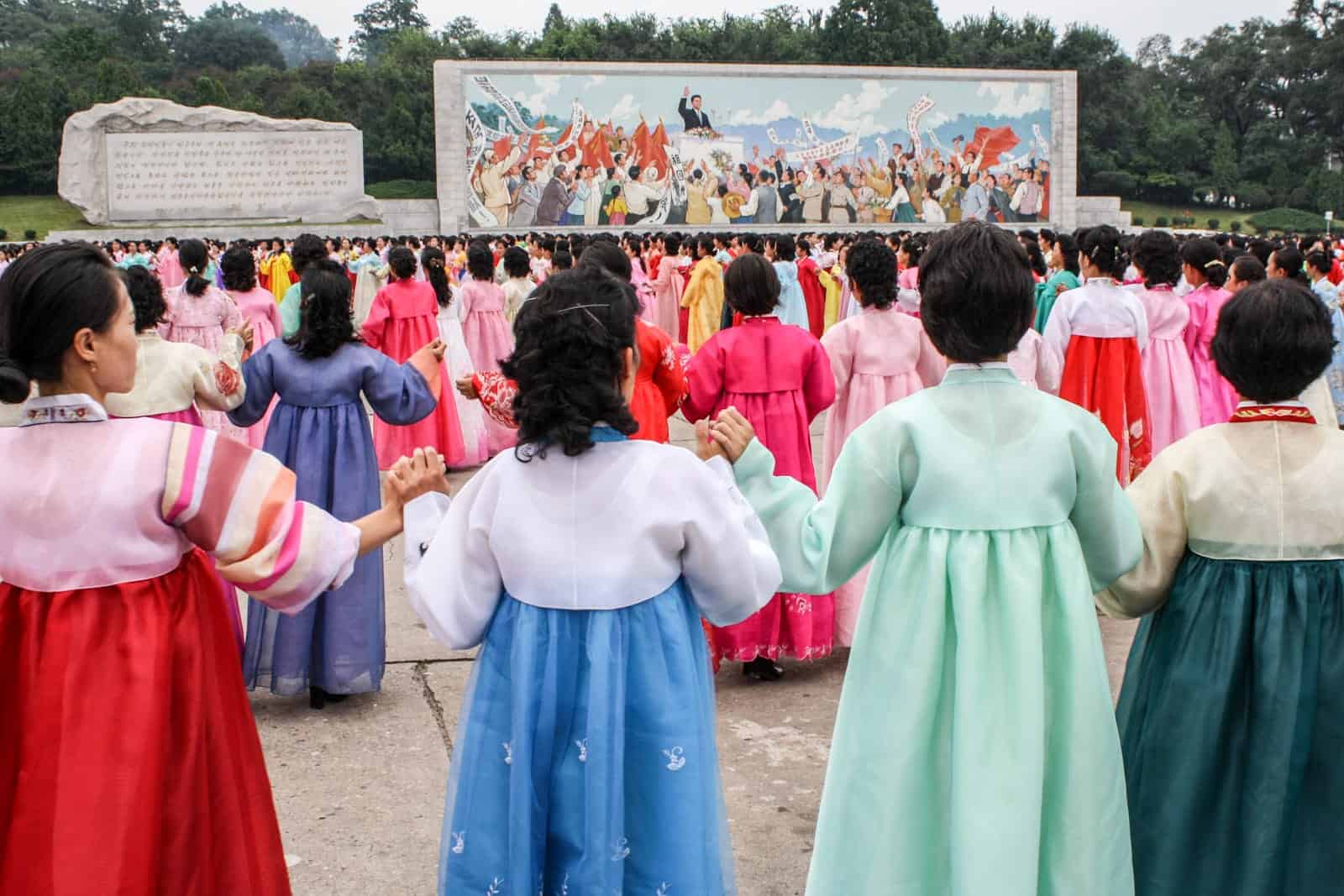
Misunderstood Destinations , North Korea
North Korea Travel Guide – The Truth About Visiting the DPRK
Disclaimer: This post contains affiliate links to handpicked partners, including tours, gear and booking sites. If you click through or buy something via one of them, I may receive a small commission. This is at no extra cost to you and allows this site to keep running.
This guide to travel in North Korea talks about tourism in this very restricted country and what it is really like to visit the DPRK.
Travelling to North Korea for seven days was hard. It’s propaganda via the medium of travel. I was overwhelmed, confused, upset, surprised, and returned with more questions than I had before I went.
My perceptions were certainly challenged while visiting the Democratic People’s Republic of Korea (DPRK). Living in the western world means I have always been exposed to a one-sided and exaggerated view of what goes on there. A biased view that never mentions anything positive and masks any forms of progress that might just pave the way for a better future, even if it evolves slowly from an extreme belief system.
At the same time, any showcased achievements you see when there entirely mask the atrocities that we know about but are obviously not mentioned.
North Korea is a country held high as the ultimate war trophy, whose unpardonable extreme ideological policies are mocked alongside the suffering of its people, rather than put into context and explained. Yet interaction with North Koreans, however limited, paves a way for understanding. The more we learn, the less inclined we are to make assumptions. Travelling can help provide that context.
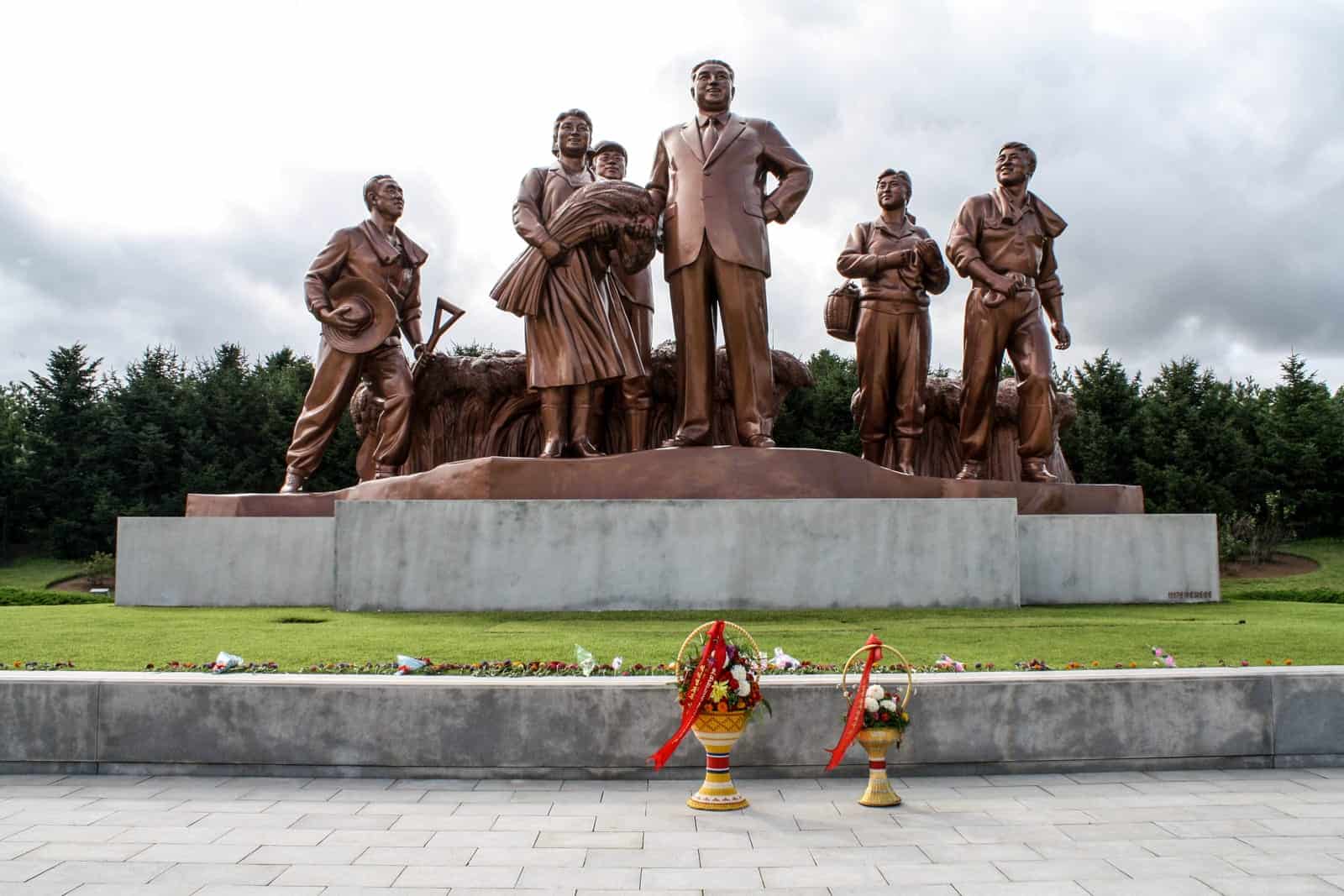
North Korea Travel Guide – The Reality of a Visit to the Hermit Kingdom.
Can Anyone Travel to North Korea?
Are americans allowed to travel to north korea, how can i travel in north korea dprk tours, do you get a stamp in your passport when you visit north korea, how do i get into north korea, is it safe to travel to north korea, what are the tourism rules for north korea 10 things to know, when you visit north korea your initial perceptions are challenged, real life in north korea – a brief look from the bus window, are people brainwashed in north korea, is it ethical to visit north korea, points of hero worship in north korea, places of entertainment in north korea, imposed order and fake scenarios, a visit to the dmz from the north korea side, riding the pyongyang metro, watching the arirang mass games in north korea, be open-minded when you travel here, the importance of travelling to south korea, north korea travel guide – frequently asked questions.
You can’t travel to North Korea unless you are in a guided tour group. Tourism in North Korea is very restricted and you almost feel as though you live on the tour bus as you can’t wander around freely. At all times, you have two guides who chaperone you every step of the way.
It’s a completely different way of travelling, and as held back as you feel, the local people simply are not used to western faces and so this form of control allows them a slow introduction. When you visit North Korea, it is not a holiday.
South Koreans are not permitted entry to North Korea.
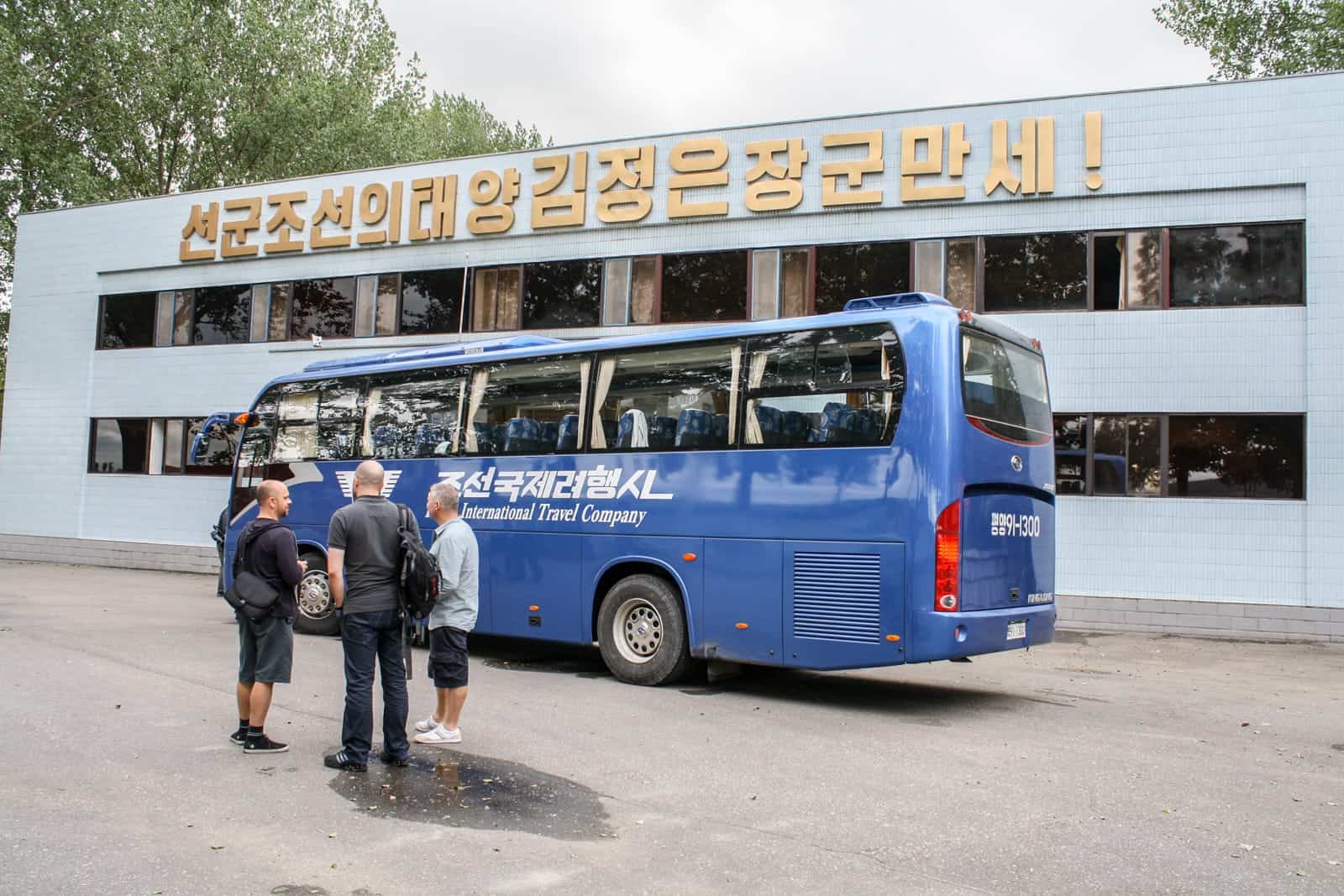
North Korea travel is all about spending most of your time on the bus.
Following the death of American tourist, Otto Warmbier after he was arrested and detained in North Korea, US Secretary of State Rex Tillerson authorised his department to block Americans from traveling to the country, which already advised against travel to North Korea.
The ban came into effect on 1st September 2017, leading some tour companies, such as Young Pioneers no longer taking American tourists into the country (effective as of June 2017). Journalists and humanitarian workers are allowed to apply for exemptions under the ban.
Choosing a North Korea tour isn’t too difficult since there are not an abundance of companies offering travel experiences there. I went with Koryo Tours in 2012, given their great reputation and the fact they opened up the concept of tourism there first.
Not only is it very expensive to go to North Korea, but I wanted my trip to be expertly organised. With the tour starting and ending in Beijing , and all your visa requirements taken care of, the whole process was hassle-free.
The night before I remember sitting with a guy in my Beijing hostel, who was also going, and feeling overwhelmed. “We are going to North Korea! I can’t believe it!” which was quickly followed by “I’m scared”. Really scared of the million rules and regulations we had to adhere to, scared of what we might see, doing something wrong and being in trouble. And scared of what I would end up feeling.
In the departure lounge, nervousness and excitement were expressed through a mutual exchange of our knowledge and opinions. It’s better to get everything out of your system before you are exposed to exaggeration, propaganda, and overshadowed facts where you have to keep a straight face. You will only be shown what they want you to see.
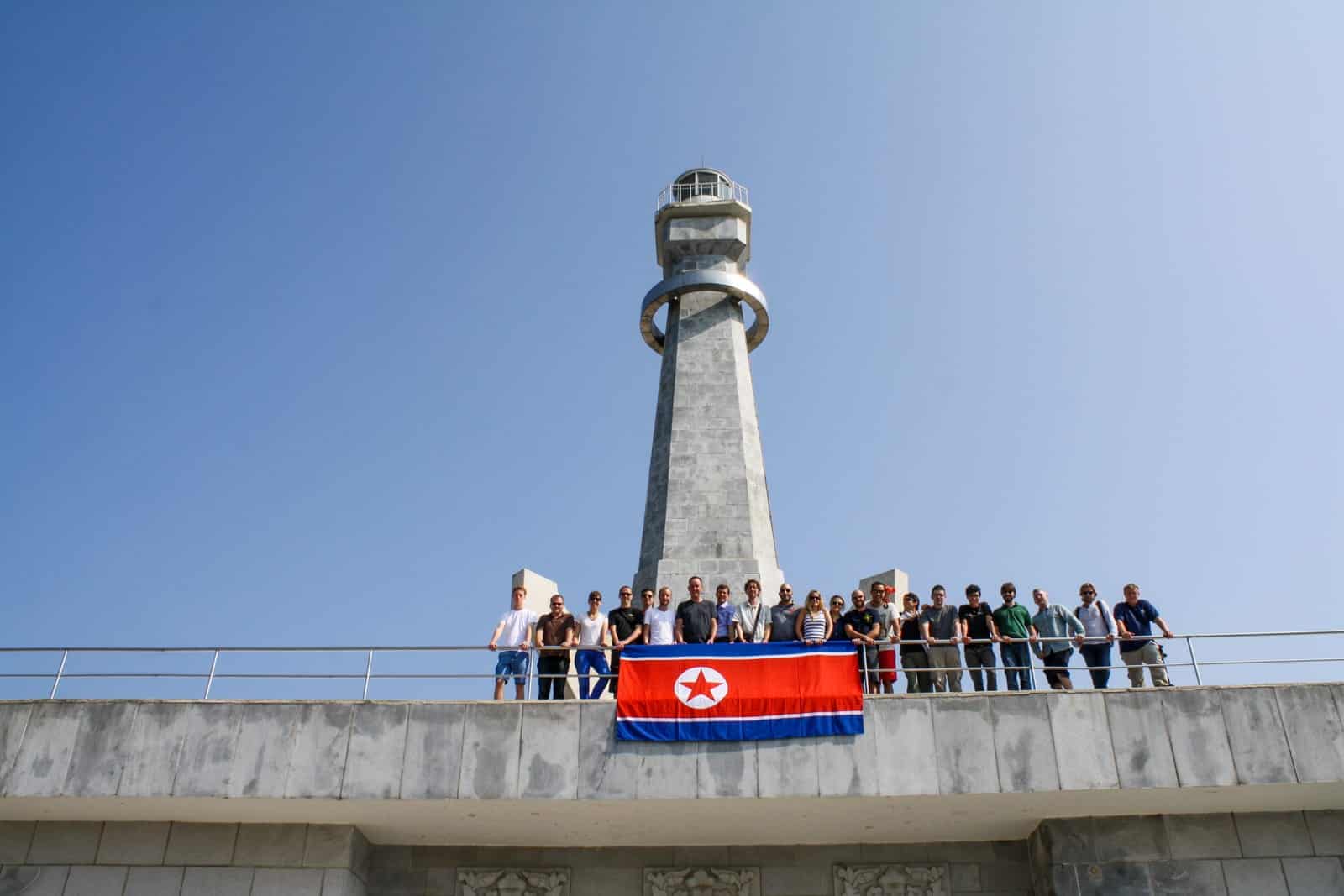
North Korea Koryo tour group.
No – the visa is simply printed out and kept together in one big file for the entire group which includes individual images of everyone on the tour (a page that is also stuck on the bus window for reference).
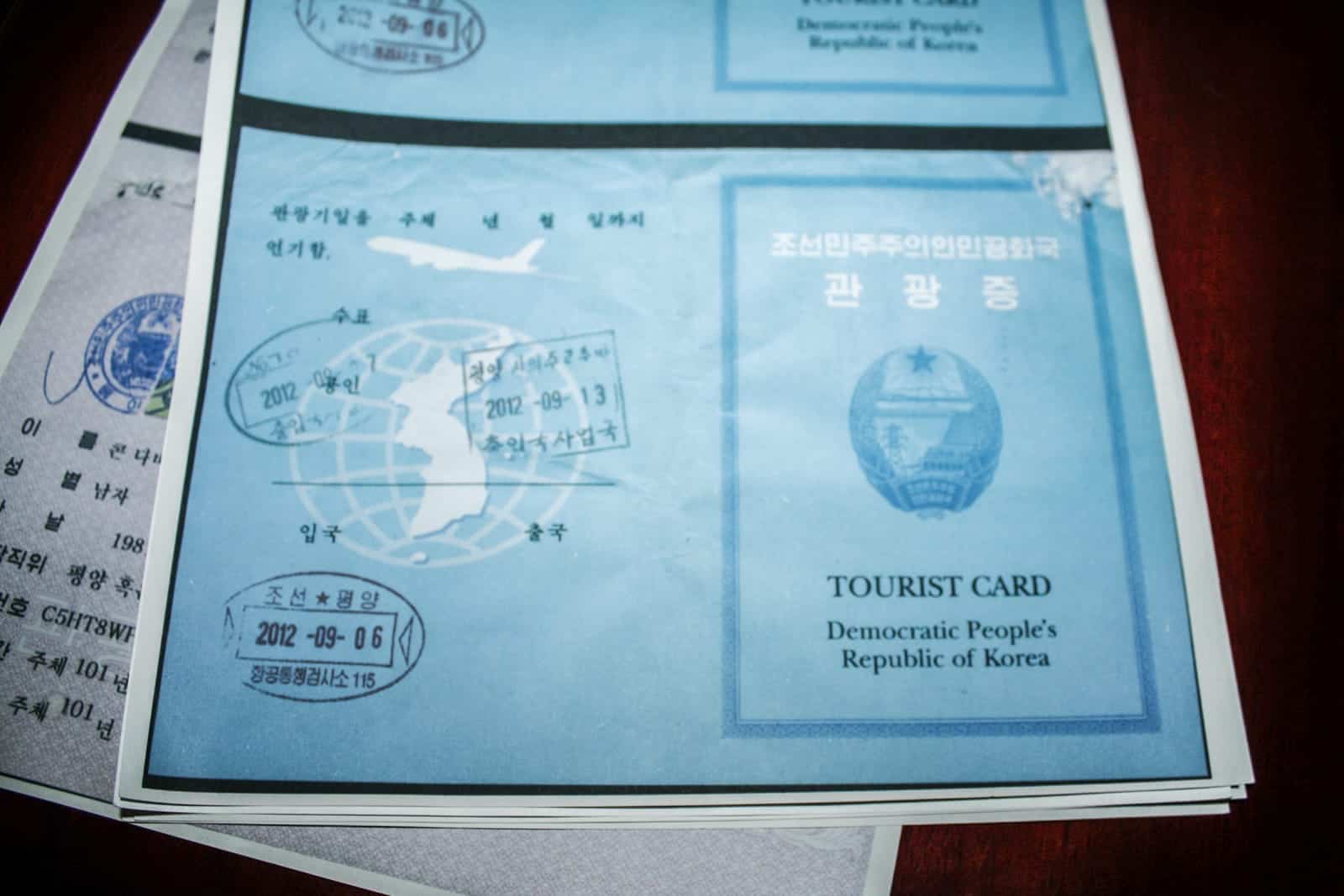
The tourist visa card to North Korea.
After signing up for a tour and when your visa and permission for entry to North Korea is granted, you will fly from Beijing to Pyongyang on Air Koryo – a state-run airline. Air Koryo has consistently bad ratings, but flights to North Korea are the only means to enter.
The majority of organised tours leave Pyongyang via train, back to China (specifically Beijing), upon which North Korean guards will enter the train before its entry into China to check your camera and make sure you are not taking any offending material outside of North Korea. Other tours may also fly back to China via Air Koryo.
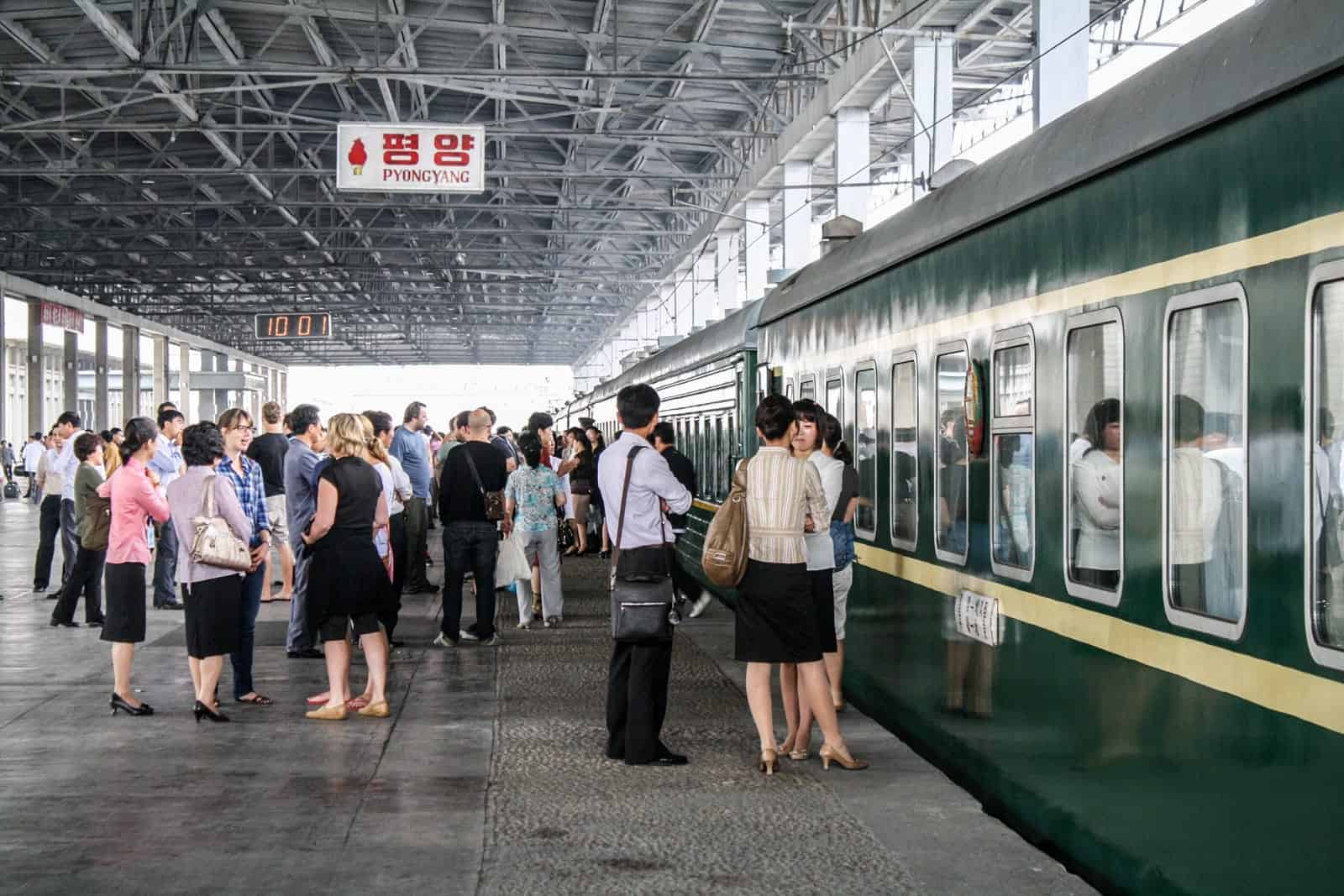
Boarding the Pyongyang to Beijing train.
As long as you follow all the rules outlined to you before you enter North Korea, travel is ‘deemed safe’ in the respect that you are never alone, never allowed to travel at your own will or allowed to travel outside of the designated areas where North Korean guides chaperone you at all times. This means it is highly unlikely that you will be affected by any serious crime or be the victim of it, nor witness any major situation in the country at the time due to the controlled nature of the visit.
North Korea isn’t a communist dictatorship where people and visitors have relative freedom, like Cuba . Every DPRK tour factors in a full briefing, before departure, on every applicable rule you must follow. These are often reiterated on the trip itself. There is no excuse for breaking the rules which are very clearly laid out.
There is nothing brag-worthy about travelling in North Korea; everyone is effectively at risk travelling there.
It is also wise to keep up to date with the latest news agenda, alongside political tensions in the area and those between North Korea and your country of citizenship that may affect your entry to the country as well as any pending bans or rule changes.
You will attend a meeting in Beijing at the offices of your designated tour company before the start of the tour (normally 24-48 before), which outlines the rules you must adhere to when travelling in North Korea. These include:
- The types of camera and lens size permitted for use in the country.
- How your Passport will be taken from you when you enter North Korea, for the duration of the tour (and usually kept by your tour group leader) and returned to you upon arrival back into China. The reason for this is stated as being “for security reasons”. At the time I travelled, my mobile phone was also confiscated.
- How to take pictures of the Kim statues , which cannot be captured close up or cropped. They must be captured in their entirety.
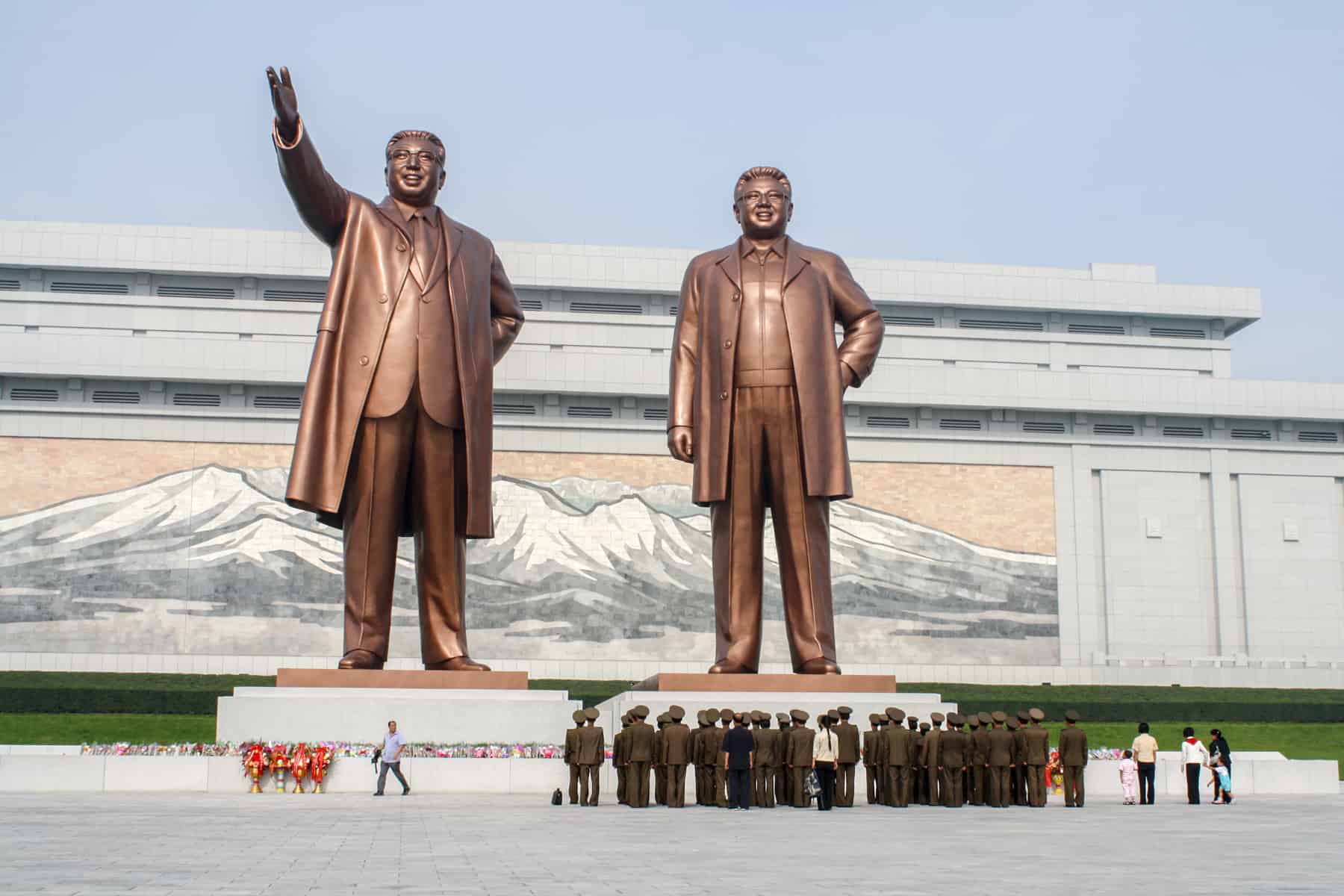
Bronze statues of the Kims in North Korea.
- The kinds of pictures you are NOT allowed to take. Pictures of any form of construction, scenes that denote poverty and images of the military are not permitted. When in doubt about the nature of what can and can’t be photographed, ask first.
- How you will be expected to honour the leader. When visiting the statues of Kim Il Sung your group will be expected to bow and lay flowers, just as the North Koreans do. You are also obliged to pay respect when visiting all monuments of national importance.
- The importance that any kind of independent travel in North Korea is in no way allowed, anywhere or at any point of the tour.
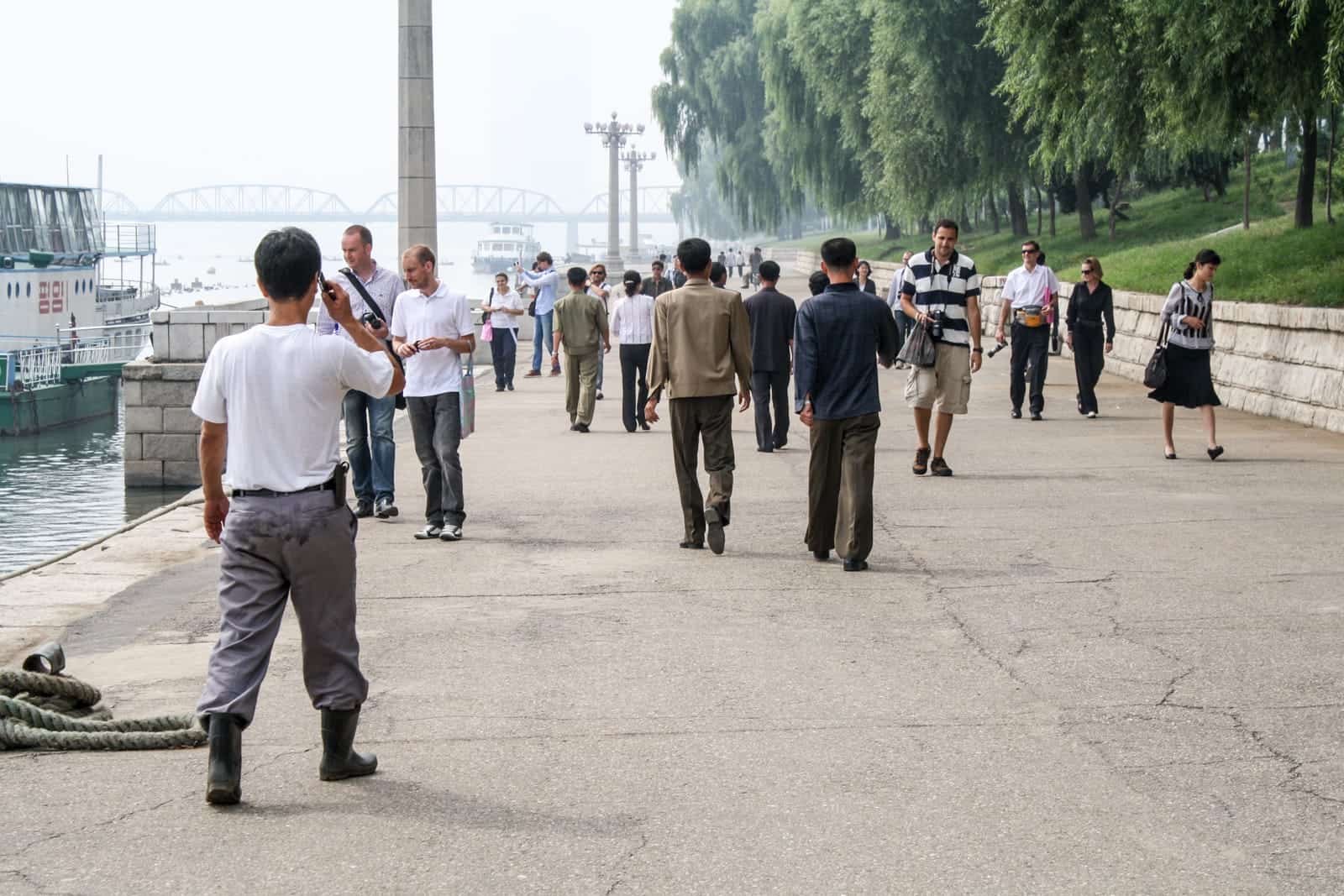
Pyongyang city seafront.
- Do not try to reason, state facts, change the narrative or attempt to overturn the words and actions of your North Korean guide or those you come across at designated sites. This is their job, and while you might categorically know something not to be true, they have no choice, and you chose to be in this restricted and propaganda-heavy situation.
- Any attempt to converse privately with a North Korean citizen will be seen as an act of espionage.
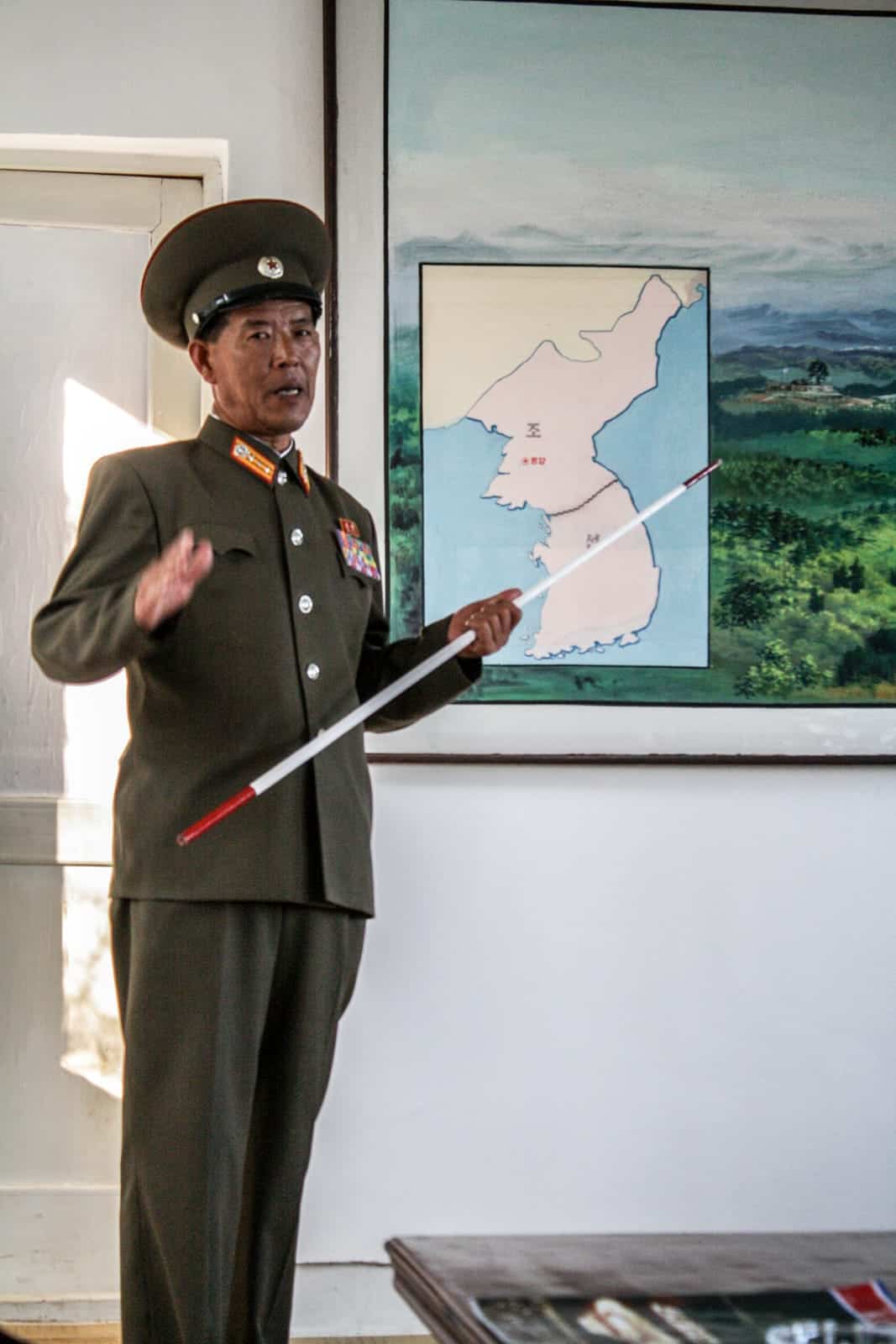
North Korea guard explains the history to tourists visiting the border with South Korea.
- To act positive, praise-worthy and keep any negative thoughts to yourself and not say anything derogatory out loud. It’s better to be submissive and accept the situation than to be seen as trying to overturn it.
- Do not bring with you any materials pertaining to South Korea, religion or anything that can be seen as a form of ideology of which you will be seen as imposing.
You must absolutely follow the rules for travel in North Korea and don’t do anything outside of those rules which may draw attention to yourself.
There are no exceptions to these rules and nor will you get off lightly. Imprisonment and torture are common forms of punishment and your tour company has no special command to get you off the hook.
Also, anything you do wrong also puts your North Korean’s life (and their family’s lives) at risk.
My North Korea Experience
Pyongyang, where the North Korea tour is mostly be based, isn’t a grim and frightening ghost town. Looking out from the top of the hotel, you are afforded a view just like any other big city, including skyscrapers, factories, monuments and mass housing. It is, after all, the centre of the country’s most elite – it exists as a centrepiece and to house particular people.
I thought Pyongyang would be a small concrete city, hidden from view. Instead, it sprawls for miles and miles and looks just like any other city, except it’s scattered with propaganda posters, mosaics and bronze sculptures of the Kims. It is both the pivotal destination for tourism, the capital and at the heart of the regime.
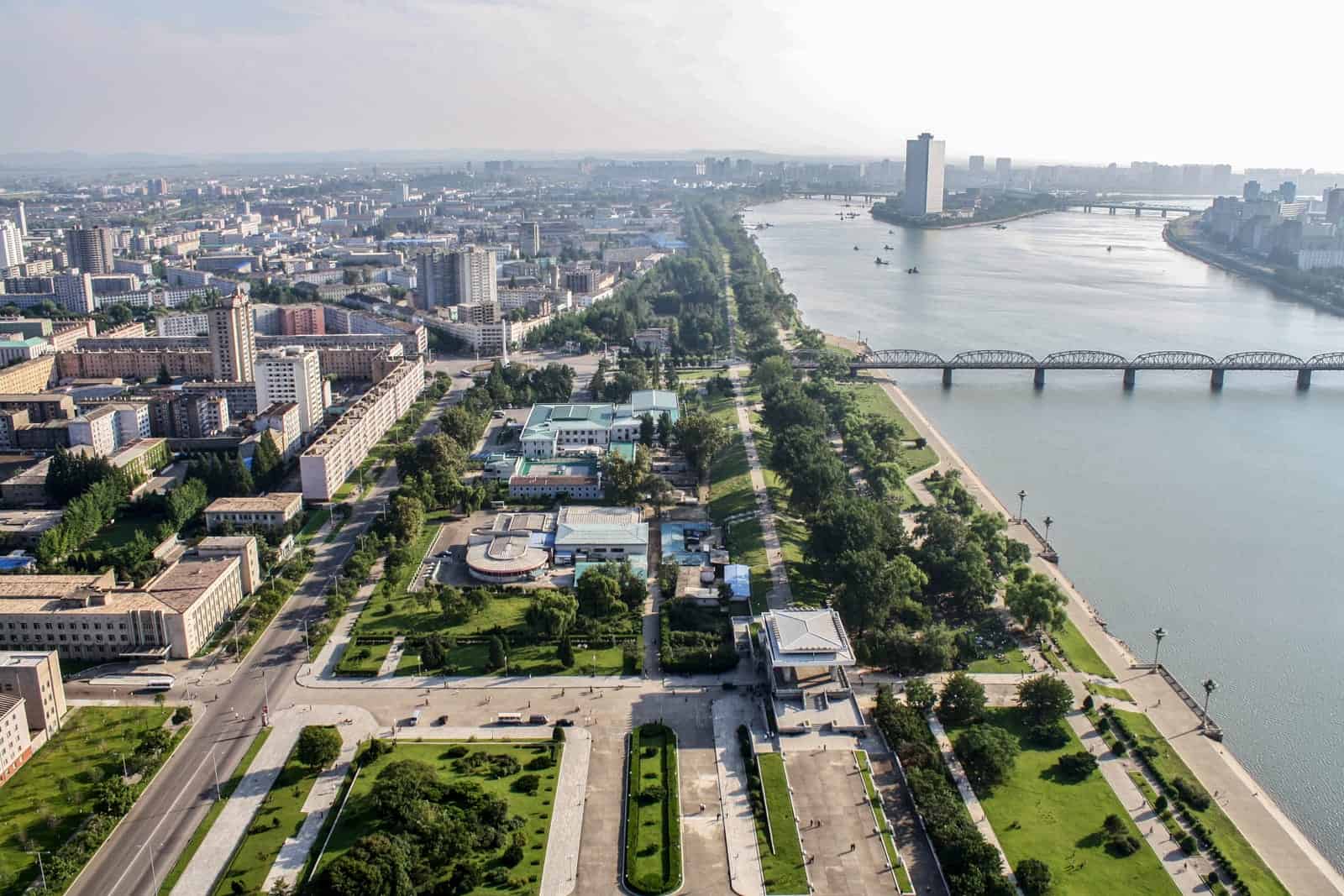
View of Pyongyang from the tourist hotel.
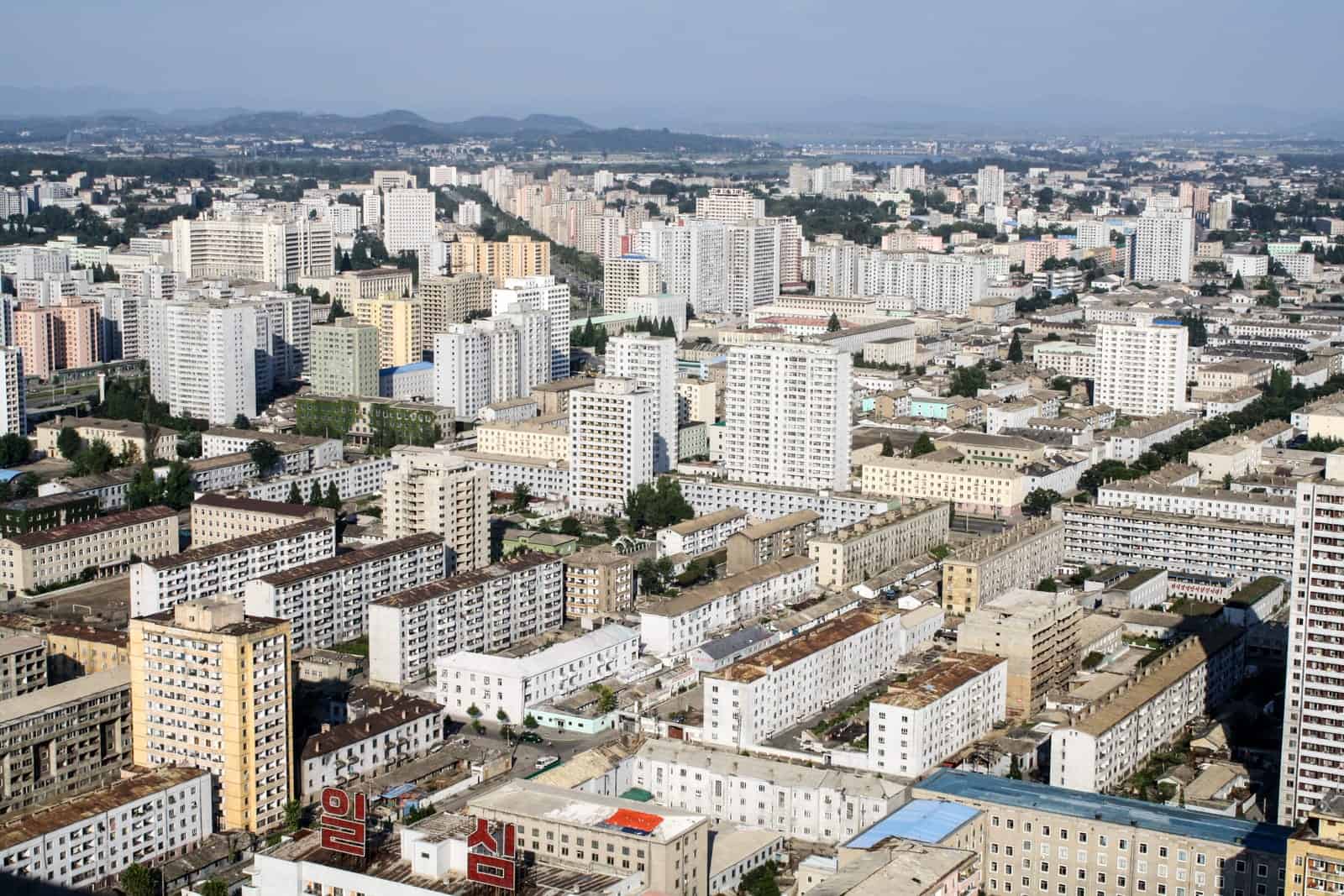
The high-rise buildings of Pyongyang, the capital of North Korea.
There is no denying that it is for show. This is not how the majority of North Koreans live. The city gleamed with new and pristine buildings, built to the grand imposing communist-style façade of dominance, modern progression and increasing wealth.
There are statues so immense that their towering presence automatically creates an air of intensity, like the artistic propaganda posters you can’t miss – a style I had previously learnt about at the Shanghai Propaganda Poster Art Centre prevalent during the Mao’s Communist Regime in China. The stylised shop fronts we too often take for granted when at home are, in fact, empty. Or they happened “to be closed” that day, of course.
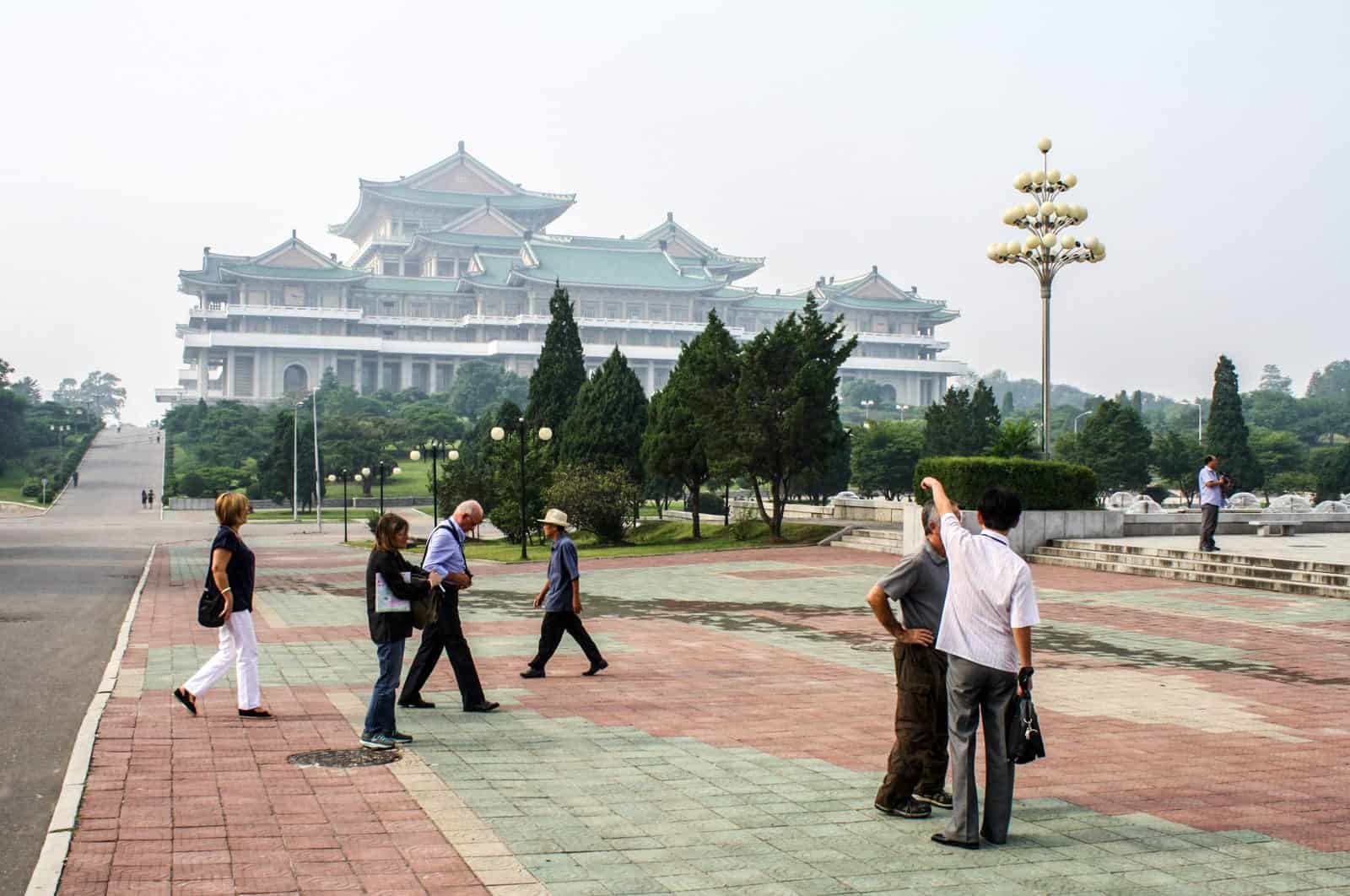
Sightseeing in Pyongyang.
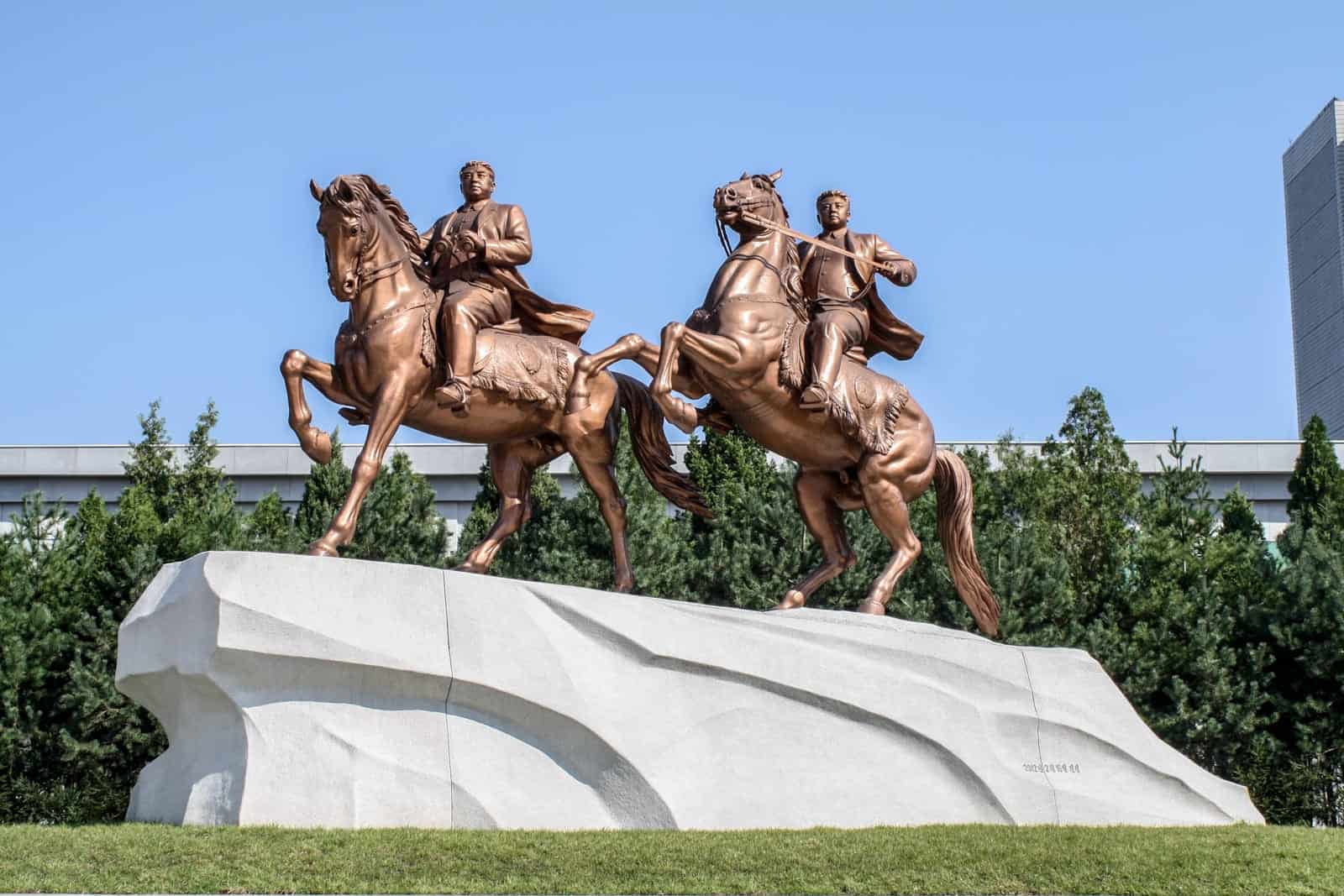
Bronze statues of the Kims riding horses.
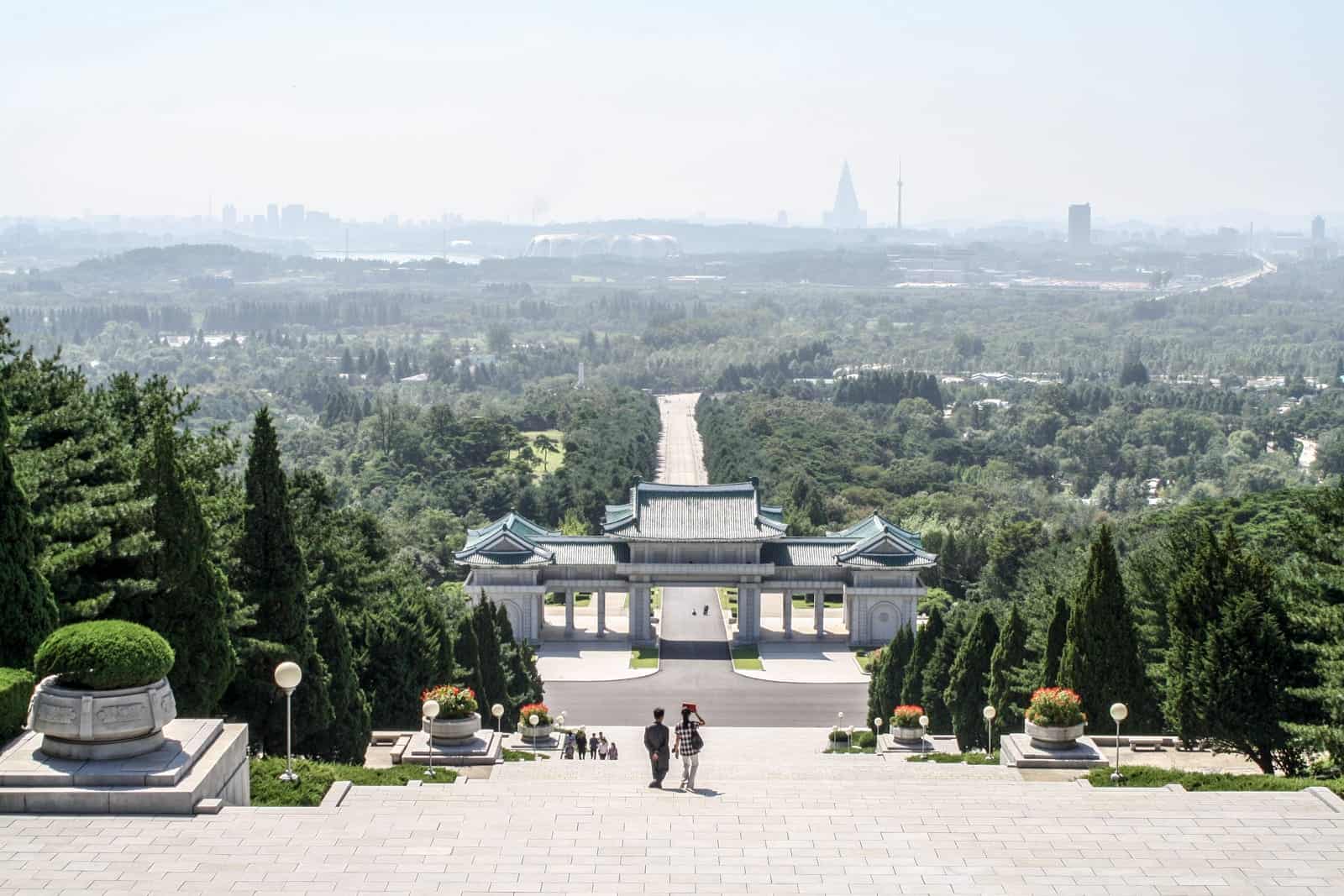
Elevated view of Pyongyang City.
It was, seemingly, a functioning city full of local people going about their daily lives. Whether that was the queue for a building we could only assume is a food and ration station (there are only tourist stores open), the pockets of people disappearing underground to use the Metro station or walking to the office, or the mothers out with their children, we got only a very, very small glimpse of daily life. Mostly from the bus window.
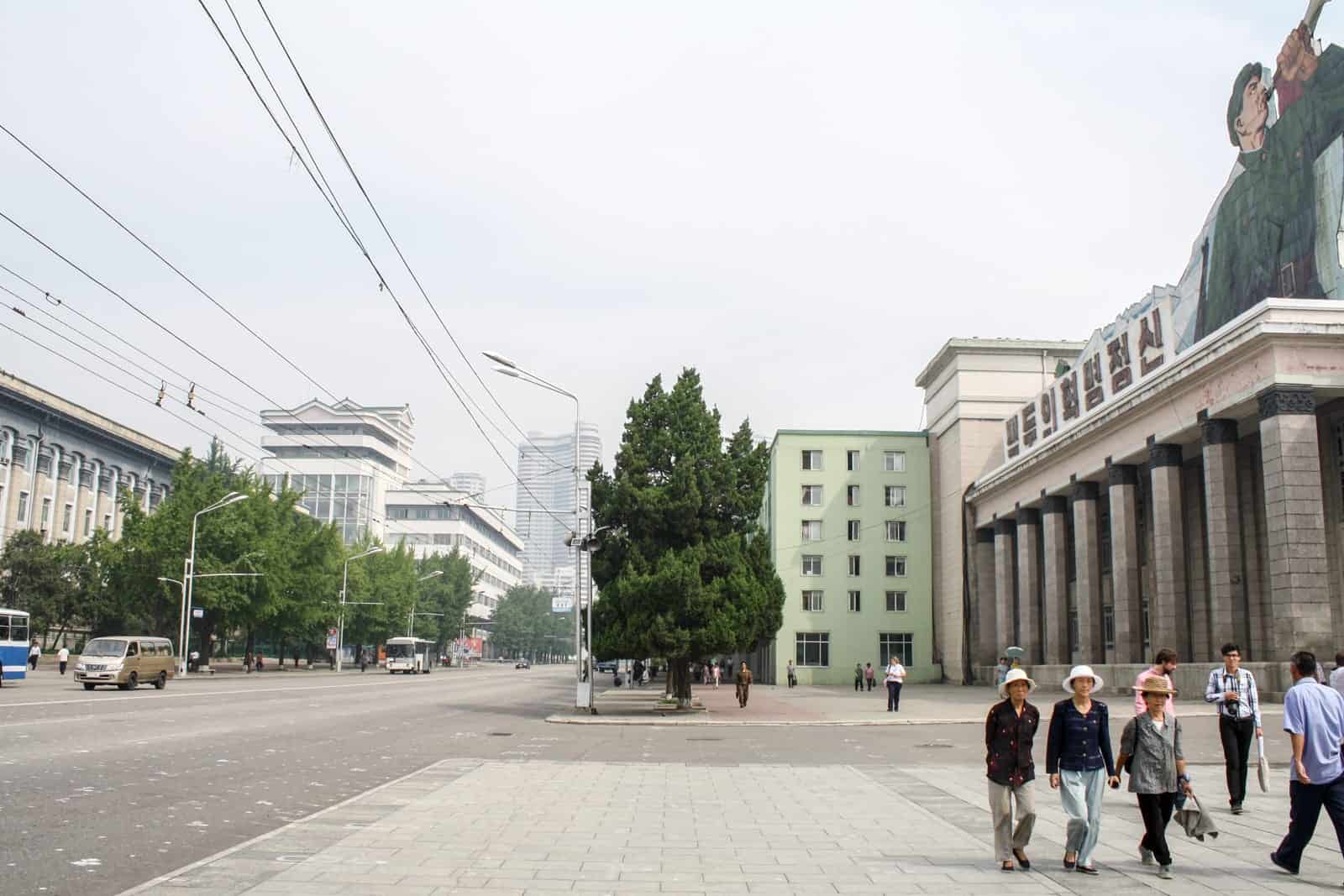
Streets of Pyongyang.

Pyongyang Metro entrance.
You must always remember what is deliberately presented to you when you travel in North Korea.
Whilst you know about malnourishment and mass electricity blackouts, you don’t see it in the show city. So whilst there’s no denying the existence of this because there’s proof from defectors and undercover reporters, in Pyongyang it is not on the scale we are told about because the set-up is very different. Although extreme poverty does exist en masse throughout the country (as footage shows), this is what you (strategically) won’t see.
When we drove out of the city, we did pass shanty-type, less affluent towns. This was a real glimpse into how some of the population live outside of the capital and was the more shocking side to travel here. Of course, upon leaving Pyongyang, you can’t take images. Instead, you only remember what you saw.
Construction was taking place everywhere, and we still wondered why many people were living in semi-completed buildings. I’ve also seen similar neighbourhoods in China and other parts of Asia, where buildings are left rather than being maintained and where wealth distribution is unbalanced. I wouldn’t say this housing is unique to North Korea, but it did show the existence of the same underbelly of poverty. From news investigations, we know deep down it’s far worse than what we see from a quick glance out of a bus window, of course.
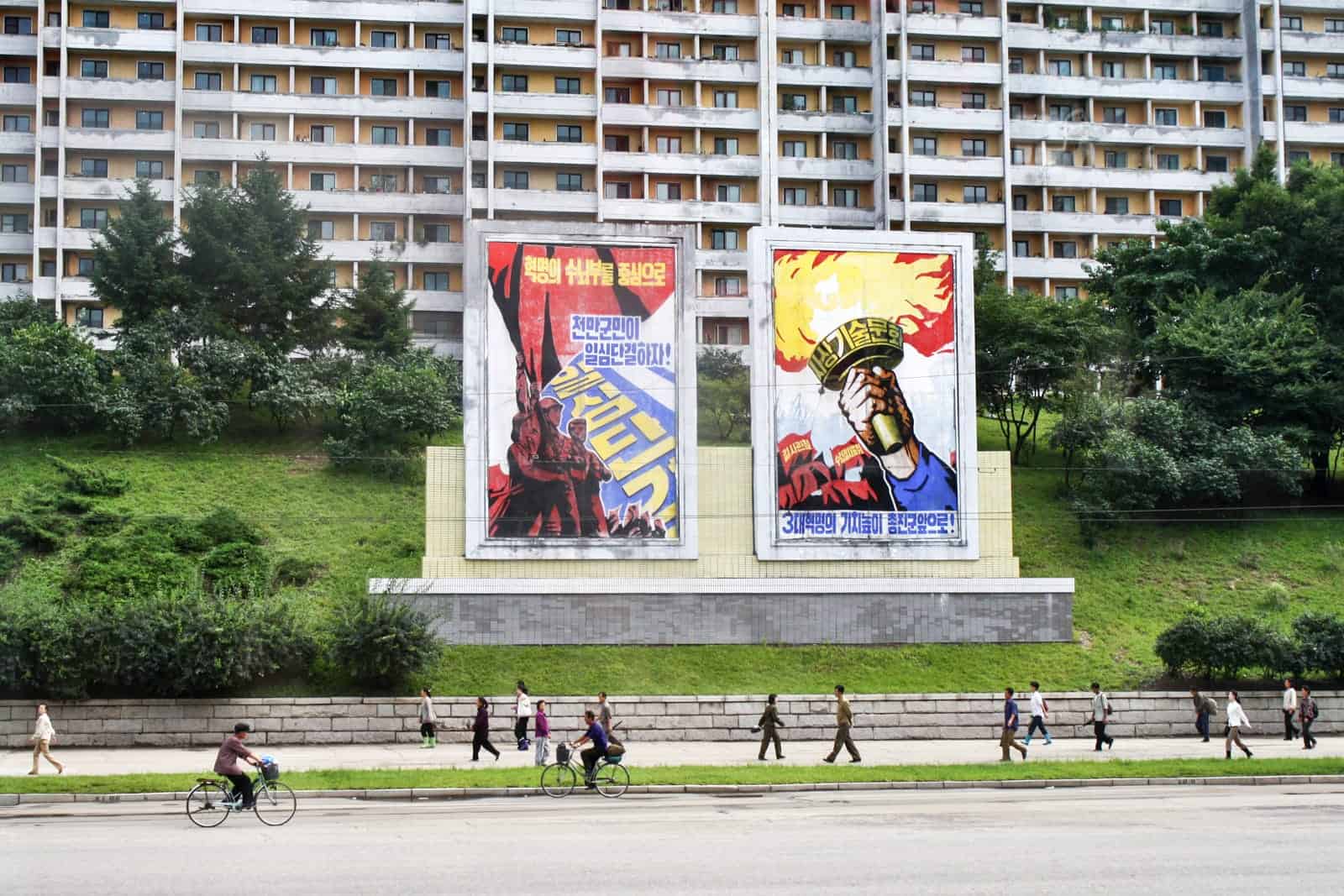
DPRK Propaganda sign in a neighbourhood in Pyongyang.
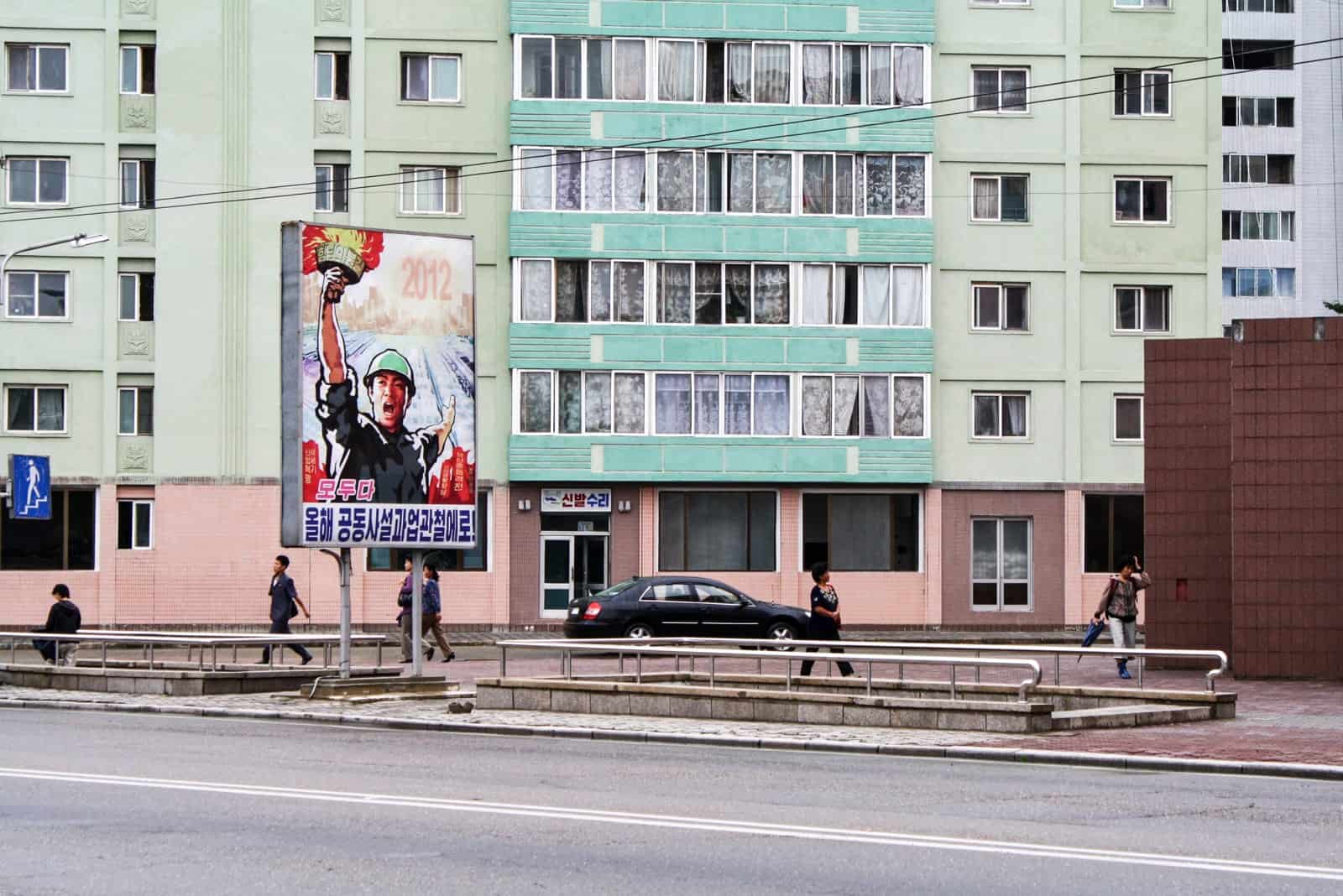
Life in Pyongyang.
What confused me the most about North Korea was the beautiful countryside in Nampo and around – green hills and yellow crop plantations, trees and orchards. In a land that has around 70% mountainous terrain, it looked pretty impressive.
Our British guide told us that North Korea had admitted to bad farming practices and that it lacked knowledge about beneficial methods, but it looked as though things were improving. Or could. If it was put into practice for the benefit of the people.
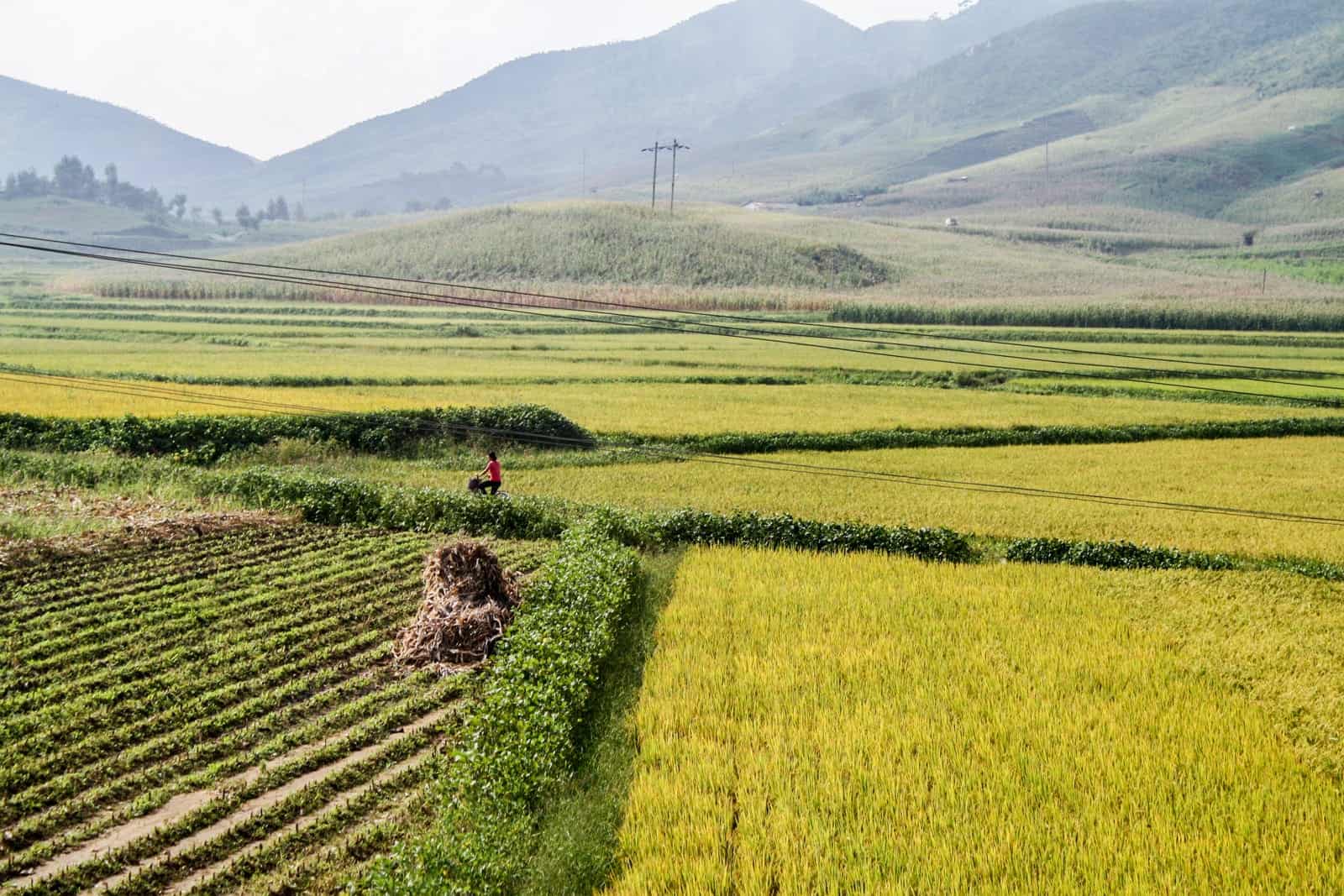
The countryside of North Korea.
I’m no farmer, but I wasn’t expecting to see so much green and grain. Whilst this may not produce a plentiful supply for the entire population, there is production in farming, although I have no doubt that it’s far from enough or distributed properly, if at all. There have been famines since the 1970s when the help from the Soviets ended, and the need for international aid began.
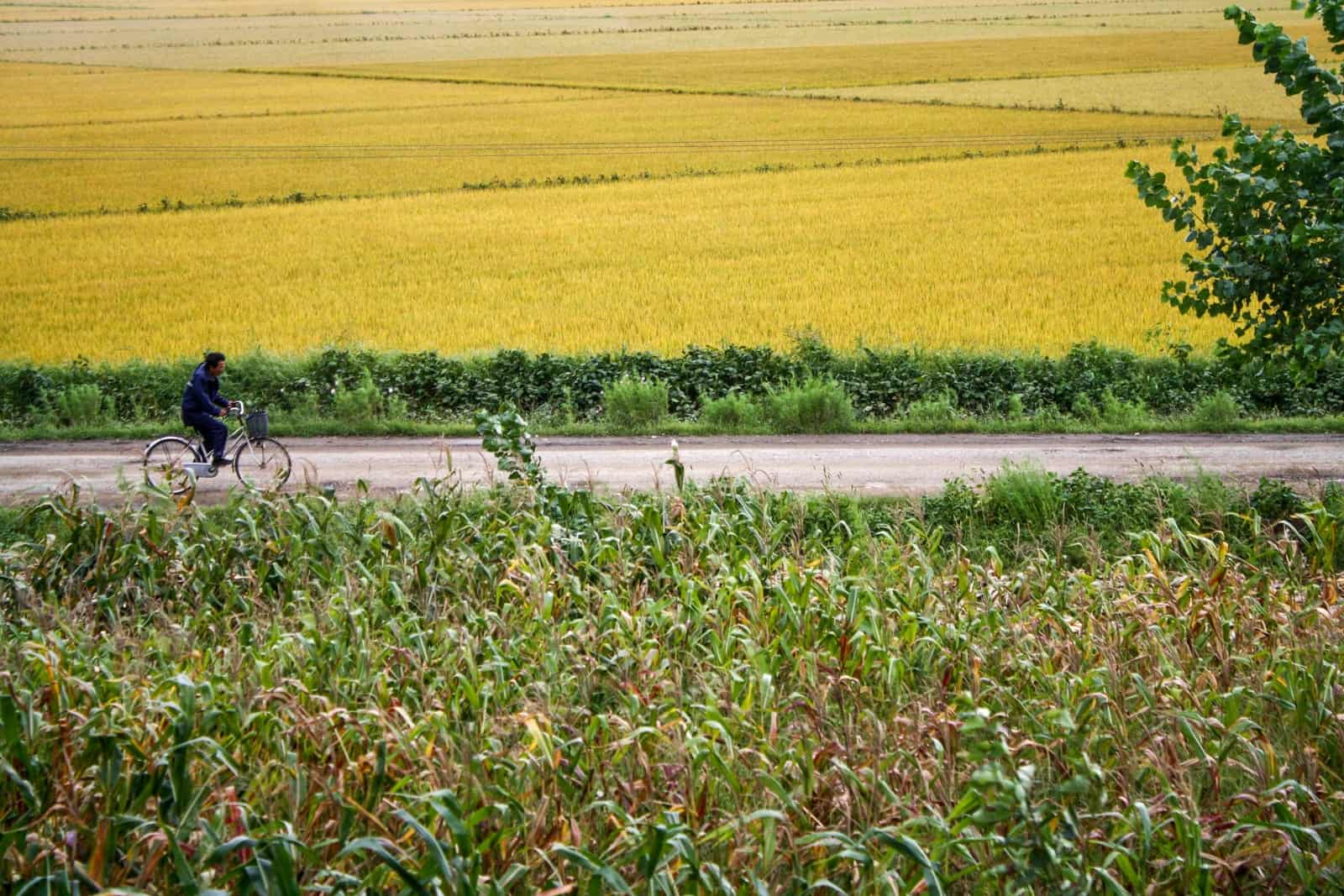
The countryside near Nampo outside of Pyongyang.
Our visit to a local farm was very set up, and we had no belief that anyone we met actually lived there. The shame is that it still provides a window of hope for what can actually be.
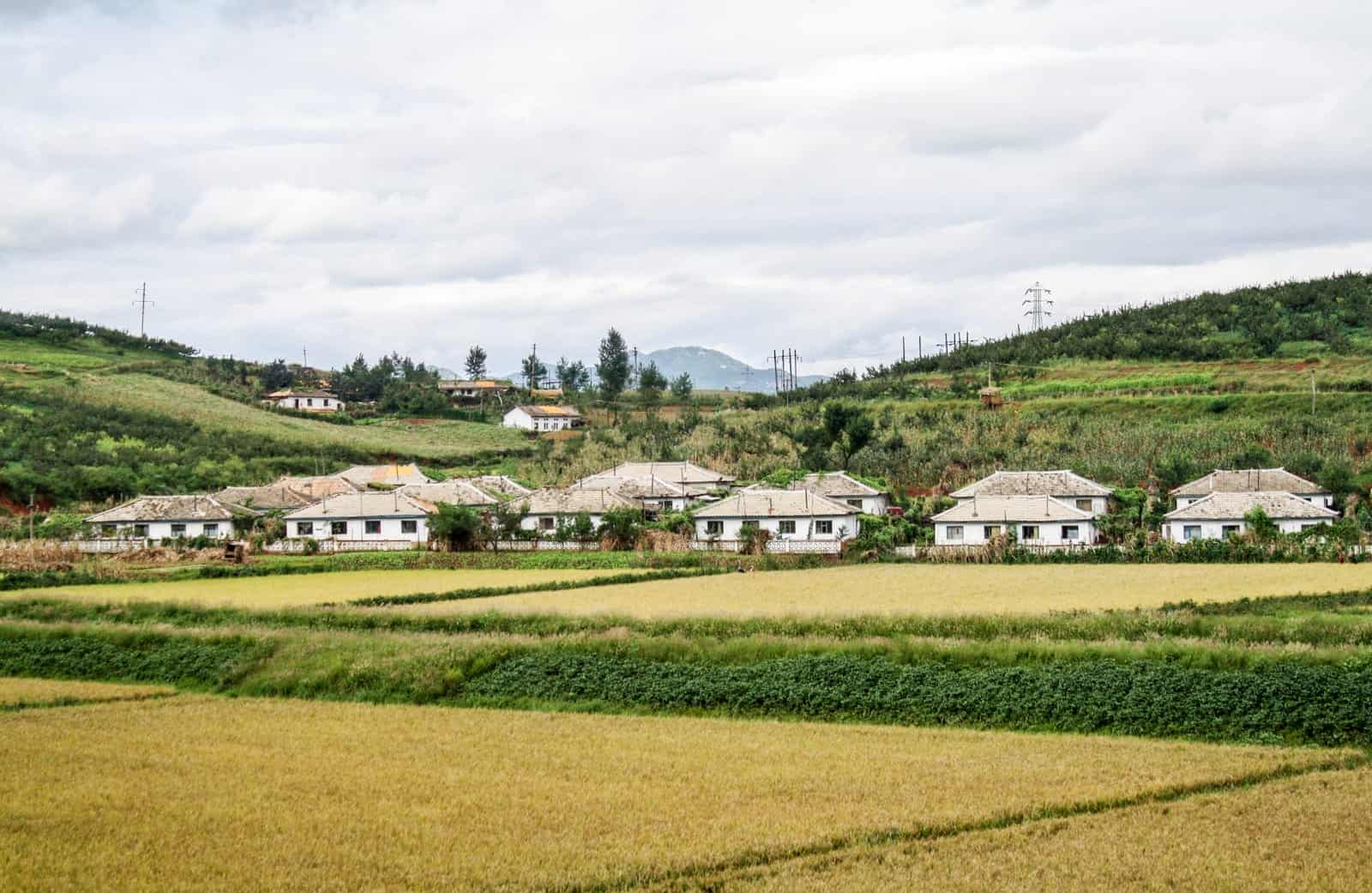
A working farm in North Korea.
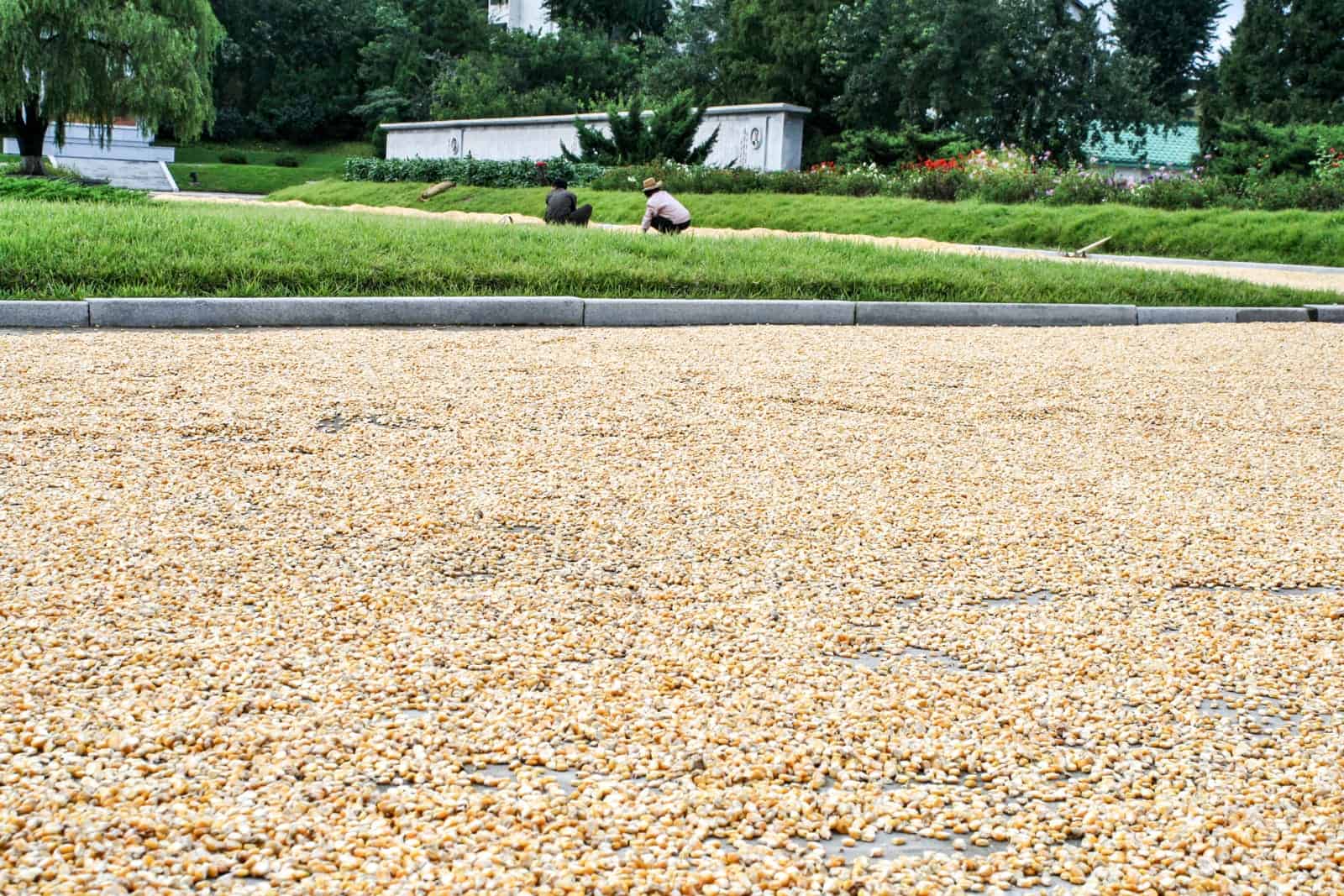
Farming in North Korea.
Our visit to an apple factory with its investment of millions of pounds worth of equipment looked as though a slow growth of manufacture and export is on the cards – or again, one could hope. The mechanism is there – it just needs to be implemented.
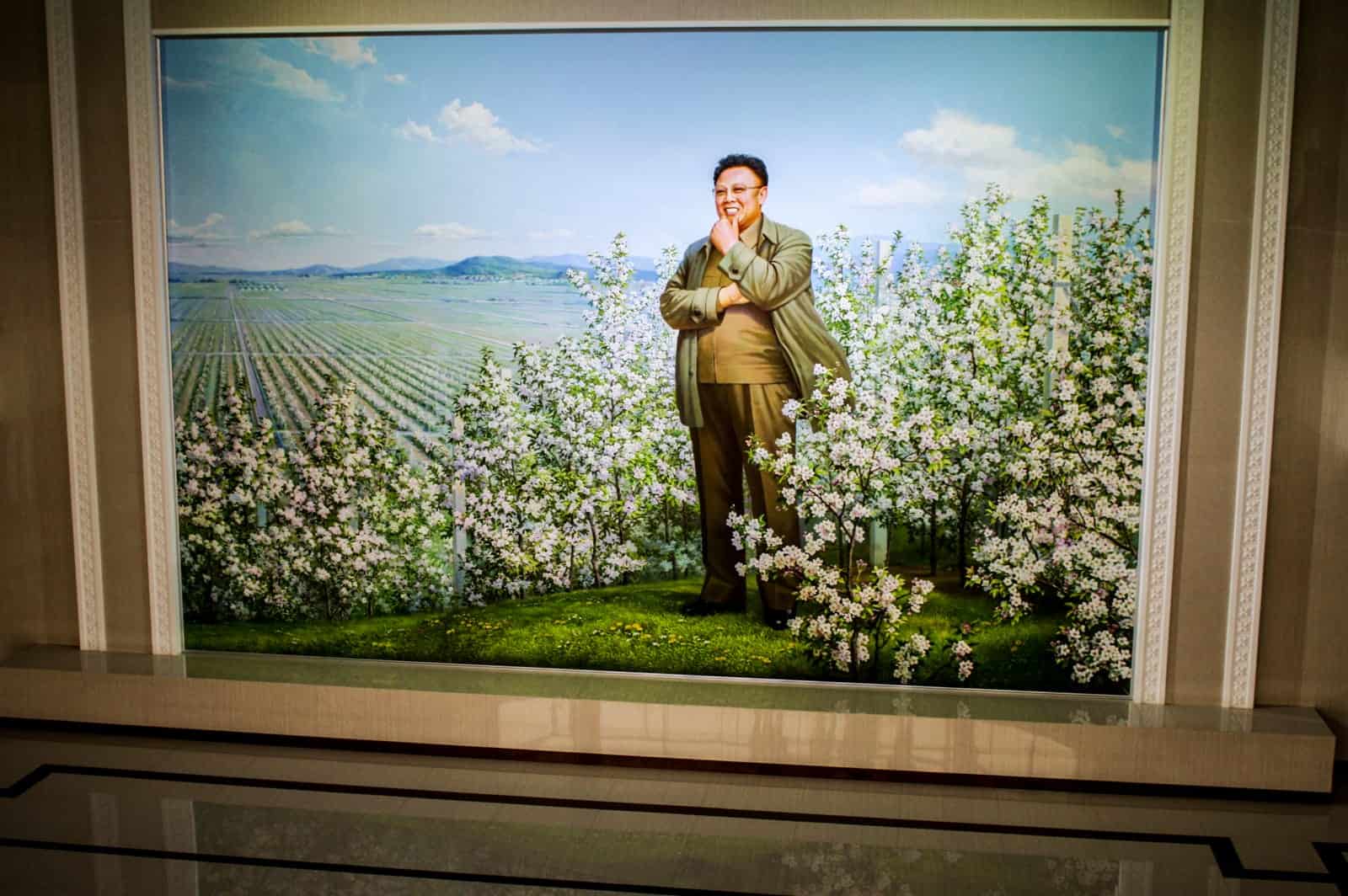
A mural of King Jong Il adorns the apple factory near Pyongyang.
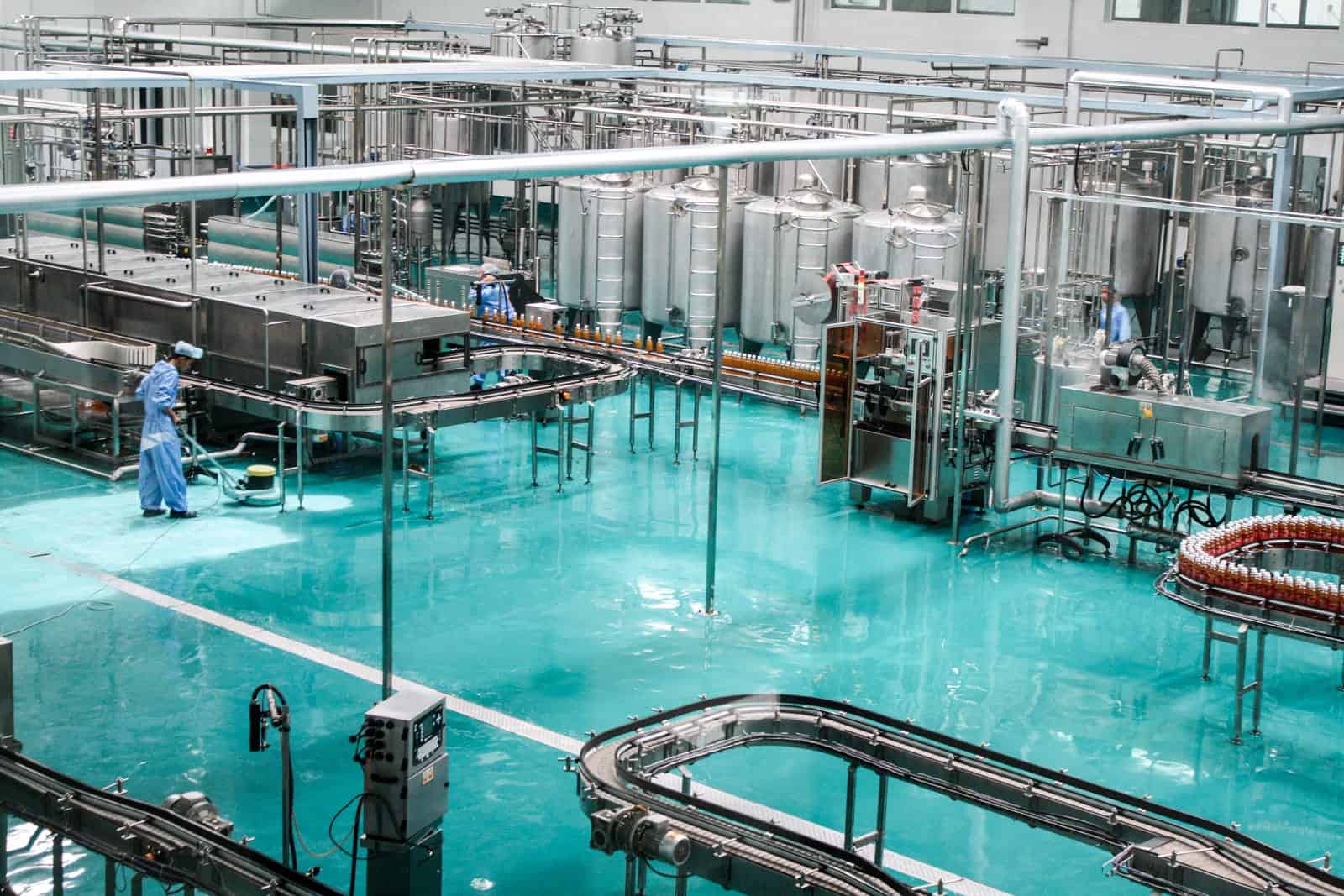
Apple factory tour.

Apple products from the factory are on sale for tourists.
The question of what it is like to live in North Korea fascinates everybody. When you look into it a bit more deeply, we all are cut from an ideology of the society we are brought up in, except that in North Korea, it is on a very extreme scale to what we will ever know.
From what I observed when I was in North Korea and what I read before and after my visit, the majority of North Korean people know of nothing else, and by having no access to other sources or information and, therefore, no comparison (except the few who retain and obtain information and later defect), it appears they live in a world they assume is normal.
From that sense of normal appears to be a genuine love for the Kims – nearly everybody wears a pin badge bearing one or both of them, and many bow to the statues before work in the morning. They believe in everything they have been told as they have never known the full facts, or been given the means to find out or make a personal judgement. If you knew of nothing else, what would you do? Sure, there must be people from older generations who also know the absolute truth but have no option but to live in submission.
My point is that we shouldn’t be so quick to judge a nation of people without looking at their ideology in context. It’s devastating that people have to live in such isolation in this day and age. We, in the Western world, are lucky to live in societies where we have freedom of speech, freedom of expression, access to information and means from which to realise our aspirations and make informed choices.
We shouldn’t be so quick to brand a nation of people as odd, weird or crazy when they have no clue and are just going about their normal lives.
The normal they know.
The ethical question of visiting North Korea is a tricky one, and I sit on both sides of the fence.
On the one hand, everything that happens in North Korea is wrong. At the same time, in that case, we wouldn’t be travelling to many places. Some argue that by visiting North Korea you are helping to fund the regime or government’s objectives, but this applies to many countries open to tourism. Think of the corrupt governments that still exist in Asia and the Middle East, but you don’t think twice about heading there.
On the other hand, meeting North Koreans is a gateway to openness. The North Koreans we met were kind. Our guides were easy-going, approachable, witty and caring. Of course, you can’t talk openly to them, speak of things at home, or try to inform them of the facts behind the Korean War. This would be against the rules set upon you and at risk to them. Beyond the historical ‘facts’ they had to tell and the rules they had to impose (since they would be in serious trouble over any of our irresponsible actions) they weren’t lifeless robots. They became our friends, just like any other person.
On National Day, we walked through a park where locals were celebrating with their families, laying out a huge picnic, firing up the barbeques, playing music and dancing. Some were unsure of us, giving a stare that suggested a slight fear of the unknown and given what they have probably been told about the Western world and its people, others were welcoming, offering food and pulling us into their dancing circles.
You might question the serendipitous encounter at the time visitors arrived. Even if they were told to be there (which is highly likely), shaking hands, smiling and interacting was the only reassurance we could provide that we are not all bad, and I feel that is a positive start to what could be a slow but positive change in this country.
Travelling to North Korea and a tourism drive could be one way to start opening the cracks.

National Day in North Korea.
What Do You Get to See in North Korea?
The number one rule of travel to North Korea is that you will never see the real North Korea. Travelling to North Korea is in no way a relaxing holiday or a form of vacation. They want you to return having believed the PR presentation about development, happiness and loyalty.
A trip to North Korea is not complete without the sites they want you to see – the showpieces of the regime and the points of Hero Worship – such as Kim Il Sung Square and the statue we had to bow to, the Tower of Juche Idea, the Founding Party Monument, the captured US spy ship USS Pueblo, Kim Il Sung’s native home.
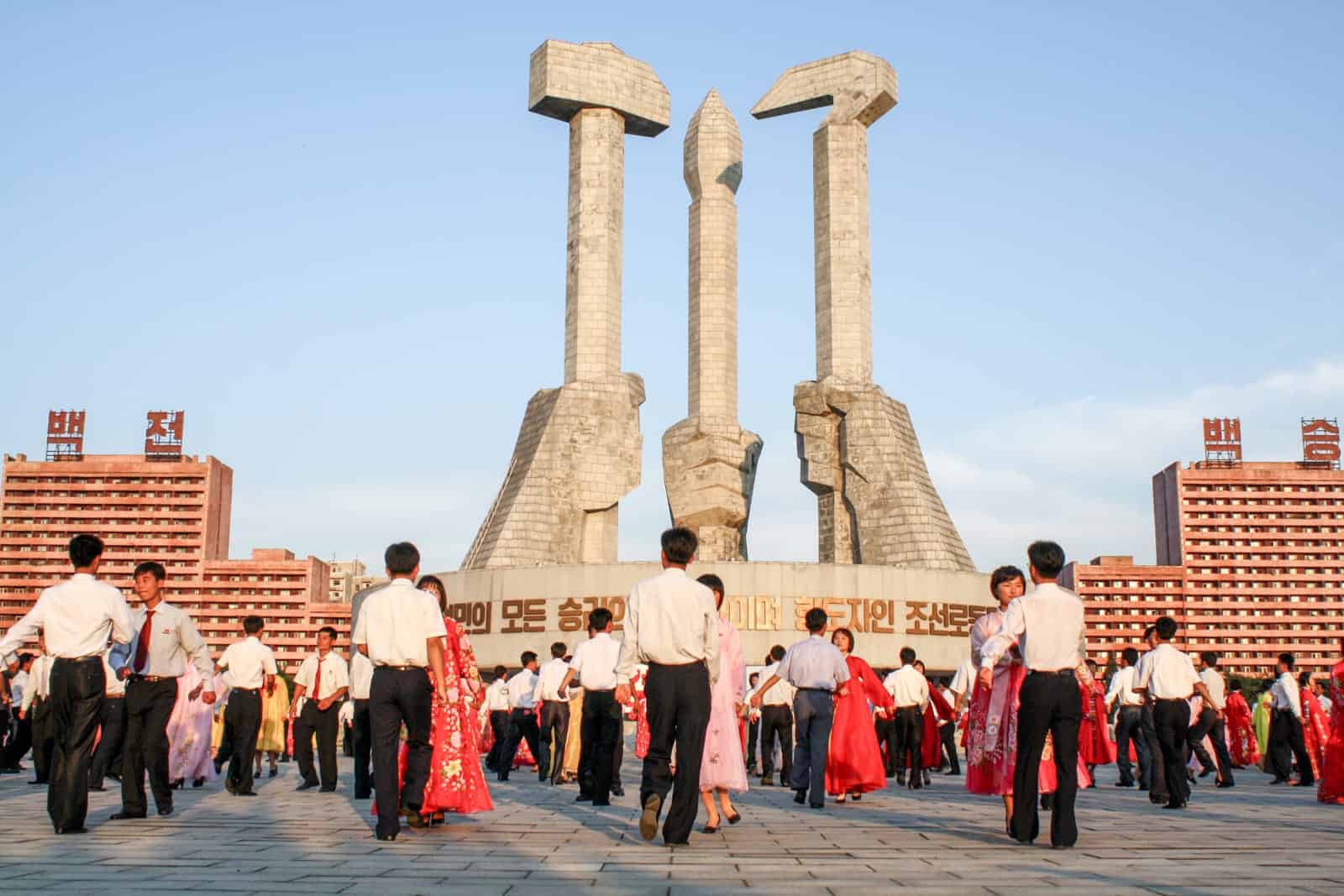
The Monument to Party Founding in Pyongyang.
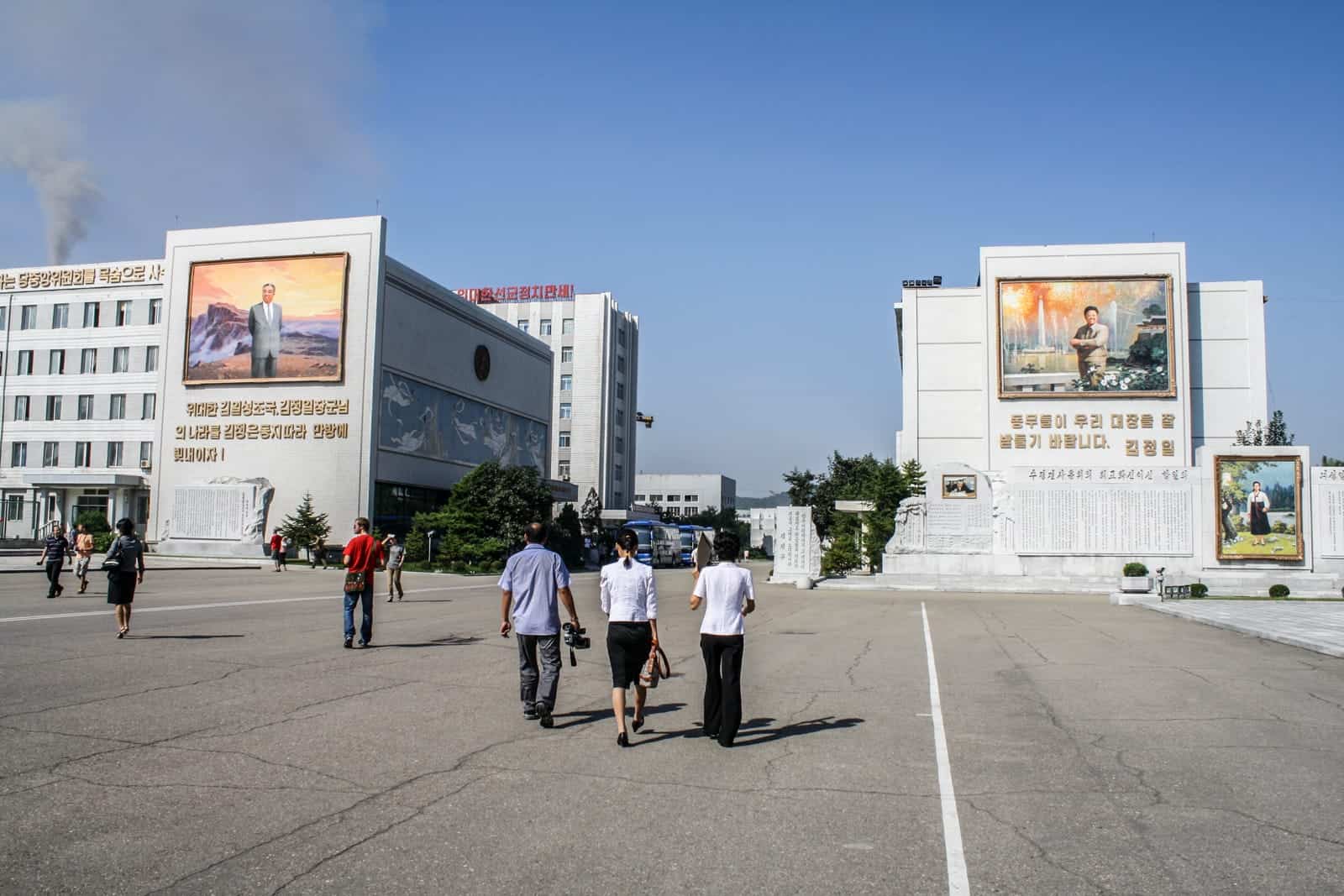
Monuments and murals in North Korea.
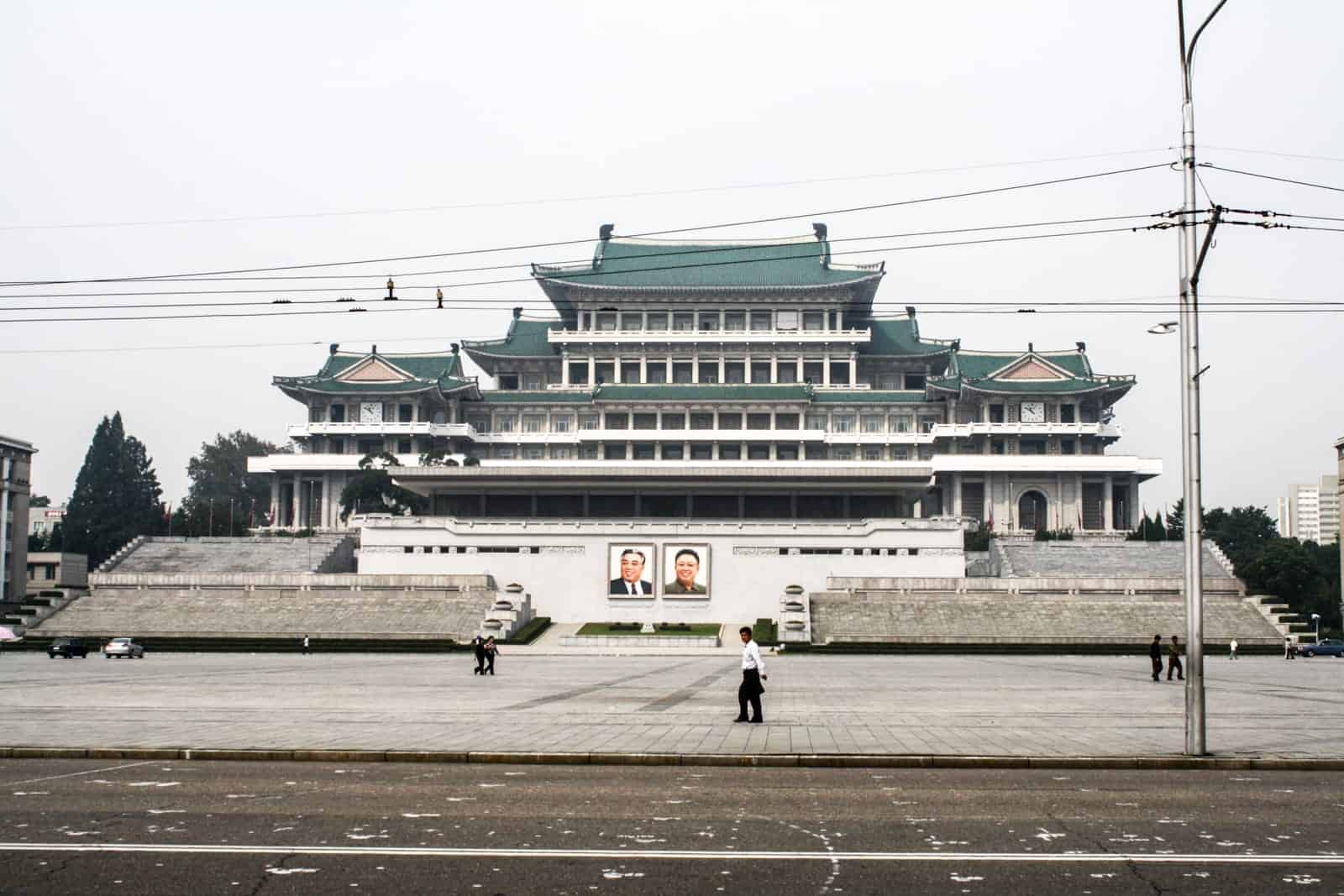
Pyongyang parade ground markings.
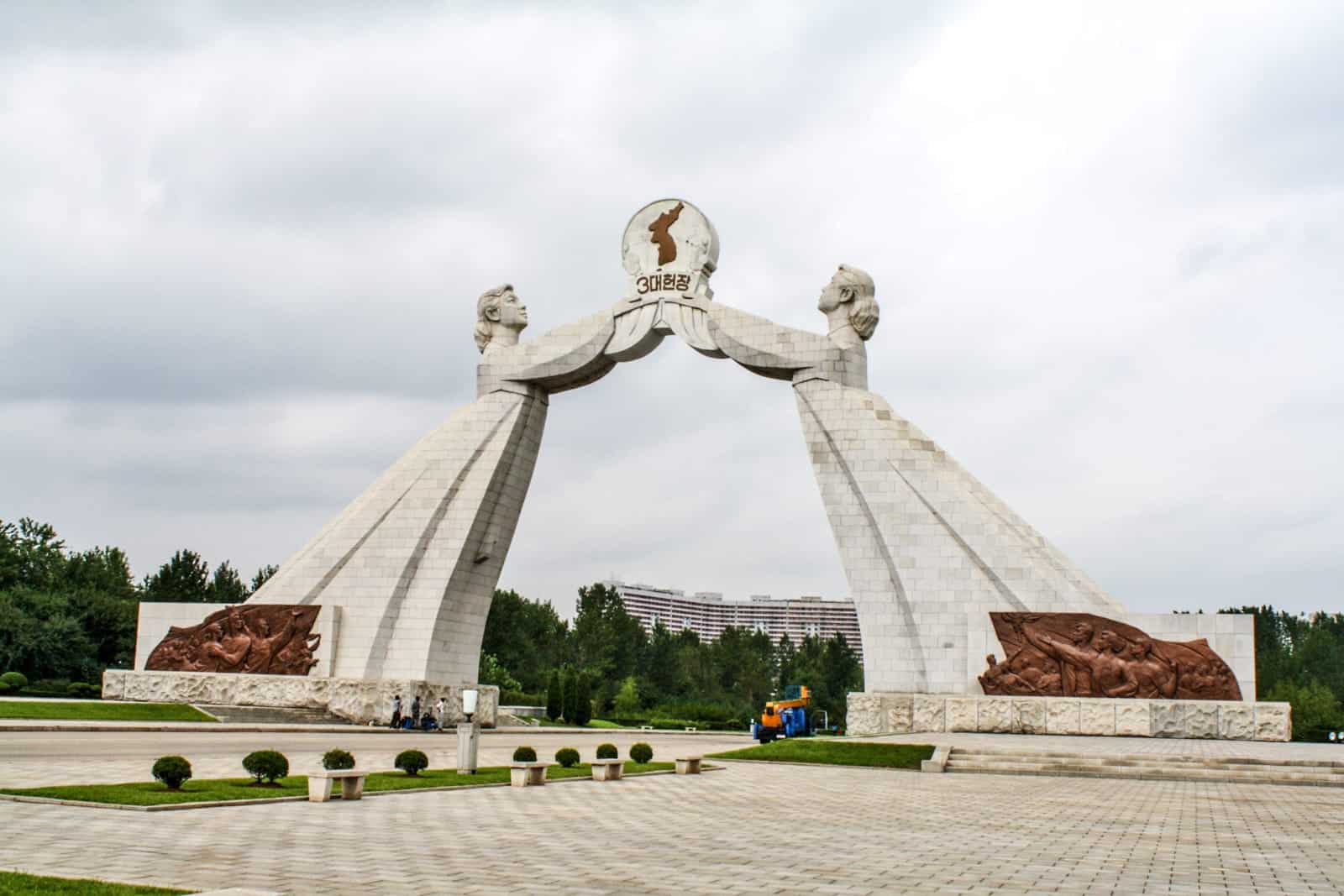
One of the many monuments in North Korea.
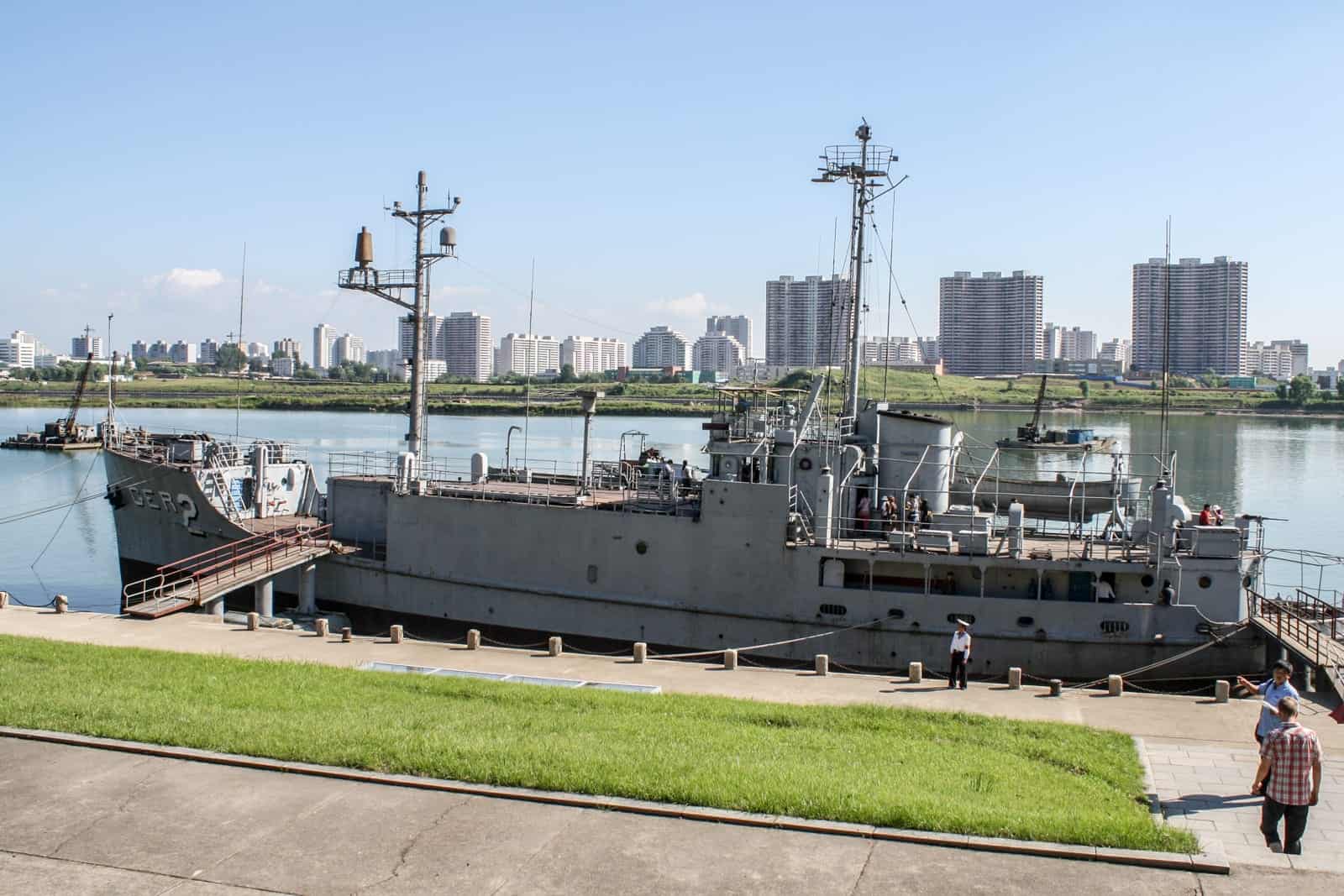
Captured ship US Pablo shown to tourists in Pyongyang.

Korean traditional dress and dancing.
A fairground, a bowling alley, nights of karaoke. That’s also part of the itinerary and which you realise are places built for the elite locals and not just for western entertainment. Keeping the people happy and occupied – distraction keeps the ideological machine in motion.
The main downside to what you see is the imposed order and structure as well as the exaggerated explanation, yet this is what you expect before you come on the trip. Some things you visit, such as the farm collective, appear a little too set up with the people ‘placed’ there, which didn’t feel right or real at all. But you only had to look into the distance to get a better picture, without taking an actual photograph.
Propaganda literature and videos on a North Korea tour give an extremely one-sided argument to the history of the Korean War. It is frustrating, but you have to grin and bear it. Everything is built in what they call ‘chollima time’ such as their version of the Paris Arc de Triomphe, of which North Korea’s is bigger and took less time to build. “This would normally take five years to build, but we built it in three!”
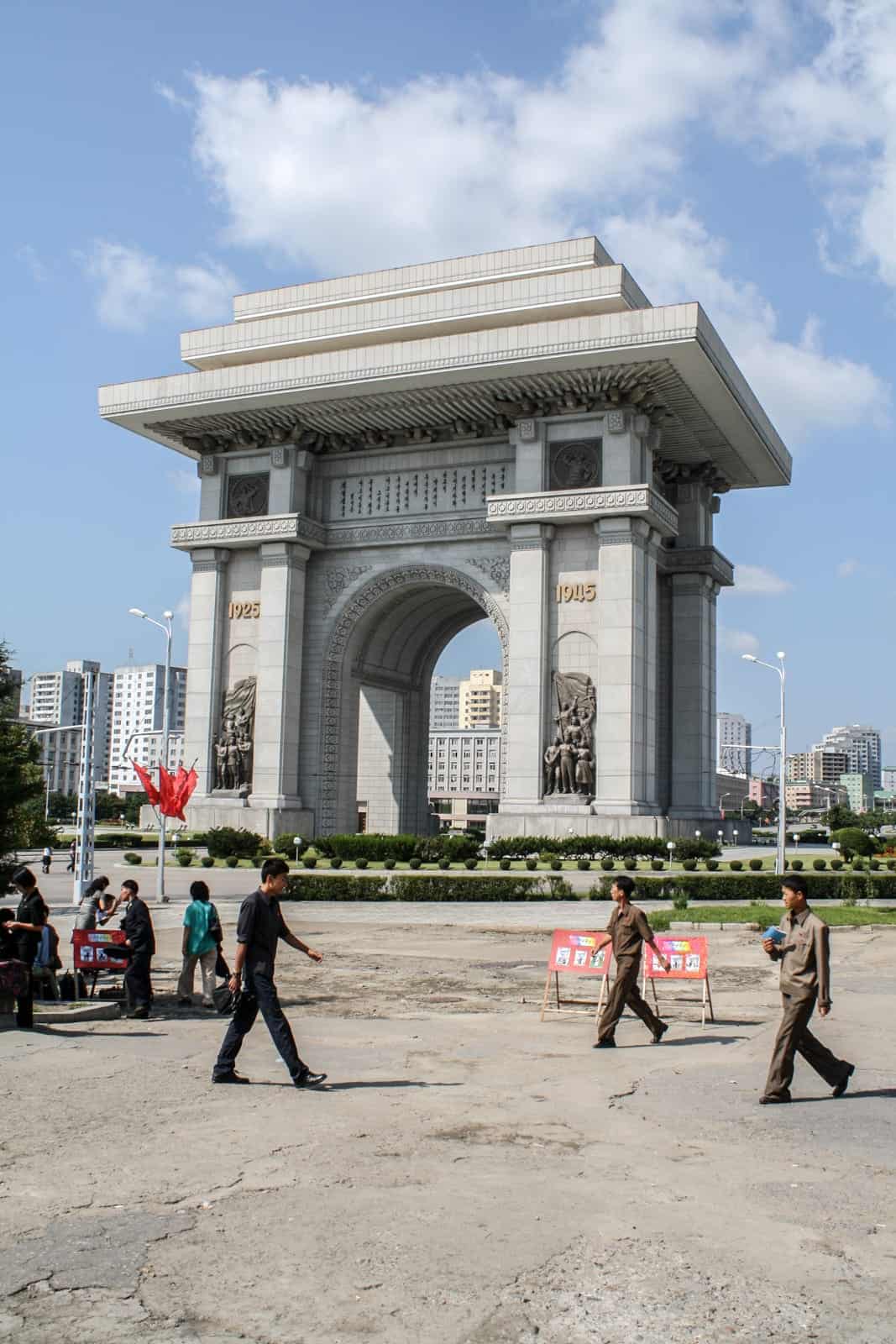
North Korea’s version of the Arc de Triomphe in Pyongyang.
Local guides gush about Kim Il Sung more than you would declare the love you feel for your parents – he is often referred to as ‘our father’ much like religious terminology. Films detailing milestones of the country such as the building of the West Sea Barrage dam are long, tedious and full of descriptions of the ‘revolutionary spirit’ behind its construction. Every place of high importance bears a plaque of when one or both of the Kims made a visit, alongside a giant painting of them.
This can become very tiring but does give solid insight into the way the minds of the people have been moulded and the lessons to be learnt from that.
While tourists can easily visit the DMZ in South Korea, North Korea’s tourism doesn’t leave this off the agenda. This is your chance to see it from the other side and, of course, hear the story from their perspective.
You get to sit in the same room, converse over the negotiation table (which you are not allowed to sit at when you visit from the South Korea side) and see the North Korean guards on duty at the borderline.
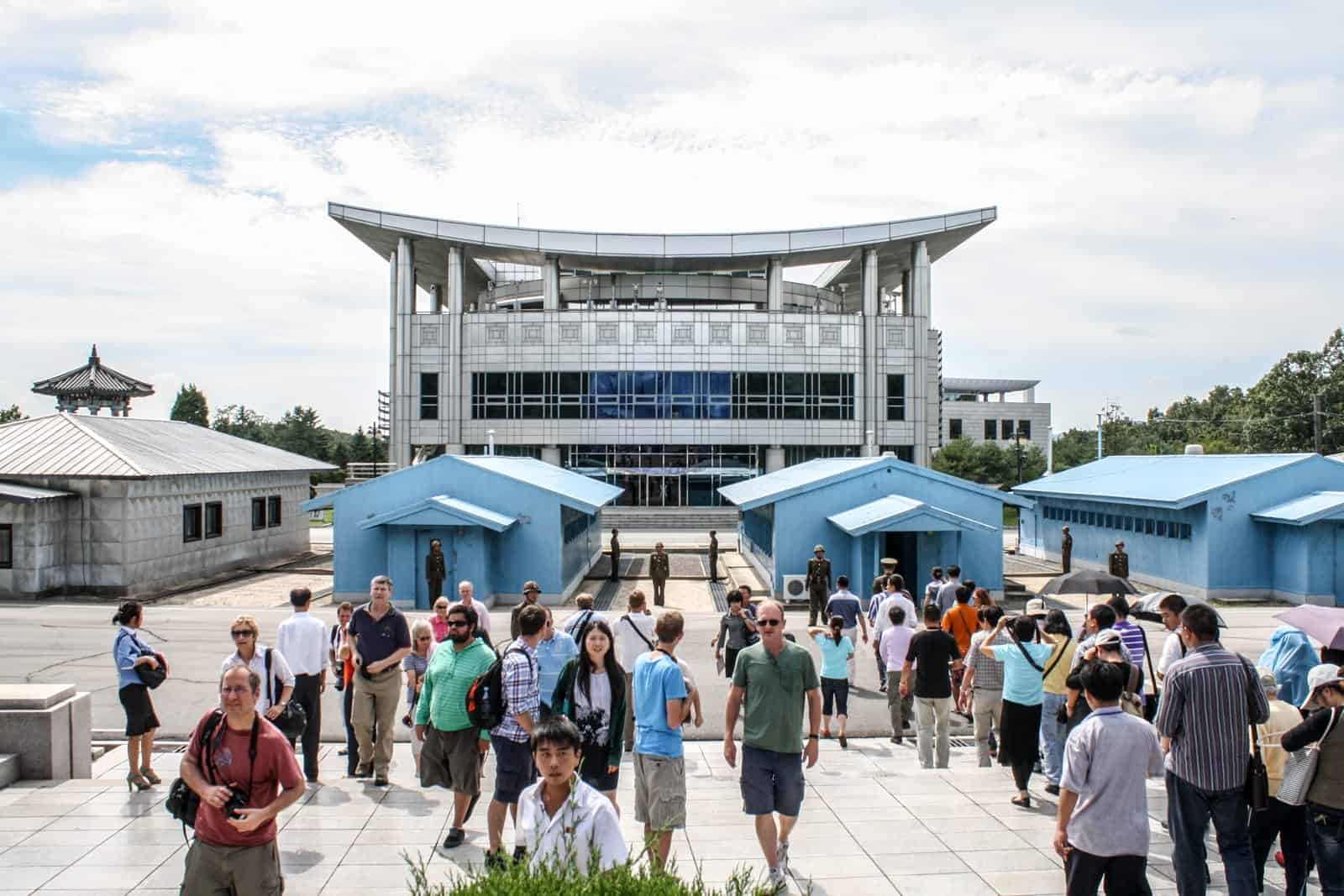
Visiting the DMZ on the North Korea side on a guided tour.
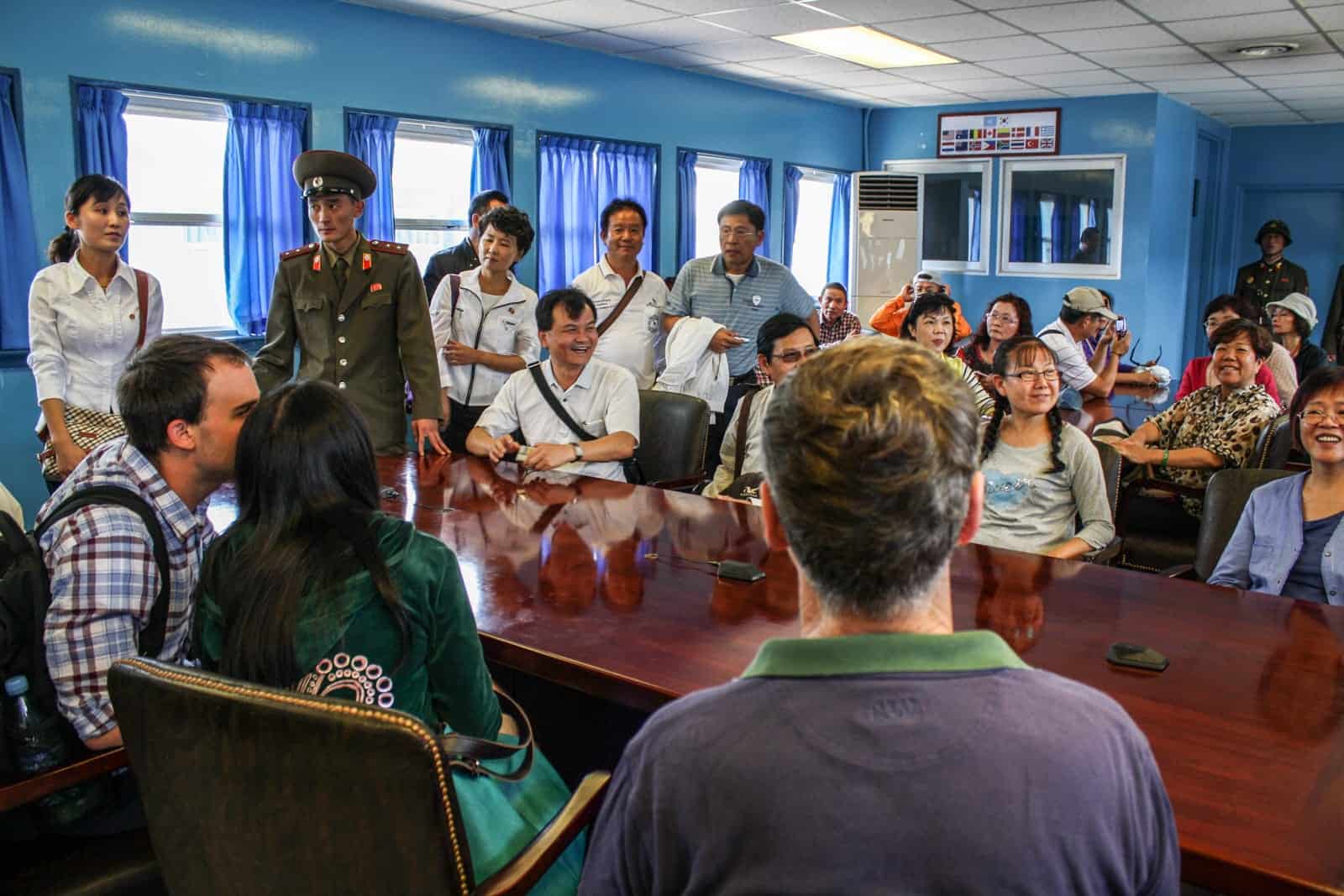
Around the table at the DMZ meeting room on the North Korea side.
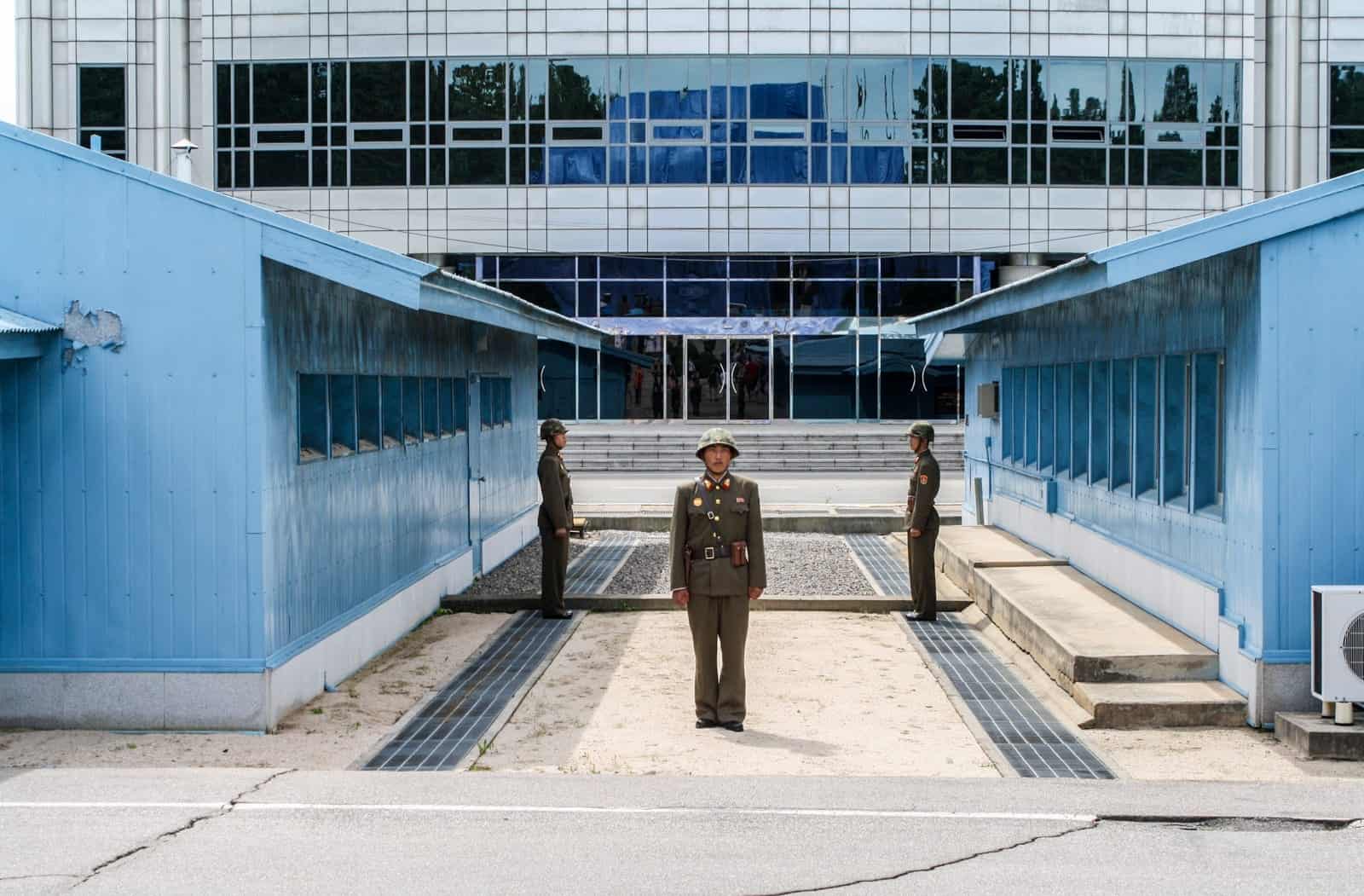
North Korean guards at the DMZ border line.
After that, you will get to look through Binoculars out into the DMZ ‘No Man’s Land’ area in-between the two country borders, where you are informed North Korean guards keep constant watch.
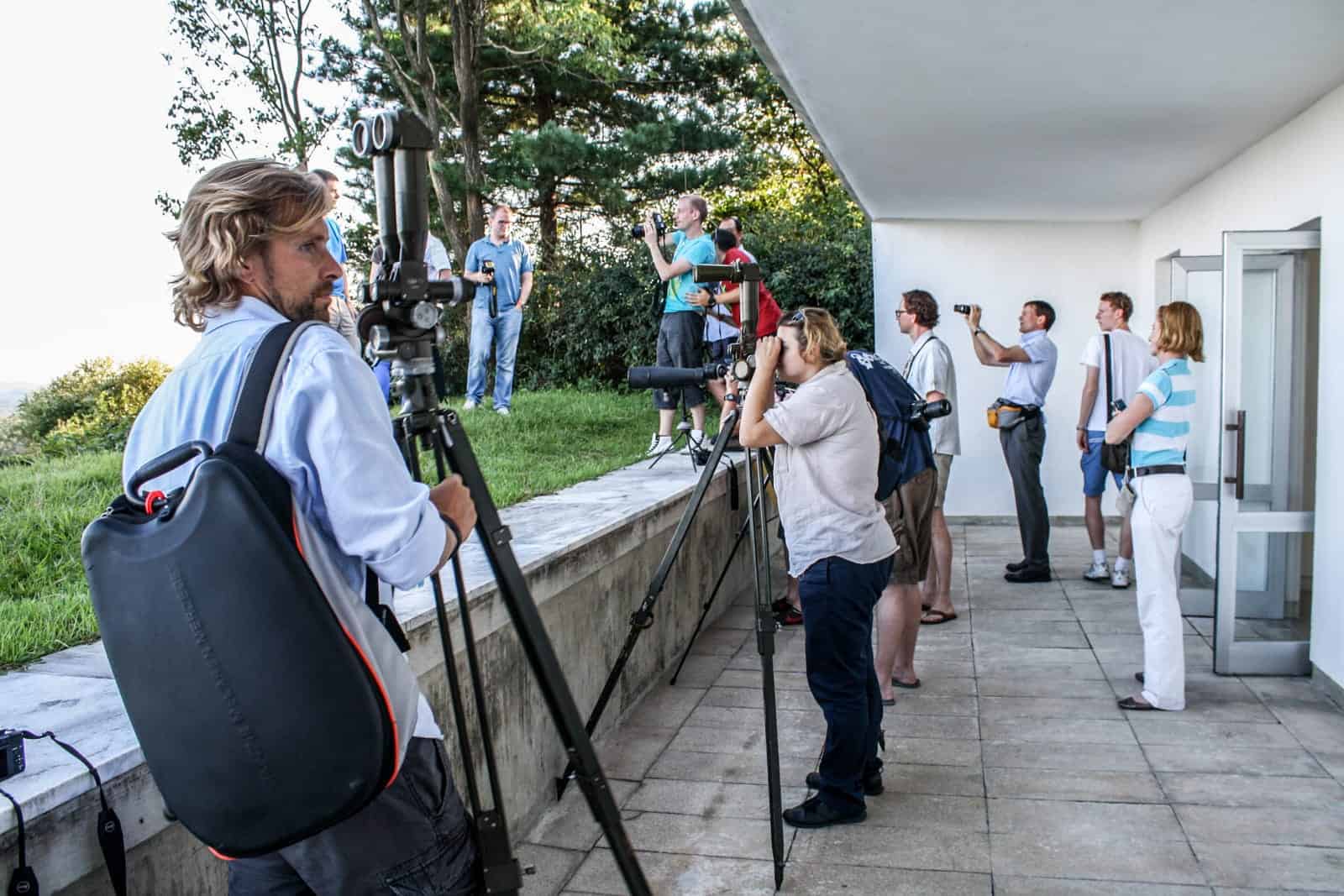
Looking out into the DMZ No Mans Land from North Korea.
READ MORE: Visiting the DMZ in North and South Korea – The Story of Both Sides
One of the deepest metro systems in the world, you get to go 110 metres underground to ride the Pyongyang metro. Adorned in intricate mosaic tiled propaganda images and bronze and with revolutionary themed names like ‘Comrade’, ‘Glory’ and ‘Reunification’, North Korea’s subway is quite the experience.
This is a stop included on your organised tour since North Korea is both proud (of those stations on show) yet secretive and guarded since you can ride only five of the 16 stops. Of course, you embark and disembark at the grandest station of them all – Prosperity.
Hundreds of people can be seen making their way to and from work and home, on a ticket that costs 5 Won (less than one US cent). I have seen images of all 16 stations in use and apparently, you can ride all of them – you just don’t on a tour as it would take too long. But in reality, we will never know if the entire metro system is in constant working order and for whom such a service is for.
I’m fascinated by metro systems all over the world and the Pyongyang subway is a highlight for the curious-minded. I would love to ride them all since it is said each station exists as a timeline and story flow of North Korea’s history.
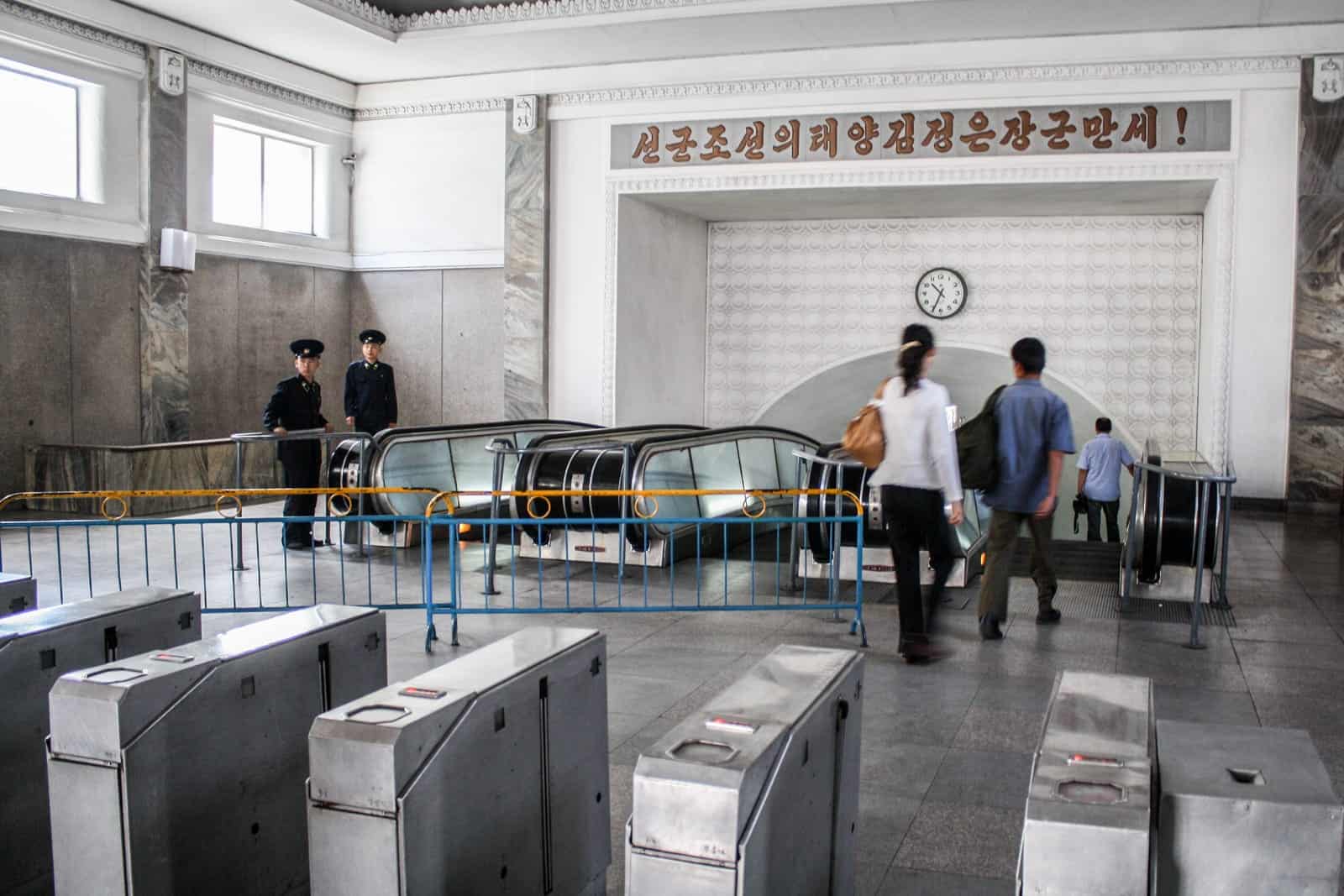
The part of the metro in Pyongyang open to tourists.
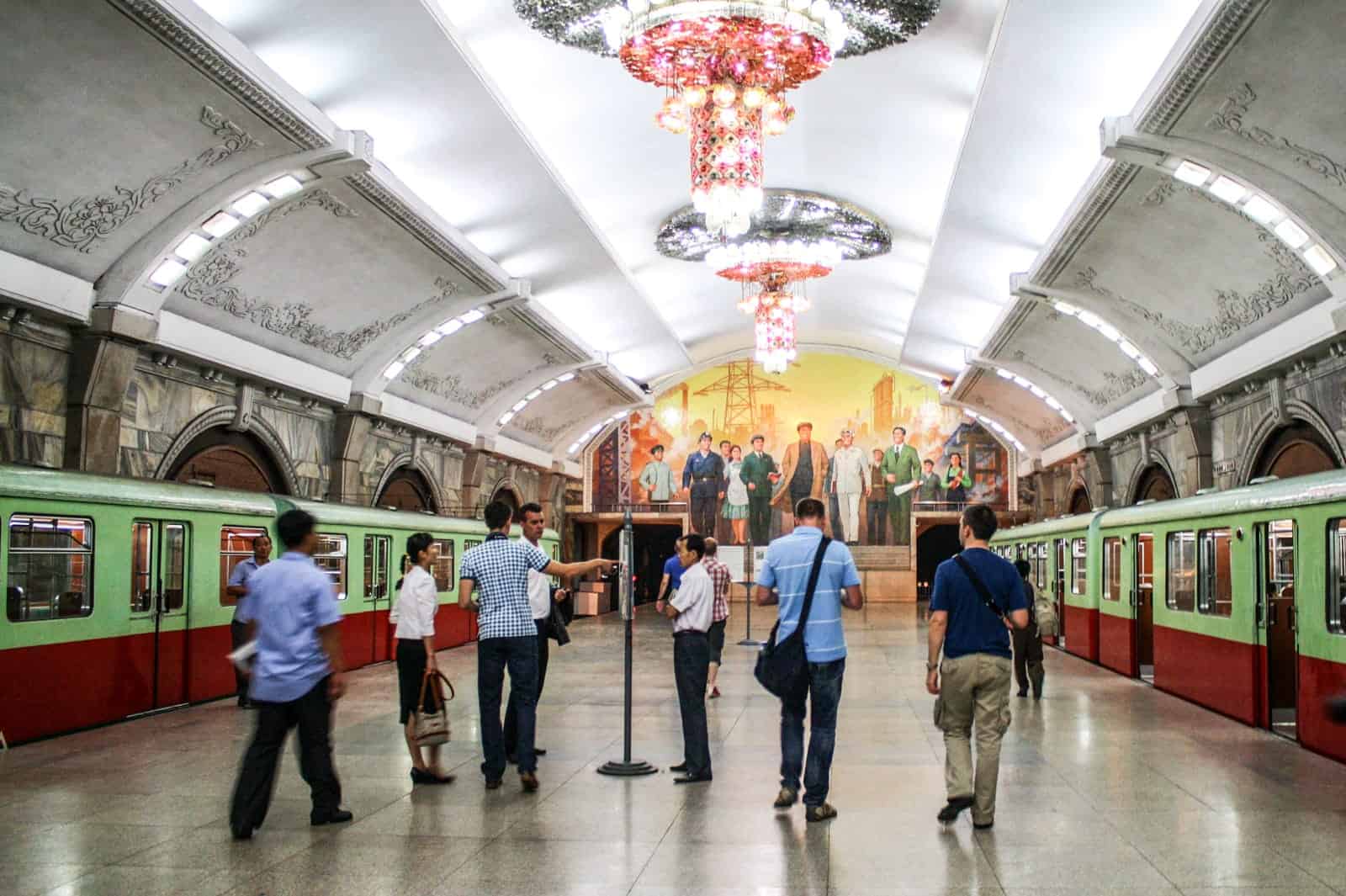
Inside the decorated Pyongyang metro station.
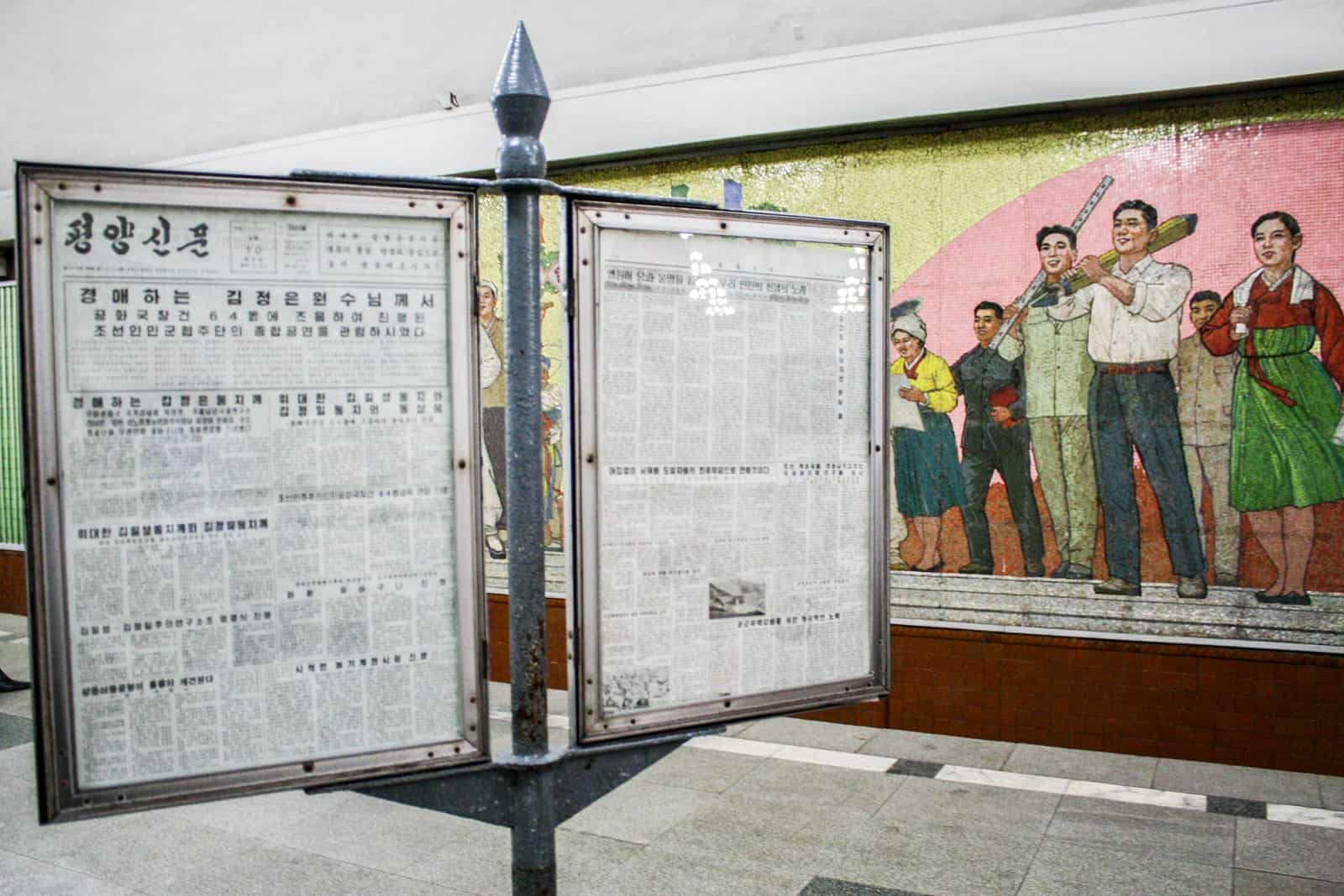
Newspaper on the platform of the Pyongyang metro subway platform.
When you sign up for your North Korea tour you will be asked if you would like to purchase a ticket to the famous Arirang Mass Games spectacle at the Rungrado May Day Stadium, also known as the Arirang Festival. It is deemed a highlight and THE thing to see in Pyongyang, There are various tickets for different seating plans, but for the majority of tourists this feat of athleticism and showmanship of gymnastics is a highlight.
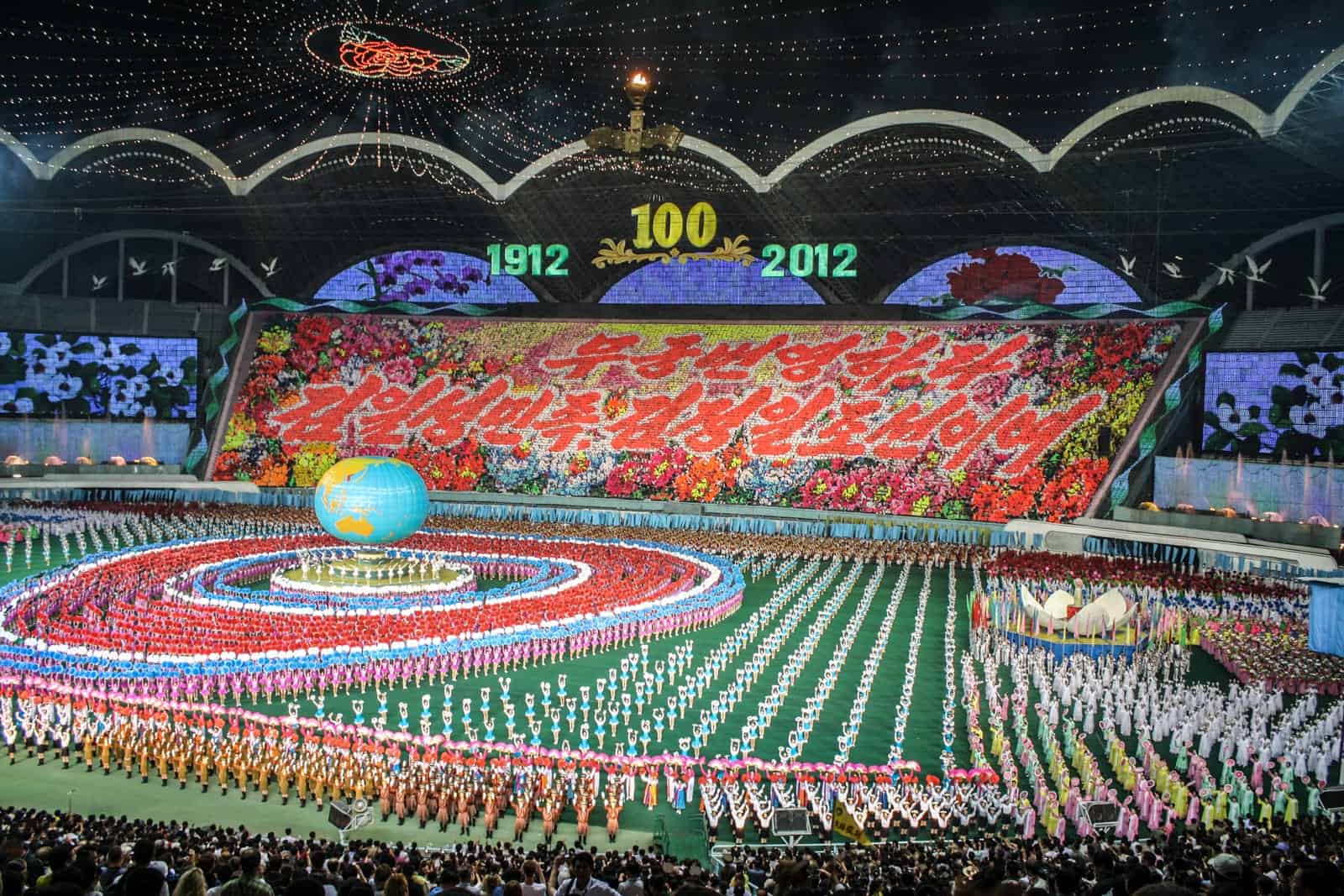
The Mass Games in North Korea.
While no show on earth will ever compare to that of the Mass Games in North Korea – a spectacle so incredible and full of athletic prowess that it blows your mind – it was also very uncomfortable to watch.
At the back of your mind weighs the reality of the extreme training of the participants, who live within a gruelling and dominant regime where the Mass Games is a part of the societal showcase. You can imagine the pain and endurance to be perfect, and exactly what would happen if someone messed up. No one puts a foot wrong during the performance.
As a communist state, North Korean flags and red symbols appear heavily throughout. The huge picture in the background? That’s school kids trained all year to make images from pieces of coloured cards for hours on end at this show.
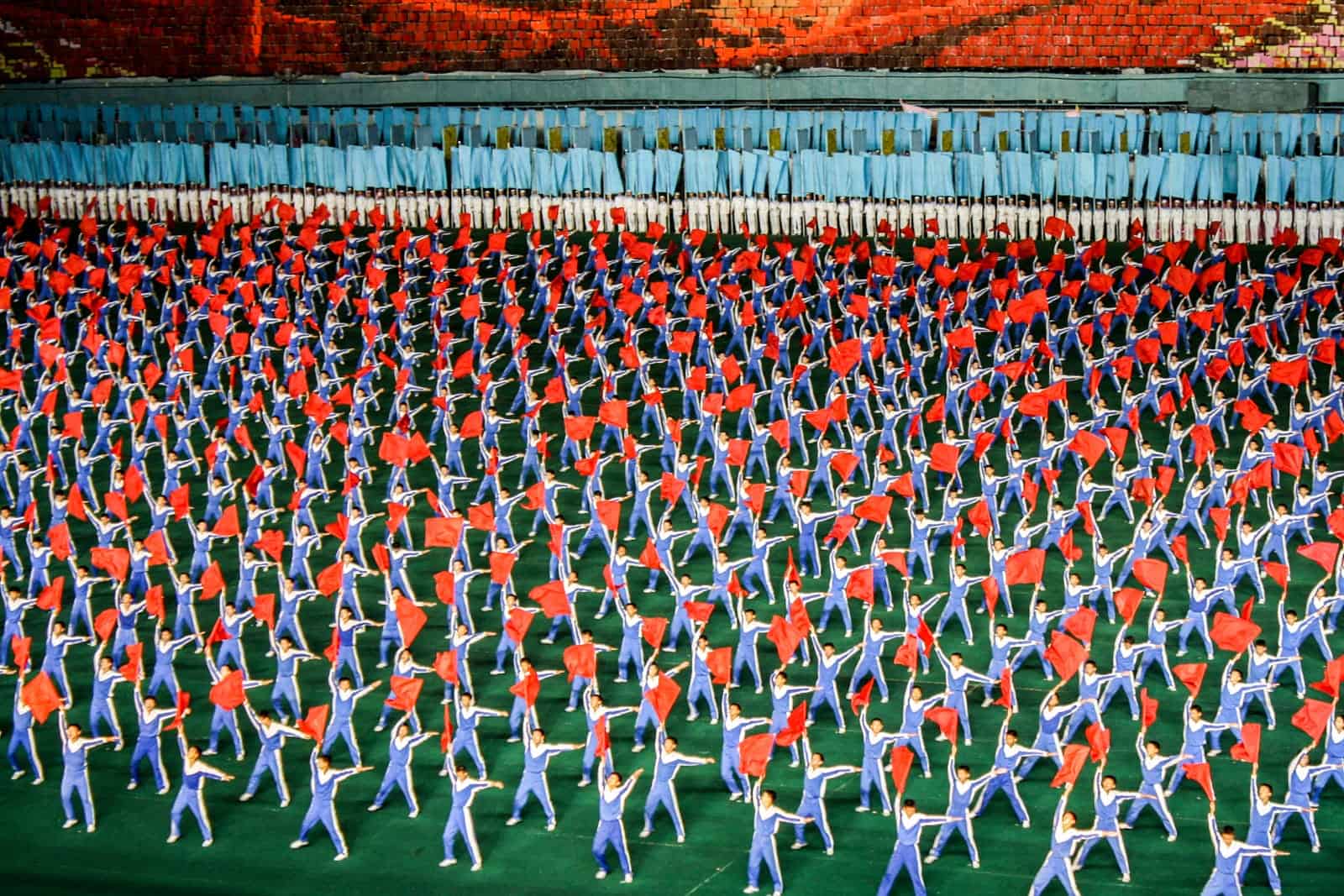
Watching the Arirang Mass Games in North Korea.
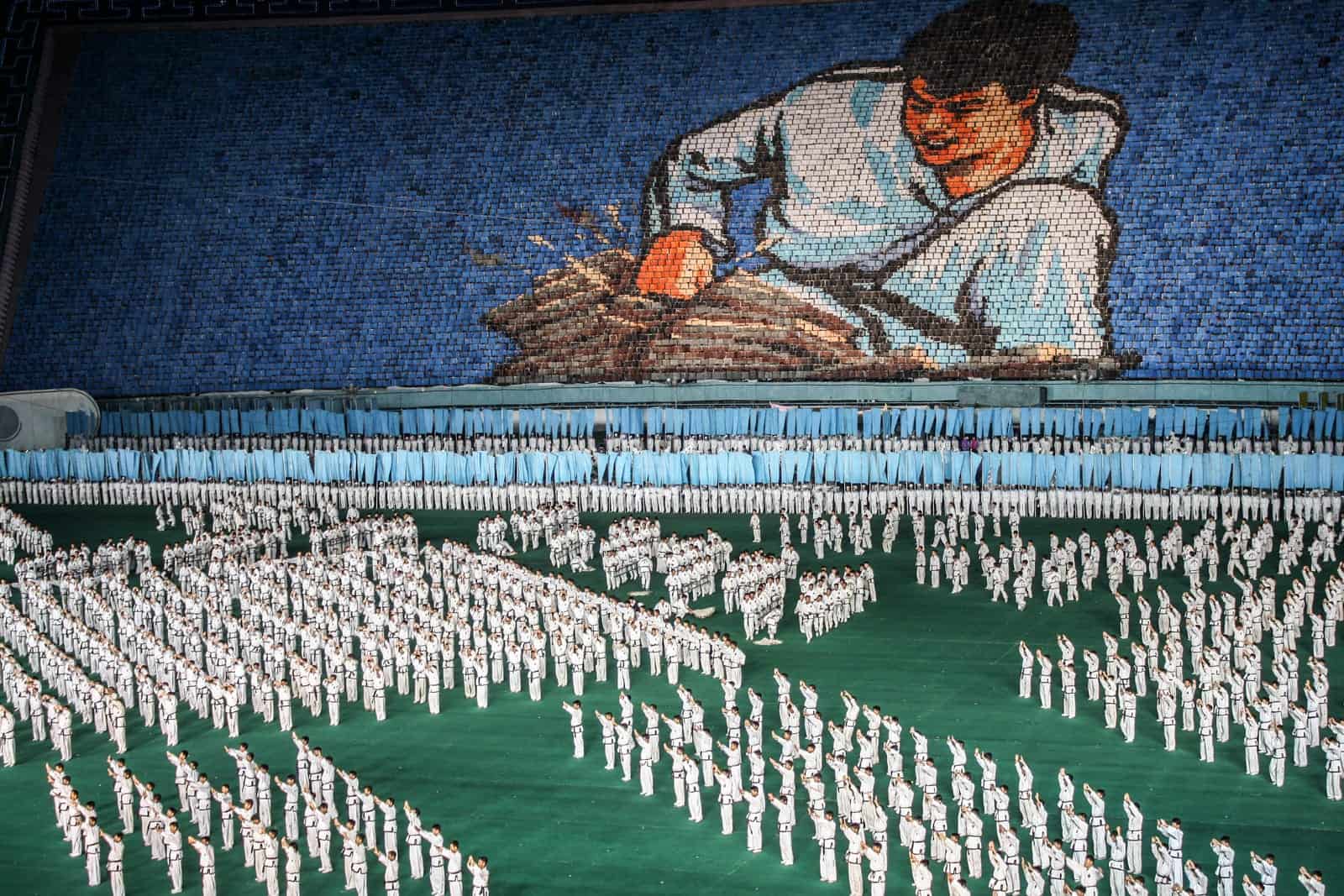
The hundreds of performers at the Arirang Mass Games.
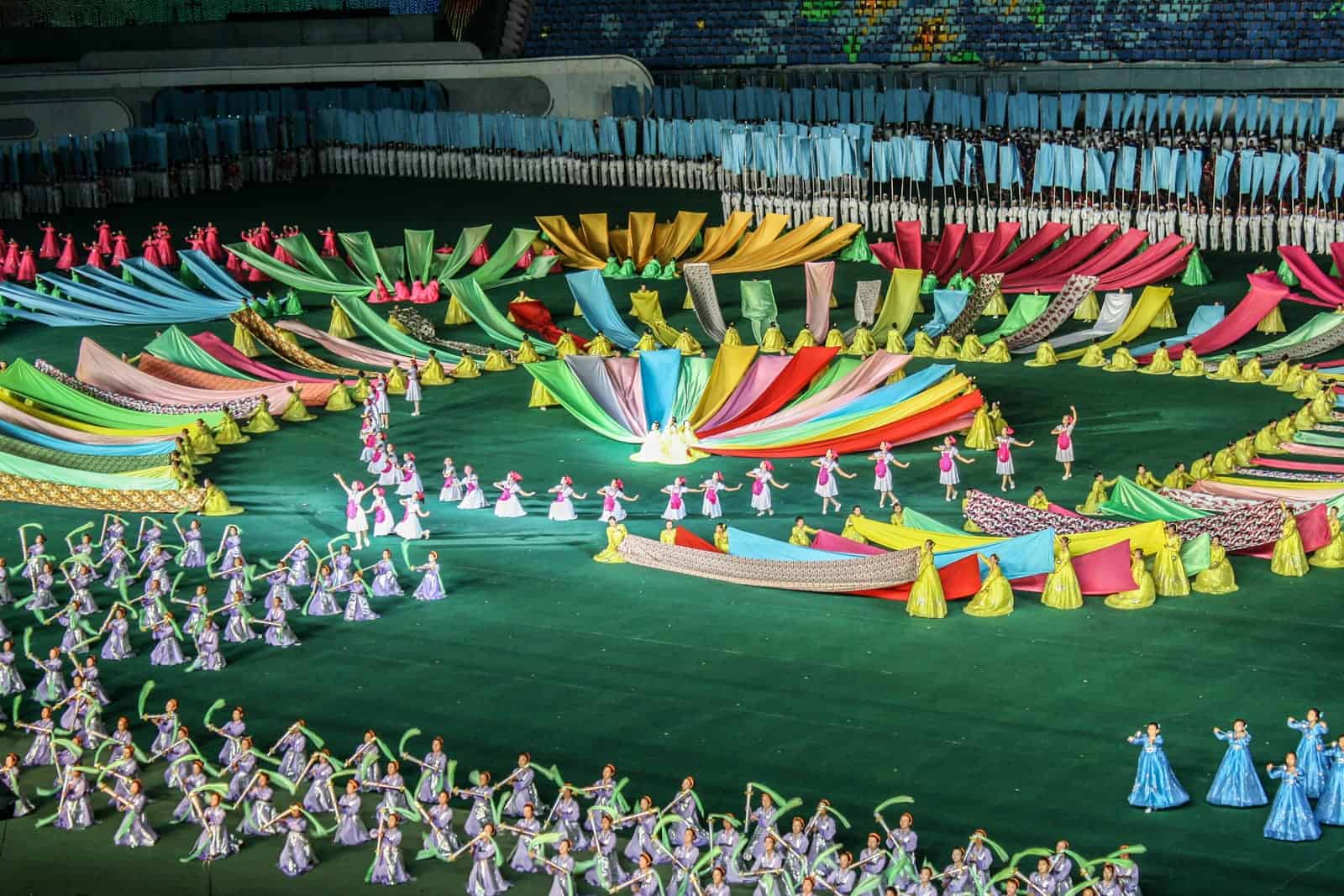
The Grand Mass Gymnastics and Artistic Performance Arirang.
While places of communist past have or are slowly moving on, becoming ‘socialist’ and slightly more progressive, North Korea lags behind by still keeping an ultimate grip on its people, yet struggling with the realisation that it needs to develop, trade and open up with the rest of the world in order to sustain itself in the modern age.
A country striking fear into the heart of its people is the only way it maintains control. This is something my generation, in particular, doesn’t understand as many of us have never had to live in a country in serious conflict with another. Whilst we would all love to see a united Korea, it wouldn’t be that easy.
Think of the differences between East and West Berliners when the wall came down. Two ideologies and different ways of life collided; two economic and education systems trying to integrate. I couldn’t imagine this would be an easy process of bringing immediate peace, but hopefully, I will see some movement towards this in my lifetime.
In tourism’s infancy, around 1,500 tourists visit North Korea annually. Today, that number is more in the regions of hundreds of thousands, but mainly from the Chinese market in comparison to the smaller numbers of western tourists going to the DPRK. Still, that’s thousands more than we ever thought possible.
From what we were told from the Koryo Tours representative with us, the more time goes by, the more tourists are allowed to see and do – a two-way trust process that slowly grows, where we can show the North Koreans a positive side to the Western world and its people and where we can try to understand them. A hope that it somehow paves the way for openness.
Maybe one day the people will harness the power for change or the ideological system will change.
Only then can we be friends without restriction.
It was important for me to gain a wider perspective on the culture and history of the Koreas and the conflict, and so a few months later I travelled to South Korea for three weeks. I was able to see some core sights and gain a better understanding of just how different life is on the other, more accessible side of this heavily tested border.
About Becki
Becki Enright is a British Travel Press Award-winning writer whose work focuses on changing perceptions about misunderstood aspects of destinations. Her writing combines storytelling with insight into the social, historical, political and economic factors that shape the country or place in relation to tourism. Becki has appeared live on Sky News and CNN and has contributed to high profile media including National Geographic, Time.com, Guardian online, New York Times, Grazia and Buzzfeed.
Chris Padley says
19 August 2023 at 8:47 am
In his TV programme made of his visit to N.K. Michael Palin visited a park on National Day too. A comparison between this, as seen in the TV programme, and your description of your own experience is interesting.
Paul Cosgrave says
13 June 2023 at 9:56 pm
Becki: Great Article. You are a brave person to have gone to North Korea. As an American I will not be going anytime soon. I agree with your comments that travel is so important to help us understand the people and their motivations who have grown up in different cultures than ourselves. I realized this in a recent trip through Vietnam and Cambodia where the culture is clearly not as different from our western background as what you experienced in North Korea, but nevertheless very different from what I had expected. The one thing I have learned from my travel is that people around the world are much more similar than they are different.
6 January 2023 at 7:27 am
I traveled to North Korea in 2007. Americans were not allowed to visit for a long time but when they allowed a few American tour groups in that year I jumped at the chance
Everything in this rings true to me. I am still conflicted as to whether giving money to the regime was a good thing
However there were several moments when I had a brief but human chat or laugh with one of our guides. Talking about family and universal stuff. I hope that made a tiny bit of difference in understanding
6 January 2023 at 1:46 pm
It’s a real conflict mentally and morally. Although North Korea is up there as one of the worst, we sadly give our money to many regimes when travelling. But I firmly believe that those chats on universal stuff are a way of paving the way to openness, truth and understanding.
Aaron Galan says
17 May 2020 at 8:30 am
I would love to go to North Korea just to have another perspective of what it is shown on TV. Maybe give a chance to this country, because it’s easy to say that a country is bad for its bad reputation on TV. And I know this because sometimes other countries think that Mexico is just as bad as a Warzone. Apart from that I would like to see if it’s true that everything is as Asymmetrical as everyone says. I would also like to visit the DMZ from both perspectives to compare each sides of the stories
- Article Archives
- Work with me
- Privacy Policy
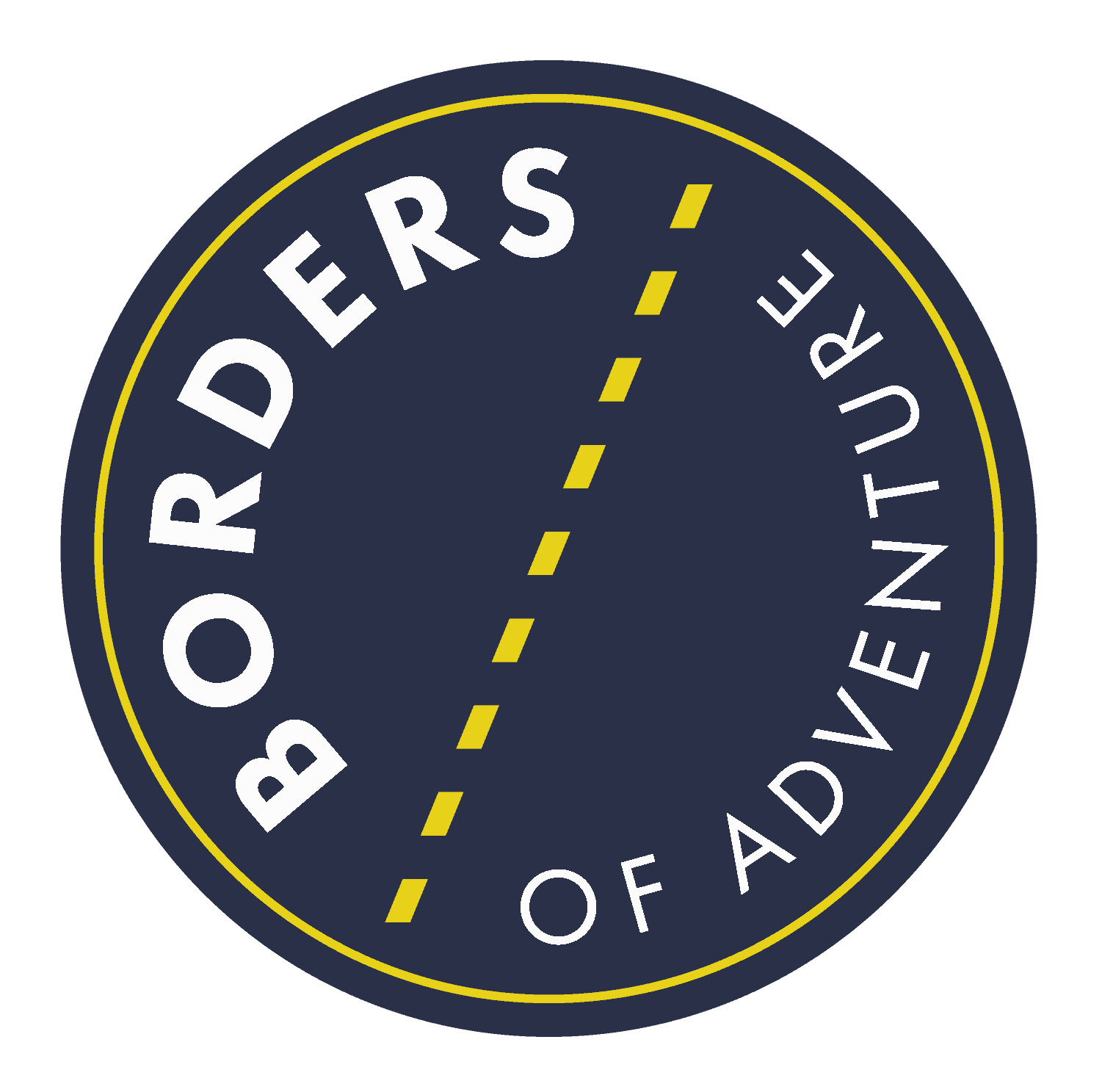
Young Pioneer Tours

Is it safe to travel to North Korea?
Is it safe to travel to North Korea? Despite what you may hear, it is safe to travel to North Korea. The DPRK (North Korea) is probably one of the safest places on Earth to visit provided you follow the laws and regulations as covered in our booking documents, at our pre-tour briefings, and throughout your stay in North Korea.
Tourism is very welcomed in North Korea. North Koreans are friendly and accommodating if you let them into your world and avoid insulting their beliefs or ideology. Even during tense political moments, tourism within the DPRK is never affected.
With that said, it is important to know that North Korea has what amounts to extremely strict lèse-majesté laws, covered in further detail by our terms of travel agreement, and in the event of you contravening those laws the consequences can be severe.
We arrange tours for all those who are not travelling on USA or South Korean passports. We strongly encourage anyone considering travel to the DPRK to familiarize yourself with your own country’s statements and suggestions regarding travel to the DPRK; as well as to adequately prepare before your trip by notifying the relevant agencies, embassies, or consulates of your travel plans where recommended.
Furthermore, we continue to get up-to-date travel information from both the UK and Swedish embassies in Pyongyang. While in the country, our YPT guides carry local SIM cards, which can be used to make international phone calls and contact foreign embassy staff in Pyongyang.
To learn more about tourism in North Korea you may read our FAQ page or contact us directly on [email protected]
For first person experiences on our tours to North Korea or our other international destinations you may read their feedback on our 5 star rated TripAdvisor page .

About Post Author
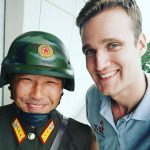
Rowan Beard
Rowan’s a YPT co-founder with over 100 visits to North Korea (DPRK) and visited 100+ countries. You’ll most likely catch him leading group tours in Africa, East Asia, and the Middle East.
See author's posts
- Suspendisse tincidunt nunc nec
Tripadvisor
Latest news.
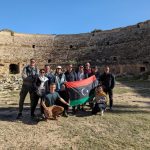
Libya tourist e-visa scheme now available

Dave Kitson named Nauru Football Manager
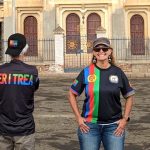
THE YOUNG PIONEER PODCAST S2, E5: Horn of Africa Part Three – Eritrea

An American in South Korea Heads North (Part 1)
- Terms & Conditions
- Payment Policy
- North Korea Tours – 2017 Tours
- Tour Extensions
- Independent Tours
- North Korea FAQ
- Our Terms and Conditions
- Our Payment Policy Terms
©YoungPioneerTours.com 2024. All rights reserved.
- Beginner’s Guide
- Credit Cards
- CardMatch Increased Targeted Offers!
- Travel Rewards Cards
- Small Business Cards
- Hotel Cards
- Airline Cards
- Cash Back Cards
- Amazon Deals
- Amex Offers
- Bank Account Bonuses
- Gift Card & Spending Deals
- MtM Podcast (Travel/Points)
- MtM Vegas Podcast
- MtM Diamond Community
- The MtM Team

Get Started
Learn more about Credit Cards, Travel Programs, Deals, and more.
All You Need to Know About Travel to North Korea
Enjoy MtM's content? Shop Amazon and we earn a commission!
Find all of the latest deals.
Can I Travel to North Korea? Yes, You Actually Can & Here’s How
Travel to North Korea is not something a lot of people have done. So there’s really not much information about travel to North Korea online. But, people actually do it. (There’s not many).
So why do people travel to North Korea? HOW do you travel to North Korea? And what should you expect once you’re there…
RELATED: I Have Been To North Korea Almost 30 Times & Counting, Why I Keep Going Back
Table of Contents
Who Travels to North Korea?
There are generally three different types of people that travel to North Korea.
- Those glory seekers looking to tell a tale about the time they went to the ‘mysterious Hermit Kingdom’.
- Those interested in communist and socialist countries.
- Those who want to see the country for themselves instead of just through the eyes of the media.
Within these categories, you have all kinds of people. Different ages, social backgrounds, and different nationalities.
Aside from Chinese people, the most common nationality to see in North Korea are Brits, Germans, Australians, Dutch etc… And Americans – before the travel ban.
Yes, that’s right. Trump’s travel ban forbids US citizens from traveling to North Korea (sorry guys). But Biden has suggested that he may be lifting some of these bans. So let’s see!
For now, US citizens cannot go.
RELATED: The Curious Case Of North Korean Currency & Why It Is So Rare
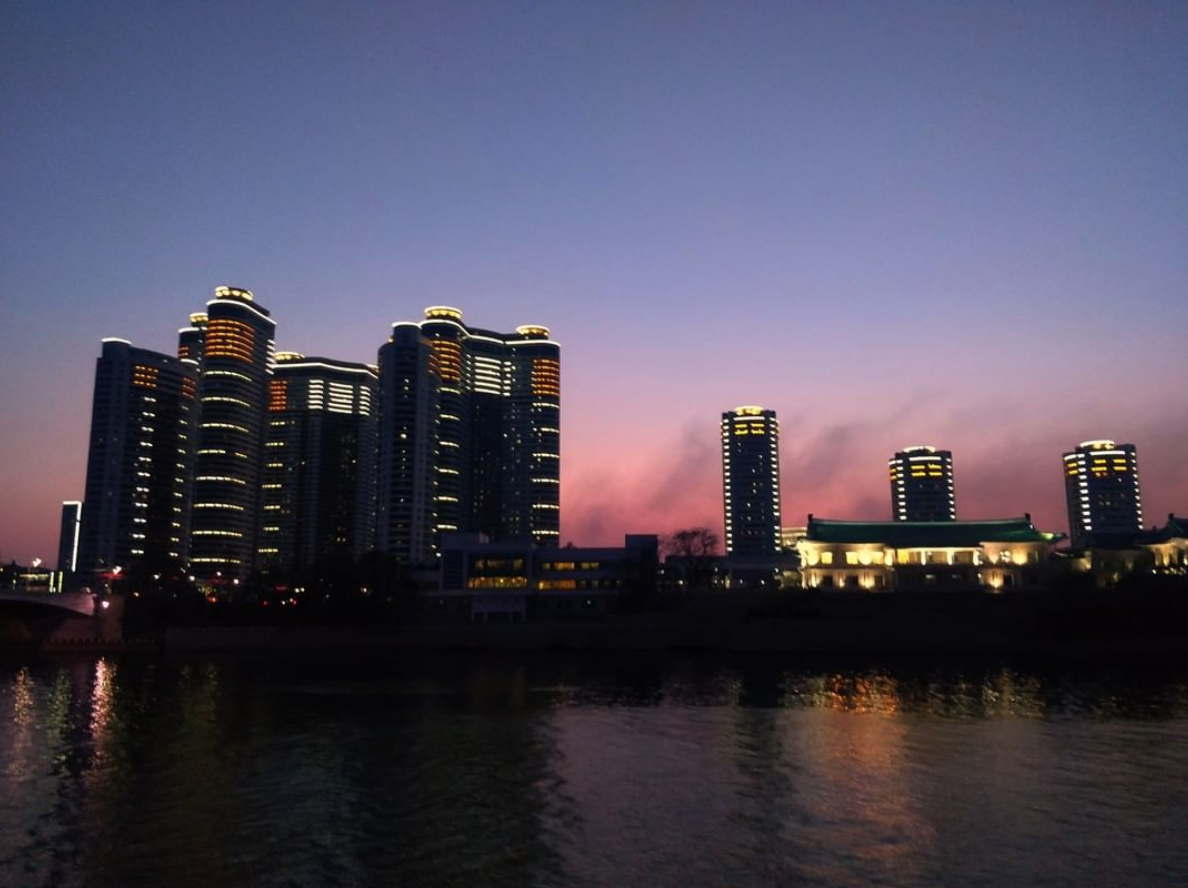
HOW to Travel to the DPRK?
While most people don’t even know you can travel to North Korea, let’s explore the process of how you get there in the first place.
Firstly, you need to go through a tour company. There’s no other way to get into North Korea. No tour company, no visa, no entry. You will then book a tour through the tour company, depending on how many nights you want to stay, where you want to go etc. Tours normally include everything, from travel into the country, to the accommodation and full board. Although you can of course buy anything extra once you’re in North Korea.
The path to get there is through China. You can either take a plane or a train into North Korea, depending on your time and budget. There are also sometimes flights available from Russia and South-East Asian countries.
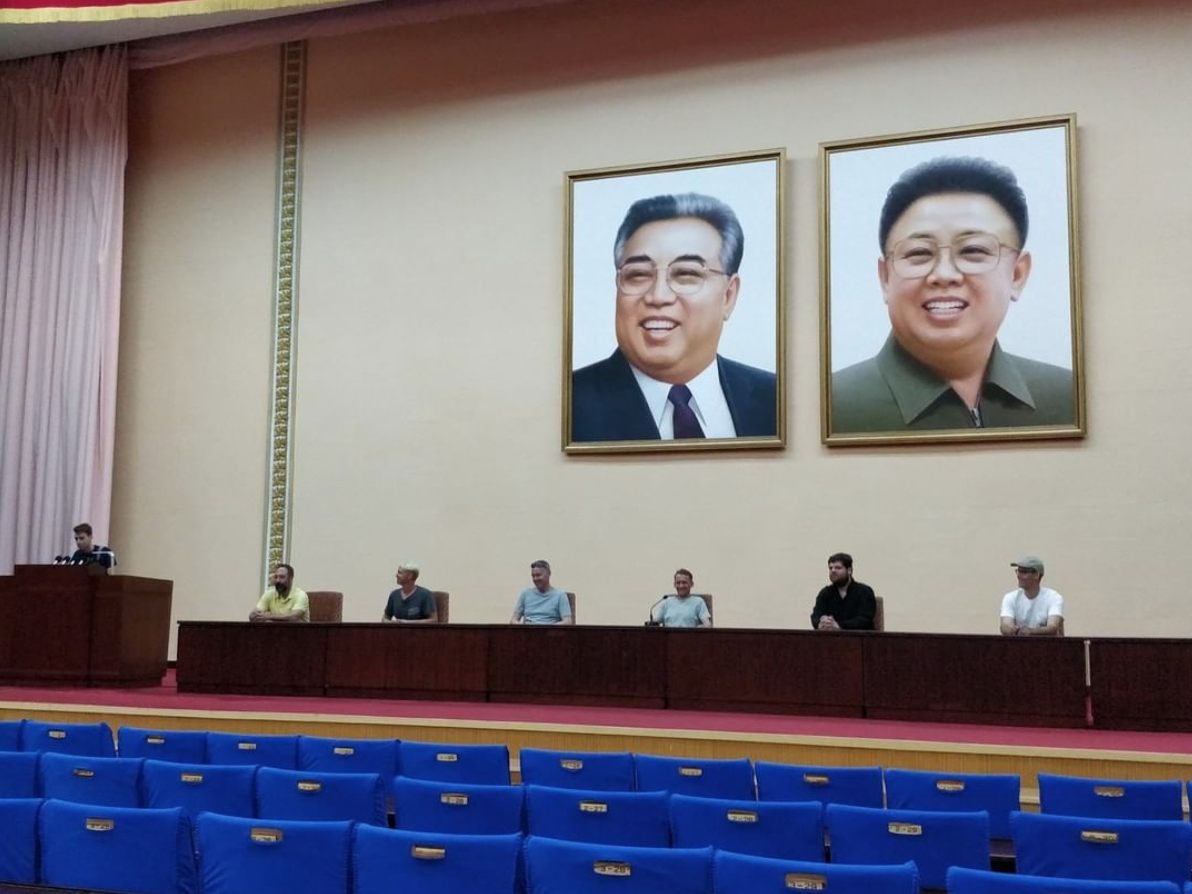
In North Korea
Rules & politics.
Once you’re in North Korea, you will be met by your North Korean guides. From the moment you arrive, you can’t walk around by yourself. You should always be accompanied by these guides. Contrary to popular opinion, these guides are not the glamorous ‘government minders’ that the media labels them to be. They are trained tour guides who have studied and worked hard to get where they are.
There are a lot more rules for your travel to North Korea, including rules on photography and what you should and shouldn’t do. You’ll get a full briefing from your tour company before you go into North Korea.
A lot of people are concerned with the safety of the trip. Basically, if you stick to the rules, you will be fine.
Can I Bring my Mobile Phone?
Yes, no problem! (But see below)
Can I Talk to Local North Koreans?
Yes, and no. You can try, but they probably won’t want to talk to you and if you don’t know Korean that’s going to be difficult anyway.
What if I Do Something Bad?
Everyone makes mistakes. If you accidentally break the rules once or twice (depending on what it is!) then that’s fine. A guide might pull you aside and mention it to you. If you do it again and again… Mistakes can only be mistakes for so long, and at some point it must be deliberate. Depending on what you do, you could get yourself, the group, or the guides into trouble. If you’re ever unsure, ask your guides!
Check Your Phone and Electronic Devices
You can bring your phone and laptop, but make sure to check your device before you go in. It is not permitted to have any religious material, Korean material, or anything to do with North Korea on you when you go in. Make sure to delete any Korean dramas you might have downloaded!
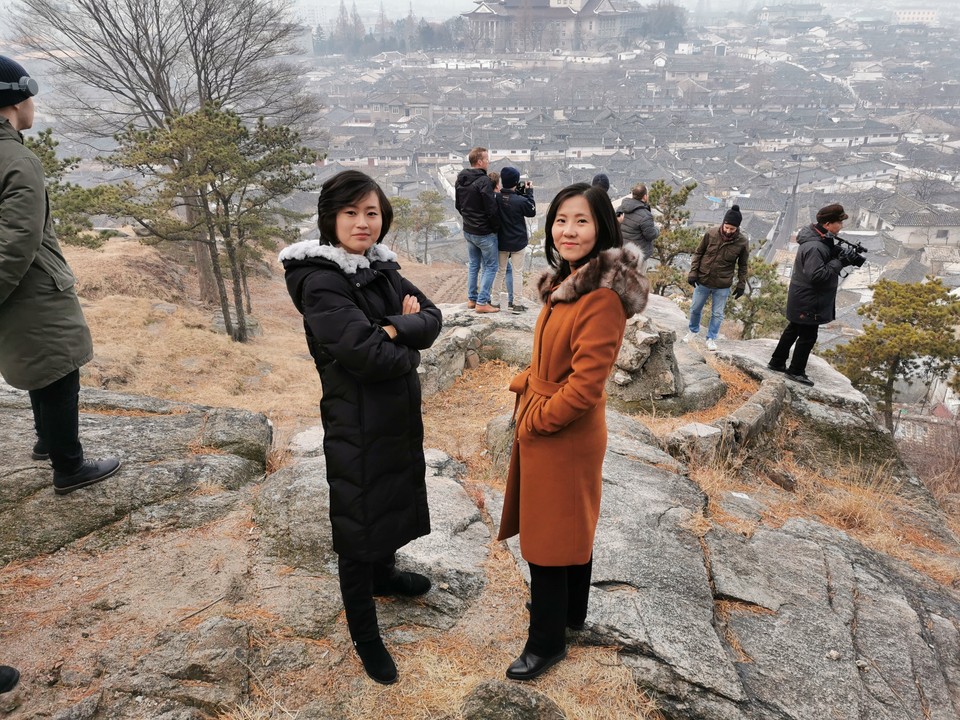
Where Can I Go?
Foreigners can currently visit all but one province in North Korea. Aside from city life in Pyongyang, you can head out to the countryside to enjoy skiing, hiking, and even going to the beach and swimming in the sea.
In Pyongyang, your visit will mainly comprise of visits to important historical sites and revolutionary sites, as well as famous monuments such as the Juche Tower and the Mansudae Grand Monuments (the big bronze statues).
Other than that, you might even get to go to some fun places like the bowling alley, you could go ice skating, to the spa, coffee shop, or local beer bar.
Seeing is Believing
Surprisingly, it’s not actually all fake! In fact, there is pretty much northing fake about it. It functions as a country and there are people living their lives – not acting – inside. But I suppose you might need to go there before you believe me on that one.
If you’re looking for all the action you get on the media, for example, rocket launches and military parades, you might be disappointed. Military parades happy very rarely, only on special occasions, and even then it is difficult to see as a foreigner.
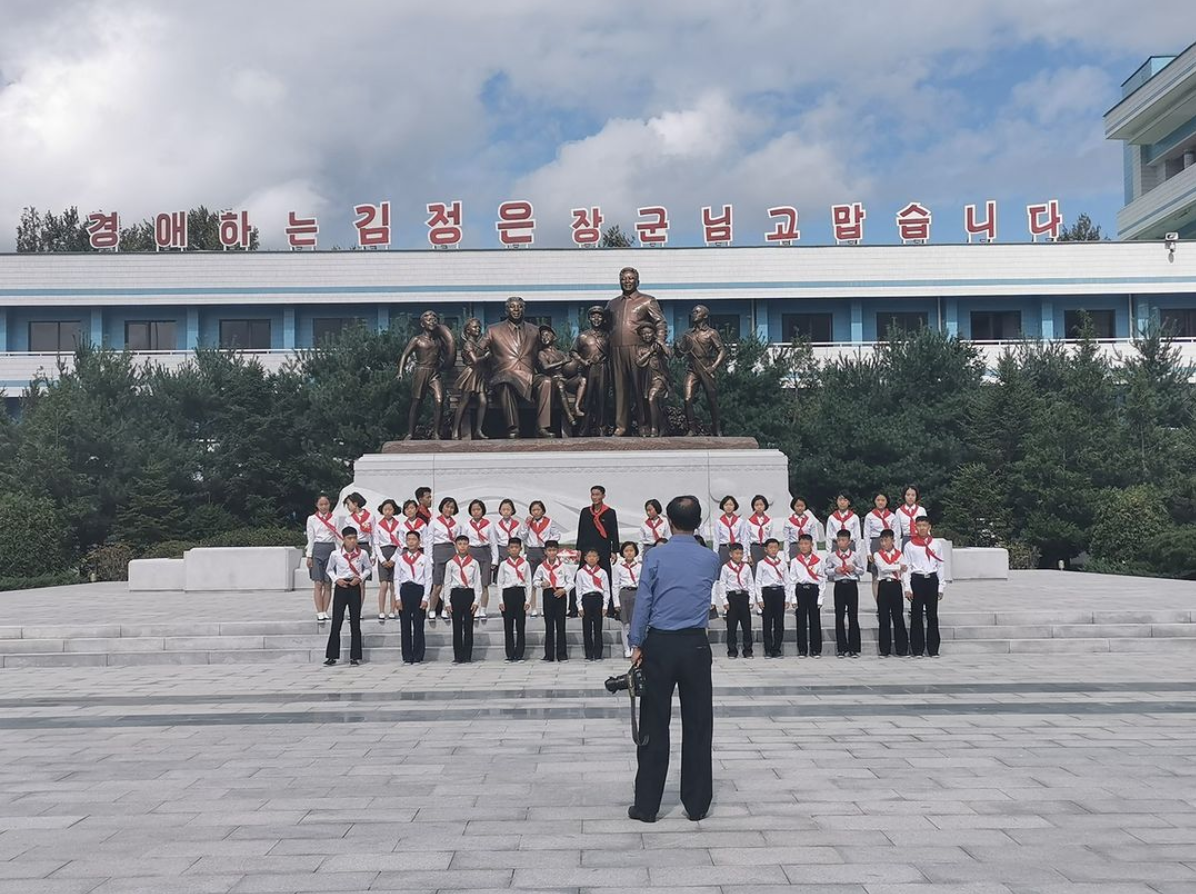
Accommodation
What’s a North Korean hotel like?
A lot will tell you that all the tourists are put into the same hotel that sits on an island in the middle of the river so you can’t walk off easily. As glitzy as this Alcatraz-like theory is, we have to bust it, unfortunately. There’s over 10 hotels in Pyongyang alone where foreigners can stay – one even with a great view of the party headquarters.
The Alcatraz hotel is called Yanggakdo, and it’s probably one of the most popular hotels to stay in. It’s big, just got refurbished, and has a lot of facilities. It’s also in a convenient location and gives killer views of Pyongyang city in the morning.
The hotels in North Korea would have all been really nice and really fancy… 30 years ago. But they haven’t really had many makeovers since they were first built and therefore sit in a weird out-dated time capsule. Things break and fall off, sometimes there’s no hot water and blackouts do happen sometimes too. But this is much more frequent in the countryside.
Go with an open mind and embrace the “traditional meets kitsch” interiors with a pinch of salt.
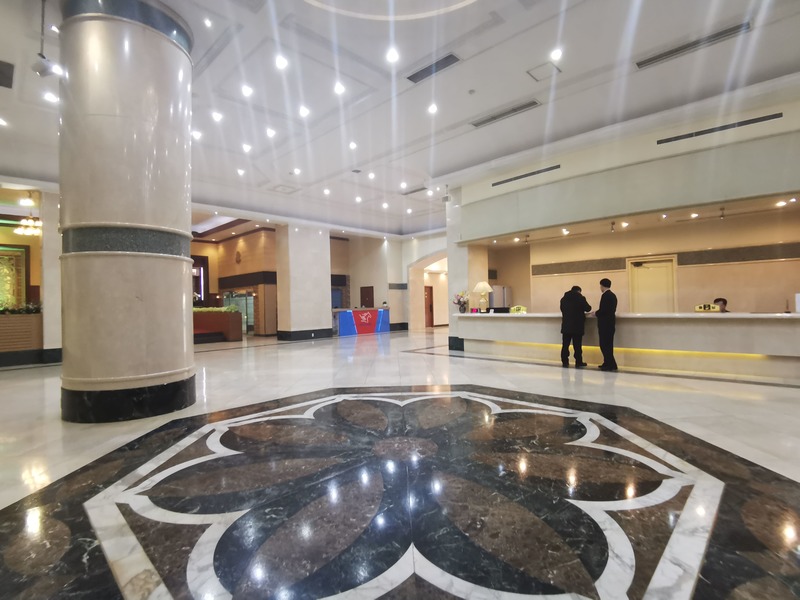
Everyone’s favorite topic!
If you love Korean food, you’ll have no problem. If you’re up for trying different foods, you’ll also have no problem. But, if you’re a strict ‘will-only-eat-pizza-and-chips’ kind of person, you might want to re-think your trip to North Korea, or pack a lot of food.
The food in North Korea is plentiful. You eat in traditional Chinese/Korean style, having food presented in the middle of the table and everyone just grabbing a bit of everything. Food ranges from Bibimbap (fried rice) to noodles, sushi, and everything in between! (Apart from pizza and chips).
For those with dietary requirements, they can also cater for you. Just let them know in advance!
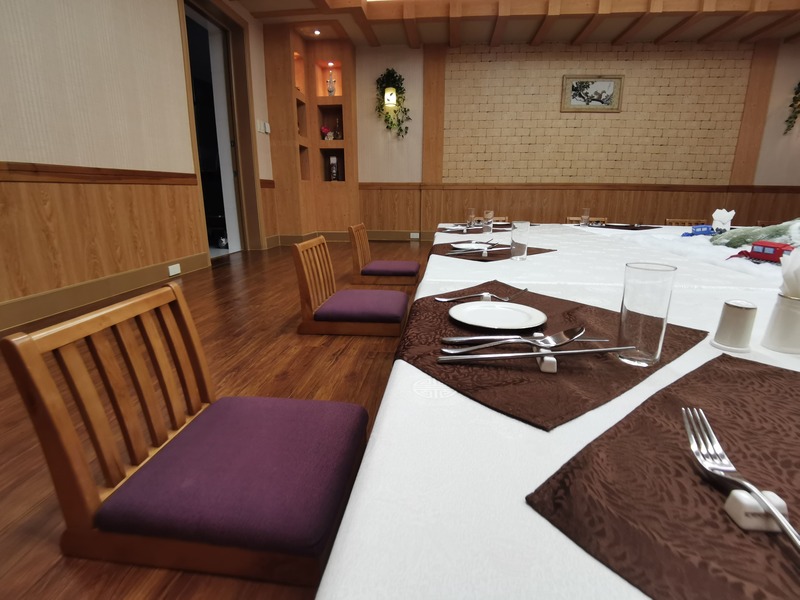
Can I Travel To North Korea Final Thoughts
A tour to North Korea is not for the faint-hearted. It’s not a beach holiday in Barbados or a shopping trip in New York. It’s action-packed and you’ll be on the move from 7am to 7pm at night – with some days being longer. You get your most out of the money, and more. But you will be tired. And, you’ll probably leave North Korea with more questions than answers.
Ultimately, I always come back to the same quote. North Korea is pleasantly underwhelming. You may be underwhelmed, in a good way. It’s pretty normal. But sometimes we go in with such prejudice about it from the media. So go in with a good mind and you’ll learn a lot, discover a lot, and want to find out a lot more.
Lower Spend - Chase Ink Business Preferred ® 100K!

Learn more about this card and its features!
- North Korea
- north korea travel
Responses are not provided or commissioned by the bank advertiser. Responses have not been reviewed, approved or otherwise endorsed by the bank advertiser. It is not the bank advertiser's responsibility to ensure all posts and/or questions are answered.
Very interesting, I wouldn’t have even considered it before. I would still prefer S Korea of course as it has all the amenities and protection I am looking for.a great write up. Have you been to Iran, I tried that a couple times as an American and my Visa was denied.
I agree with your comment. I visited S. Korea a couple of times, on business. Once I spent three months and enjoyed life in S. Korea. I stayed at the “Chosun Hotel” and enjoyed every minute of my stay in S. Korea. S. Koreans are so friendly and so helpful. Their Metro System is perfectly clean as well as all the passengers, but very crowded during business hours and smelly of “KIMSHY” that is very tasty. At mid-day and 06:00pm, Catholic Churches ring the bells and, surisingly, I watched the majority of pedestrians stopped, made the sign of the Cross and prayed for a few minutes, then proceed to walk. I never knew that in S. Korea there were such a great number of Catholics. During one of my trips, my Wife joined me for one month during Christmas and New Year Season. We went to the Catholic Cathedral for the mid-night Mass. The Cathedral was FULL, but they managed to find us two seats at the end of the Church. All of a sudden, the Photographers of a Television Channel observed us, they came staright to photograh us. Apparently, we were the only non-Asians at the Church and my wife was Blond. I love S. Koreans, I love their food, I love their efficiency and I made a lot of Friends.
LEAVE A REPLY Cancel reply
Save my name, email, and website in this browser for the next time I comment.
I Tried 4 of the Most Popular Walt Disney World Character Breakfasts – Was It Worth It For the Cost?
I’ll take it – two dfw international airport surprises, neither bad, just stop my three biggest travel pet peeves are…, the many lessons learned on my “summer vacation”.

At Miles to Memories we share the best tips, tricks and deals plus travel rants, musings, hotel, airline and loyalty program reviews and a lot more! Our goal is to help people save money so they can get out there and travel the world! Through our various blog posts , podcasts & videos we teach others how to maximize loyalty rewards, hotel & airline programs and credit cards to achieve amazing things.
- Terms Of Use
- Privacy Policy
- Advertiser Disclosure
Disclaimer - Miles to Memories & the author are not credit providers and do not provide personal financial or professional advice or credit assistance. The information published on this site/page is of a general nature only and does not consider your personal objectives, financial situation or particular needs. All information published here is personal opinion and comes from personal experience. The information published on this site/page should not be relied upon as a substitute for personal financial or professional advice. ESR Media, LLC, Miles to Memories and the author strongly recommend that you seek independent advice before you apply for any product or service, which is described on the site/page. Editorial Note - Opinions expressed here are the author's alone, not those of any partner bank, credit card issuer, hotel, airline, or other partner. This content has not been reviewed, approved or otherwise endorsed by any of the entities included within the post.

How To Travel to North Korea as a Tourist
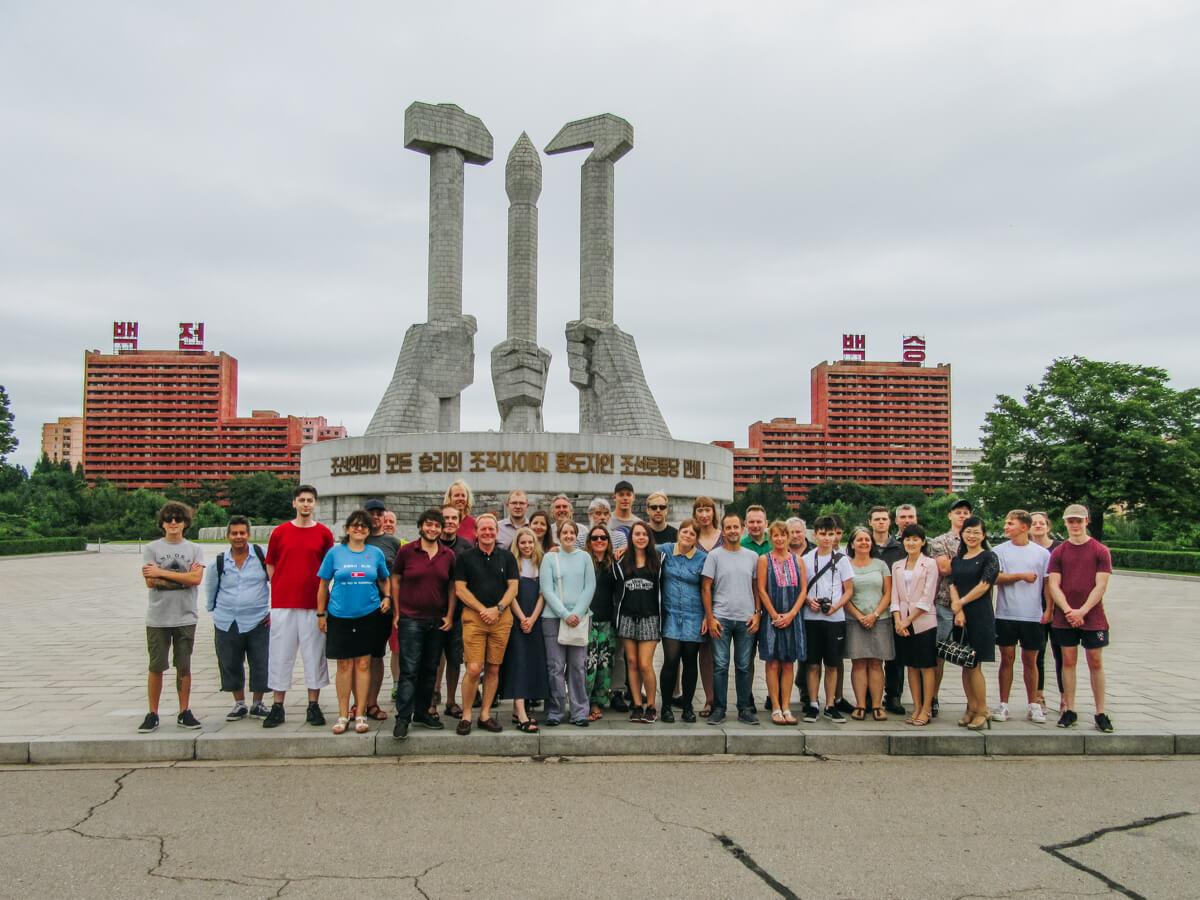
Note: Since the onset of the Covid-19 pandemic, North Korea’s borders have been completely closed to foreigners. As of right now, it is not possible to go to North Korea.
Quite a few of my friends were shocked to discover I was travelling to North Korea. “I didn’t even know you could go to North Korea, let alone join a tour group!” they exclaimed.
Yup, against common belief, it is possible to travel to North Korea. And it’s actually surprisingly easy.
Almost anyone can visit North Korea, with the exception of citizens of South Korea and the United States. It was only recently (September 2019) that the US government banned its citizens from travelling to North Korea, and this may be reversed in time now that Donald Trump is out of office.
In this blog post, I’ll walk you through how to travel to North Korea as a tourist, explaining everything you need to know about tours, visas and travelling into the country itself.
How To Travel To North Korea: The Logistics
There are very few places from where you can enter North Korea — you can’t simply book a flight from London to Pyongyang! You will most likely need to go through China, which shares a border with North Korea. You’ll also need to book onto a government-run tour group, as you cannot visit North Korea independently.
With this in mind, there are three things you’ll need to do in order to visit North Korea as a tourist:
- Book onto a tour
- Arrange a Chinese visa
- Organise transport to China
1) Book Onto A Tour
To visit North Korea, you must book onto a tour group. You cannot visit North Korea independently as the country’s government simply doesn’t allow this. Any visit to North Korea will be an all-inclusive tour with an organized itinerary — there is no getting around this.
Your tour group is ultimately controlled by the Government via the Korean International Travel Company. This means your itinerary is set in stone, with no room for free exploration or solo adventuring. You will be escorted at all times by two guides and a driver.
There are a few tour operators who run trips in North Korea, and these are Lupine Travel , Young Pioneers and Koryo Group . I personally went with Lupine Travel, although it seems as though the three companies are all fairly similar.
There is quite a well-pathed tourist route which most if not all, tourists are taken on. This goes to all the main attractions in Pyongyang , to the Demilitarised Zone on the border of South Korea and to a mountainous region in the north.
Once you choose the tour you want to go on and have booked it, the tour operator will take care of a lot of the logistics for you, including your return transport into North Korea from China, your North Korean visa and your accommodation, food and itinerary once in North Korea.
The tour company probably will not take care of your return transport to China from your home country, or your Chinese visa (although they will help you with this).
Once you’re booked onto a tour, the company will liaise with you prior to your trip, ensuring they have everything they need from you and that you have everything ready, as well.
2) Get Your Chinese Visa
My tour with Lupine Travel started and ended in Beijing. This meant I required a Dual Entry Chinese Visa, as I would technically be entering China twice: once via a flight from London, and then again when I left North Korea.
The Chinese visa can be a little tricky. I’ve applied for and received 2 Chinese visas in the last decade, and they were a bit of a hassle on both occasions. There are a lot of forms to fill out and it can get complicated. Be sure to read through the documents carefully and answer everything truthfully.
For your Chinese visa, you will need:
- Your passport: with remaining validity of at least 6 months and with blank visa pages.
- Visa Application Form: truthfully completed and type-written.
- A photo: taken within the last six months; full face against a light background; size: 48mm x 33mm; bare-headed unless for religious reasons.
You can visit a Chinese embassy or Chinese Visa Application Centre to hand in your documents, or you can mail it. It typically takes four working days to process your application, but it’s recommended that you apply about 2 months before, as there can be issues. They rejected my photo on one occasion and I had to resubmit it, for example.
Once approved and processed, you can go and collect your passport and visa. The fee for a Chinese visa is £150 / $140.
Visit the Chinese Visa Application Service Center to apply for your visa.
The tour company you booked with will handle your North Korean tourist visa for you. All you’ll need to do is fill in a few simple forms and send over a scanned copy of your passport. Your guide will then give you your North Korean visa once you meet up with your tour group.

3) Book Your Transport To China
As your tour to North Korea likely starts in China, you’ll need to book flights or some other form of transport to China, as this is probably not included in your tour package. Check which city your tour’s meeting place is — mine met at the train station in Beijing, but some meet in the city of Dandong, which is on the border of China and North Korea.
Flights from Europe start from about £500. You can search for cheap flights on Skyscanner.
Travelling into North Korea from China
As mentioned above, your tour company will take care of the logistics of your transport into and out of North Korea from China. You’ll most likely meet your tour group in Beijing or Dandong, and then travel with them from there into North Korea, either by train or plane. It depends on the tour company you go with as to whether you’ll go by train or plane. You will be escorted at all times on your transit into and out of North Korea.
The sleeper train departs Beijing in the late afternoon and goes through Northeast China overnight, before reaching the border at around midday.
Once at the border, North Korean soldiers will come onboard to do visa, passport and luggage checks. I found the experience quite intimidating; they poked around in my backpack and asked me to explain what some things were. I remember a fellow traveller on my tour awkwardly explaining what his beard trimmer was used for.
You will also be given forms asking you to declare electronic devices that you’re bringing into the country. I’d advise that you don’t bring any devices with you if possible — you won’t be able to use the internet or make phone calls anyway, and you may be asked to open it up and show the soldiers your files.
Be certain that you do not have religious material, pornography, or memes/other insulting material about North Korea on your device.
It can take a few hours to cross the North Korean entry customs. Once through, you’ll spend about 5 hours travelling through the scenic North Korean countryside before arriving in Pyongyang .

Another way to enter North Korea from China is to take an aeroplane, which is much quicker than the train but certainly less scenic. Air Koryo runs three to four flights from Beijing to Pyongyang each week, as well as weekly flights from Shanghai, Shenyang and Dandong.
I took the train myself, so I don’t have first-hand insight into what the plane is like. But apparently, you’re welcomed on board with songs about socialism and Kim Jong-un, as well as magazines that showcase the ‘fatherly leader’ and the heinous war crimes of Japan and the US.
Tourism in North Korea: Frequently asked questions
There are lots of unique rules and regulations around travelling to North Korea as a foreigner, so let’s break these down.
How Much Does It Cost To Visit North Korea?
The North Korean tour companies I mentioned above organise all-inclusive packages. This means all of your meals, transport within the country and hotel will be included in the price. Tour prices range massively — between about £400 and £3500 depending on the length of your tour and the company you choose to go with.
- Lupine Travel tours start at £569 ($740)
- Young Pioneers tours start at £444 ($578)
- Koryo Group tours start at £448 ($583)
You should also bear in mind the cost of getting to North Korea. My flight from London to Beijing (the starting point of the tour) was about £500.

Is It Safe To Visit North Korea?
The Foreign and Commonwealth Office (FCO) advises against all but essential travel to North Korea. They note that “the security situation in North Korea can change with little notice and with no advance warning of possible actions by the North Korean authorities.” However, the FCO also advises the same for many parts of Turkey and Egypt, which are still frequently visited by tourists.
Tensions between North Korea and the United States have calmed and North Korea announced a halt to its missile testing in April 2018. It is now arguably much safer to visit the country than when I visited in August 2017 .
As long as you follow all the rules outlined to you before you enter North Korea, travel is ‘deemed safe’ in that you are never alone and are not going to be the target of petty crimes such as theft.
While there is definitely some risk in visiting North Korea, if you follow the rules and remain respectful, there should be no issues. Terrorism and crimes towards tourists are highly unlikely and detainment of tourists is rare!

What Are The Rules For Tourists In North Korea?
- Your every movement is watched and monitored and, under no circumstance , can you wander off on your own. Doing so will result in serious consequences for both you and your tour guide.
- The country dislikes the term North Korea and prefers to be called the Democratic People’s Republic of Korea, or DPRK for short.
- Do not speak negatively about the country or the leaders. Disrespecting the country is viewed as a major offence and has caused problems for tourists in the past.
- You cannot take photos of everything. You’re allowed to take photos of tourist attractions etc, but it is forbidden to photograph the military, labourers or construction sites, among other things.
- You must ensure that any photos of statues of the leaders must capture their whole body — no close-ups or chopping off their feet from the frame.
- Your belongings will be thoroughly searched at the border. It is forbidden to bring religious material, porn or literature or film about North Korea into the country. Please, for heaven’s sake, do not try to bring a copy of The Interview into North Korea. Confiscated possessions may not be returned at the border.
- Practising religion is not allowed. North Korea is an atheist country and practising religion there is highly restricted. Praying or showing off a bible is a great way to get detained.
- You cannot speak with random citizens during your time in North Korea, as doing so may be considered espionage.

Will Visiting North Korea Affect Whether Other Countries Grant Me Entry?
Not at all! There are no restrictions on entering any country due to previous entry into North Korea — including South Korea and the United States. In fact, it’s unlikely that border controls will even know you’ve been to North Korea because your visa is issued on a separate piece of paper and your passport is not stamped.
My Experience Visiting North Korea
I found my time in North Korea to actually feel a lot more relaxed than I anticipated. When I first arrived, I was a little nervous and tried not to look at anybody for too long or seem disrespectful in any way.
However, by the end of my second day in North Korea, I felt more relaxed and realised that I just had to follow the rules. I stuck with my tour group, asked permission to take photos, didn’t question any “facts” the tour guides stated about their country, and didn’t try to interact with random locals. In doing this, all was well.
The country was extremely different to how I imagined it and threw a lot of my preconceptions out the window.
I was surprised, for example, to find that Pyongyang was a very picturesque and modern city. I think I had expected it to look kind of grey and old. I was also surprised to see that the countryside was absolutely beautiful, with rolling hills and vivid green colours.
Of course, I also saw plenty of things that upset, angered or confused me a little, such as the phenomenal amount of blatant propaganda and the fact that a guy on my tour got told off for buying ice cream from a nearby stall.
READ MORE: My North Korea Travel Experience – What’s It Really Like?

What Do You Get To See In North Korea?
The key thing to bear in mind is that you won’t get to see the real North Korea. You’ll be ferried from place to place — mostly within Pyongyang — with zero opportunity for independent exploration. You’ll only see what they allow you to see, in what I believe is a very tightly controlled tourist route.
Monuments And Squares
A trip to North Korea will most definitely involve visiting the sites they want you to see , such as Kim Il Sung Square, the Founding Party Monument, the captured US spy ship USS Pueblo, Kim Il Sung’s native home and many more. These are, what I would call, showpieces of the regime.

The Pyongyang Metro
At 110 metres underground, the Pyongyang metro is the deepest metro station in the world. Covered in propaganda, images of the Kim family, and with station names such as ‘Comrade’, ‘Glory’ and ‘Reunification’, North Korea’s metro is really quite an experience.
While it was definitely the most interesting metro journey I’ve ever been on, the whole scenario was somehow quite strange. You can only ride 5 of the 16 stops — perhaps there’s something secret beyond stop 5.

The Demilitarized Zone (DMZ) is a strip of land running along the Korean Peninsula. It is used as a buffer zone between North and South Korea, and is 160 miles long and 2.5 miles wide.
While tourists can easily visit the DMZ in South Korea, this is a chance to see it from the other side and, of course, hear the story from North Korea’s perspective.

The Kaeson Funfair
The Kaeson Funfair was the only place we were allowed to wander around somewhat freely. Our guides let us mingle with the locals a little and stood guard along the pathways leading to the entry and exit points.
We were, however, told that we should skip all the queues and go straight onto any ride we wanted, because “we’re Western.” This annoyed me, as I didn’t feel that this presented a good view of us as Westerners to the citizens of North Korea. Perhaps they didn’t mind, but as a Brit, orderly queues are an essential part of my culture!

Is It Ethical To Visit North Korea?
This is the most important question you should ask yourself before visiting North Korea: is it ethical?
There is a view that visiting North Korea is potentially helping to fund the regime . I.e. that you’re helping to fund horrific human rights atrocities and nuclear programmes. However, I believe that the money North Korea receives from tourism is very small. With only 10,000 tourists a year, most of which are from China, how much can they really be making from this? It’s not like tourism in North Korea is a booming industry.
I also strongly believe that completely stripping a country of exposure to other cultures and attitudes is detrimental. Contact with the outside world helps to improve the citizens’ views of outsiders, which is a good thing since they’ve held a very bad view of the West for decades. Peace and progression within North Korea are certainly never going to occur if its citizens aren’t exposed to anything other than what they already know.
It’s certainly not a black-and-white answer and is something that you should consider carefully.
READ MORE: Is It Ethical To Visit North Korea?

About The Author
Lauren Pears is a freelance travel writer and blogger based in London. She writes about active adventure travel, aiming to encourage and inspire travellers to make the most of the great outdoors.
Thank you for reading! If you found this post useful, I’d be grateful if you would consider using the affiliate links below when planning your travels. I’ll make a small commission at no extra cost to you. This will help me to keep this blog running. Thanks for your support – Lauren. Hotels – Booking.com Hostels – Hostelworld Cheap flights – Skyscanner Travel insurance – World Nomads Outdoor gear – Decathlon / GO Outdoors Cycling gear – Chain Reaction Cycles Alternatively, you could buy me a coffee to say thanks!

Similar Posts

My North Korea Travel Experience – What’s It Really Like?

My North Korea Travel Vlog (Video)

Dandong: The Chinese City on the Edge of North Korea

12 Things to Do in Pyongyang, North Korea

Is it Ethical to Visit North Korea?
Thanks a lot for your explanation Lauren this country is my dream to visit , however, I am terrified and nervous. and how I control myself.
I got curious about visiting North Korea since I saw a pic of someone else’s tour there. I didn’t even know it was possible to visit! But then my bubble burst since finding out that it has stopped since covid 🙁 anyways, thanks for writing this, it’s done plenty to satiate my curiosity for now haha
Thanks for reading Monica! Tours will likely open up again at some point in the future 🙂
very good and very detailed article.
Thanks John!
Very informative article on a unique topic, so much appreciated 🙂 I agree with the final message that there is a reciprocal value in connecting with people and cultures all around the world.
Glad you found it informative Lucas!
Leave a Reply Cancel reply
Your email address will not be published. Required fields are marked *
We've detected unusual activity from your computer network
To continue, please click the box below to let us know you're not a robot.
Why did this happen?
Please make sure your browser supports JavaScript and cookies and that you are not blocking them from loading. For more information you can review our Terms of Service and Cookie Policy .
For inquiries related to this message please contact our support team and provide the reference ID below.
US envoy to UN to visit Korean border, North Korean defectors
- Medium Text
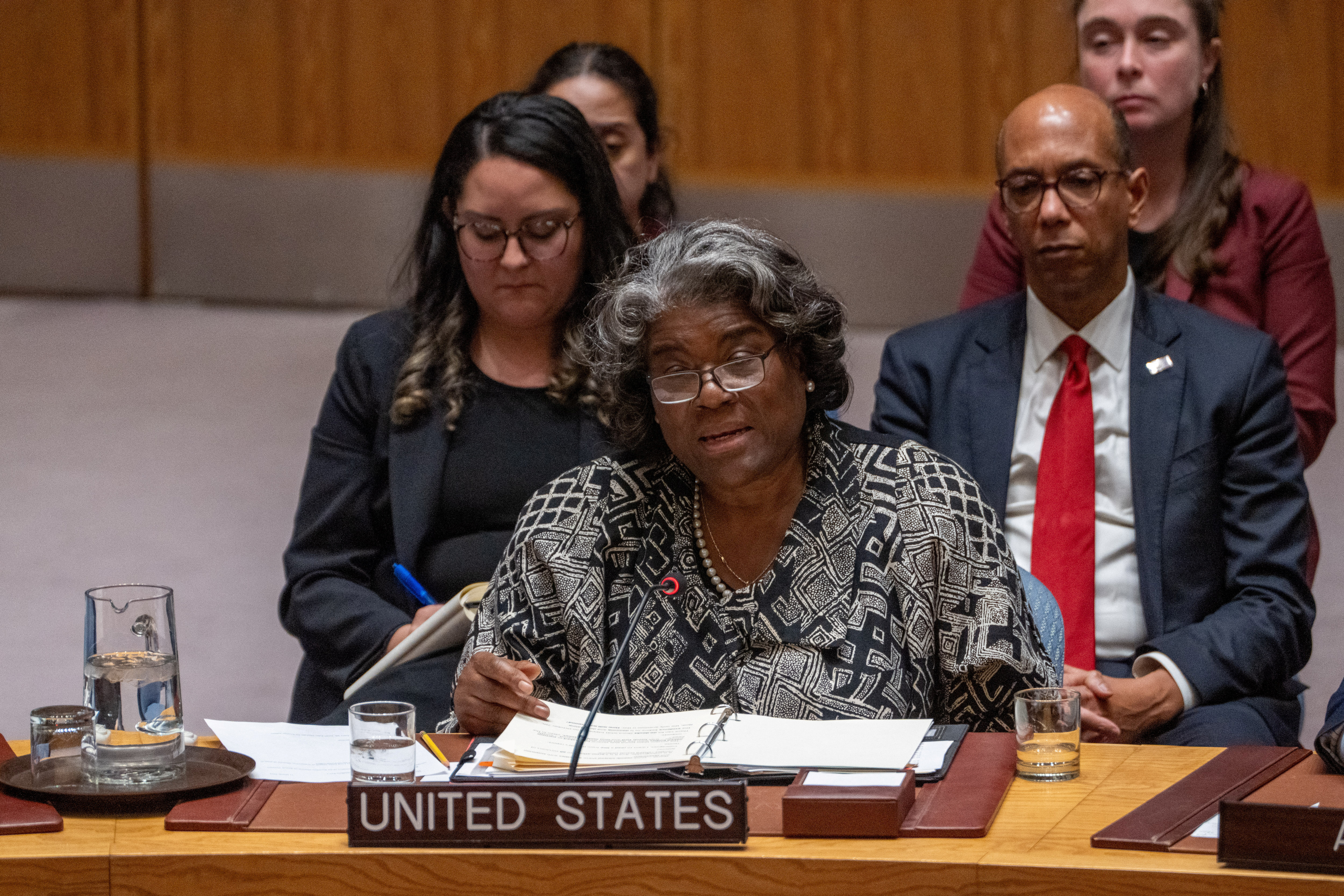
The Reuters Daily Briefing newsletter provides all the news you need to start your day. Sign up here.
Reporting by Hyonhee Shin; editing by Miral Fahmy
Our Standards: The Thomson Reuters Trust Principles. New Tab , opens new tab
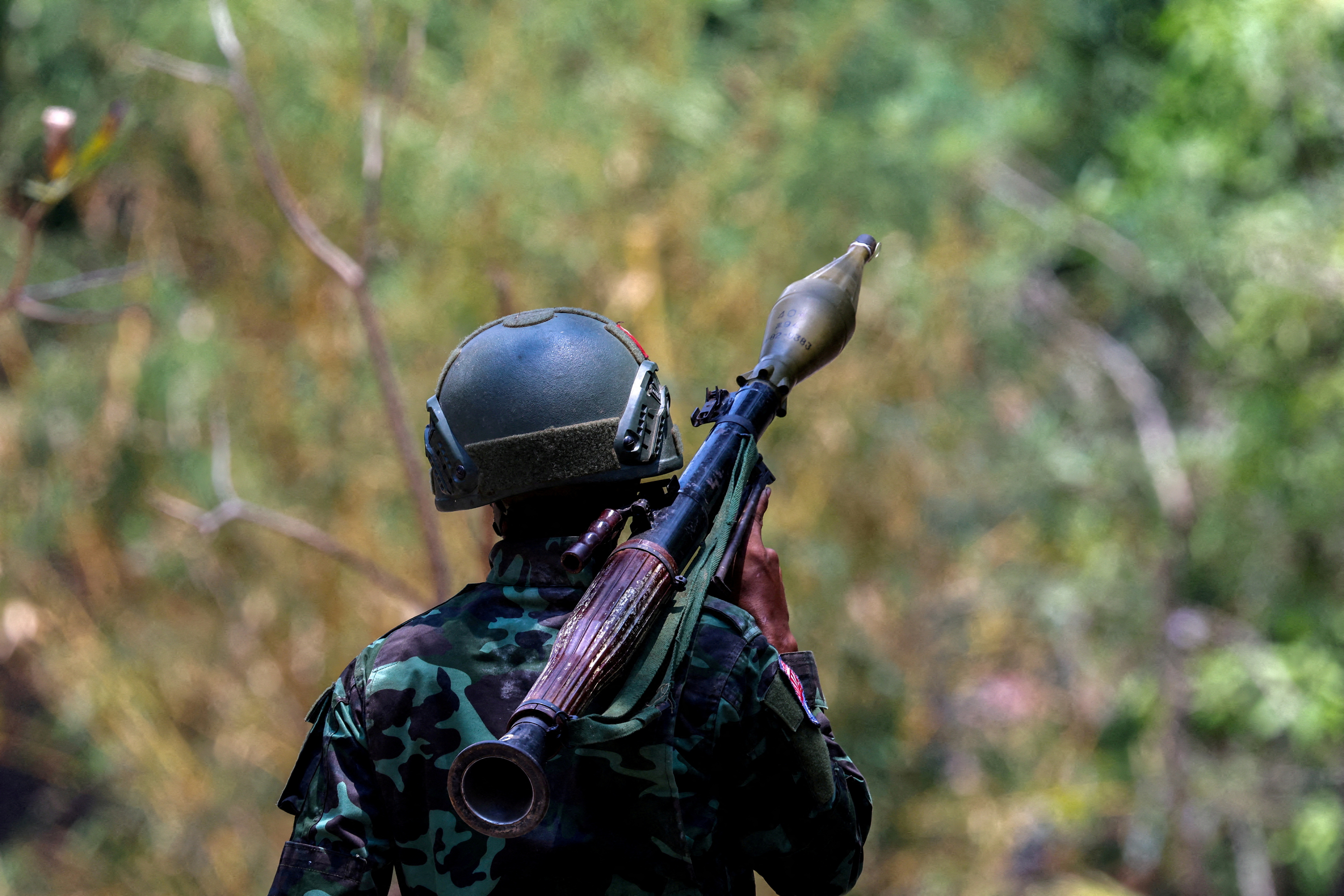
World Chevron
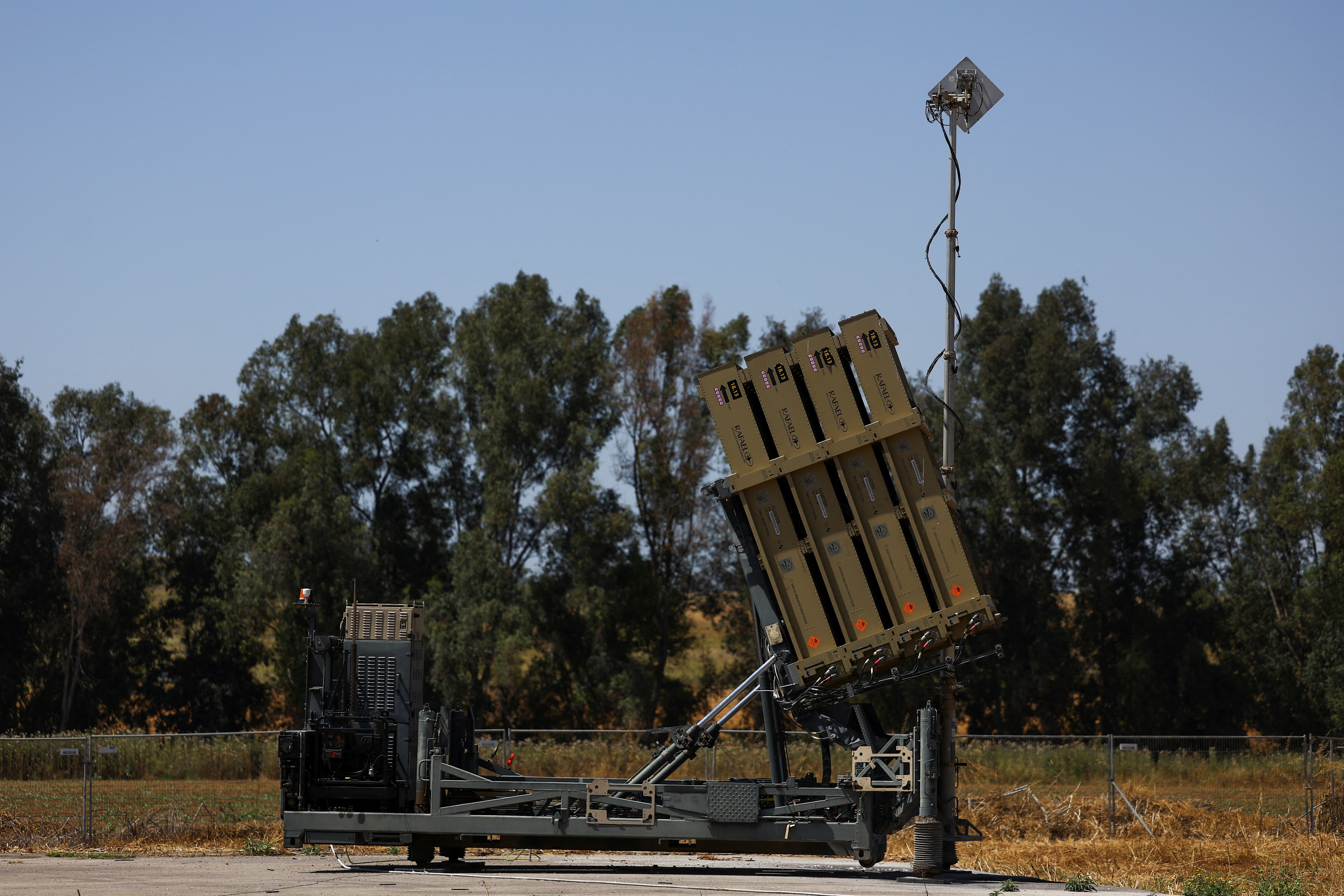
In any air war, Israel's defences would trump Iran's, but at a high cost
Ageing air defences have left Iran vulnerable to an Israeli attack if Prime Minister Benjamin Netanyahu decides to ignore global pressure not to retaliate directly for the unprecedented drone and missile salvoes of Saturday night.
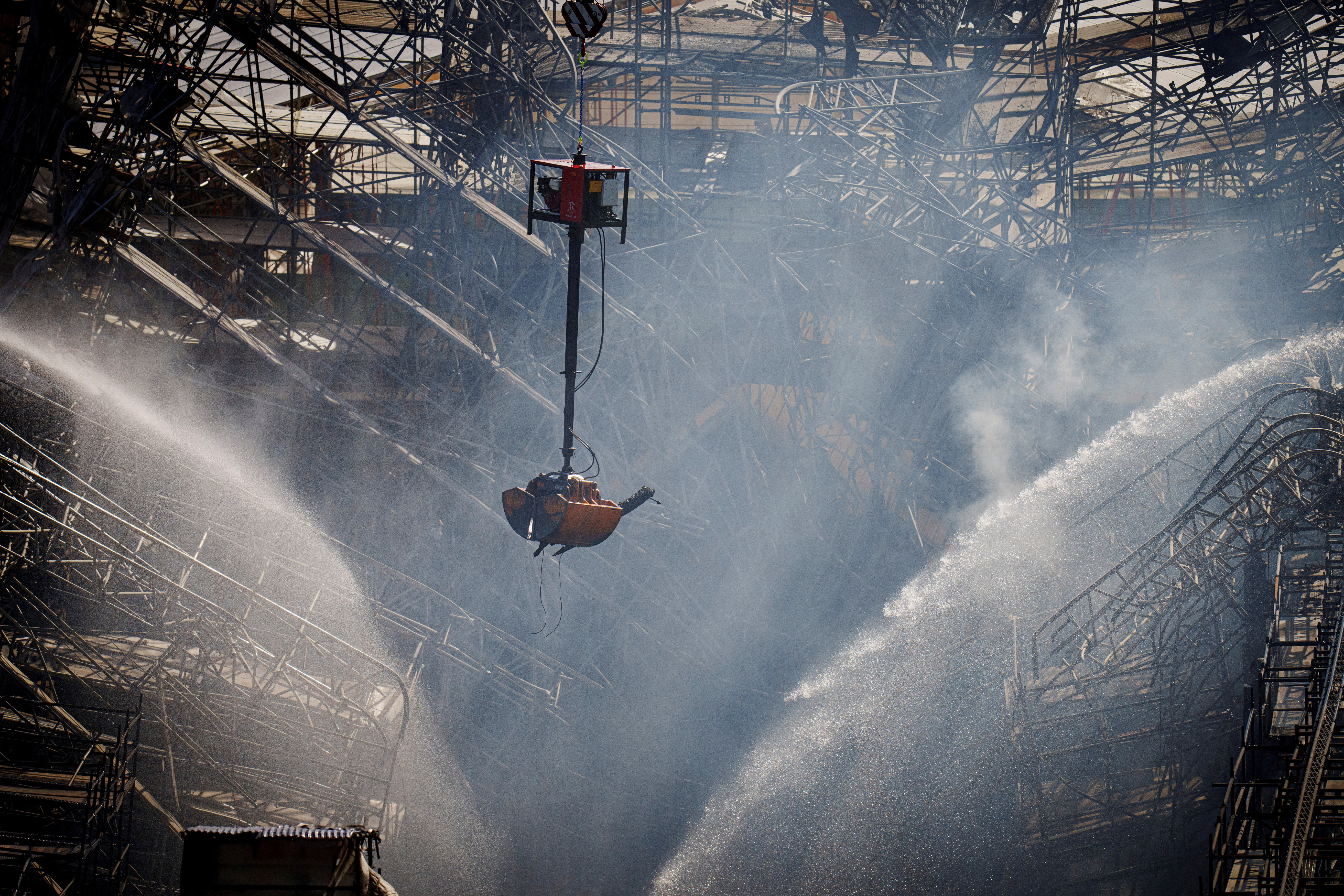
Two German-Russian nationals have been arrested in Germany on suspicion of plotting sabotage attacks, including on U.S. military facilities, in a serious effort to undermine military support for Ukraine, officials said on Thursday.
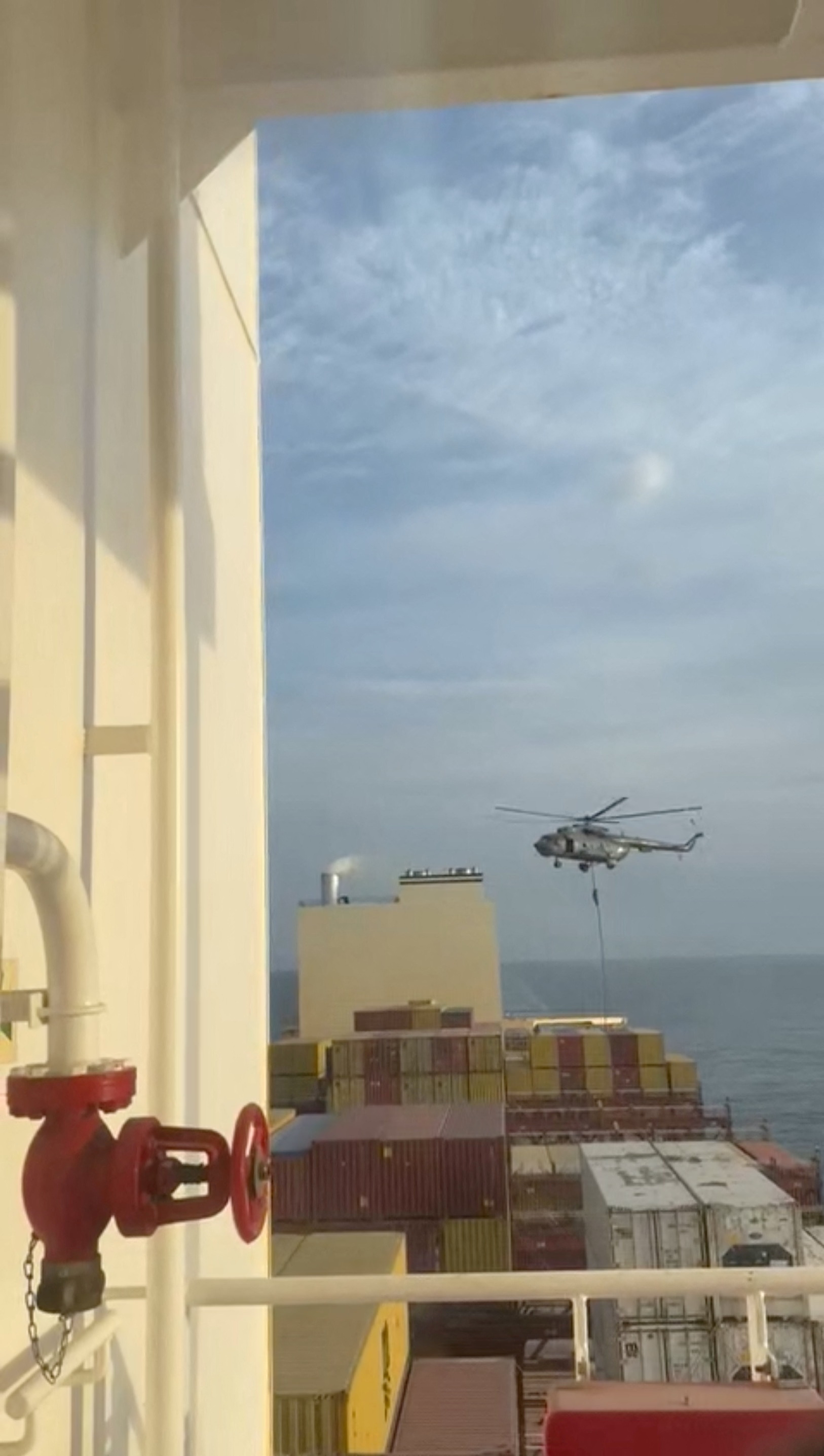
- Foreign Affairs
- Multicultural Community
- Environment & Animals
- Law & Crime
- Health & Science
- Cryptocurrency
- Thoughts of the Times
- Today in History
- Tribune Service
- Blondie & Garfield
- Letter to the Editor
- Travel & Food
- People & Events
- Around Town
- Fortune Telling
- Shows & Dramas
- Theater & Others
- Korean Storytellers

A worrying divide has been growing between South Korea and its Asia-Pacific security partners. Although Seoul regards the threat posed by North Korea as more acute than ever before, countries including Japan, Australia, the United States and Britain are overwhelmingly preoccupied with China’s regional ambitions. But they ignore Pyongyang’s continuing brinkmanship at their peril. Escalation and proliferation risks are growing on the Korean Peninsula, and Seoul’s mounting sense of isolation exacerbates both dangerously.

A recent project conducted by the Asia-Pacific Leadership Network (APLN) and the European Leadership Network (ELN) explored perceptions of nuclear risk in South Korea, Australia, Japan and Britain. Experts and officials in the four countries were asked a series of questions about the risk of conflict in Northeast Asia. Although there was a fairly broad consensus among them on the main causes for concern in the Taiwan Strait, opinions diverged regarding escalation risks on the Korean Peninsula. For example, whereas South Koreans considered it likely that a Korean conflict will take place in the near future, with devastating consequences for South Korea’s national security, participants from the other three countries downplayed these risks and dismissed South Korean concerns that North Korea might intentionally initiate a crisis.
This gap in South Korea’s threat perceptions could have serious security implications over the next few years, especially if Seoul sees self-reliance as its only option for dealing with its hostile and unpredictable neighbor. Escalation dangers are already growing — recently, South Korea’s defense minister instructed the military not to show restraint in response to North Korean provocations. Instead, it has been ordered to “take action immediately, strongly and until the end,” and not wait for permission from their political leaders. This change in military posture has occurred against a backdrop of increasing domestic support for an independent South Korean nuclear weapons capability, spurred on by the North’s constant verbal threats and missile tests, and by concern that Seoul will face an existential crisis if U.S. alliance resolve wanes.
If there is a change of administration after the U.S. elections this year, South Korea’s deep insecurity and sense of isolation could intensify, increasing proliferation, conflict and escalation dynamics. Urgent steps should be taken to reduce these risks, including measures to strengthen bilateral ties between South Korea and its security partners. For while Japan, Australia and Britain have taken great strides in strengthening bilateral ties with one another, they are only just beginning to explore the potential of their respective partnerships with South Korea. These efforts need to be deepened and accelerated.
The four countries should also engage more closely in policy dialogue and coordination as a group and carefully consider how they would plan to uphold their shared security interests on the Korean Peninsula, including in conditions of conflict and conflict escalation. As they undertake these activities, they should take steps to reassure Pyongyang and Beijing that their coordination efforts are defensive, based on their shared, legitimate security interests and not aimed at creating an Asian NATO.
Two collaborative initiatives should be prioritized:
First, experts in each of the four countries who have deep knowledge of the nuclear non-proliferation regime should be tasked with analyzing and communicating the role that such frameworks play in promoting stability in Northeast Asia, and the likely regional and global consequences of allowing the Treaty on the Non-proliferation of Nuclear Weapons (NPT) regime to collapse. This is critically important because the joint APLN-ELN project identified a growing dismissiveness among policymakers — especially in Seoul — regarding the value of key multilateral legal and normative frameworks, including the NPT.
Second, officials from the four countries should conduct tabletop exercises to explore specific conflict scenarios on the Korean Peninsula, including under conditions of U.S. retrenchment. These exercises should be used to improve understanding between the three Asia-Pacific countries of escalation risks and their respective approaches to crisis decision-making, and test responses to potential crisis signals from Chinese and North Korean leaders. Brtiain, as an actor from outside the region, could host these exercises in a neutral location.
Policymakers must use these and other initiatives to refocus their attention on North Korea's nuclear activities and do so in a way that fully engages South Korean experts and officials. The tendency among experts and officials in Australia, Japan, Brtiain and the U.S. to treat nuclear risks on the Korean Peninsula as secondary to those in the Taiwan Strait is cultivating a sense of resignation among South Koreans that they must ‘go it alone.’ Bringing North Korea back onto the security agenda could reduce proliferation pressures in South Korea and help bolster strategic stability in Northeast Asia.
Dr. Tanya Ogilvie-White is a senior research adviser and member of the Asia-Pacific Leadership Network (APLN), a non-resident senior fellow at the Pacific Forum and a member of the International Group of Eminent Persons for a World without Nuclear Weapons. This essay is published in cooperation with the APLN.

World Water Day 2024
Busan World Team Table Tennis Championships Finals
Super Bowl 2024
Welcoming Lunar New Year around world
Daily life in Afghanistan under Taliban rule


IMAGES
VIDEO
COMMENTS
1. The political situation in North Korea. While peace is maintained under an armistice agreement, the two Koreas are still technically at war and inter-Korean relations are extremely tense. The security situation on the Korean Peninsula could deteriorate with little warning.
Travel Advisory. July 24, 2023. North Korea - Level 4: Do Not Travel. O D. Reissued with obsolete COVID-19 page links removed. Do not travel to North Korea due to the continuing serious risk of arrest and long-term detention of U.S. nationals. Exercise increased caution to North Korea due to the critical threat of wrongful detention.
Written by Travel Safe Team. Safety Index: 21. * Based on Research & Crime Data. User Sentiment: 61. * Rated 61 / 100 based on 56 user reviews. North Korea, officially referred to as the Democratic People's Republic of Korea is a country located in East Asia covering the northern half of the Korean Peninsula that is situated between Korea Bay ...
Road safety. Travel within North Korea is severely restricted. Transportation is usually provided by local tour representatives or authorities. Major highways are in good condition, while rural roads can be hazardous. Police checkpoints, usually located at the entry to towns, may require that travellers provide documentation before onward ...
North Korea resumed missile tests in 2019, after the breakdown of the Hanoi Summit between Donald Trump and Kim Jong-Un. North Korea has tested ballistic missiles frequently since 2019.
For additional travel information. Enroll in the Smart Traveler Enrollment Program (STEP) to receive security messages and make it easier to locate you in an emergency. Call us in Washington, D.C. at 1-888-407-4747 (toll-free in the United States and Canada) or 1-202-501-4444 (from all other countries) from 8:00 a.m. to 8:00 p.m., Eastern ...
FCDO travel advice for North Korea. Includes safety and security, insurance, entry requirements and legal differences.
If your travel plans in North Korea include outdoor activities, take these steps to stay safe and healthy during your trip. Stay alert to changing weather conditions and adjust your plans if conditions become unsafe. Prepare for activities by wearing the right clothes and packing protective items, such as bug spray, sunscreen, and a basic first ...
The authorities in North Korea set and enforce entry rules. If you're not sure how these requirements apply to you, contact the Embassy of the Democratic People's Republic of Korea ( DPRK) in ...
COVID-19. If you are planning international travel at this time, please read our COVID-19 related travel advice here, alongside our destination specific travel advice below.. Do not travel. Do not travel to North Korea due to extensive restrictions placed on foreigners, serious risk of arrest and detention, and an uncertain security situation that could change with very little warning.
Broadly speaking, yes. Following the arrest and tragic death of Otto Warmbier in 2017, United States' citizens are banned from visiting the country.Great Britain's Foreign Office also advises against all but essential travel to the DPRK. However the travel companies that provide trips to the DPRK are quick to point out that these warnings and restrictions are possibly political rather than ...
Forget any independent travel in North Korea, you'll be on an authorized tour. Anything else is considered espionage. Is North Korea safe for travelers? Here's our help, advice and support for planning a successful trip and traveling safely in North Korea.
Safety. North Korea and South Korea are technically still at war, and tensions have increased in recent times. North Korea frequently conducts missile tests or other provocations, raising regional tensions. Monitor developments. The North Korean Government restricts information, especially about domestic politics and international relations.
Start by reading this North Korea travel guide. I've visited North Korea, or officially, the Democratic People's Republic of Korea (DPRK) twice: once in 2015 (Pyongyang / DMZ + Kaesong / Mount Kumgang / Wonsan) and once in 2018 (Rason). However, I rarely brag about visiting North Korea because it isn't a place I would encourage just anyone to ...
It is crucial to follow any travel advisories or warnings issued by your government. By taking these precautions, you can have a smooth and enjoyable solo trip to North Korea. Finding Local Guides and Travel Groups. When traveling to North Korea, finding local guides and travel groups can enhance your experience and provide valuable insights.
Autumn (September to October): Another excellent time to visit North Korea is in the autumn months. The weather remains comfortable with mild temperatures, and the changing foliage adds a beautiful backdrop to your travels. Daytime temperatures range from 15°C to 20°C (59°F to 68°F). This is also a great time for cultural events and festivals.
1. Prepare your family in case of emergencies or death. Since the threat of arrest or detention in North Korea is high, travelers should prepare their family before their trip. Draft a will, plan funeral arrangements, and discuss care or custody of children and pets.
This guide to travel in North Korea talks about tourism in this very restricted country and what it is really like to visit the DPRK. Travelling to North Korea for seven days was hard. It's propaganda via the medium of travel. I was overwhelmed, confused, upset, surprised, and returned with more questions than I had before I went.
Despite what you may hear, it is safe to travel to North Korea. The DPRK (North Korea) is probably one of the safest places on Earth to visit provided you follow the laws and regulations as covered in our booking documents, at our pre-tour briefings, and throughout your stay in North Korea. Tourism is very welcomed in North Korea.
There's no other way to get into North Korea. No tour company, no visa, no entry. You will then book a tour through the tour company, depending on how many nights you want to stay, where you want to go etc. Tours normally include everything, from travel into the country, to the accommodation and full board.
The People's Study Hall in Pyongyang, North Korea. I was planning on visiting North Korea in a year or so, but when Trump announced this past July his "fire and fury" travel ban, forbidding Americans from entering the DPRK starting September 1st, 2017, I knew I had to act now or wait indefinitely until the ban is lifted.
My North Korea tour group. A lovely, diverse bunch of people. 2) Get Your Chinese Visa. My tour with Lupine Travel started and ended in Beijing. This meant I required a Dual Entry Chinese Visa, as I would technically be entering China twice: once via a flight from London, and then again when I left North Korea.. The Chinese visa can be a little tricky.
Thomas-Greenfield will be briefed by military officials at the demilitarized zone. She also plans to meet civilians, including North Korean defectors, during her trip to South Korea, Evans said ...
23 votes, 186 comments. true. Firstly, as things stand, NK is closed to tourists due to covid, and it's illegal to travel there from the US without special permission. The USA's poor diplomatic relationship with NK means they can offer almost no support to you if you get in trouble while there, and so opt to limit the circumstances in which its citizens can visit in the first place.
SEOUL, April 9 (Reuters) - The U.S. ambassador to the United Nations will travel to the heavily armed Korean border and meet North Korean defectors in South Korea, her office said on Monday, amid ...
China's highest-level visit in nearly five years comes as North Korea aims to strengthen ties with Beijing and Moscow amid coordination between US and its neighbors.
A recent project conducted by the Asia-Pacific Leadership Network (APLN) and the European Leadership Network (ELN) explored perceptions of nuclear risk in South Korea, Australia, Japan and Britain.